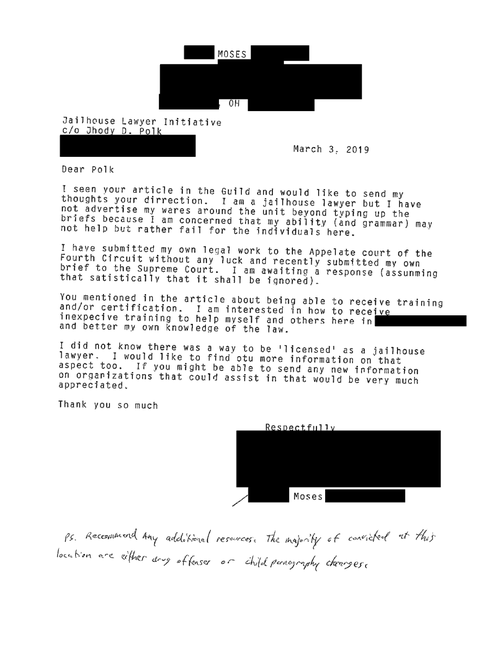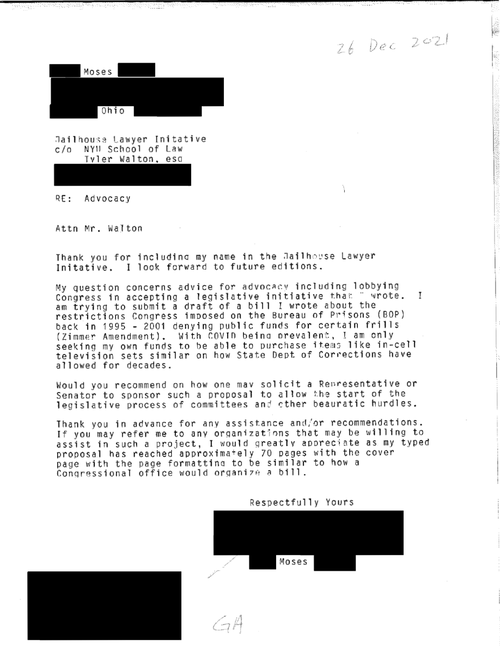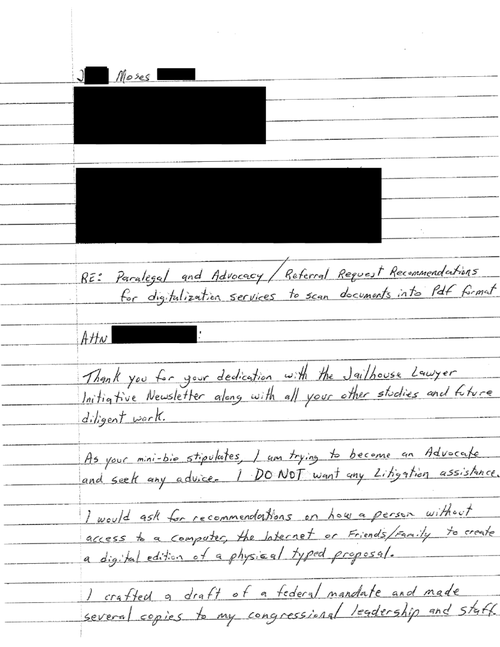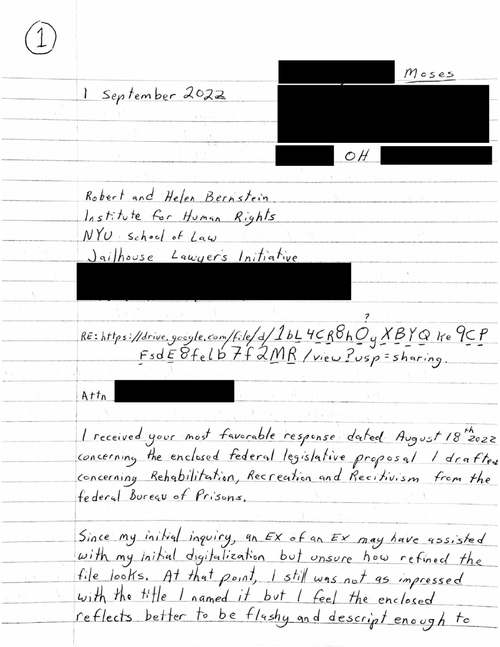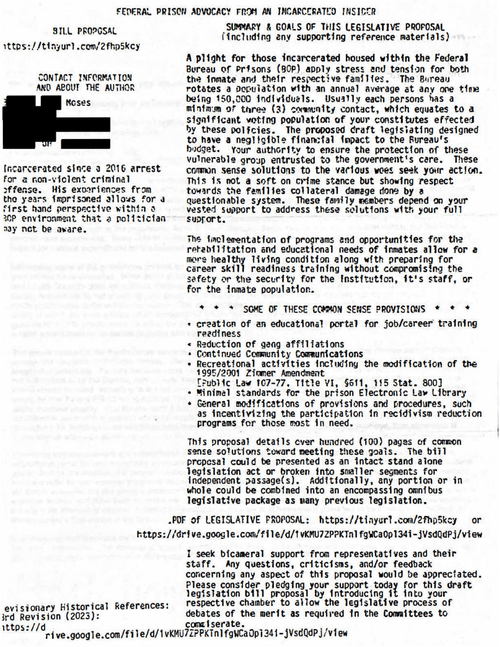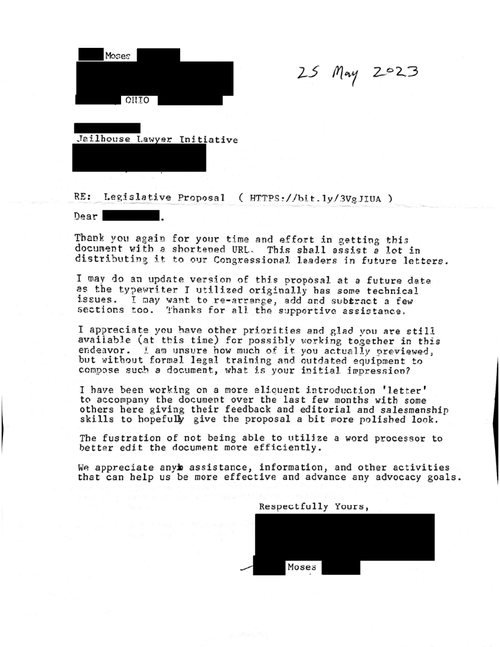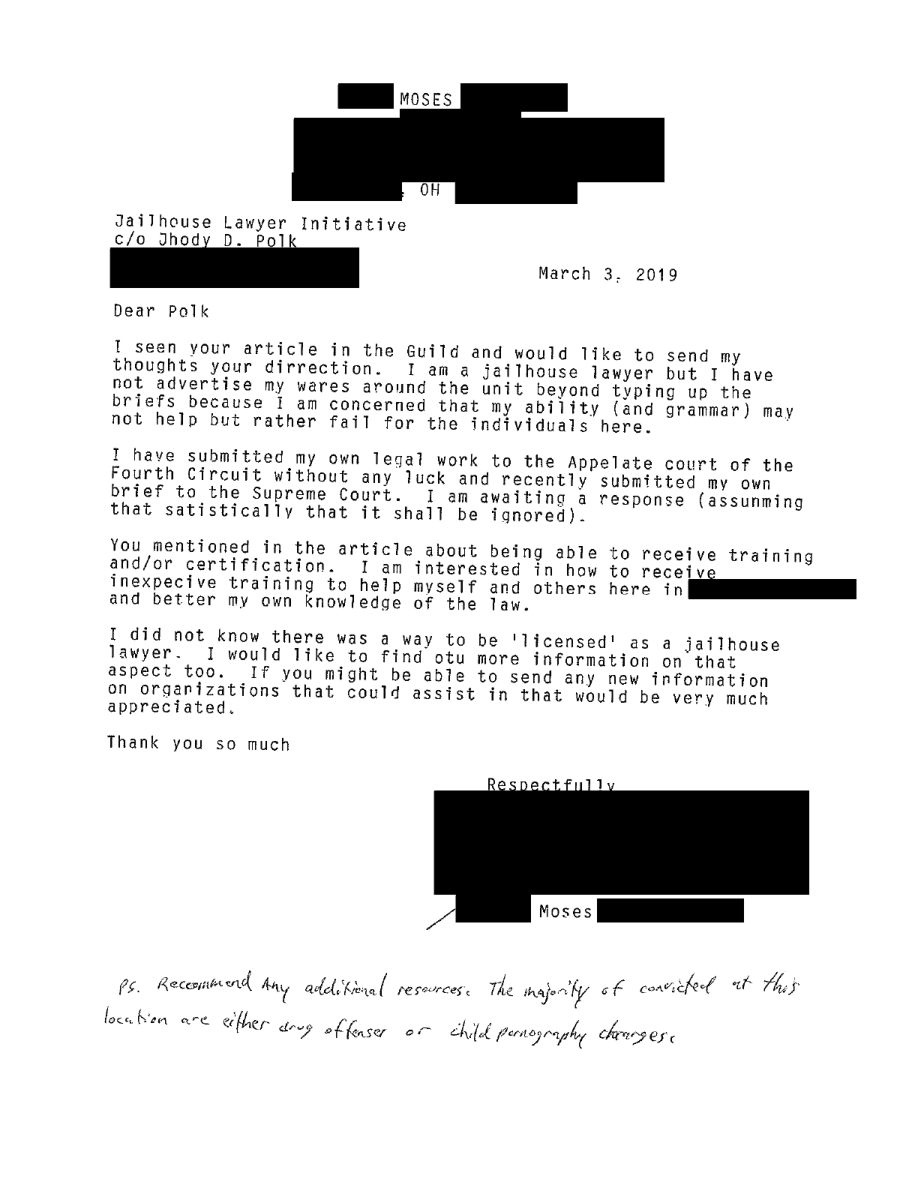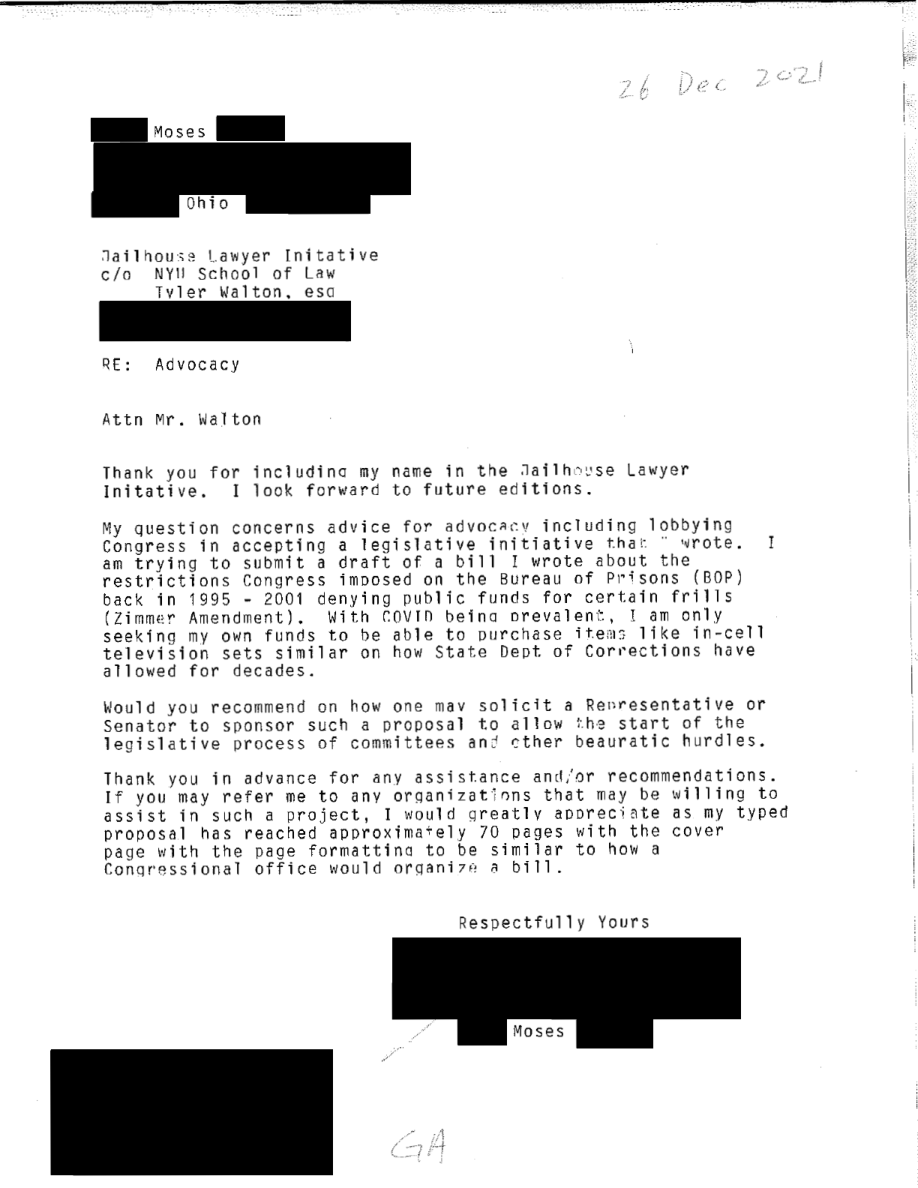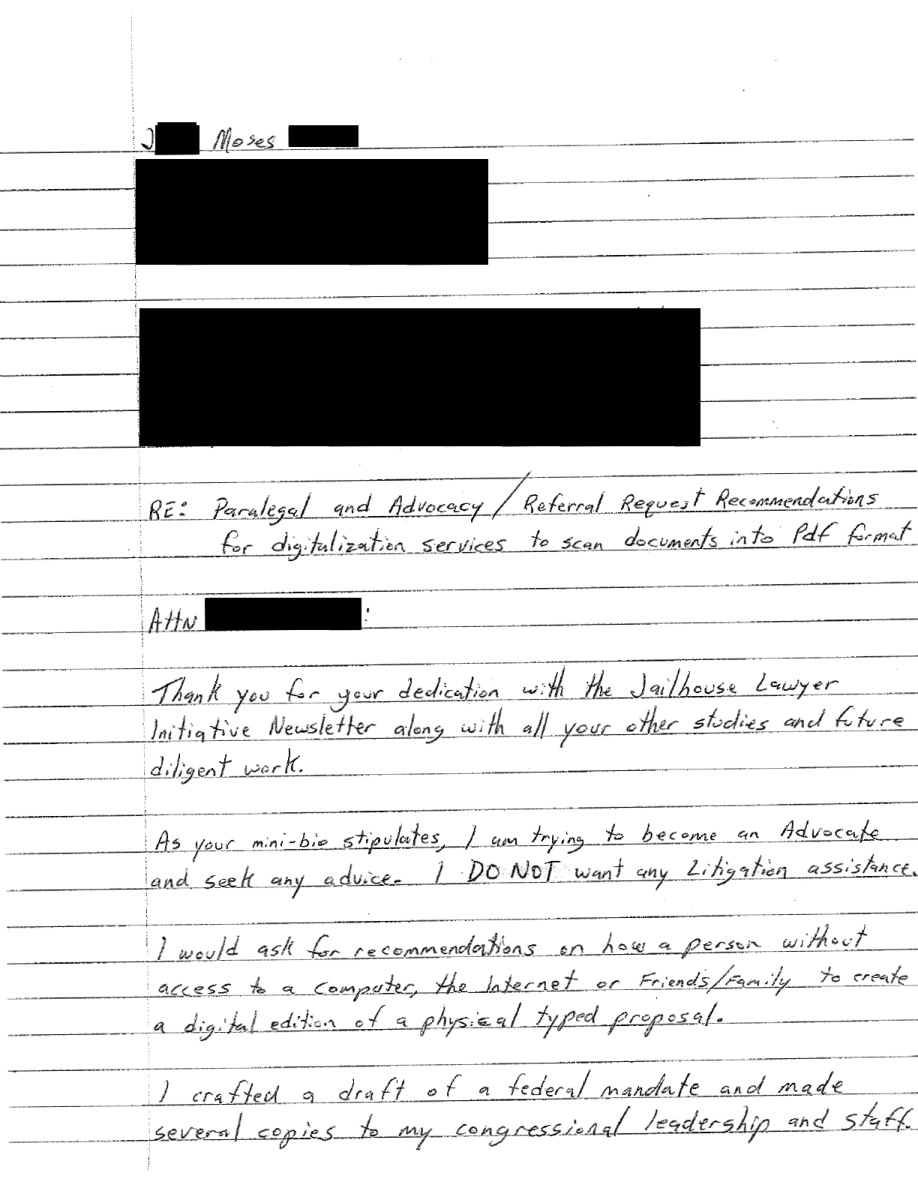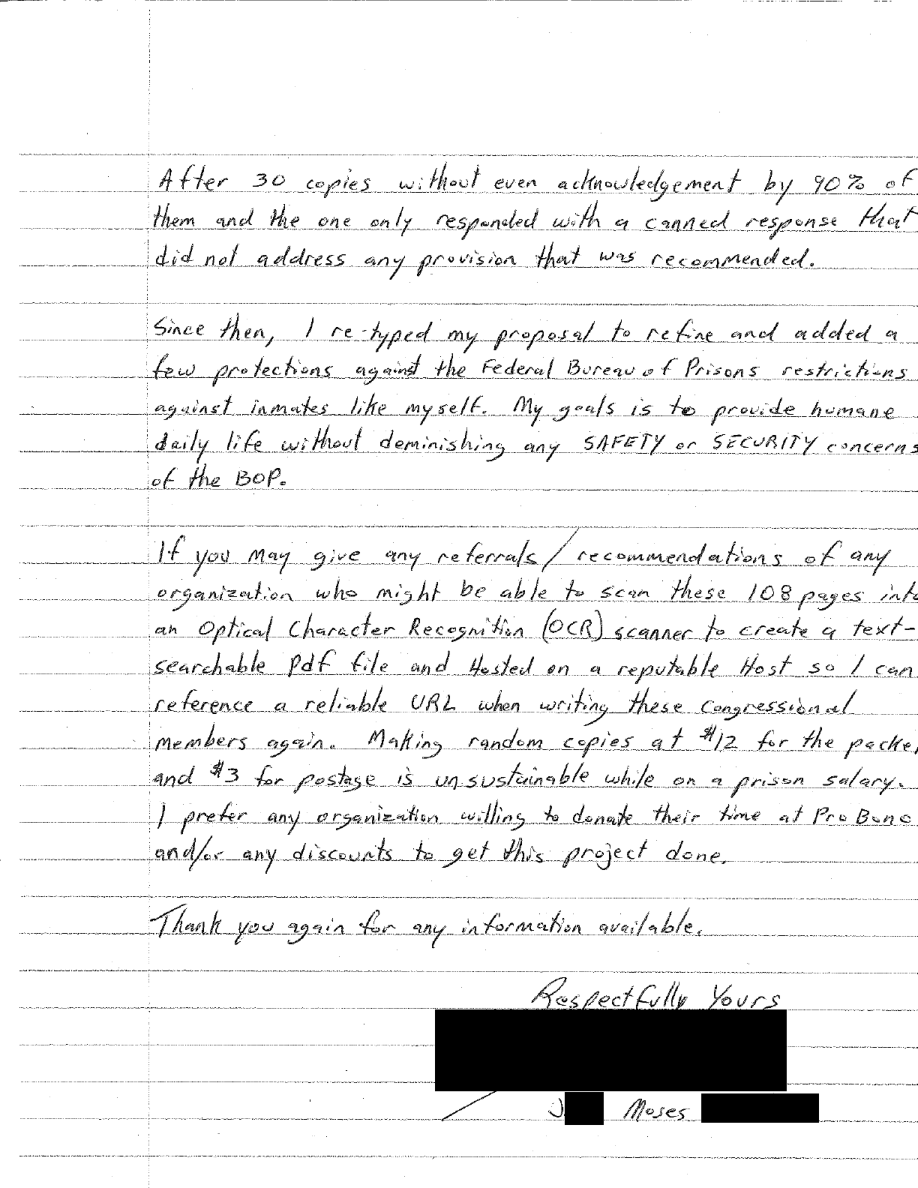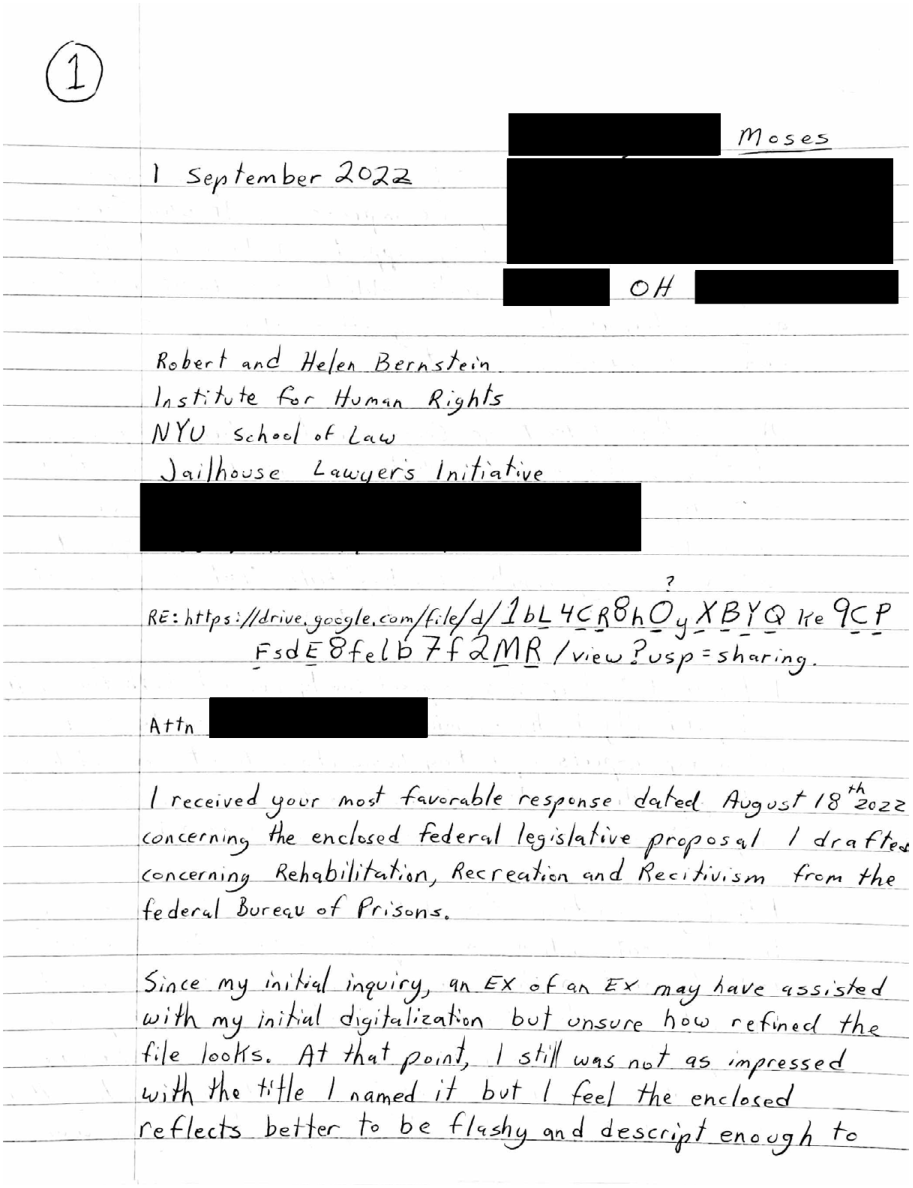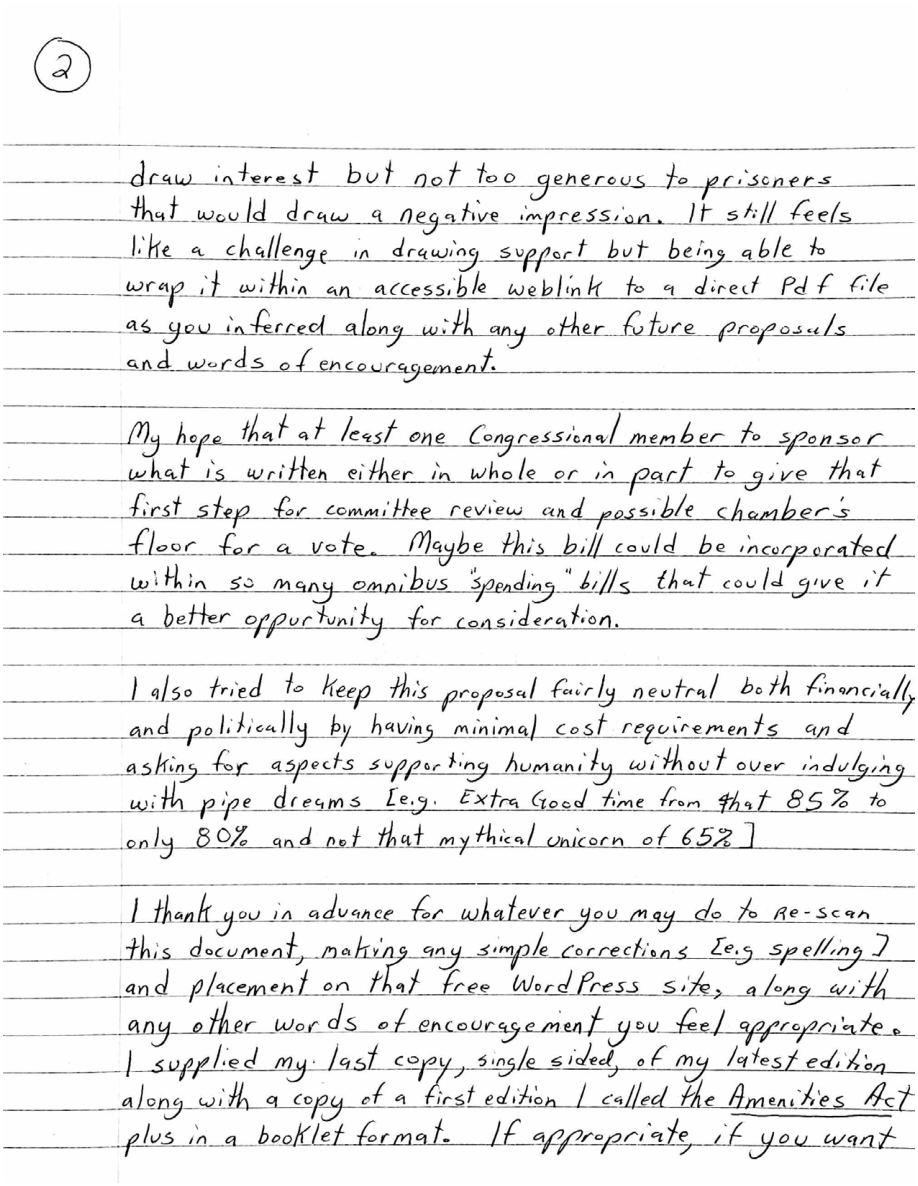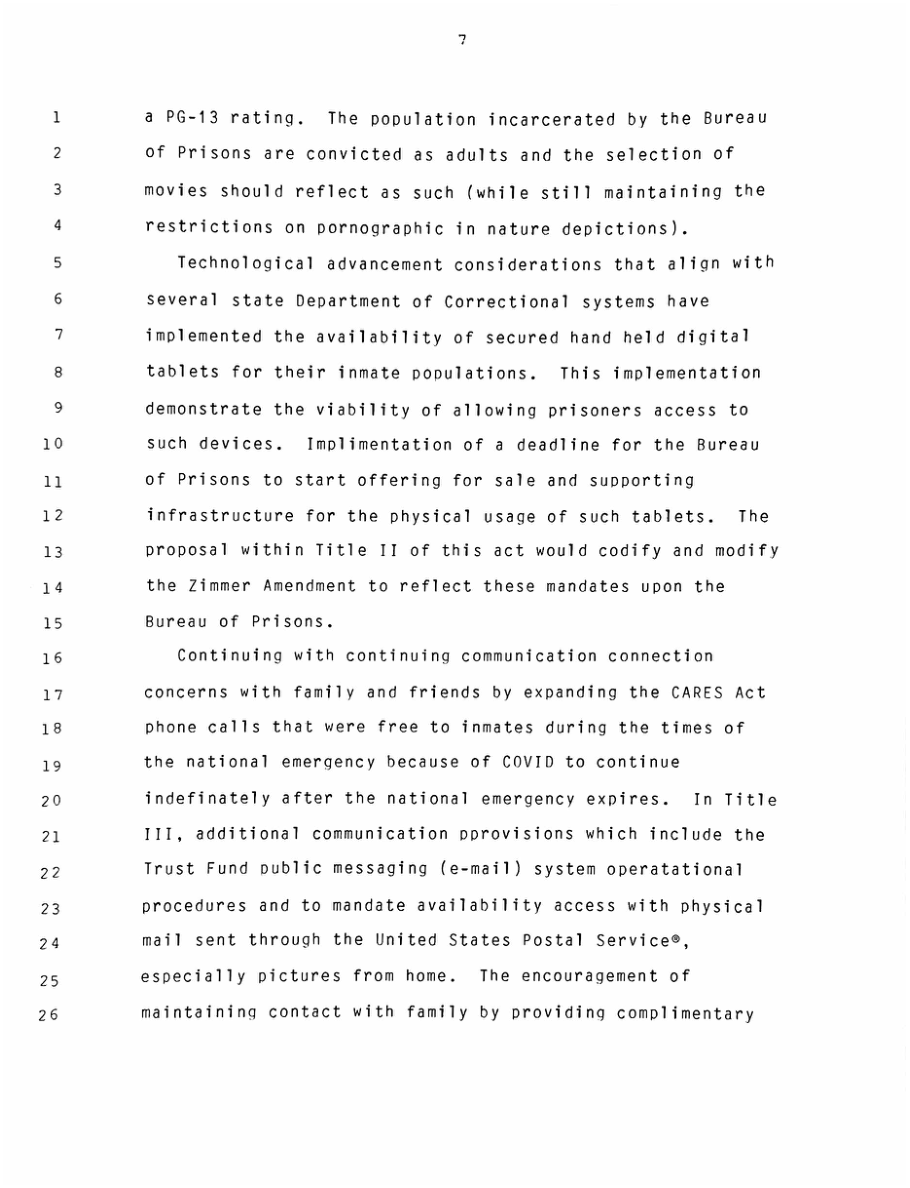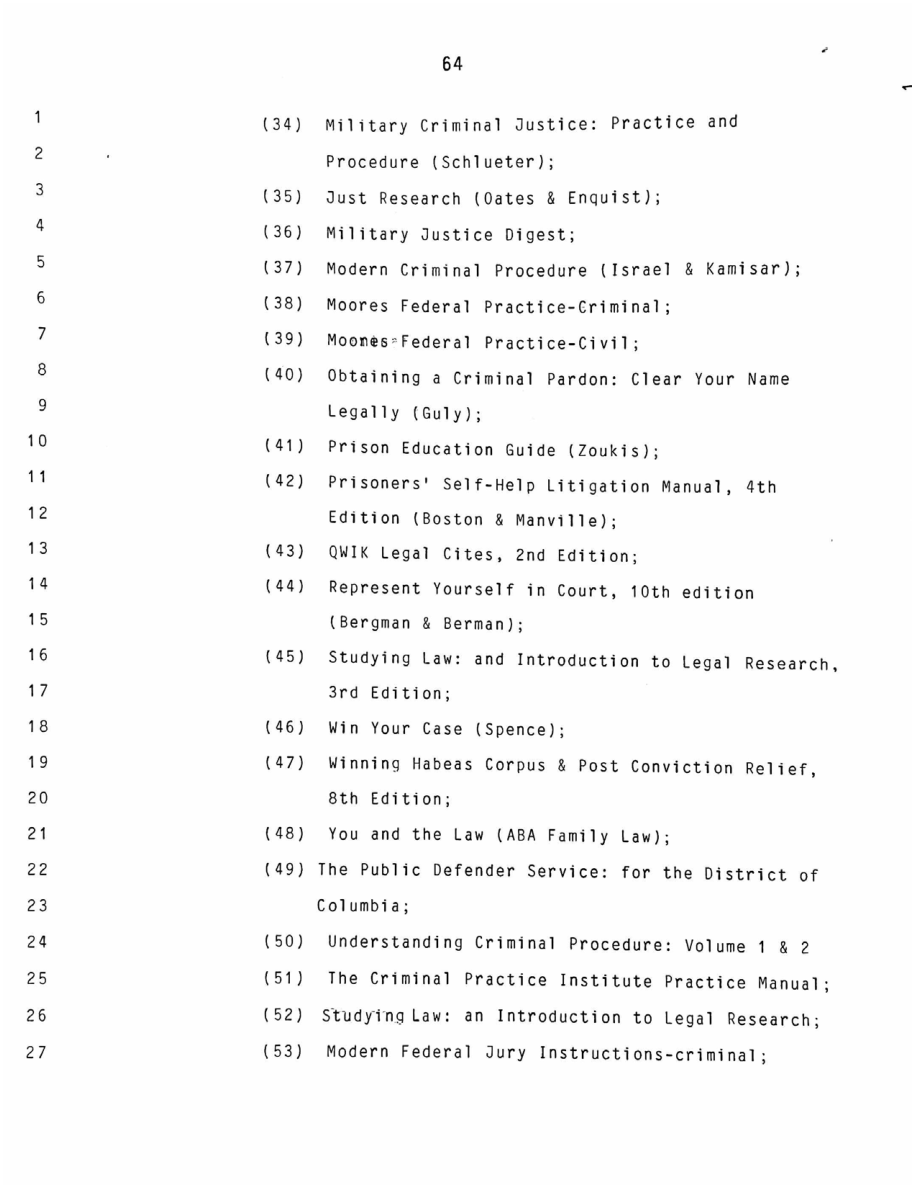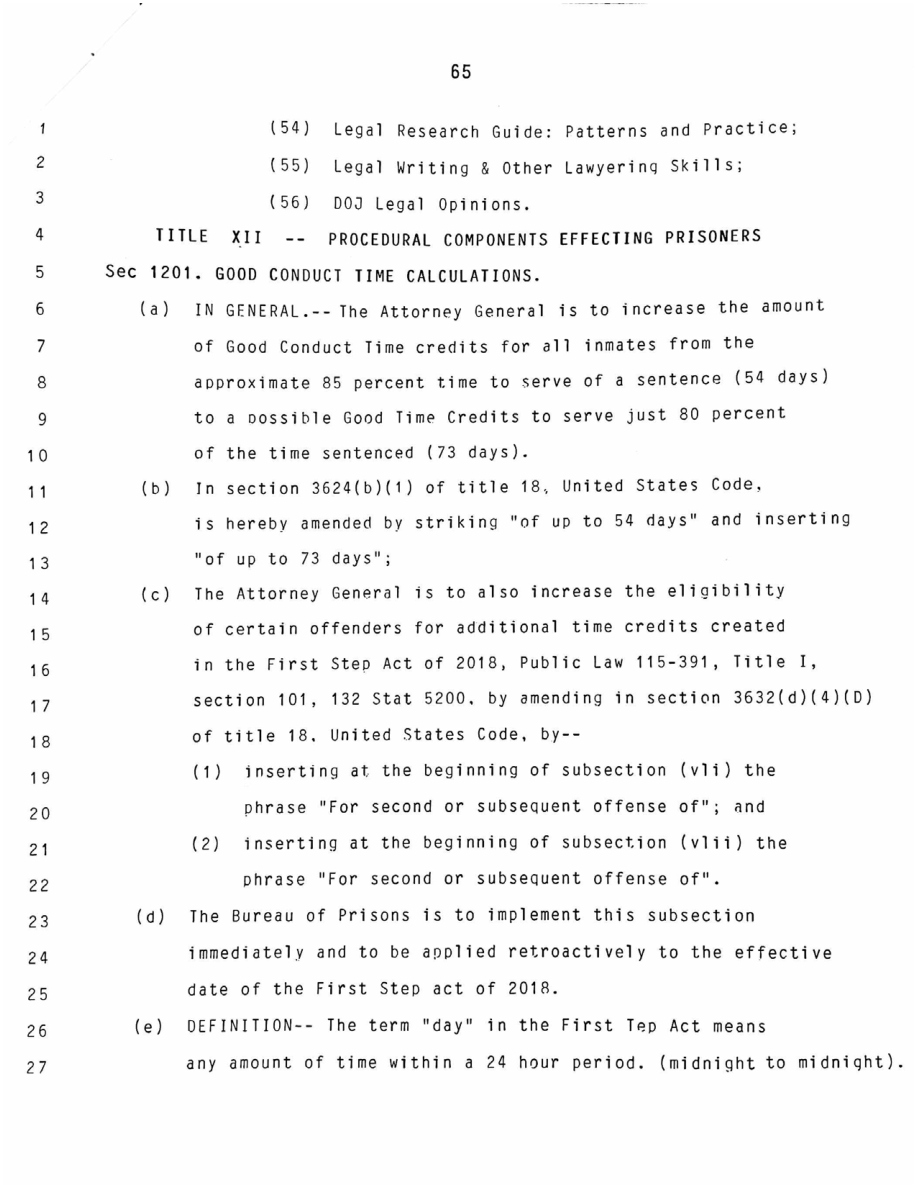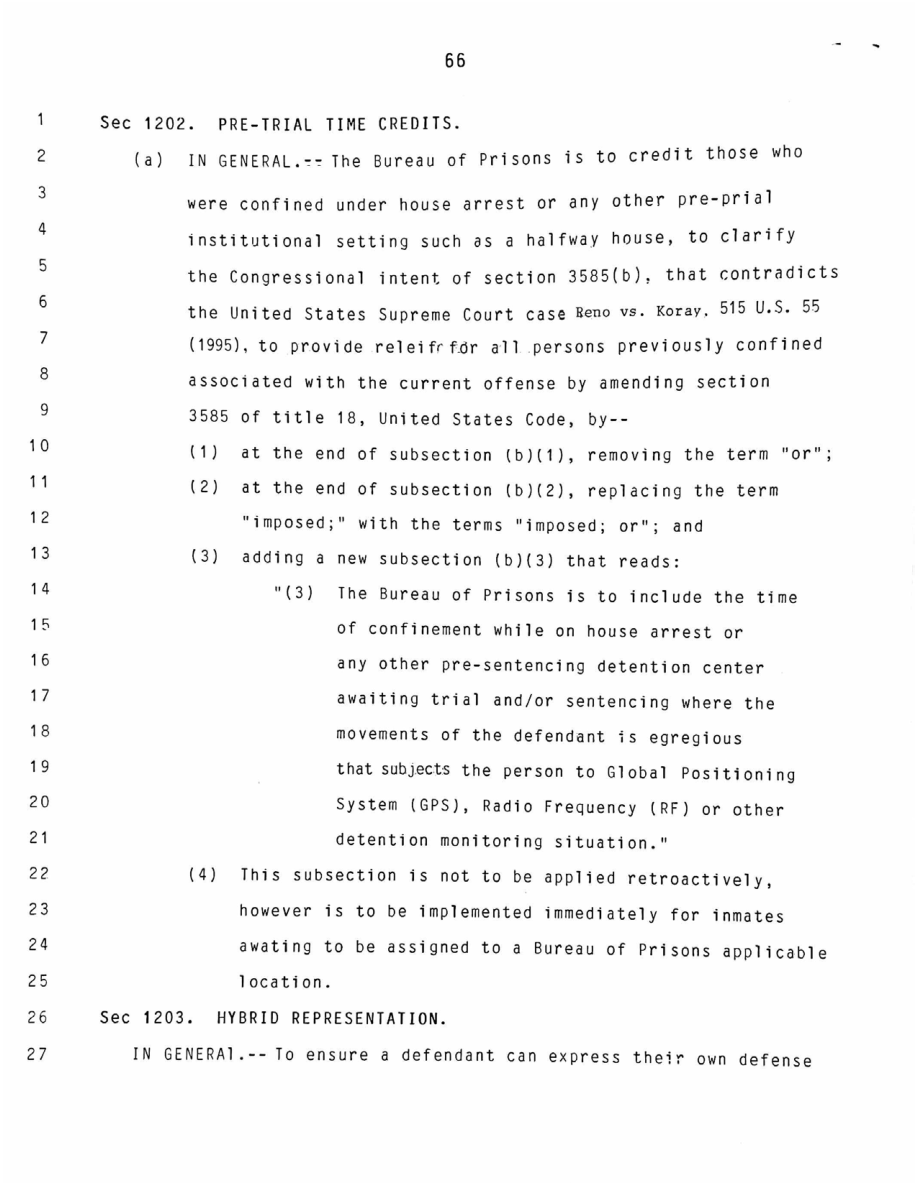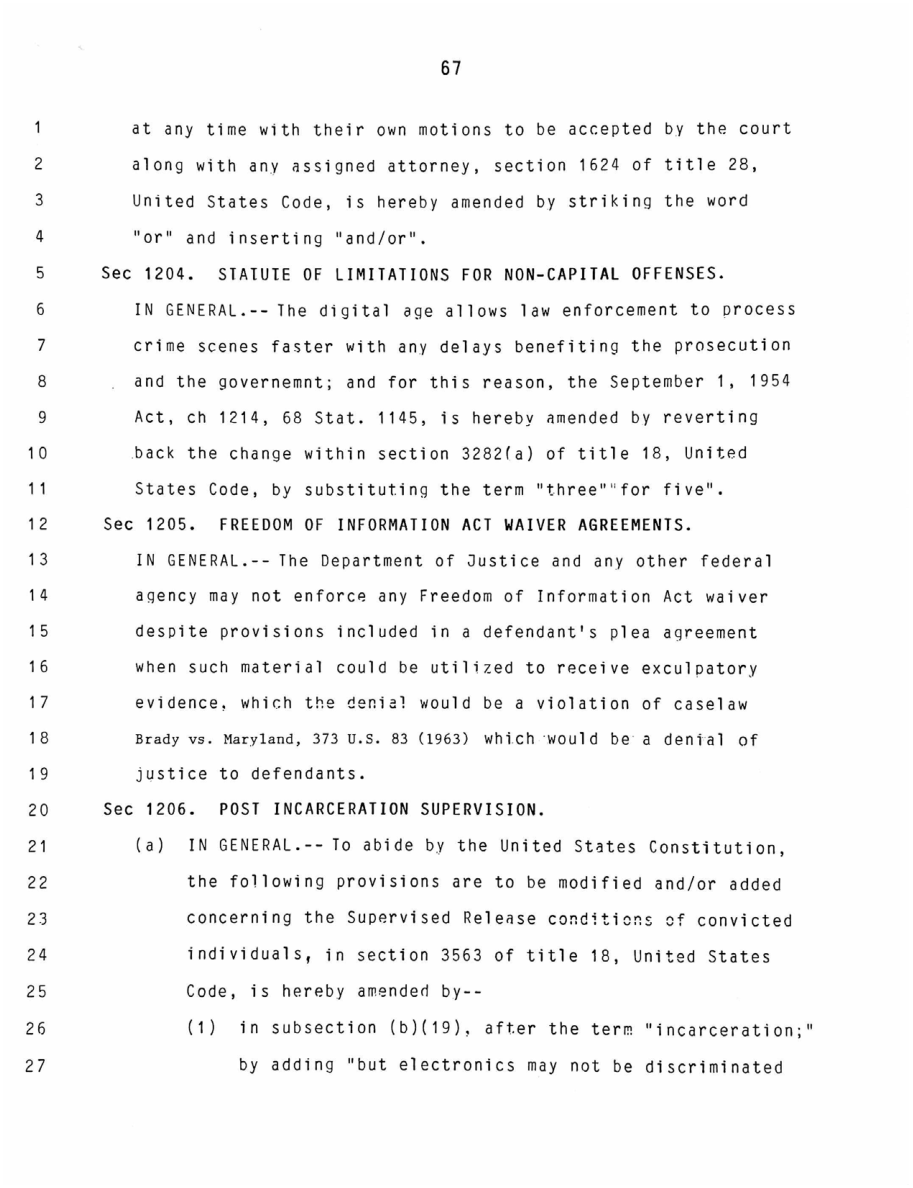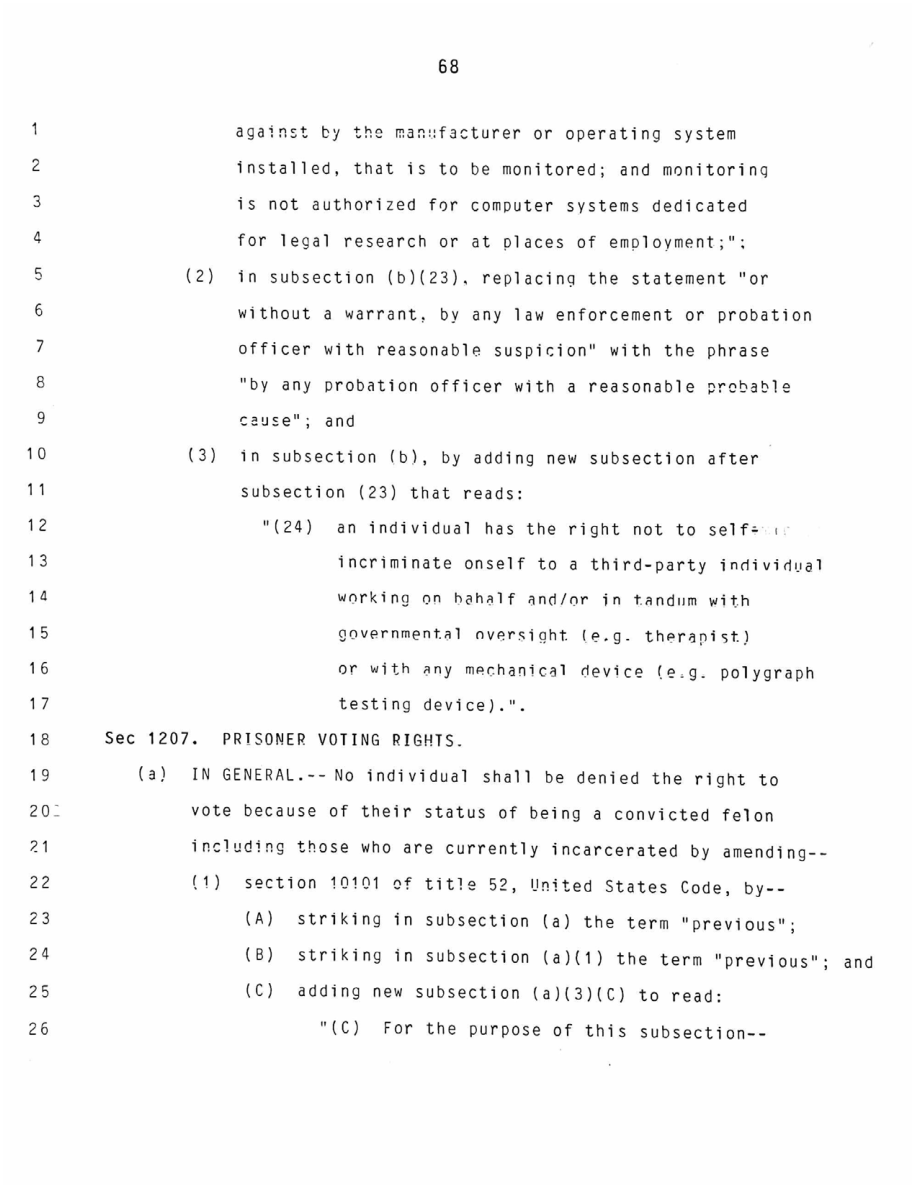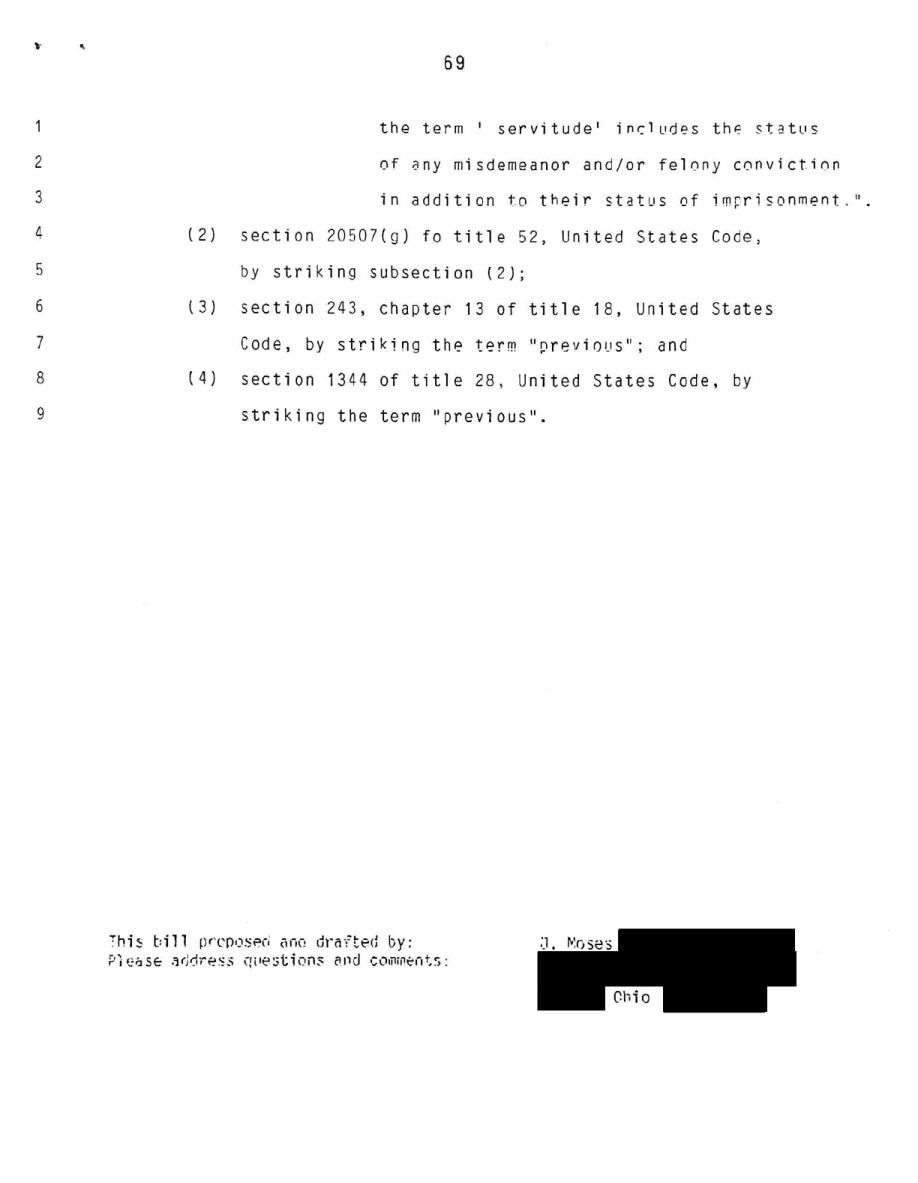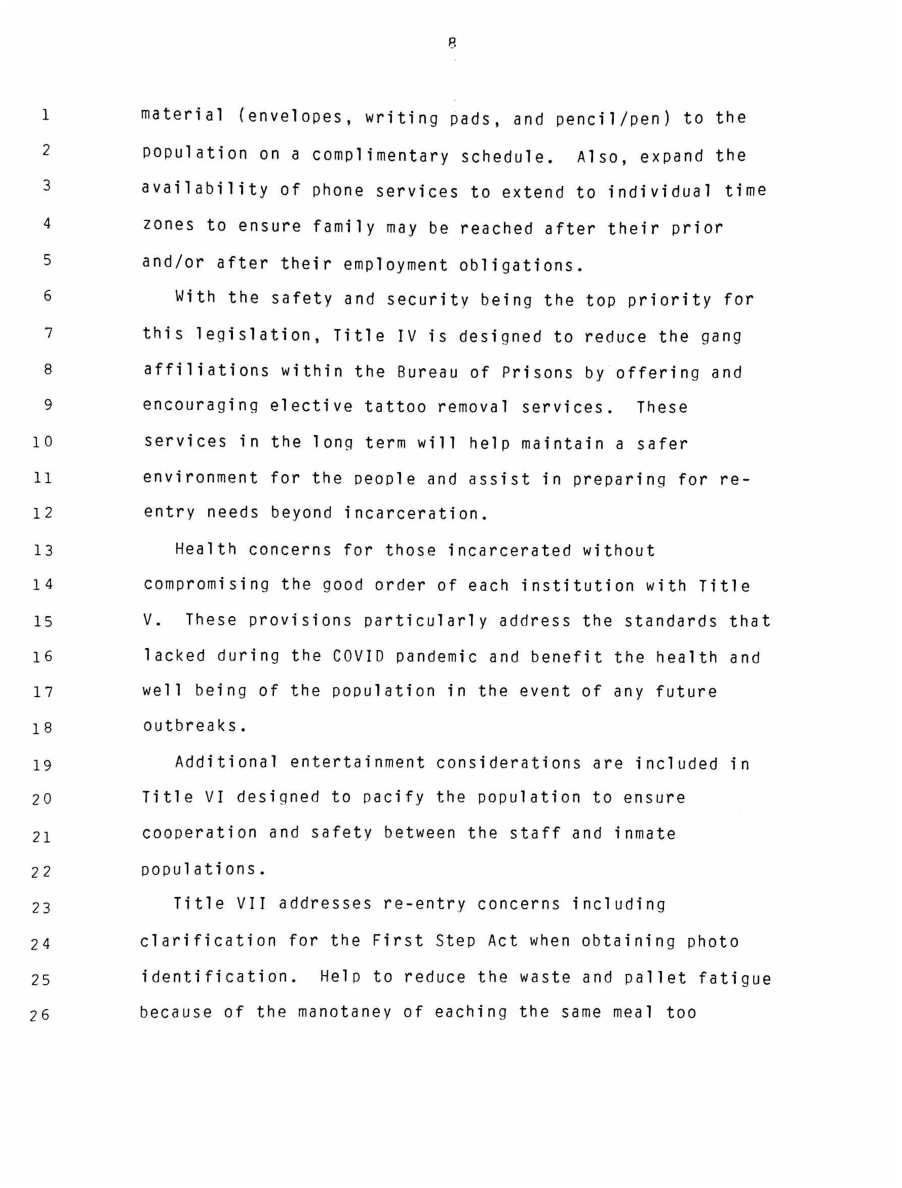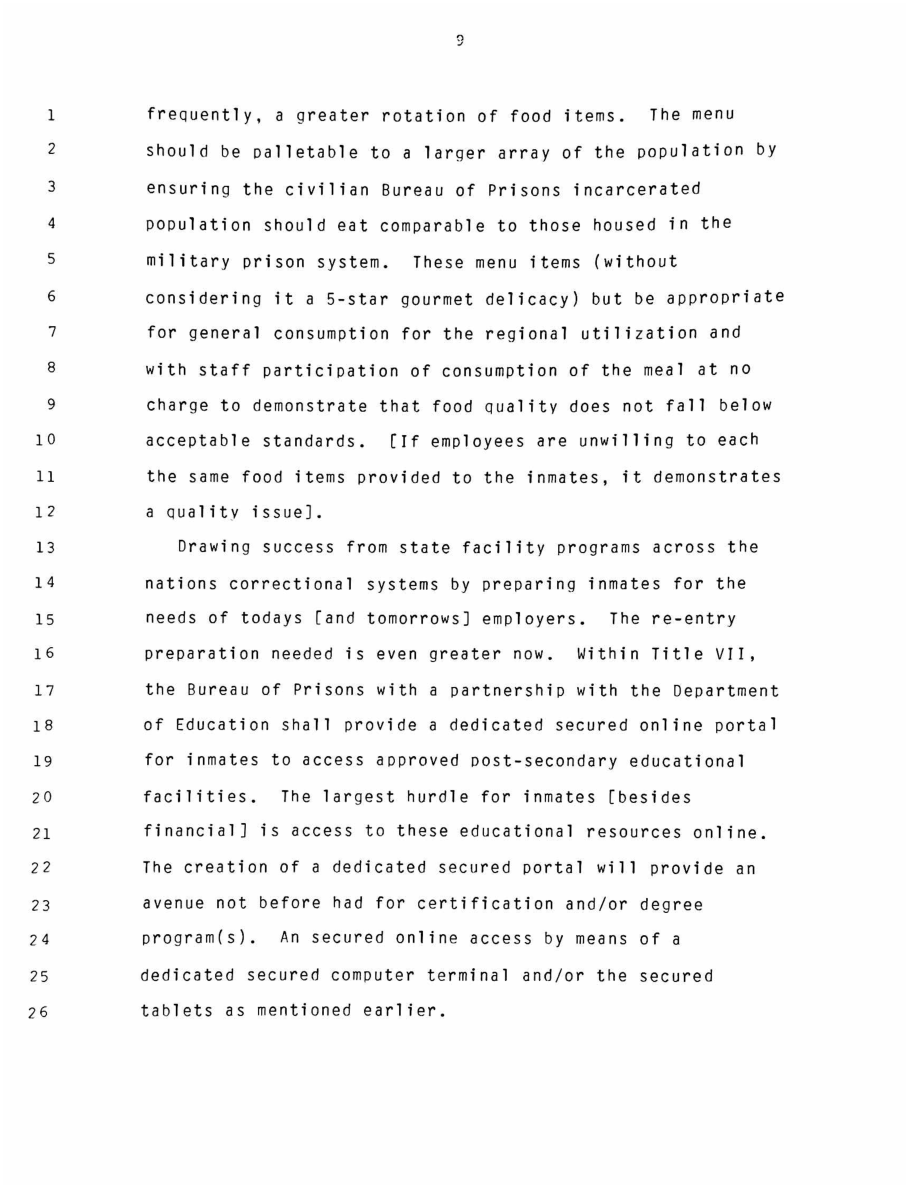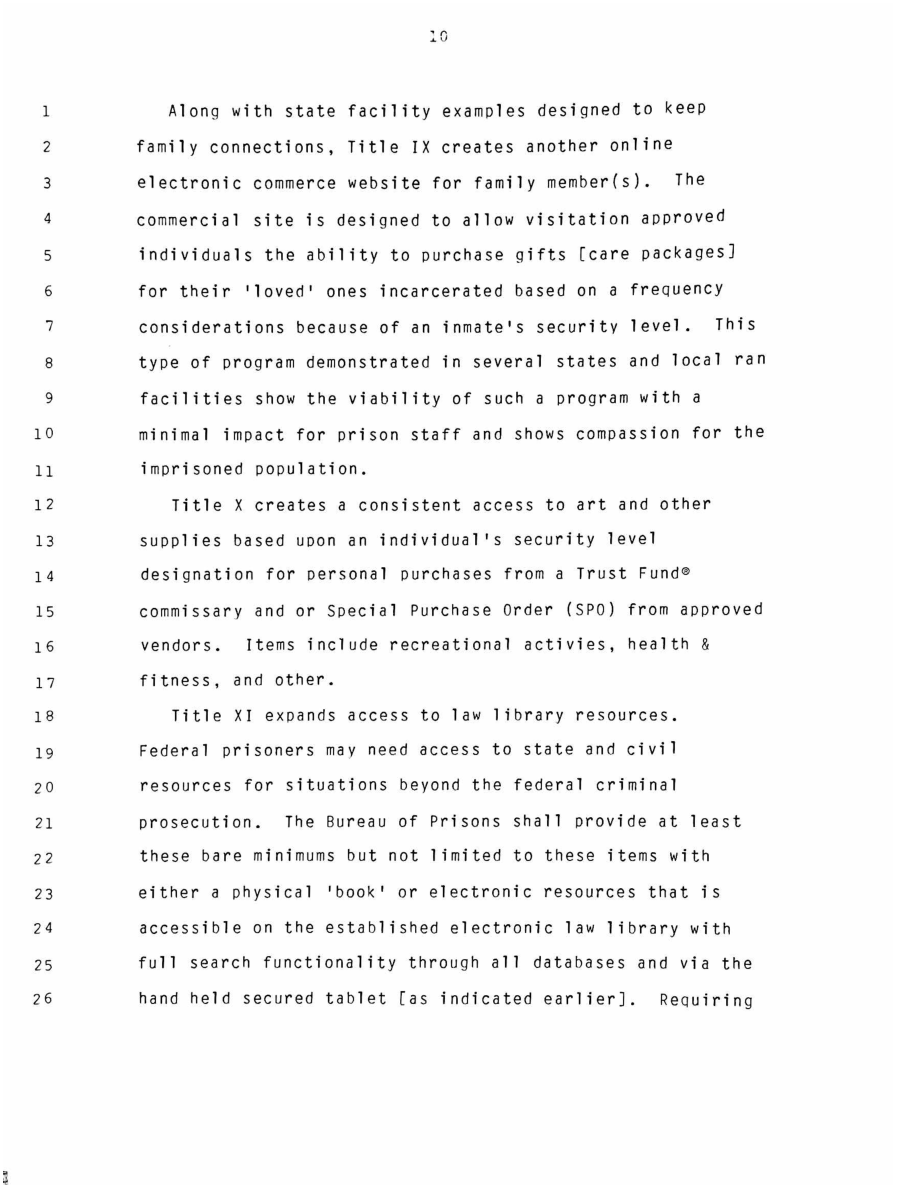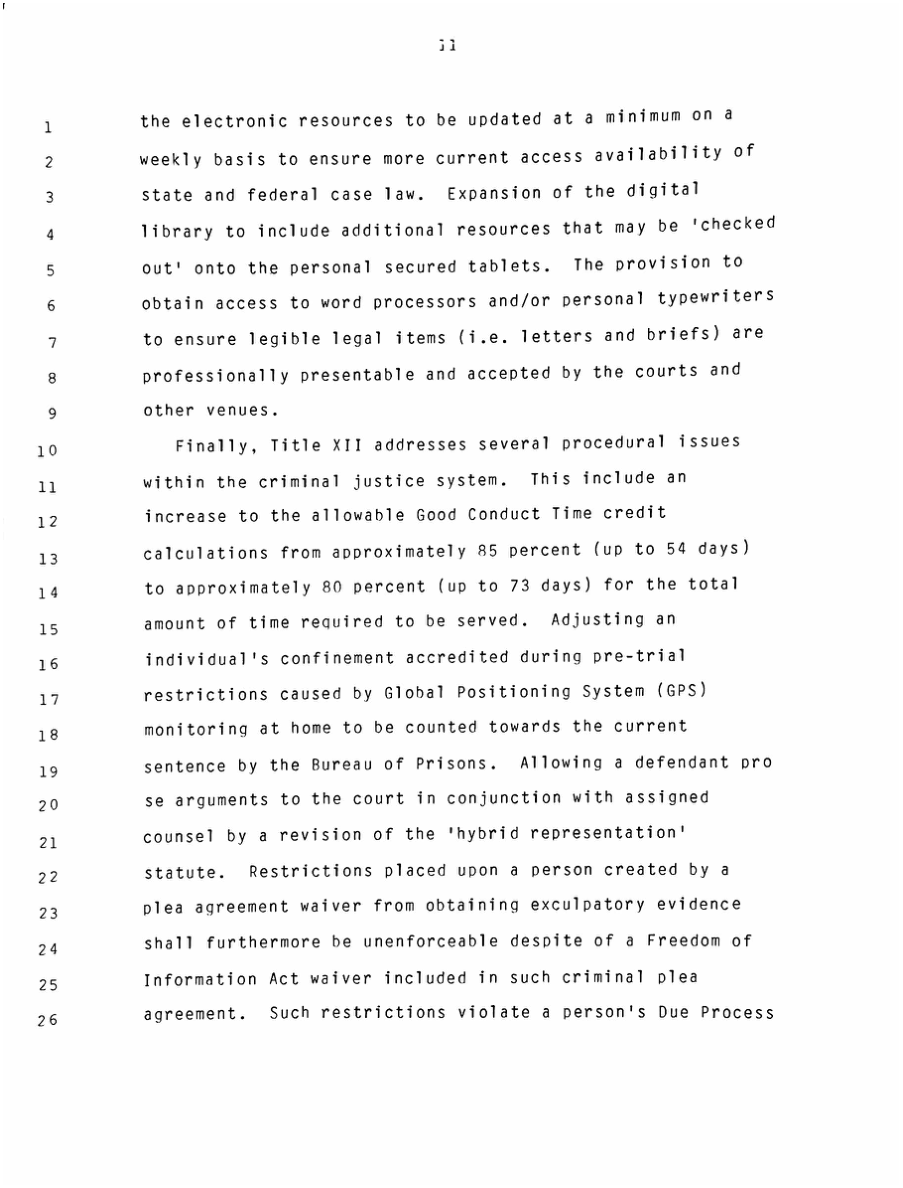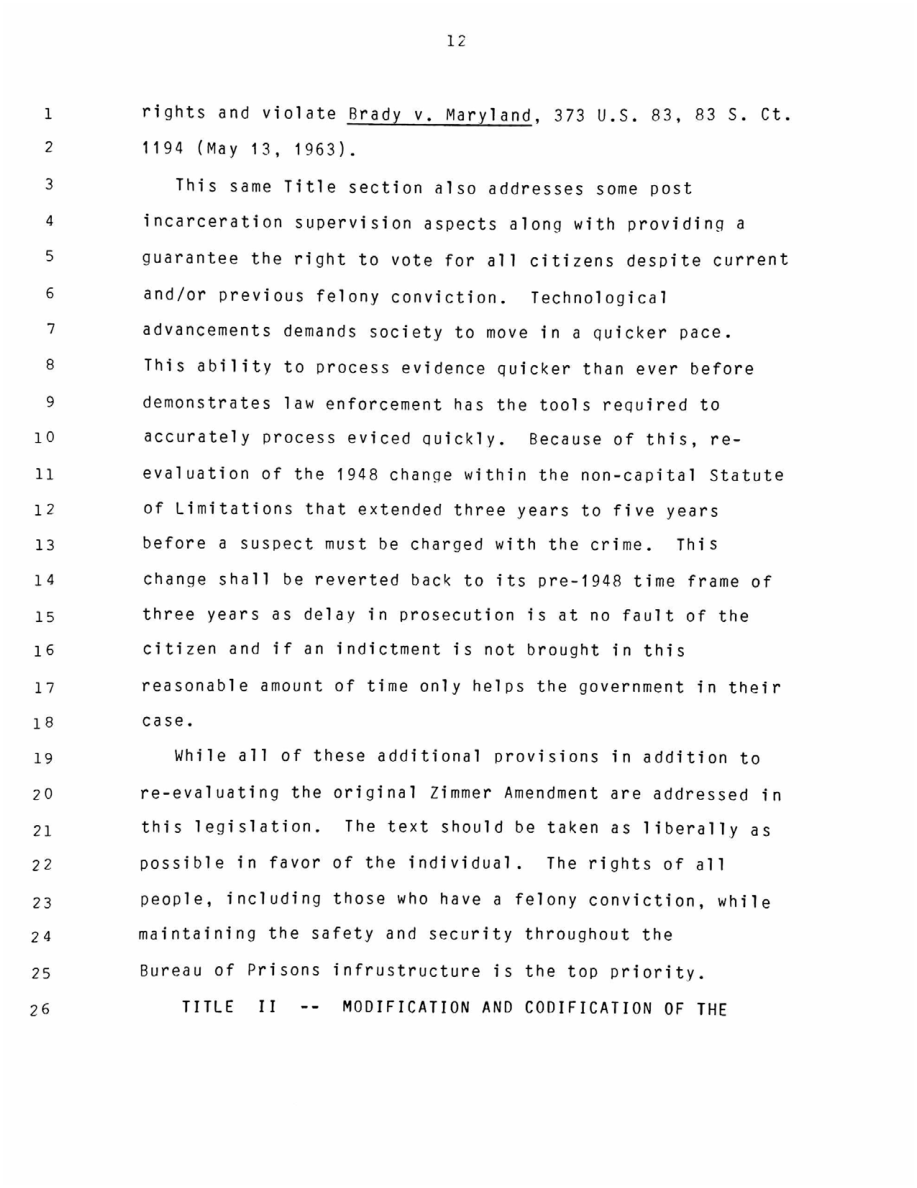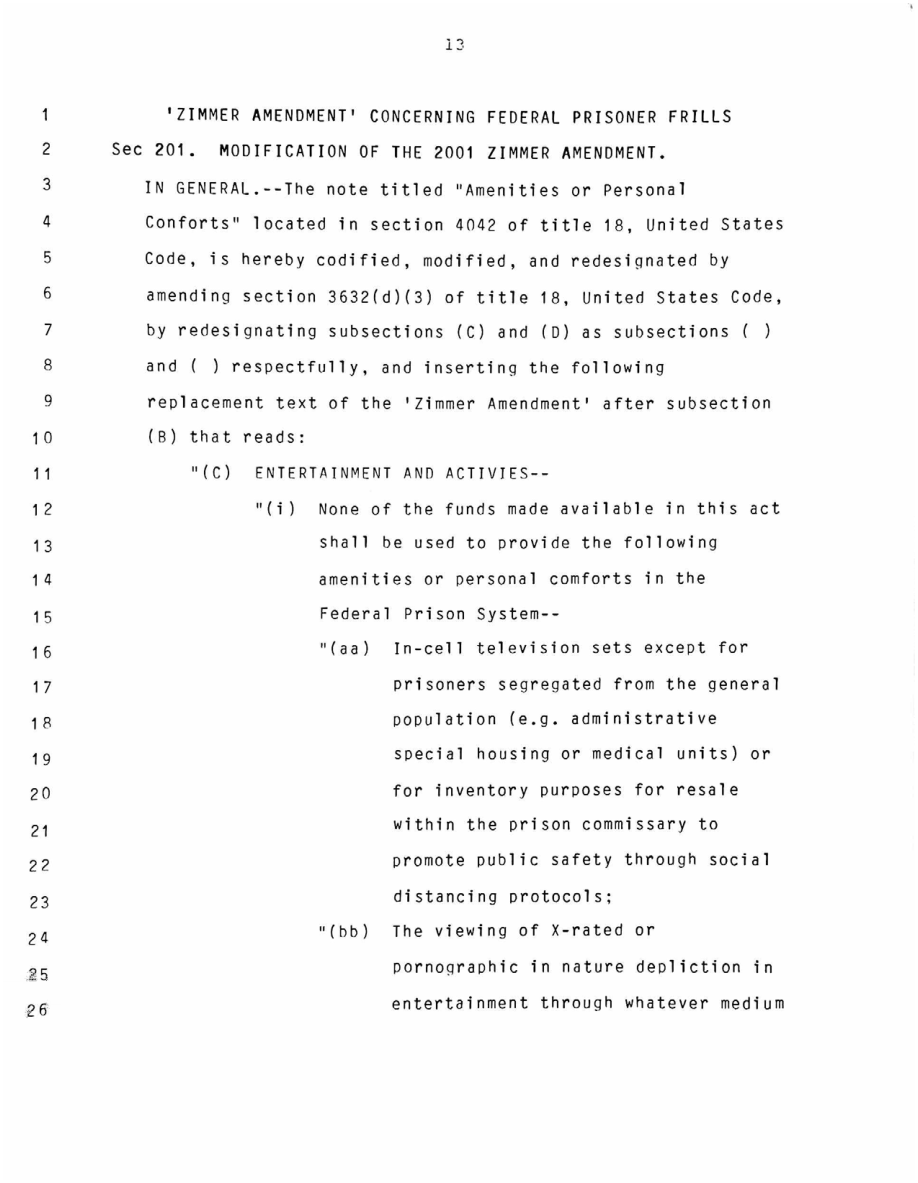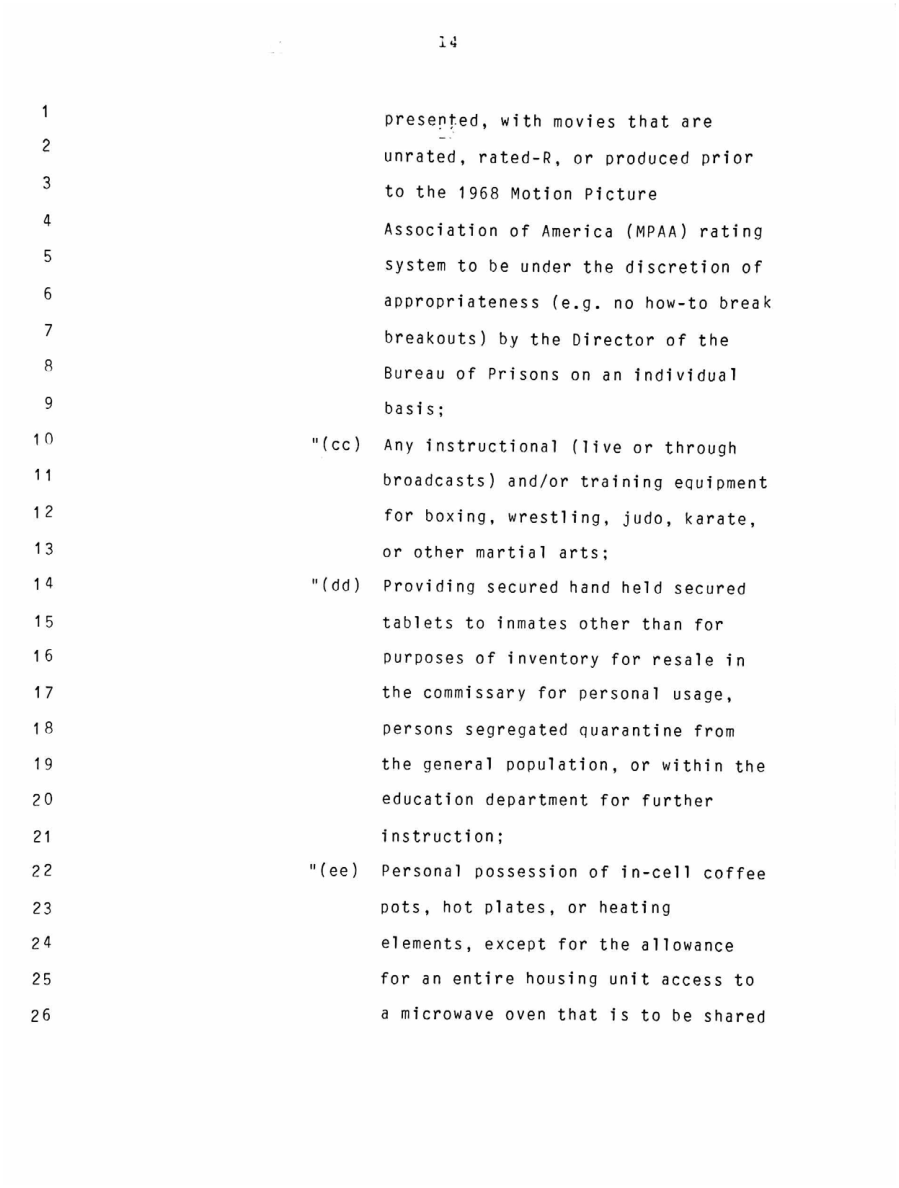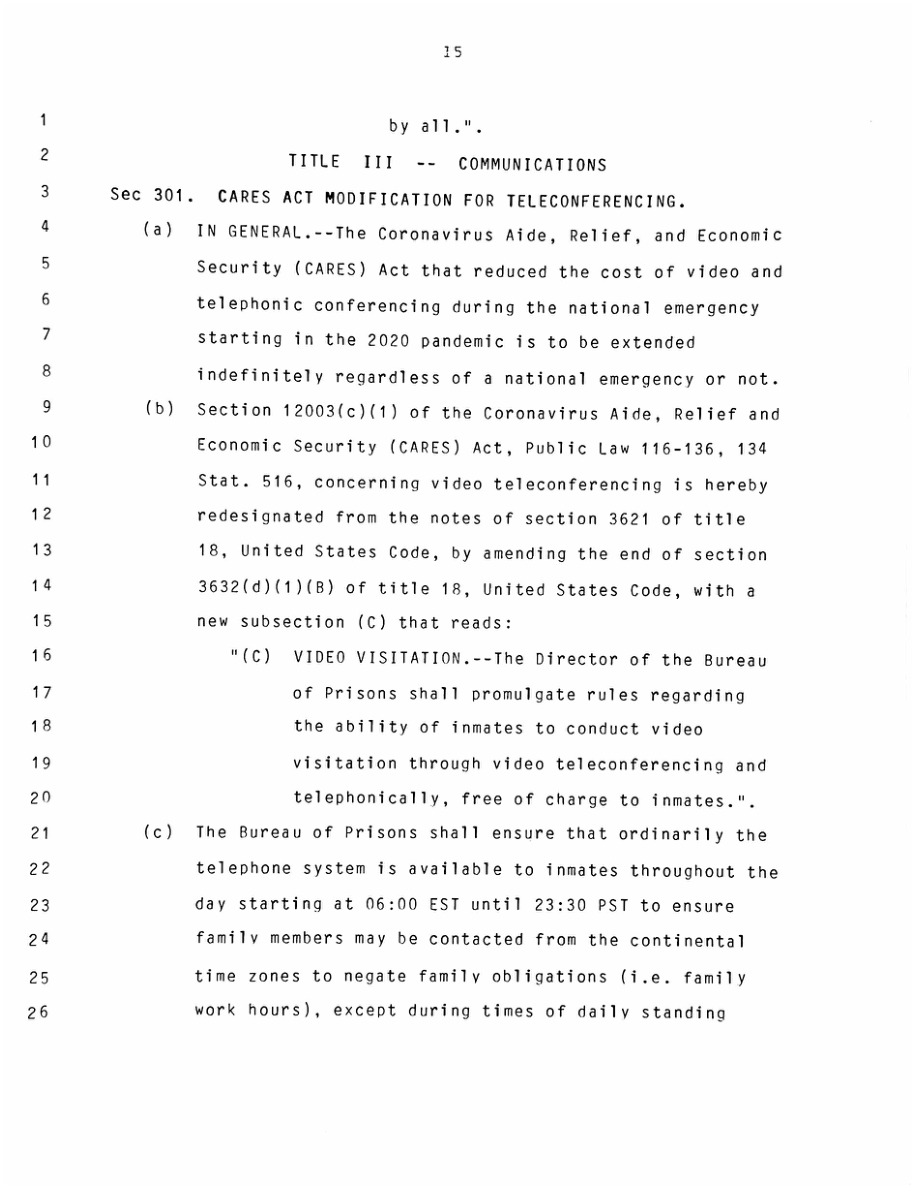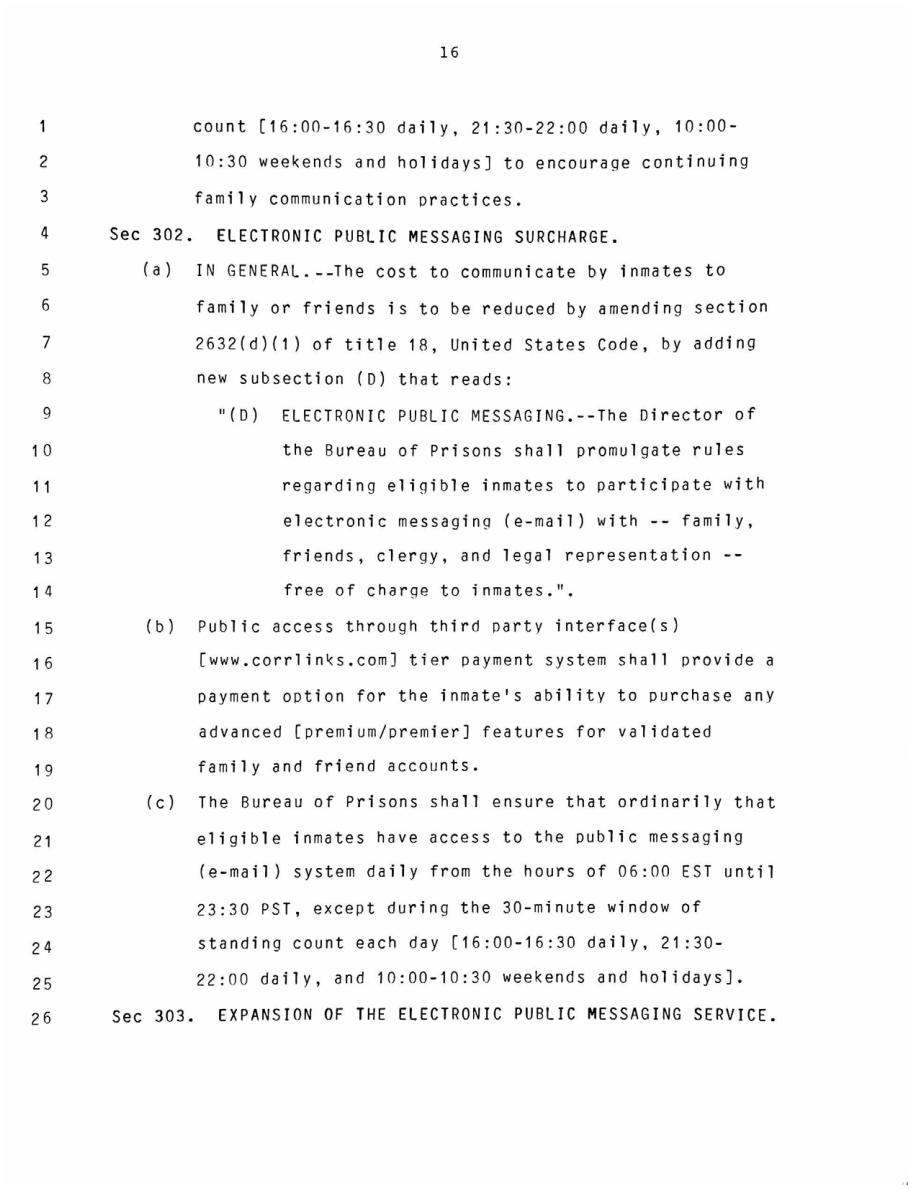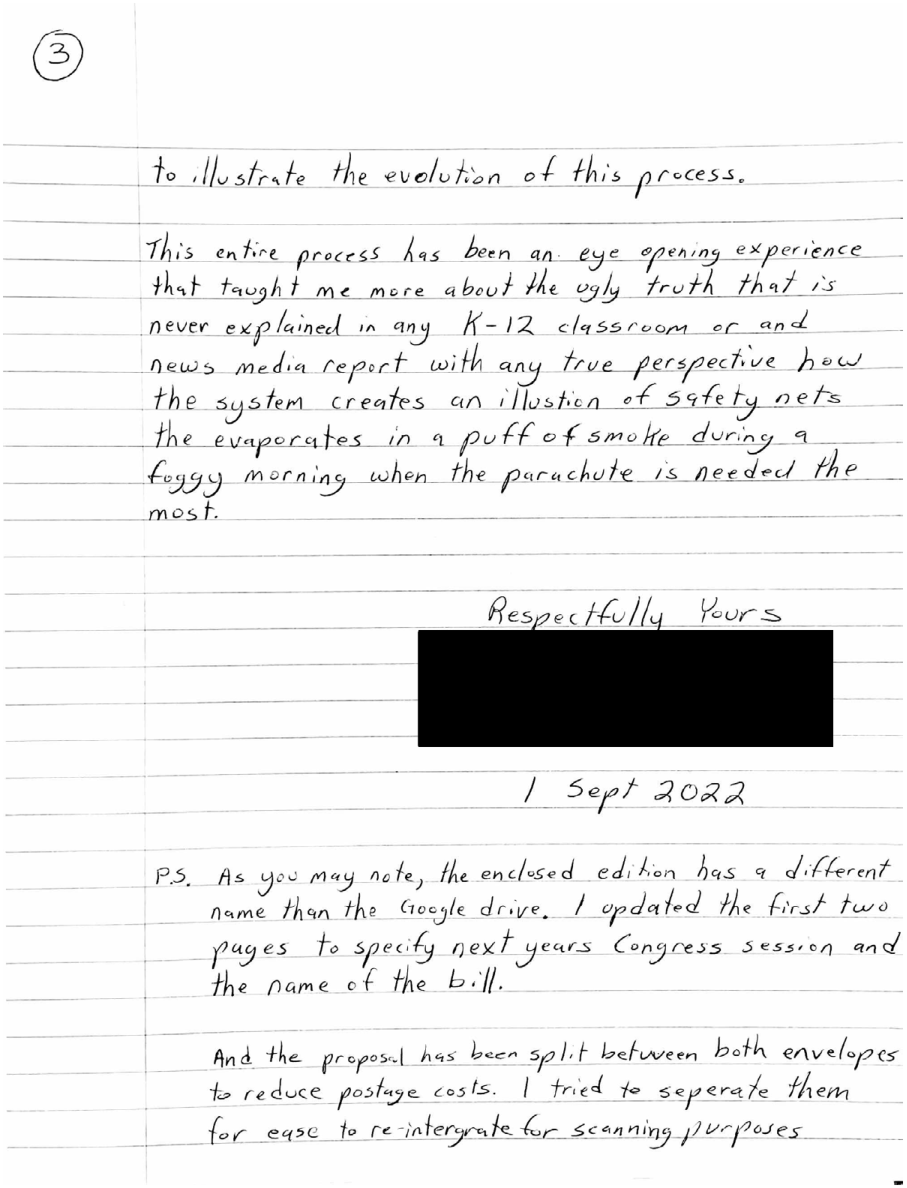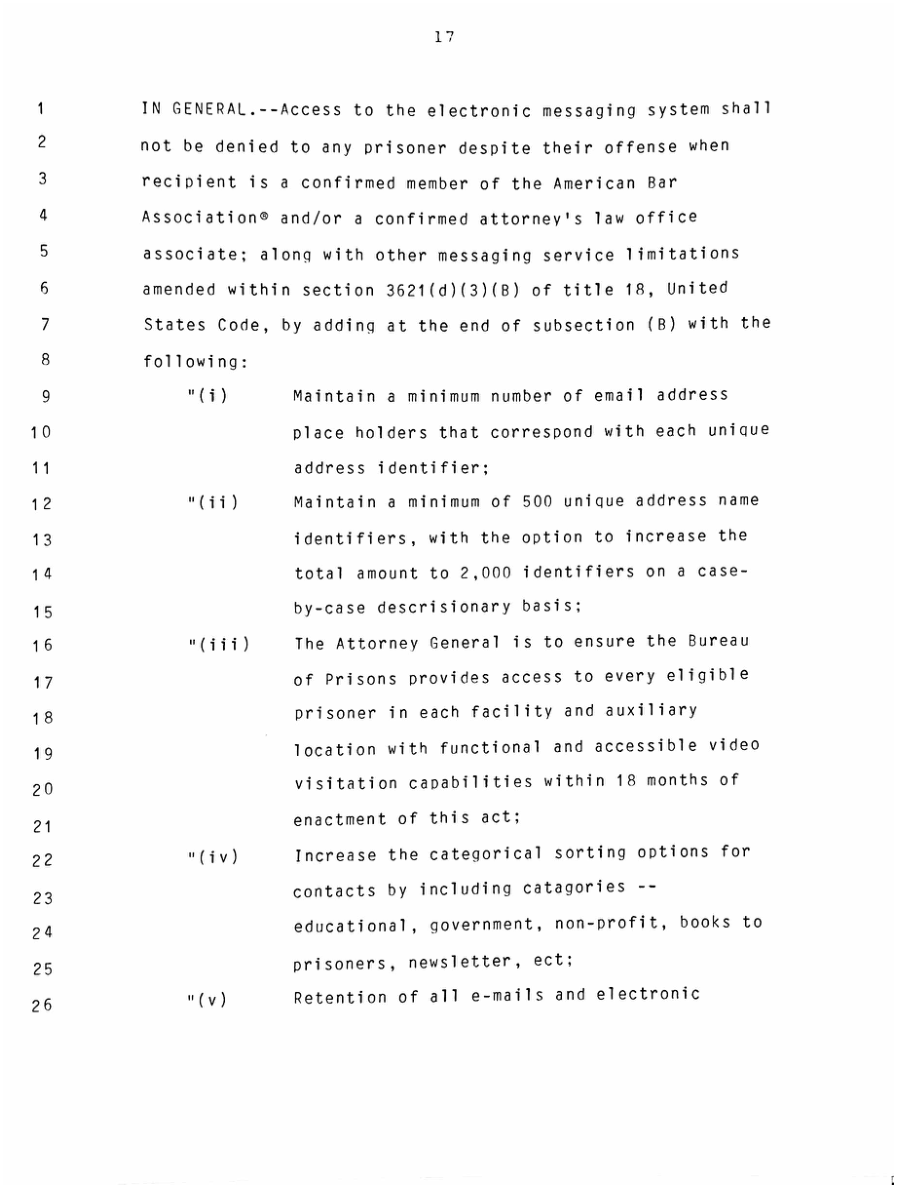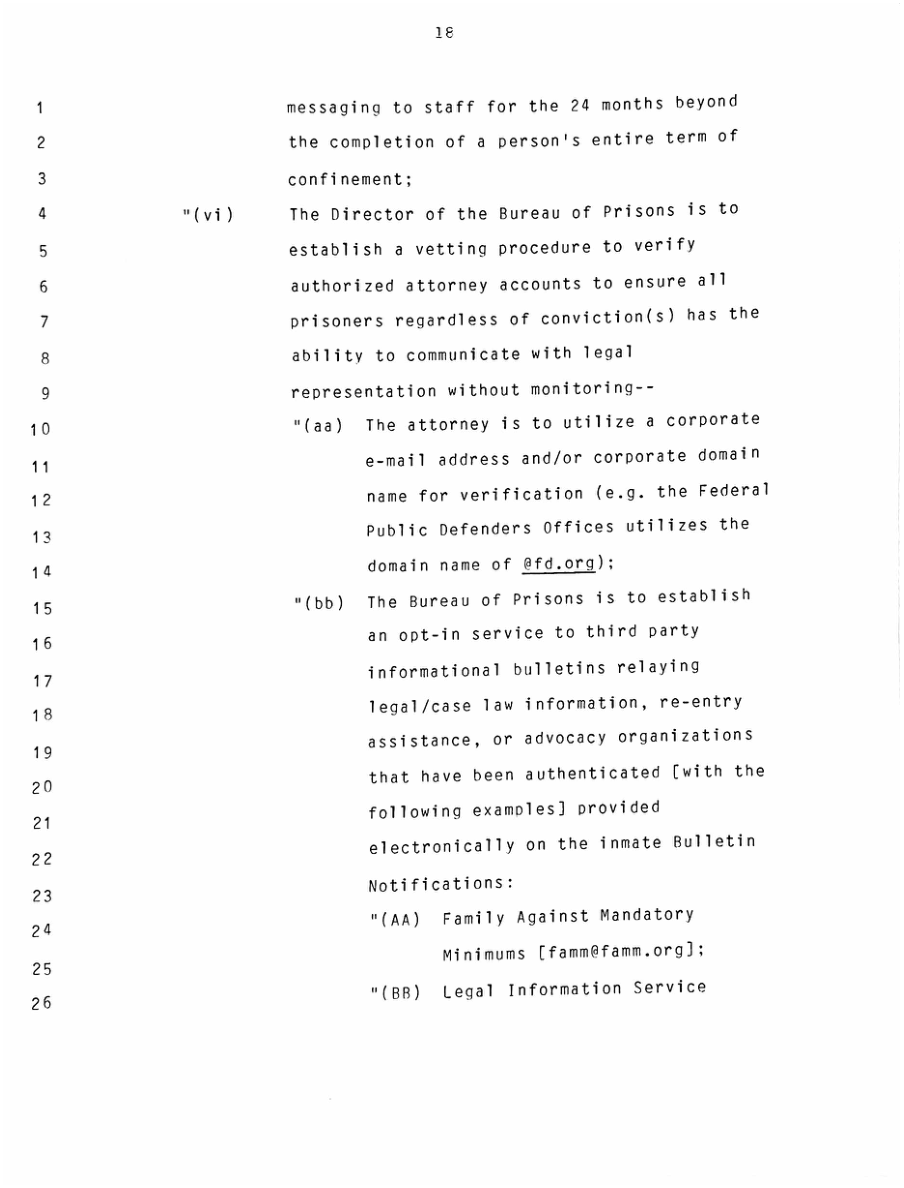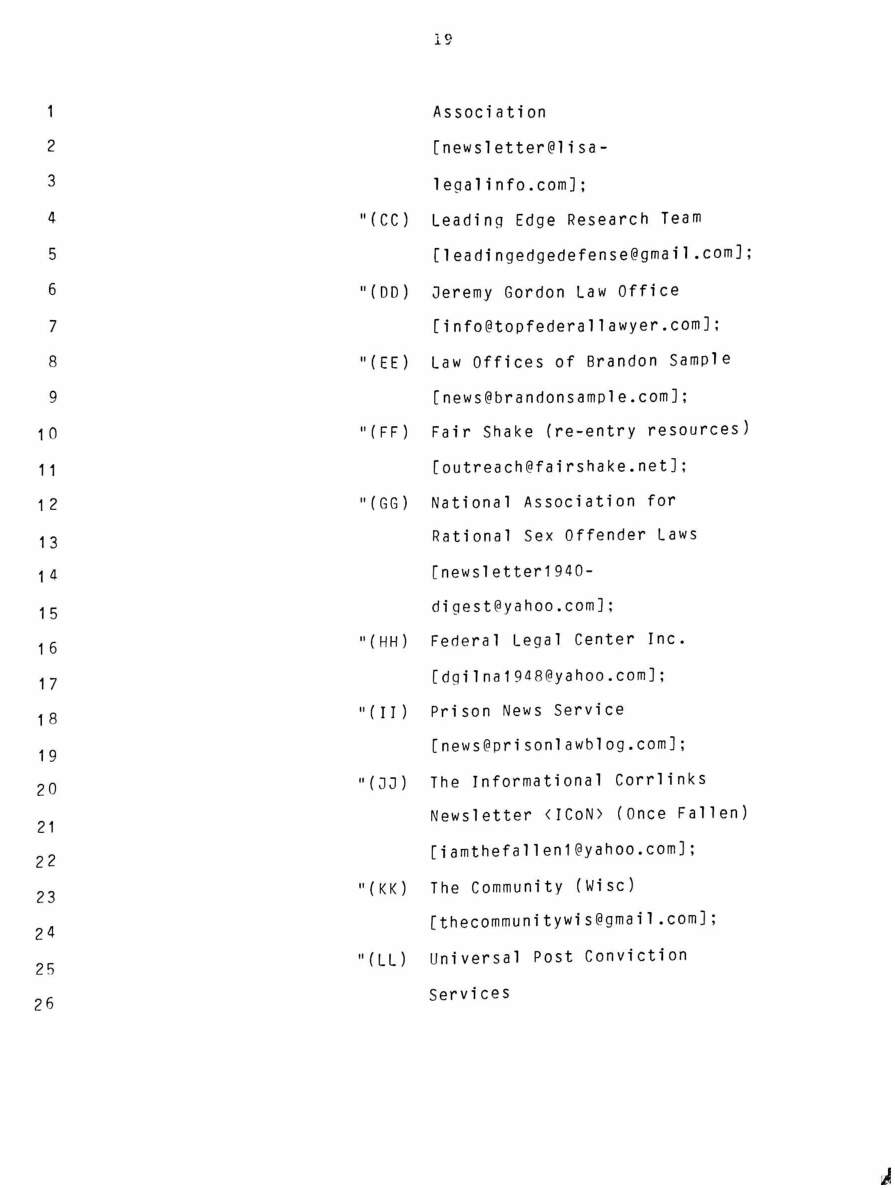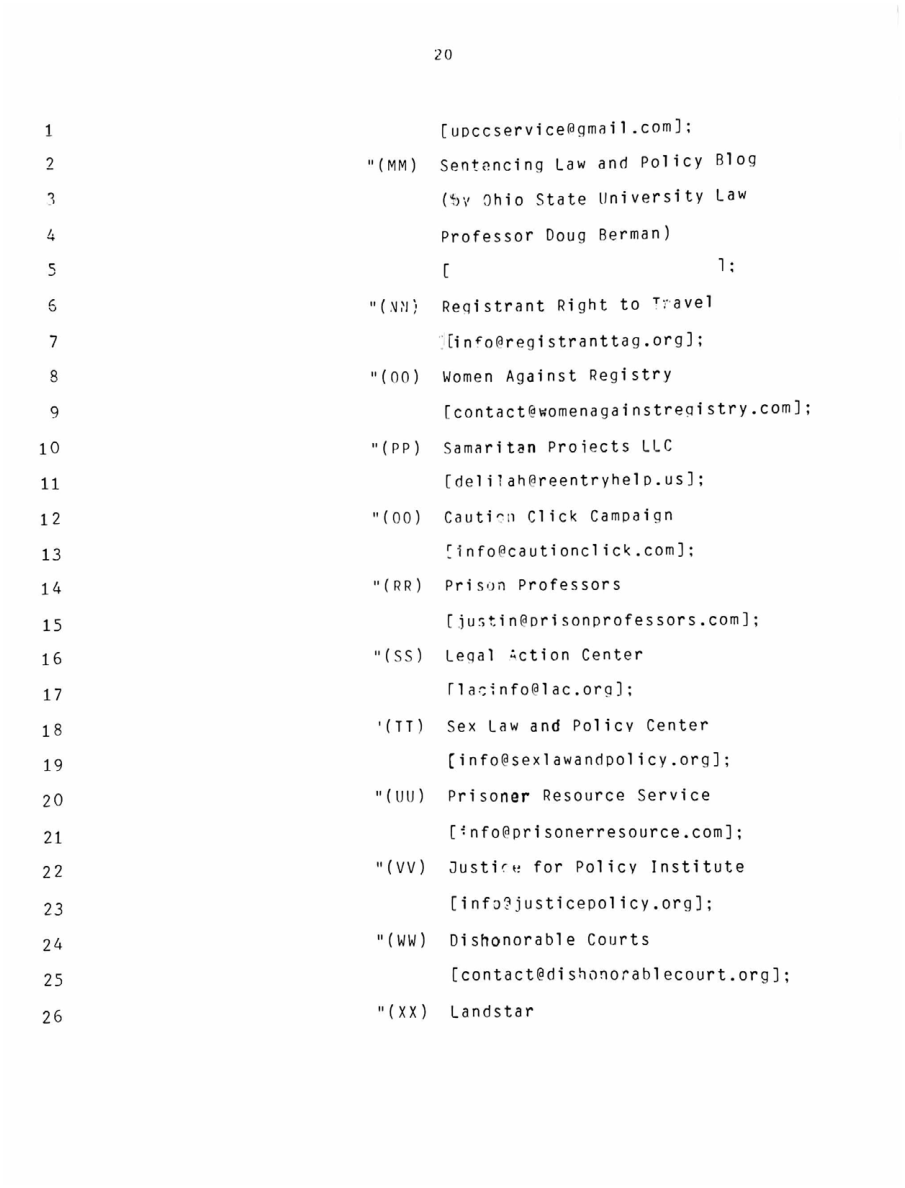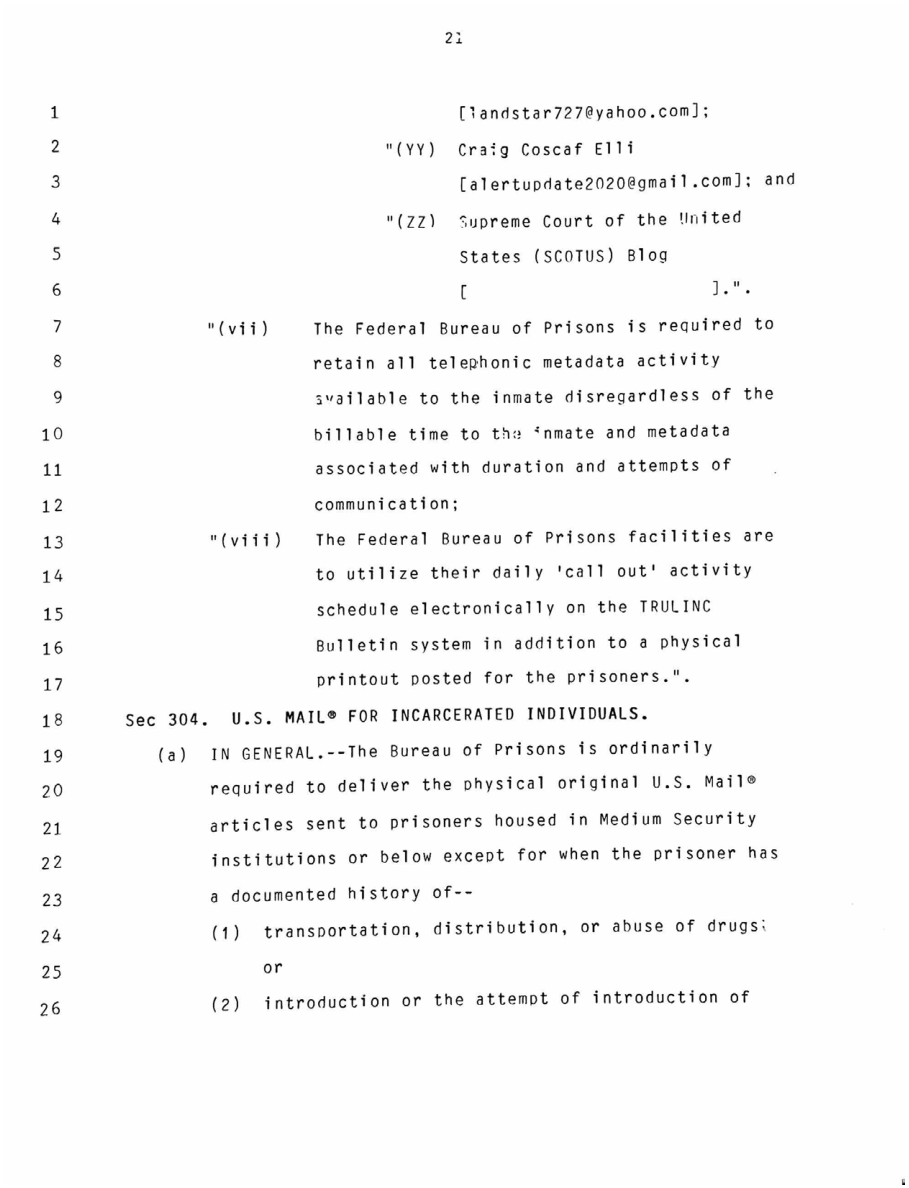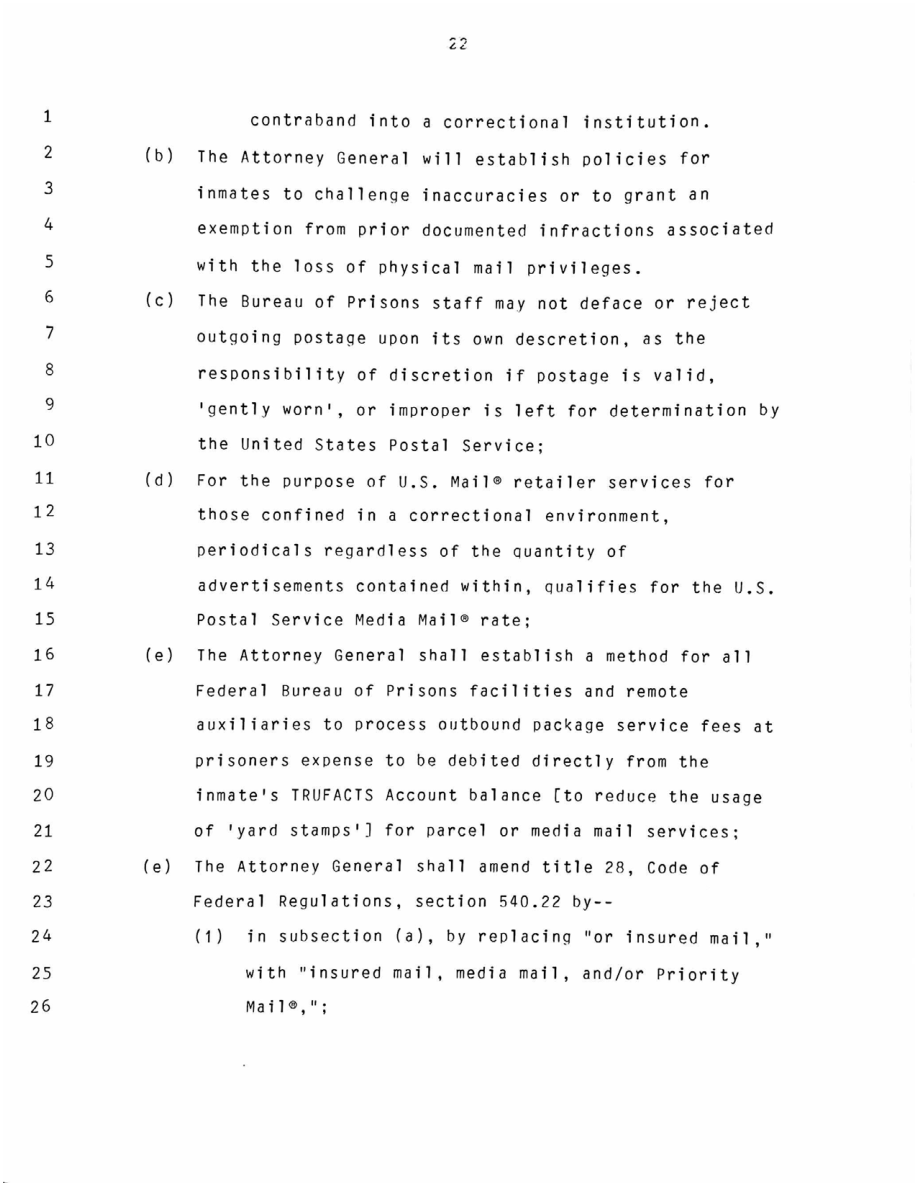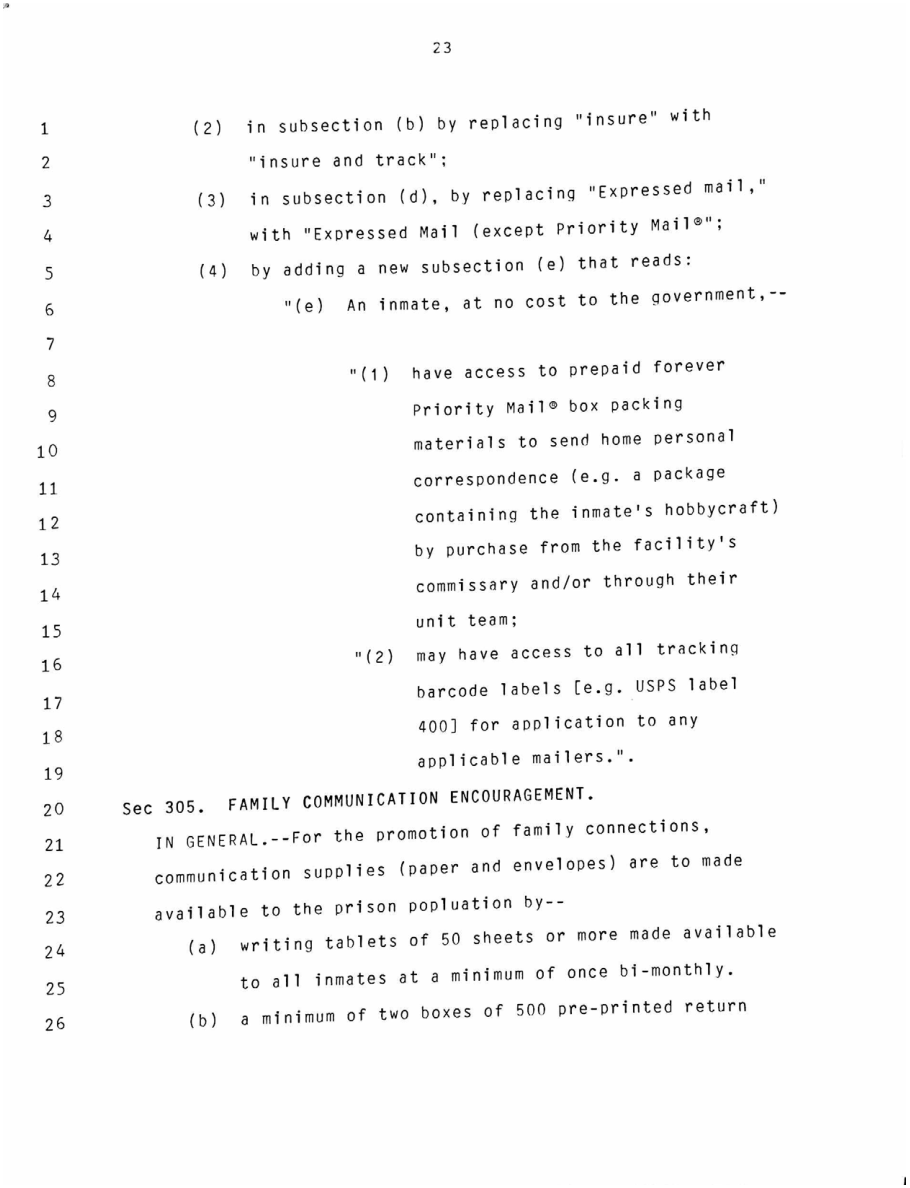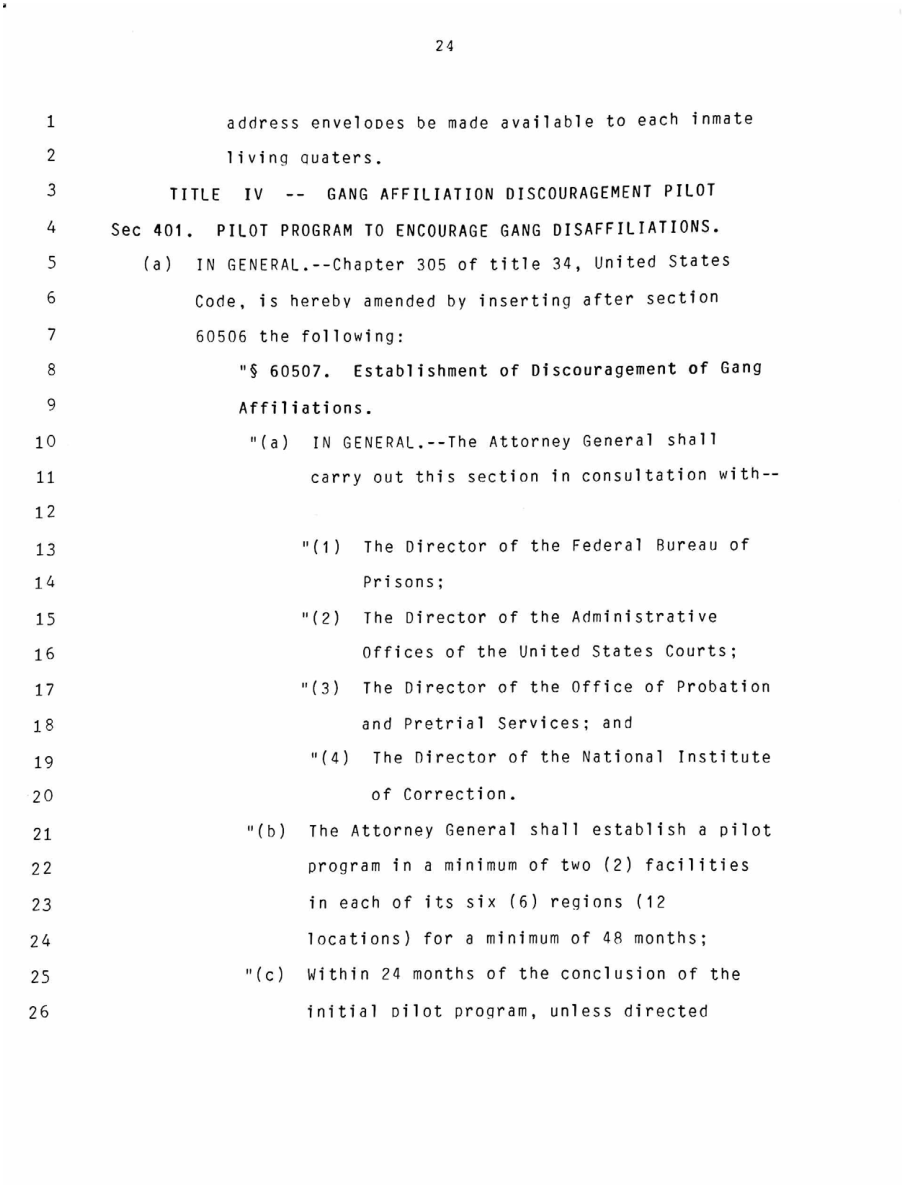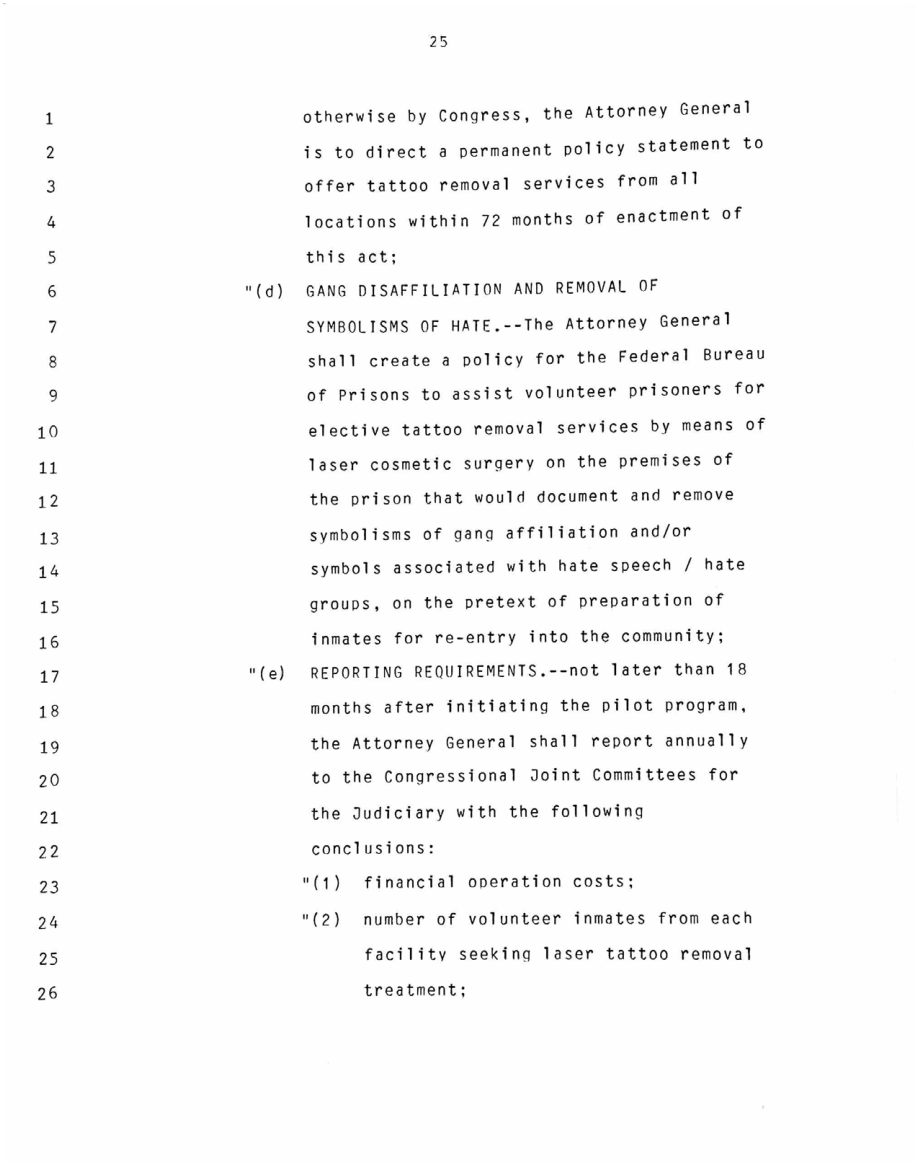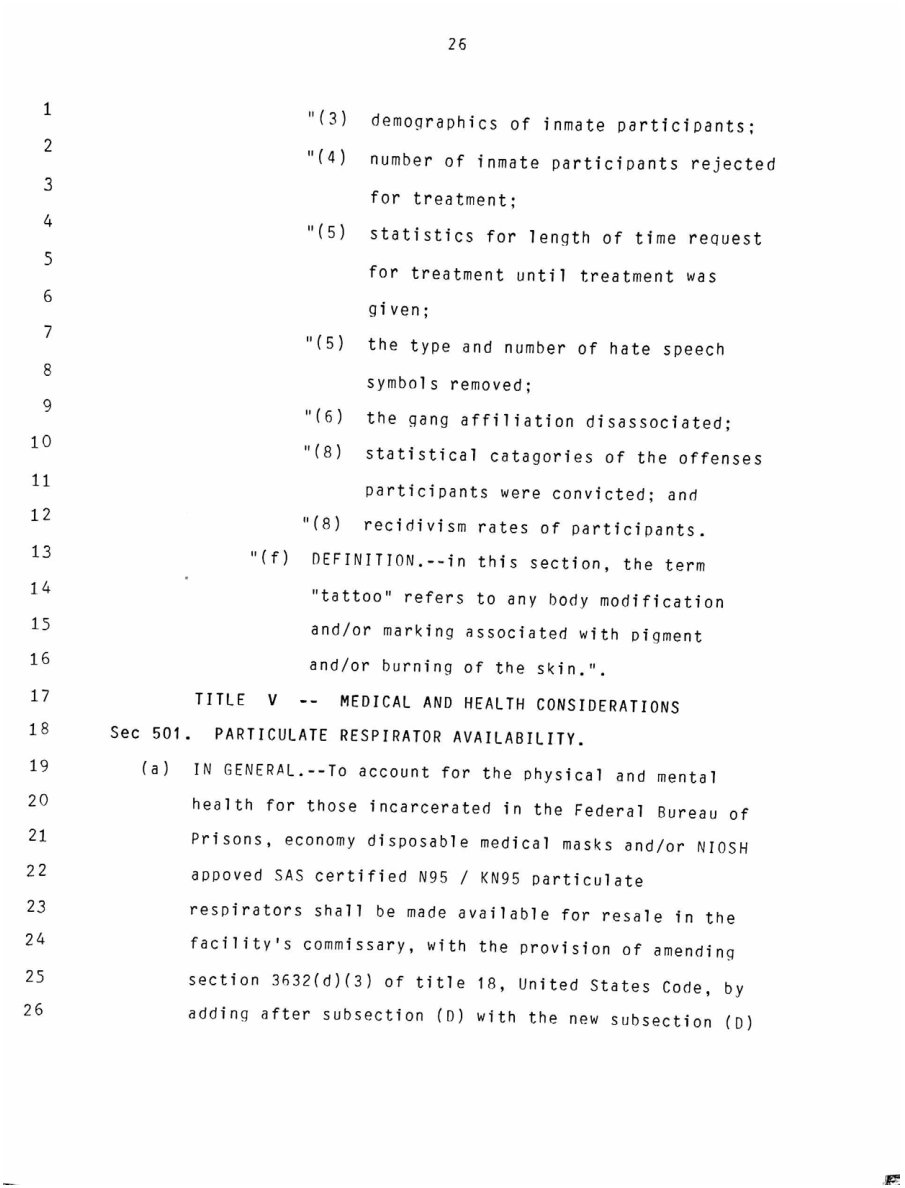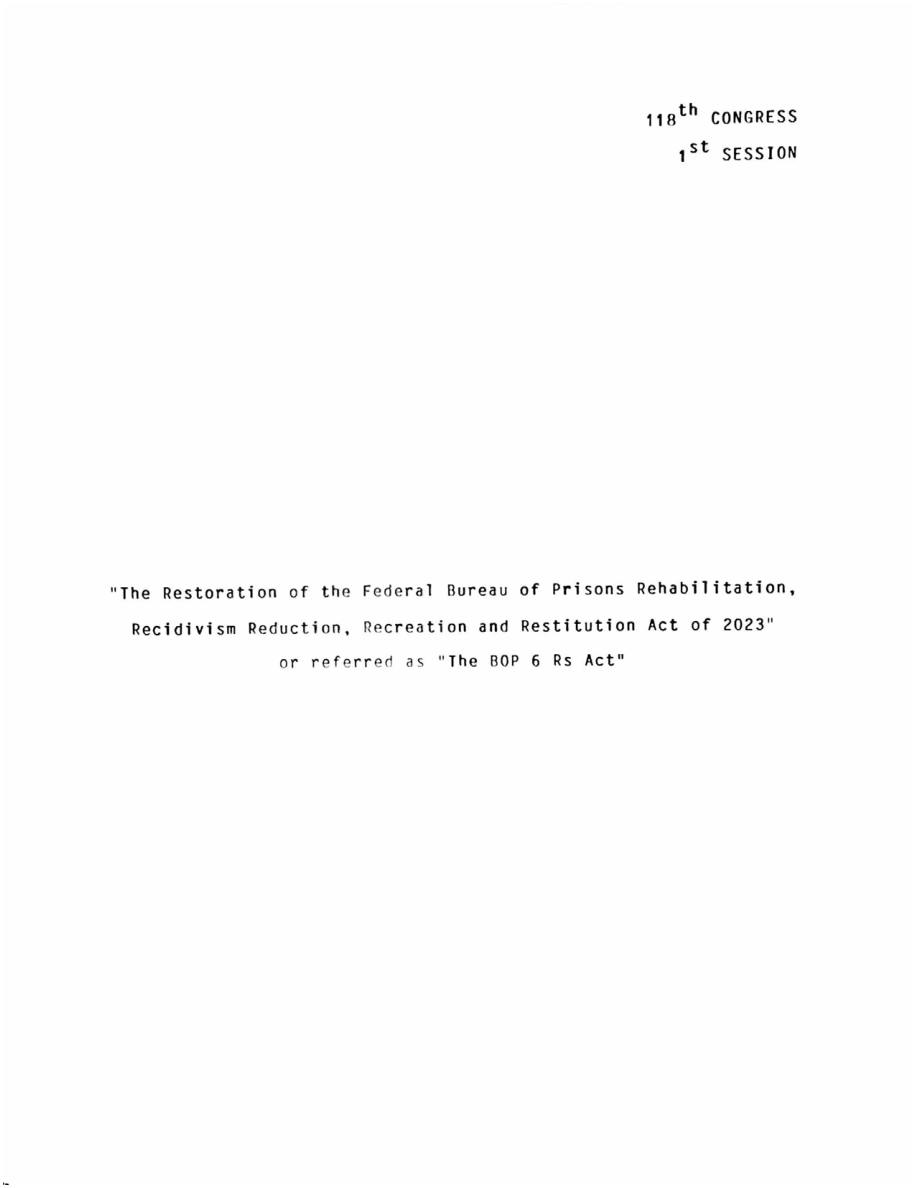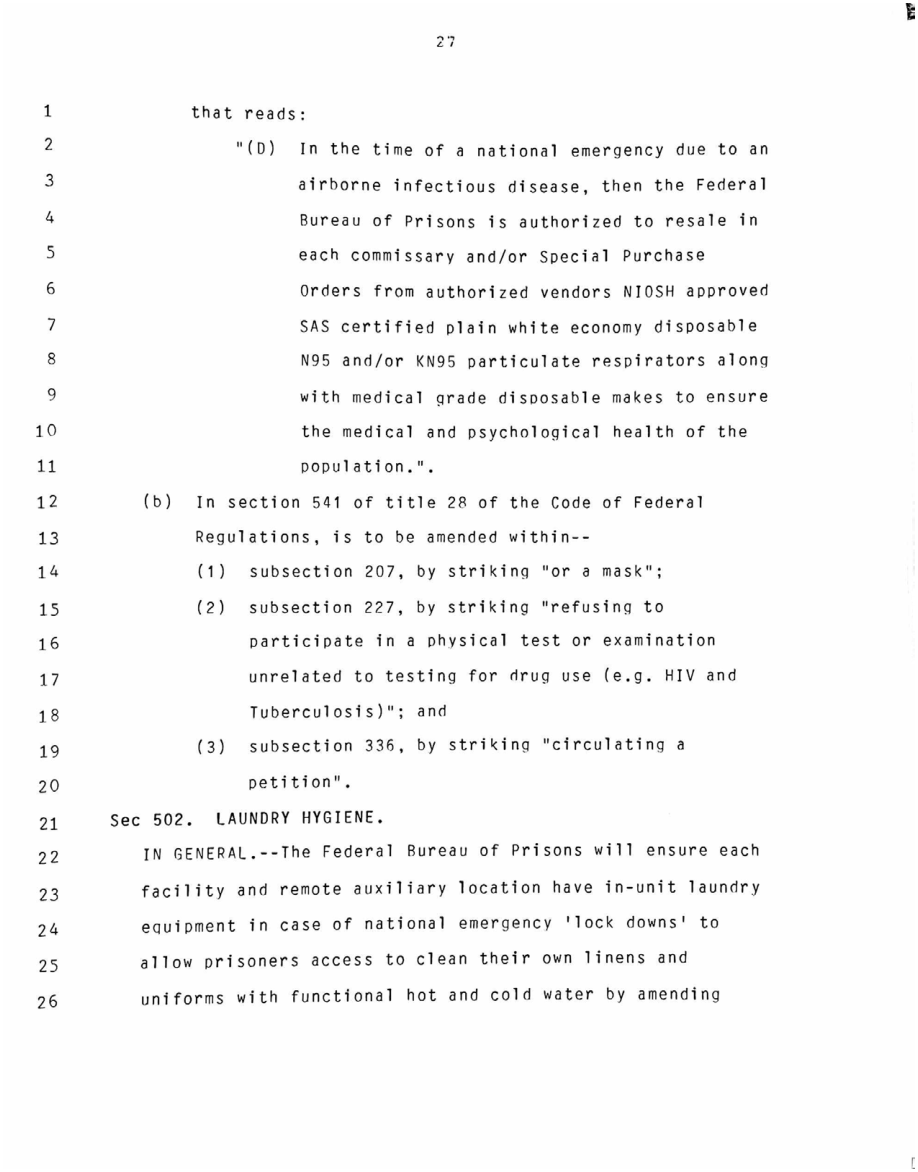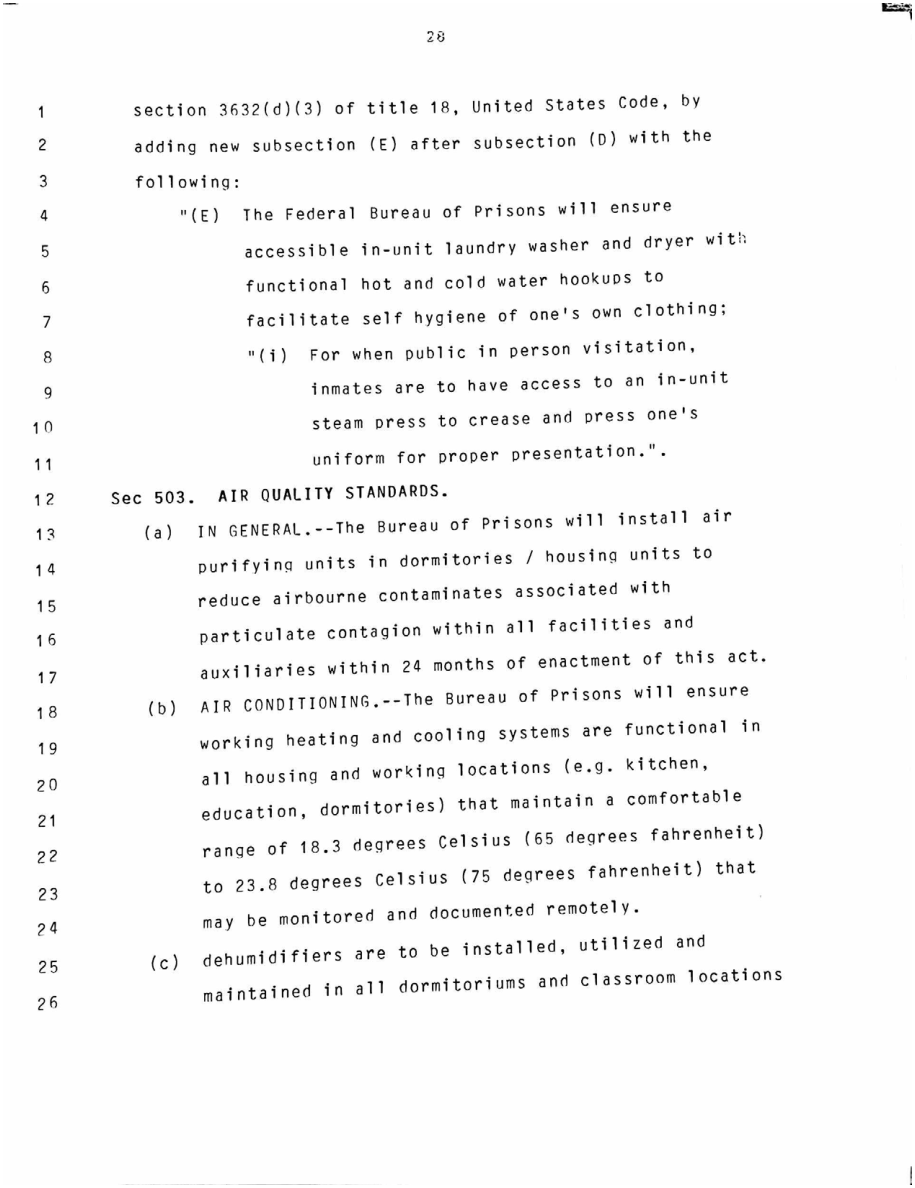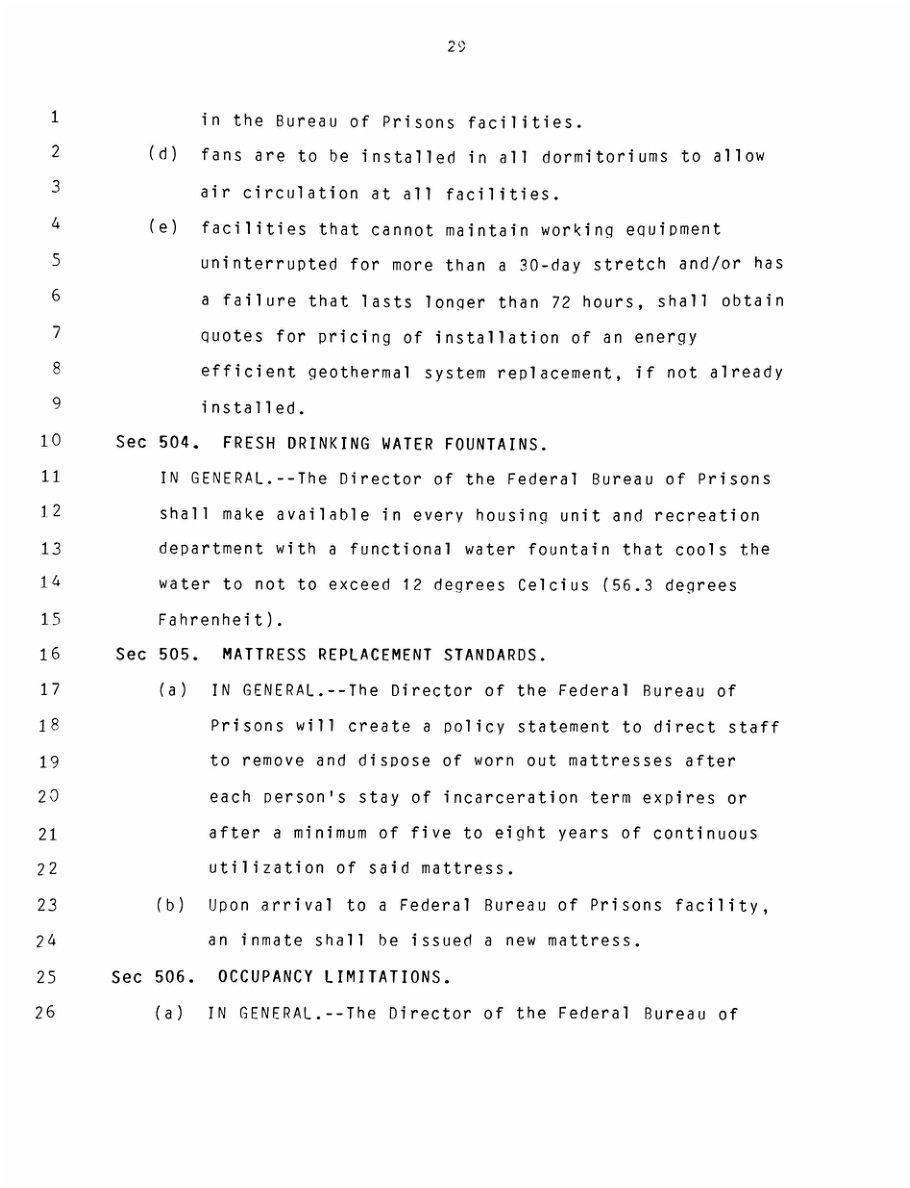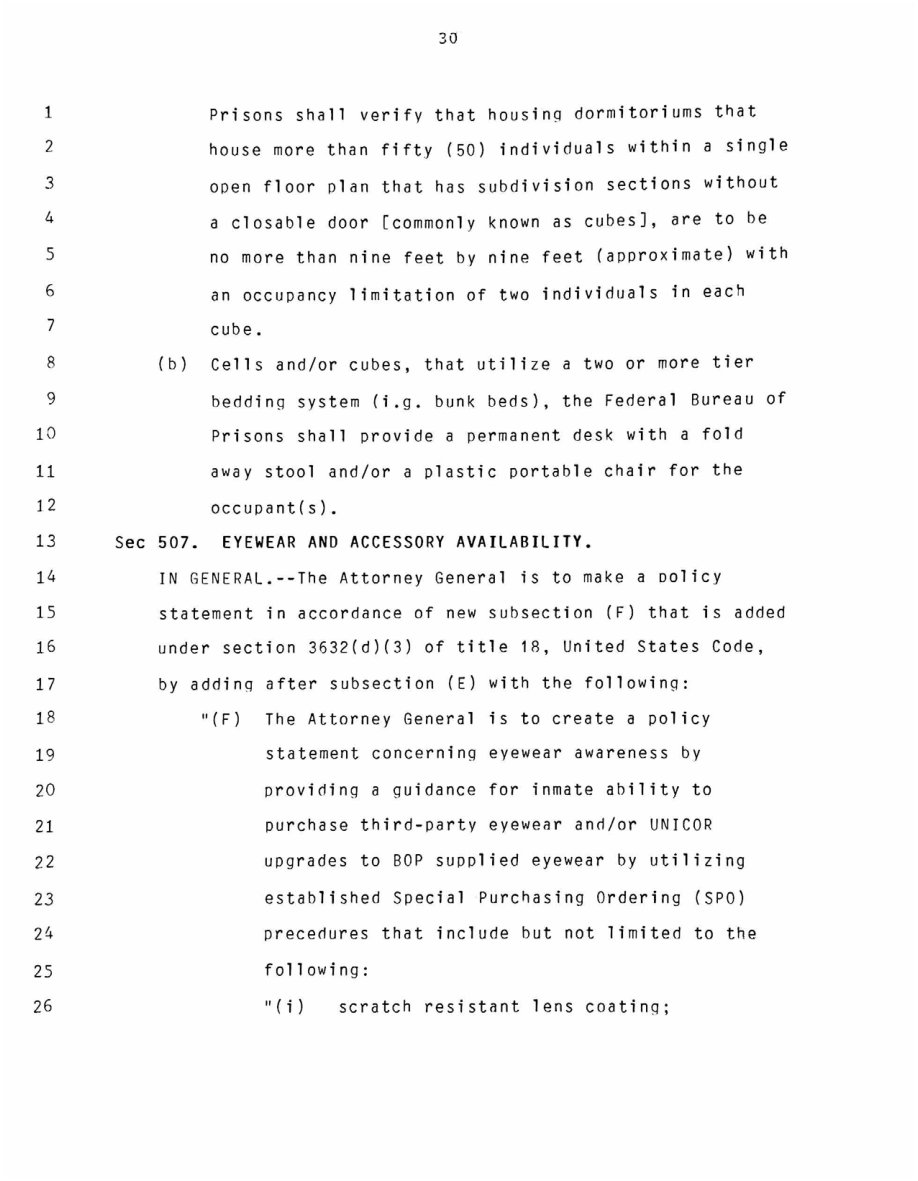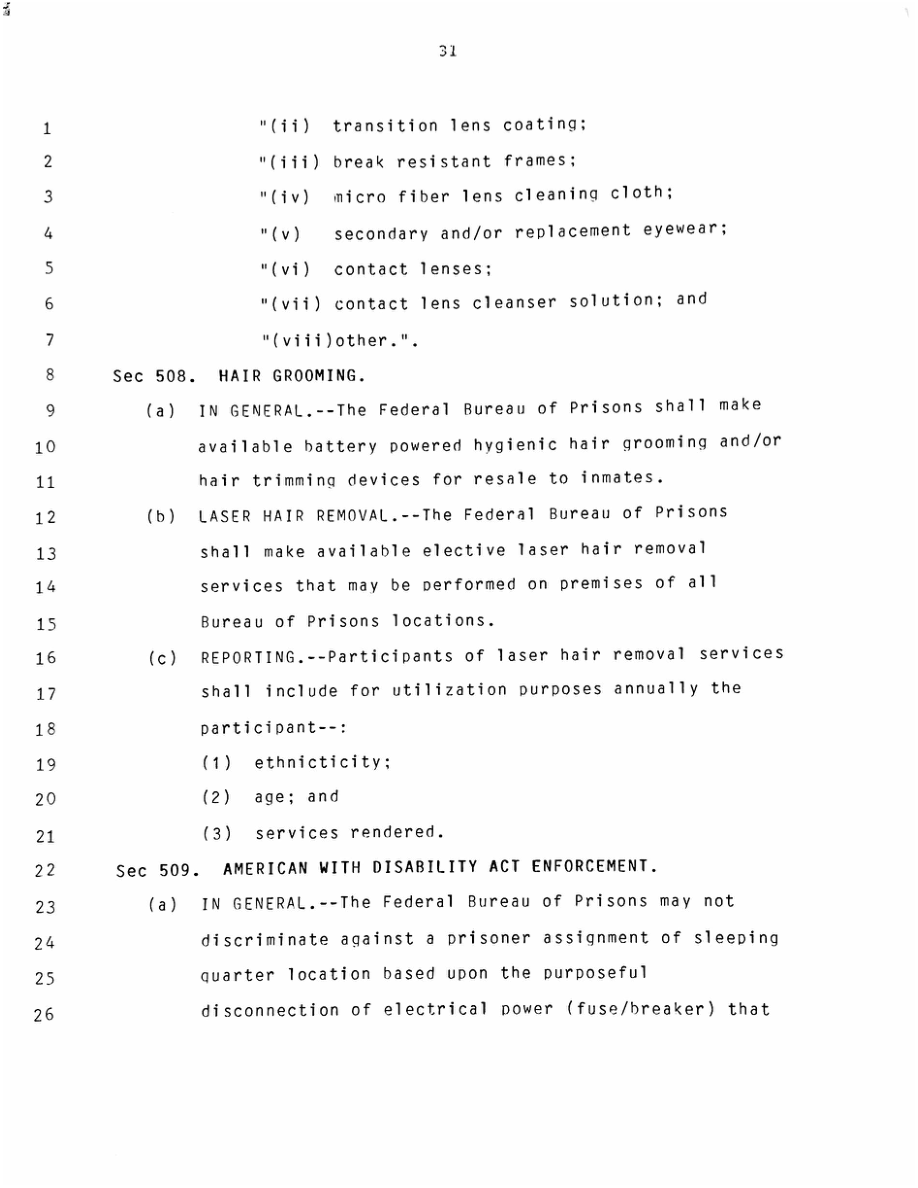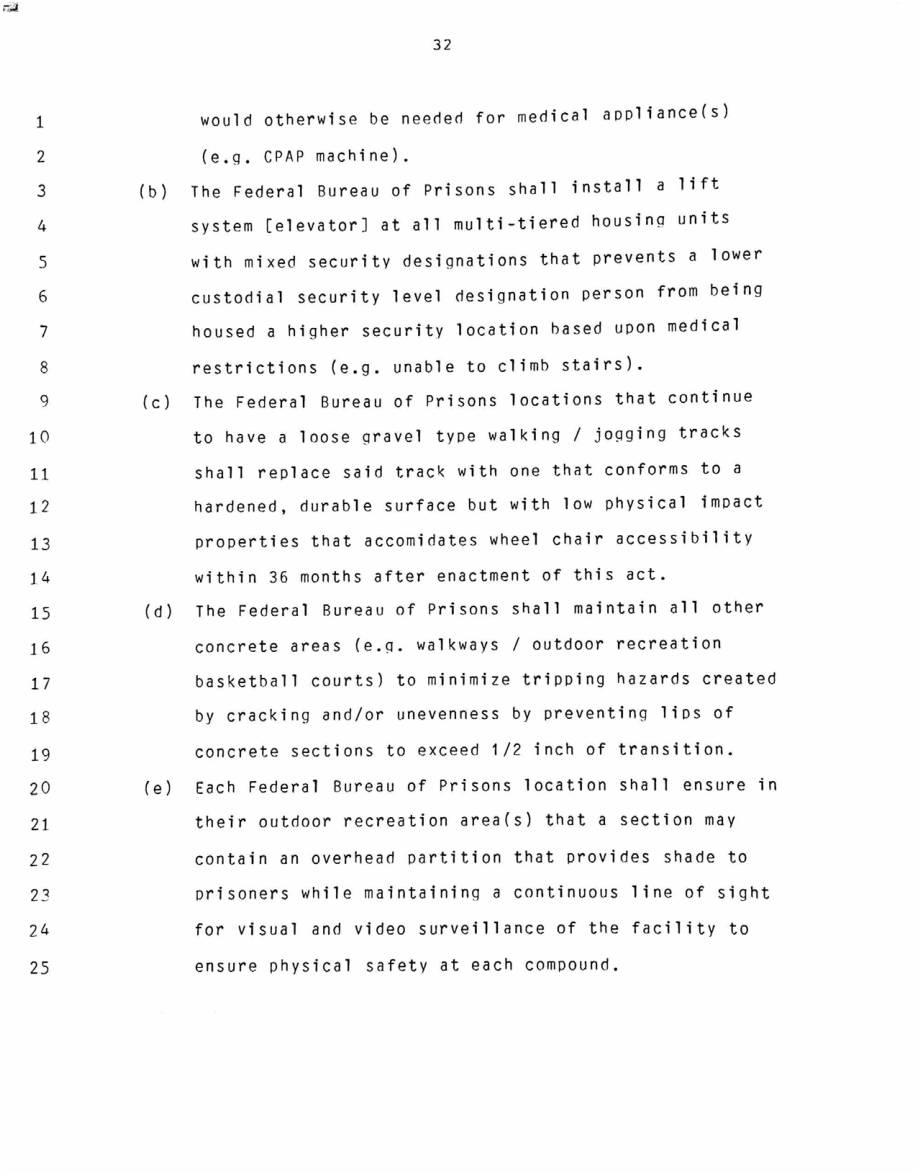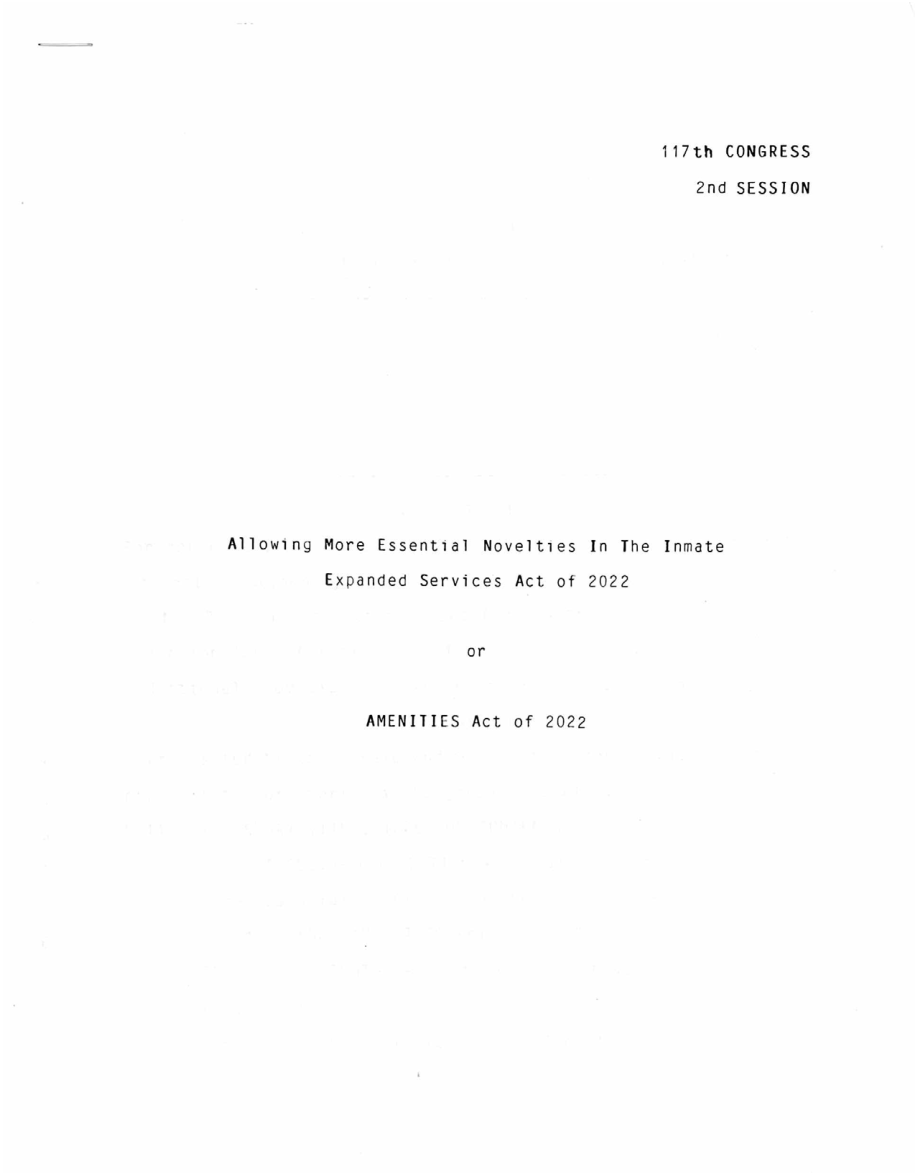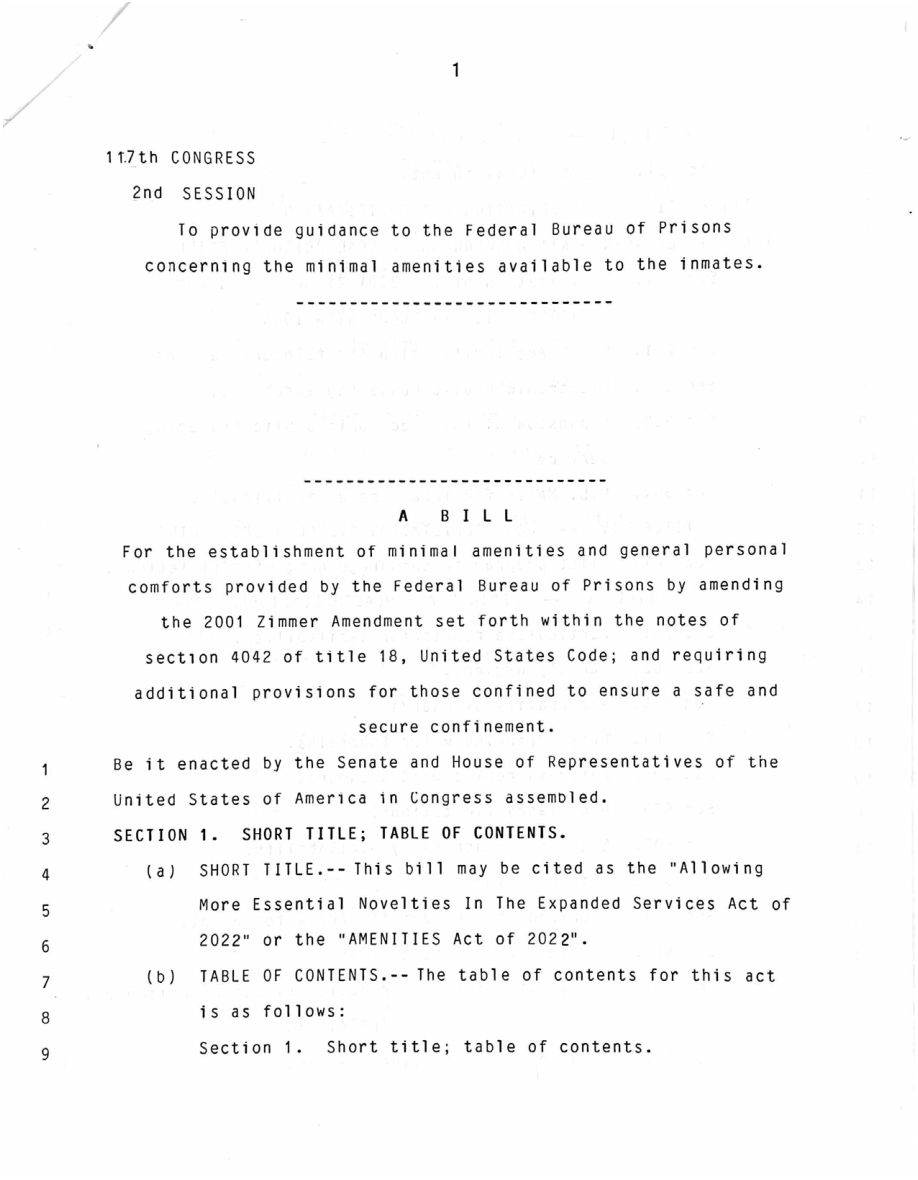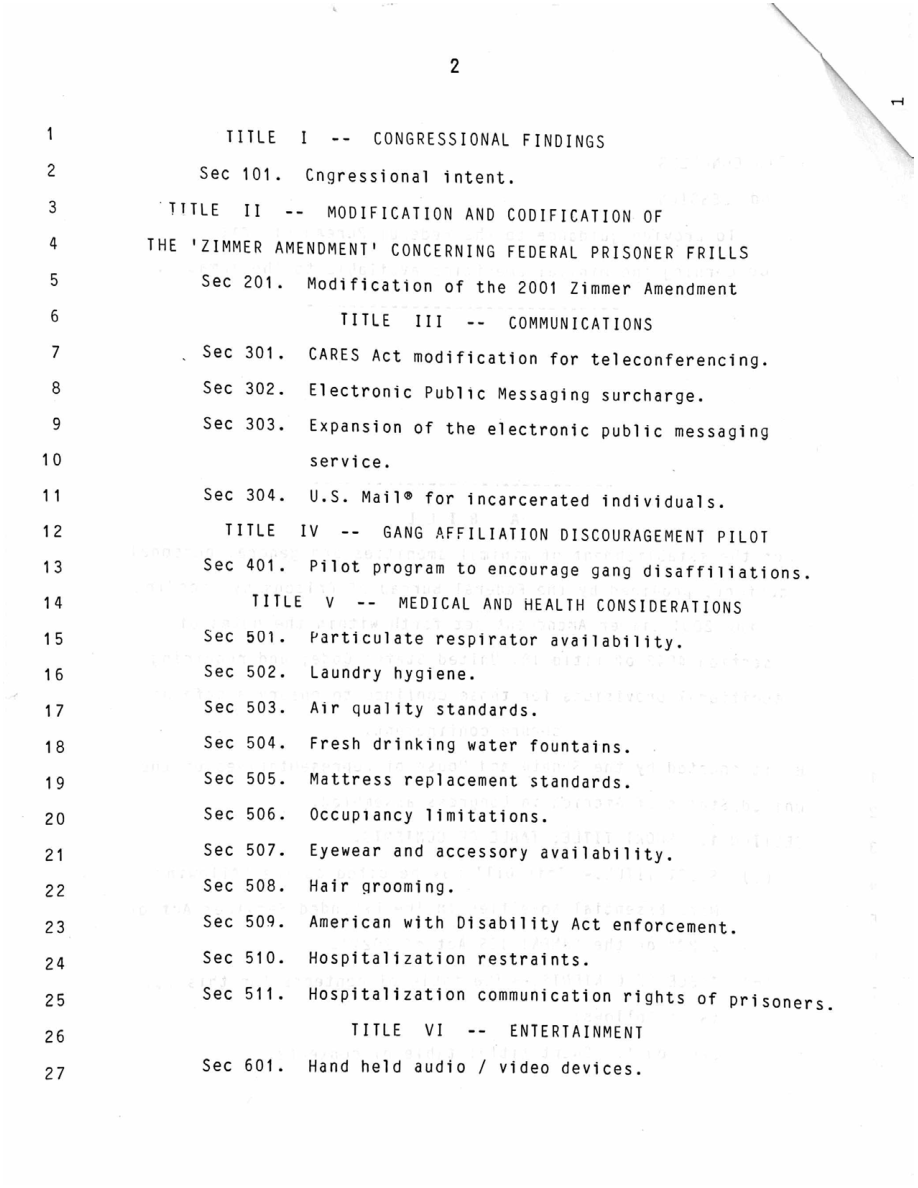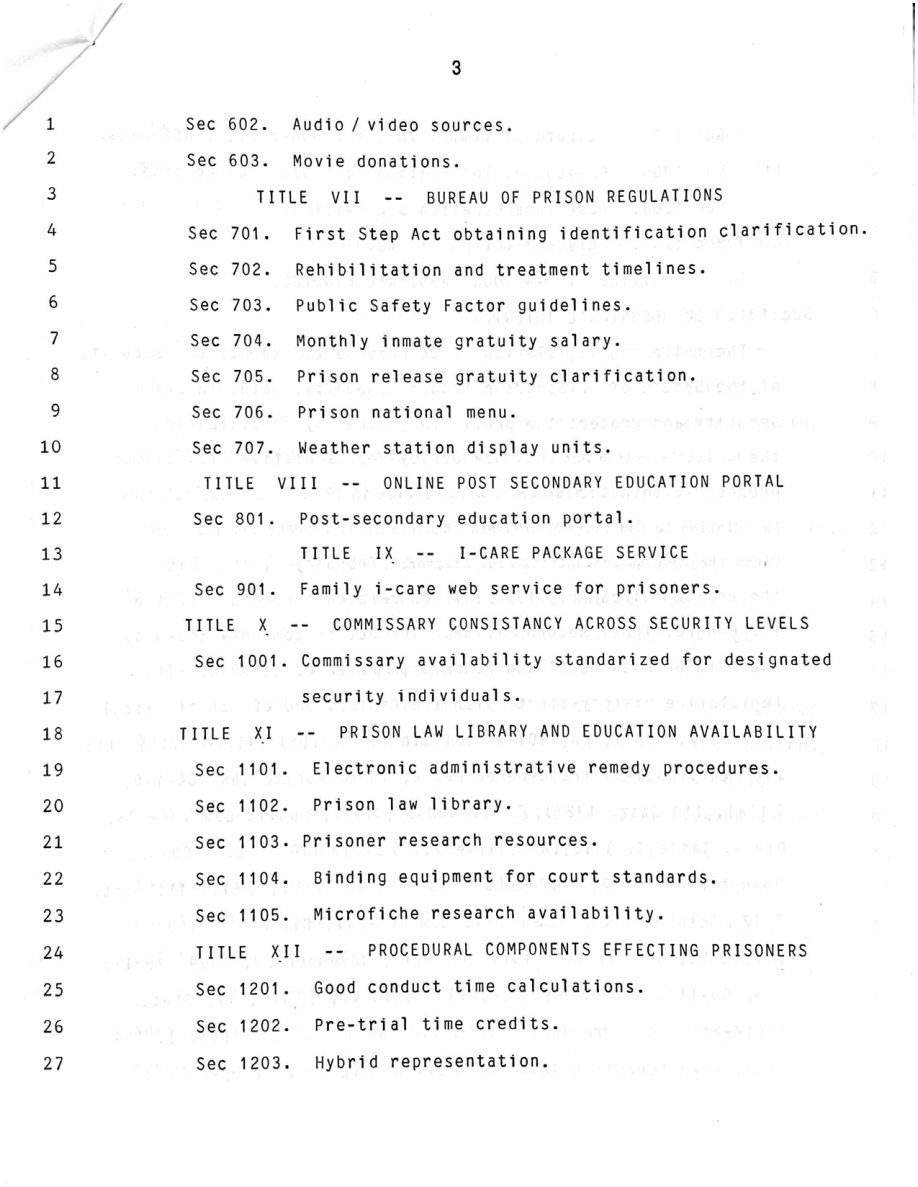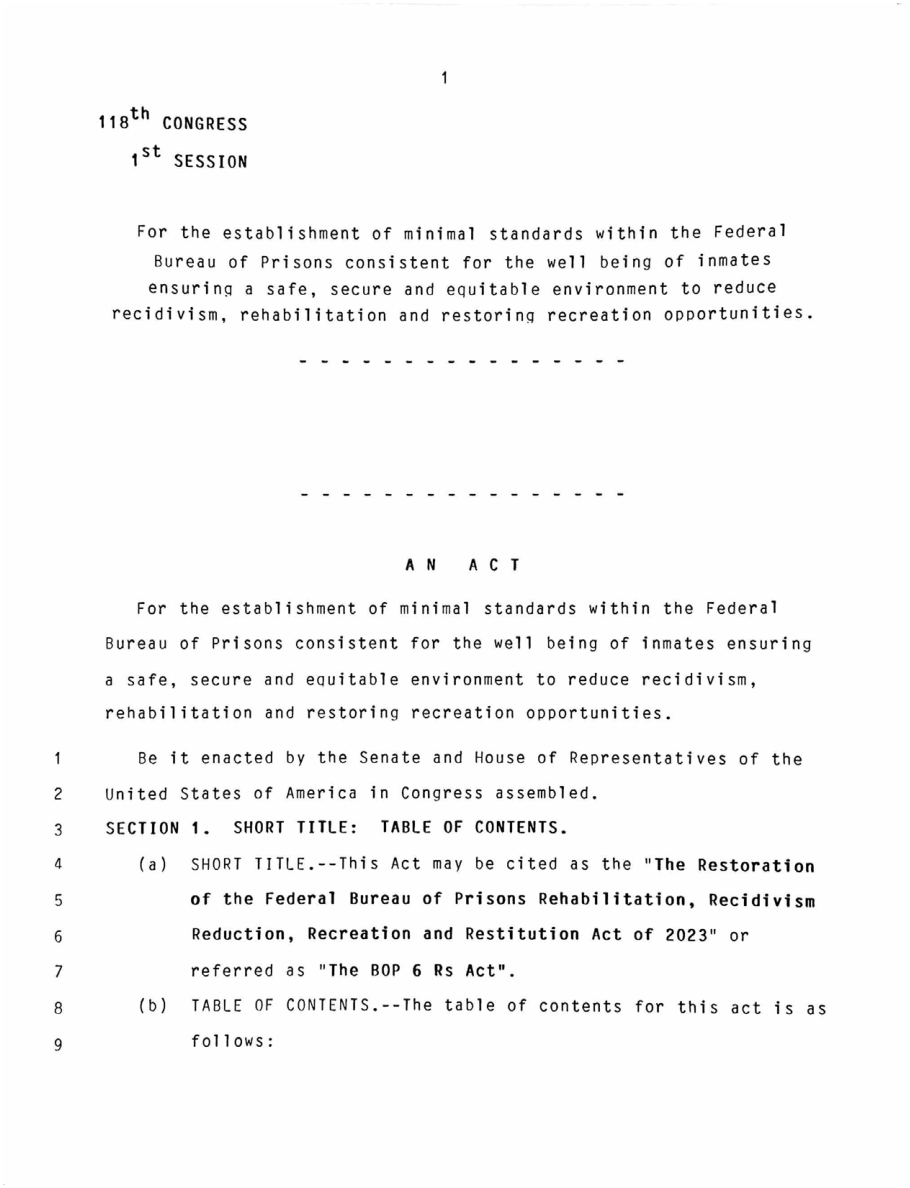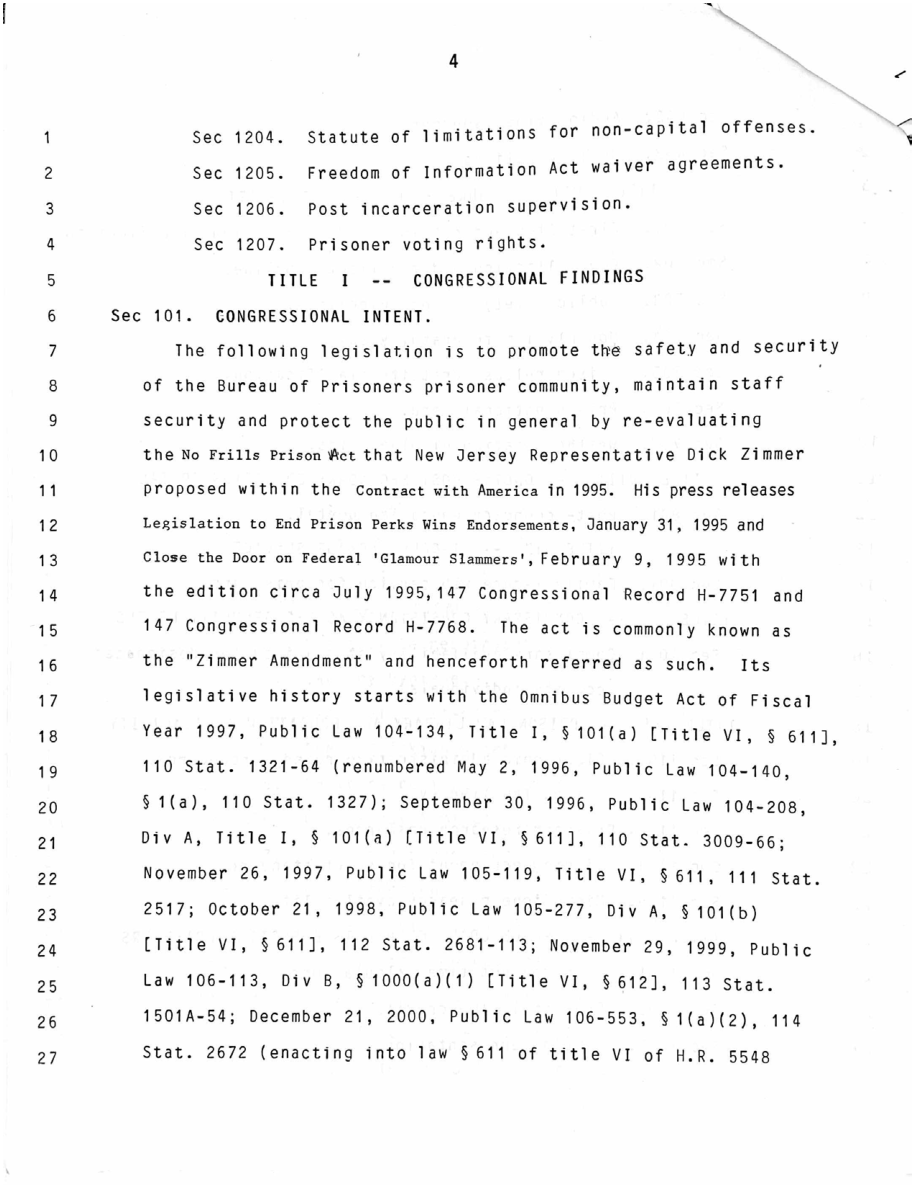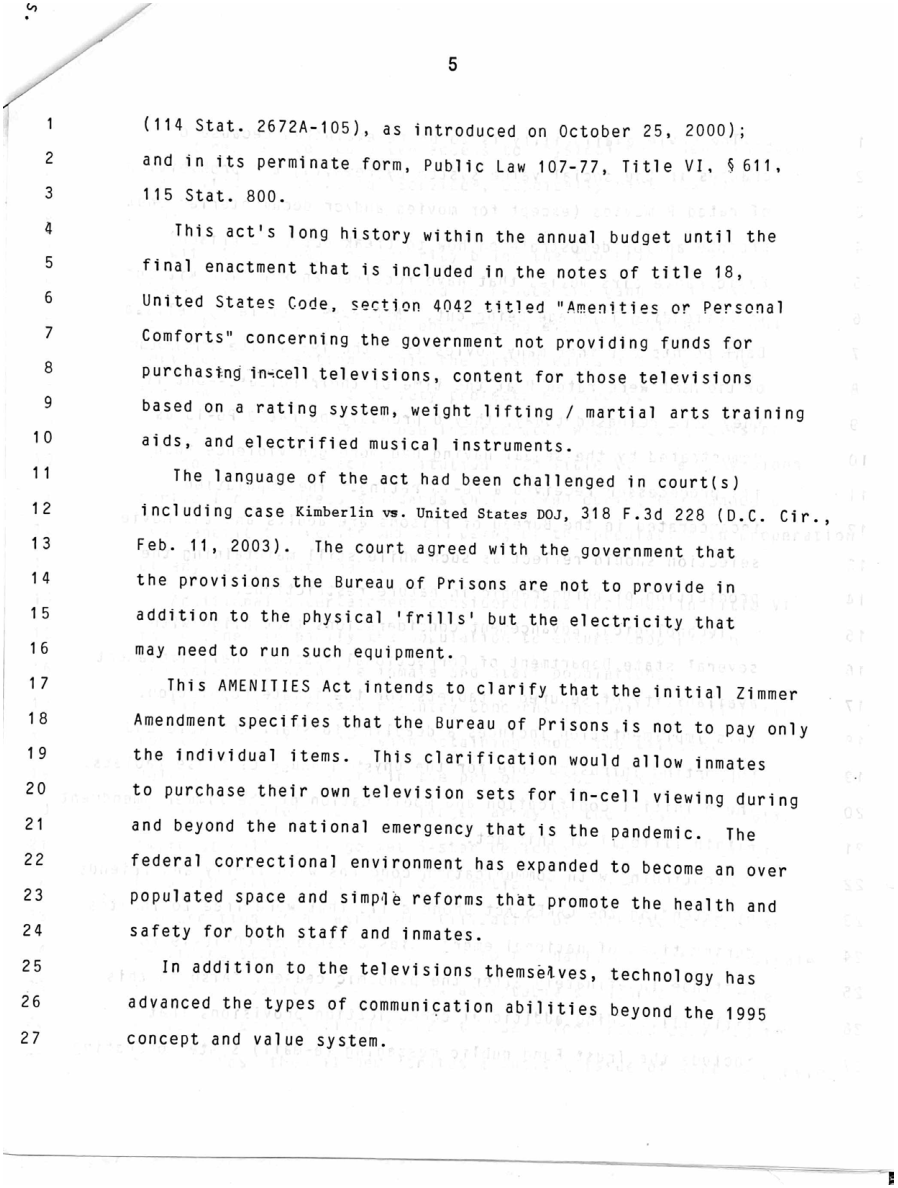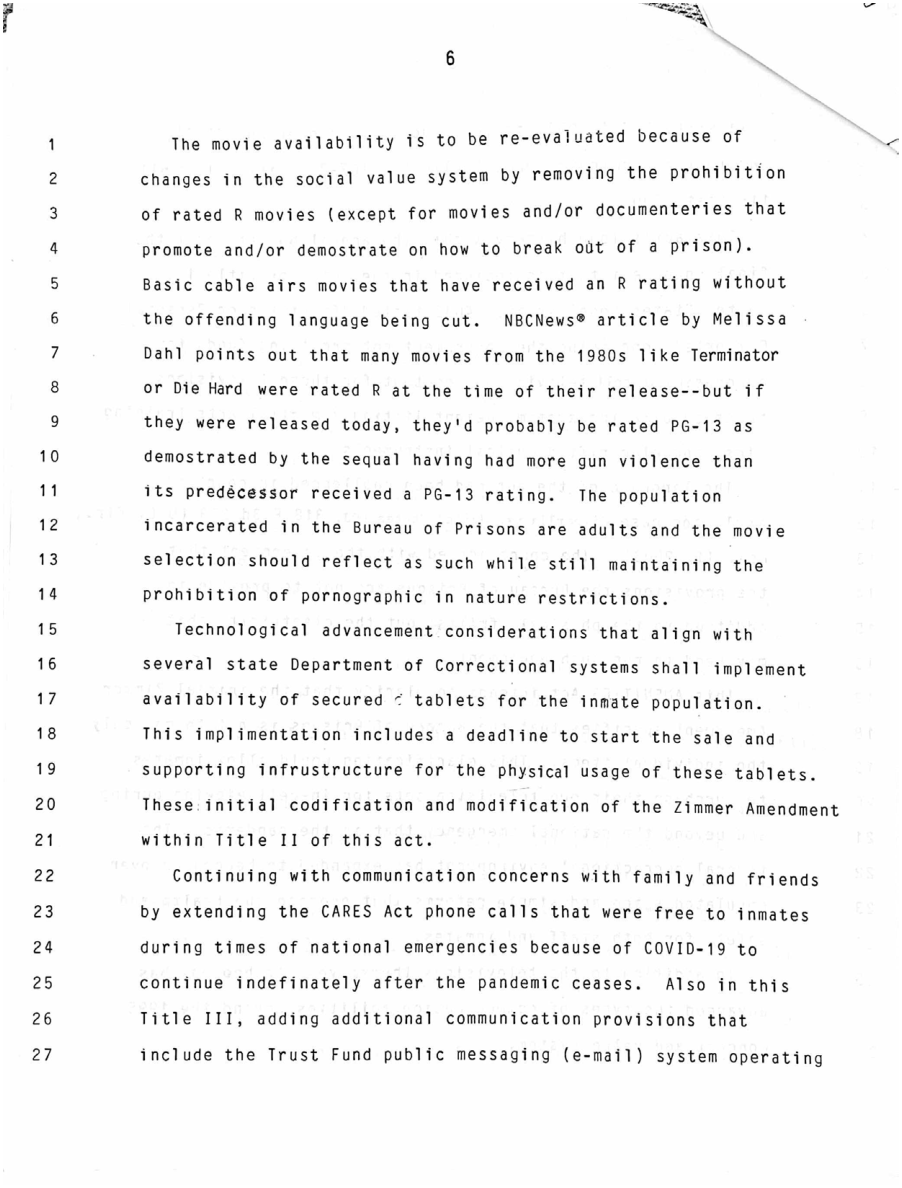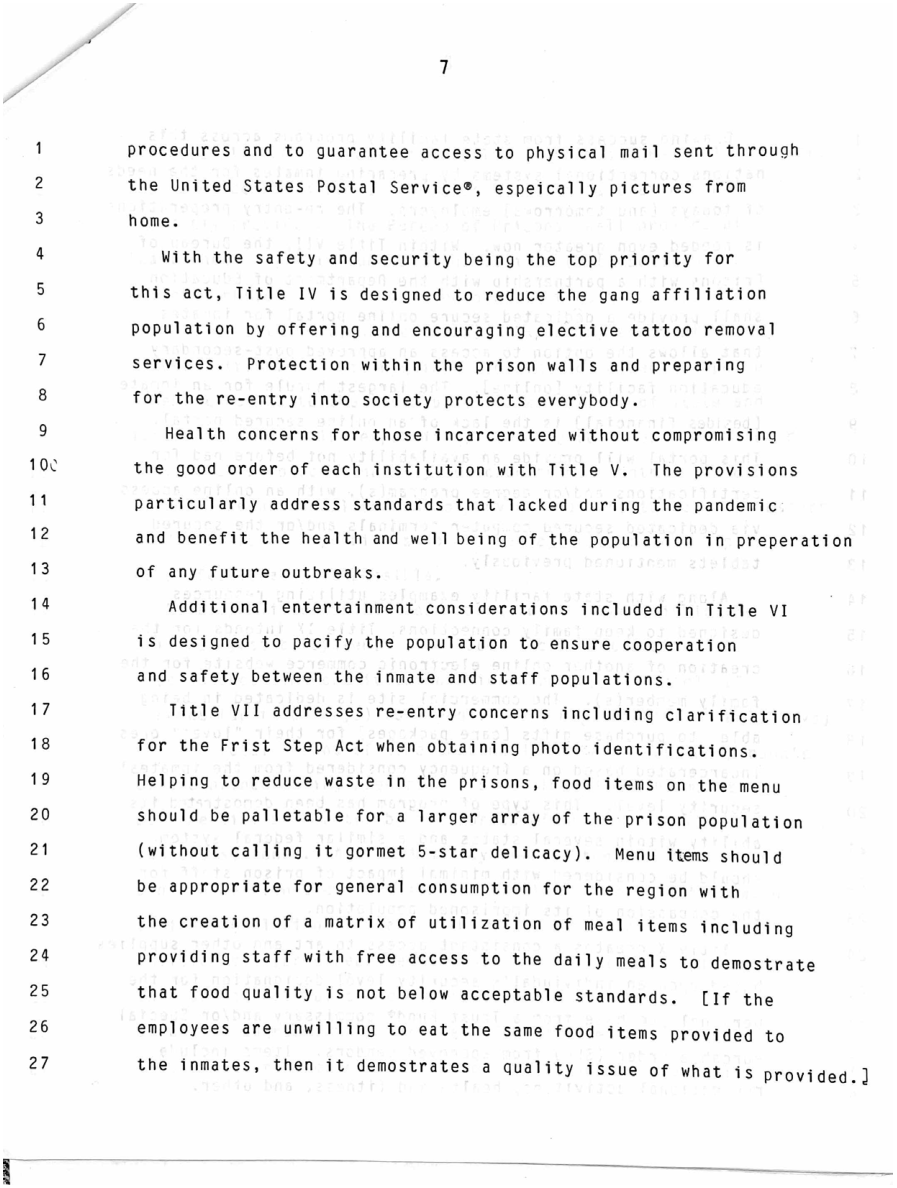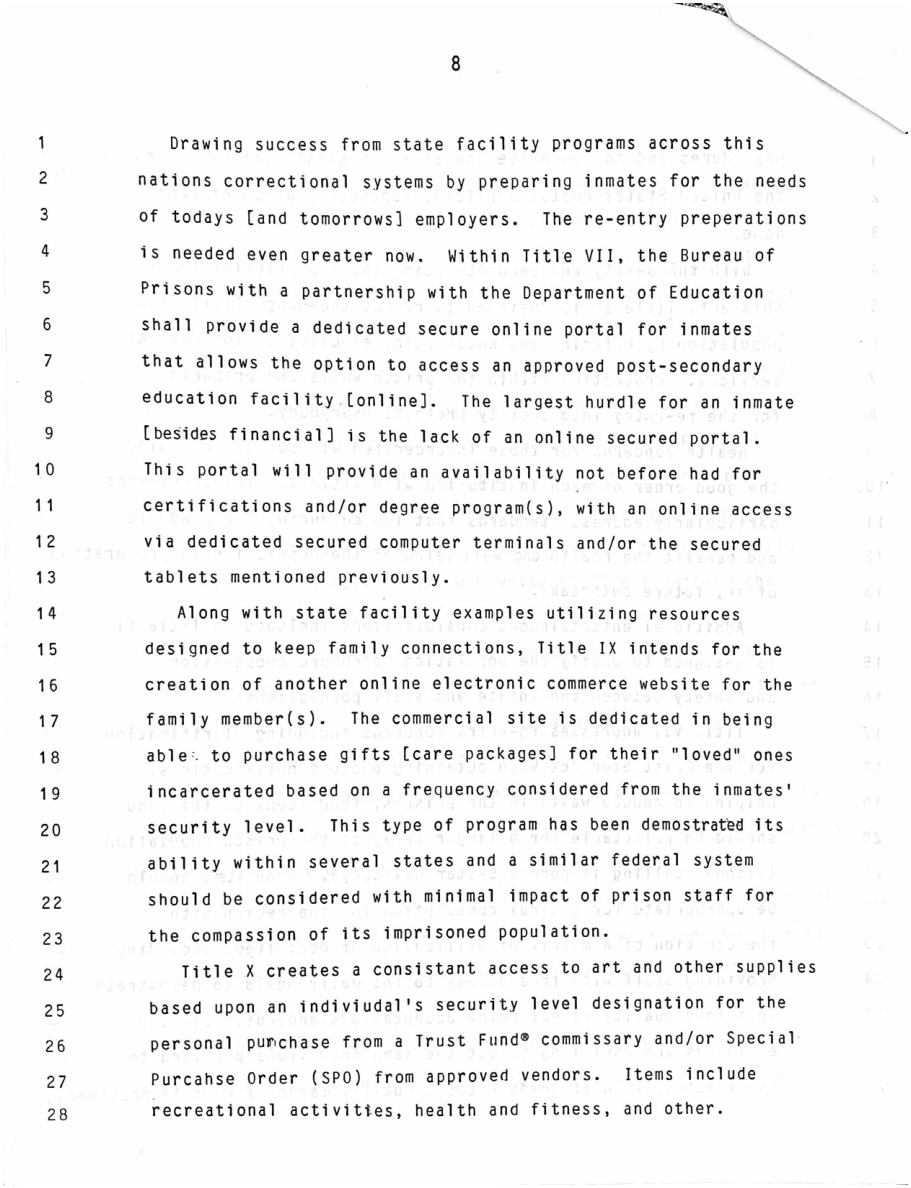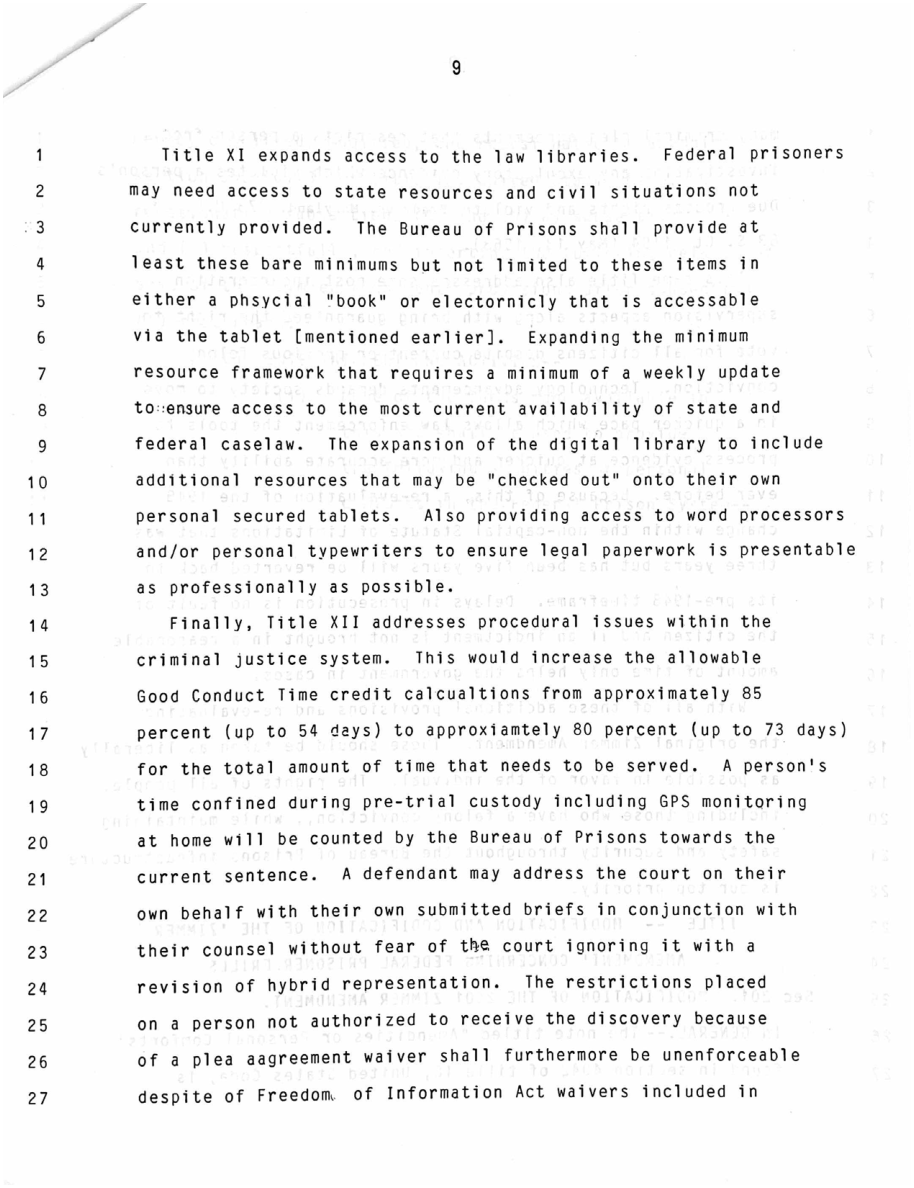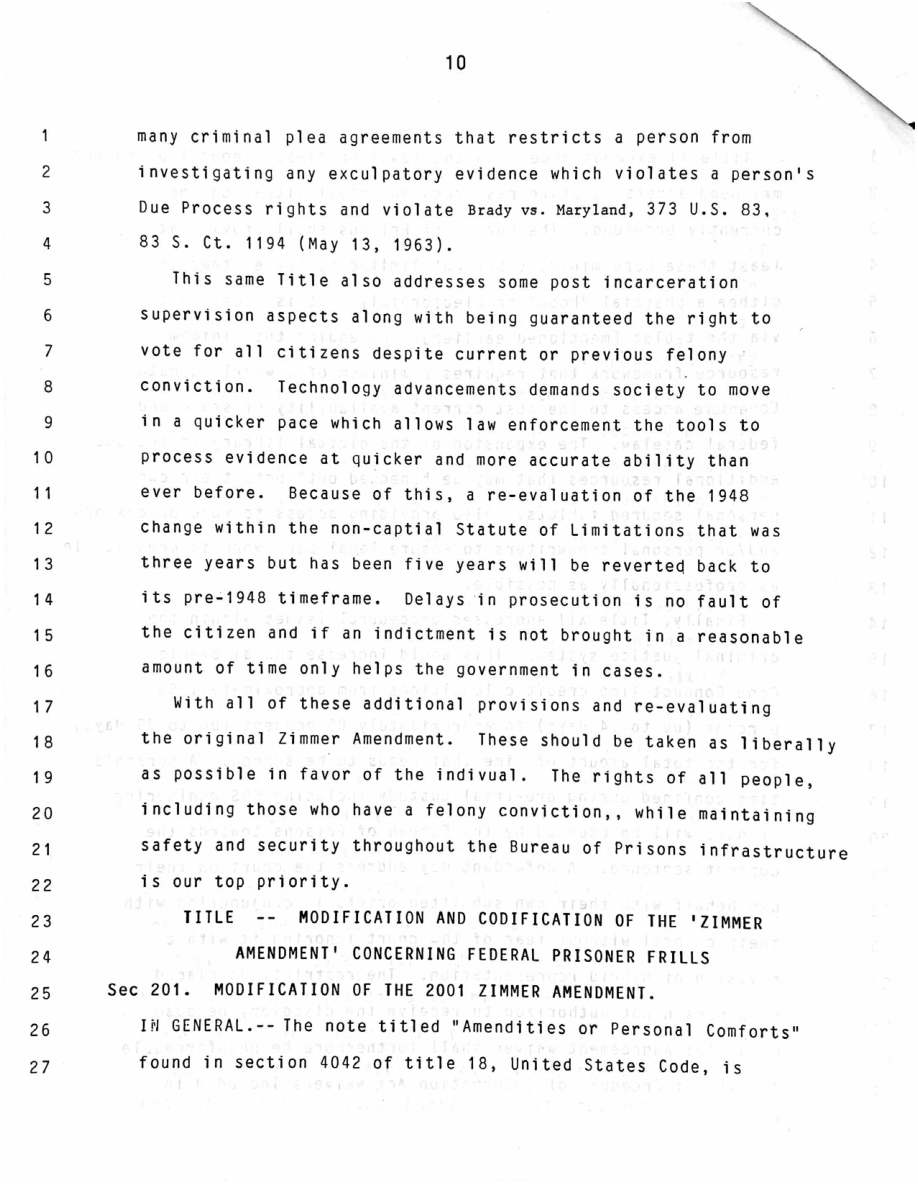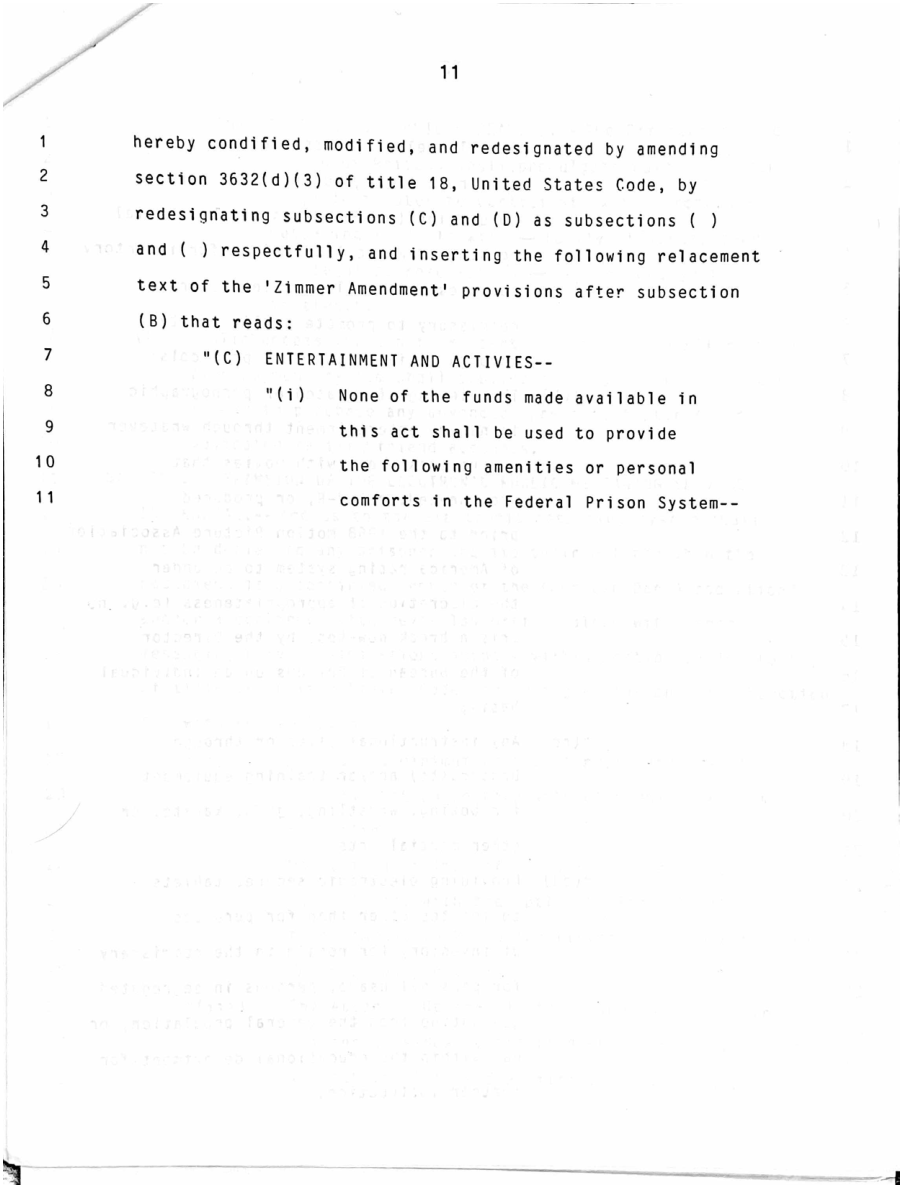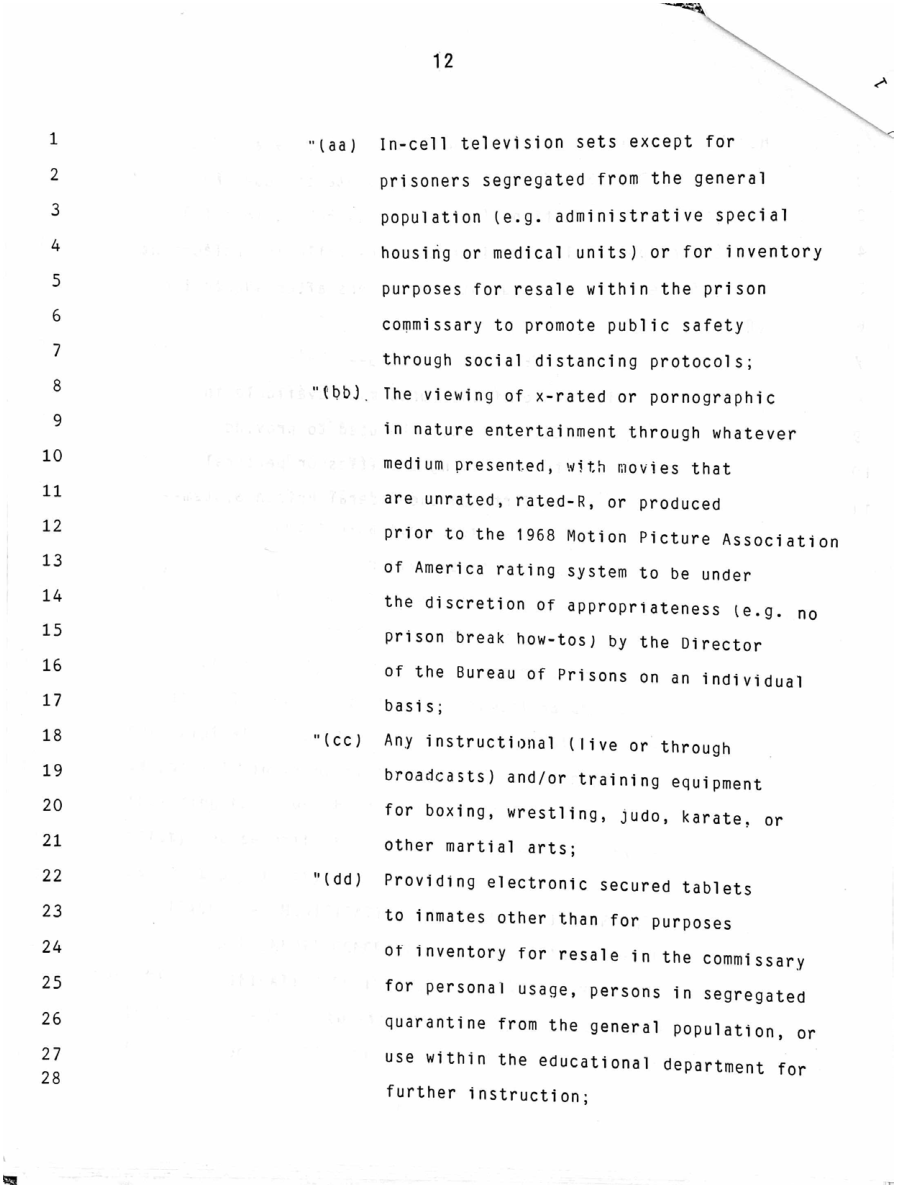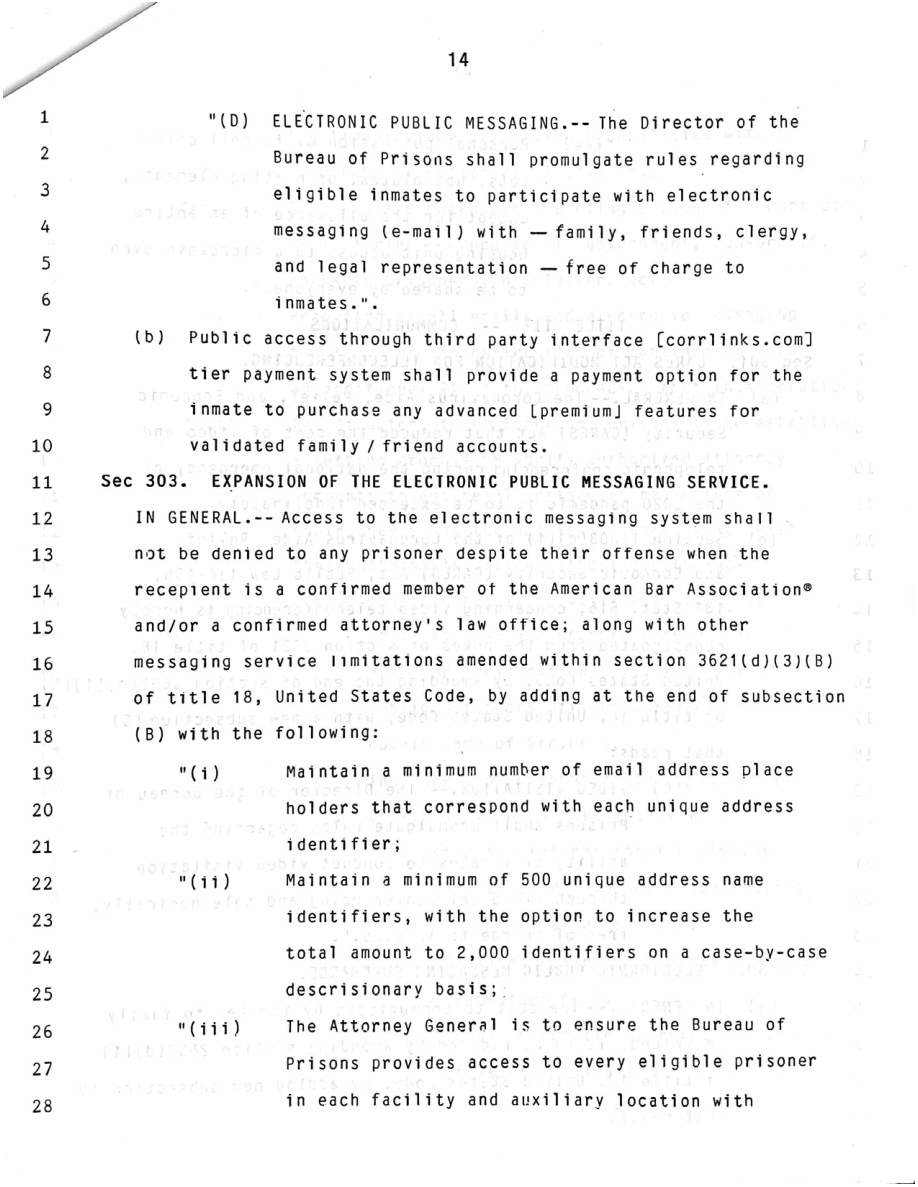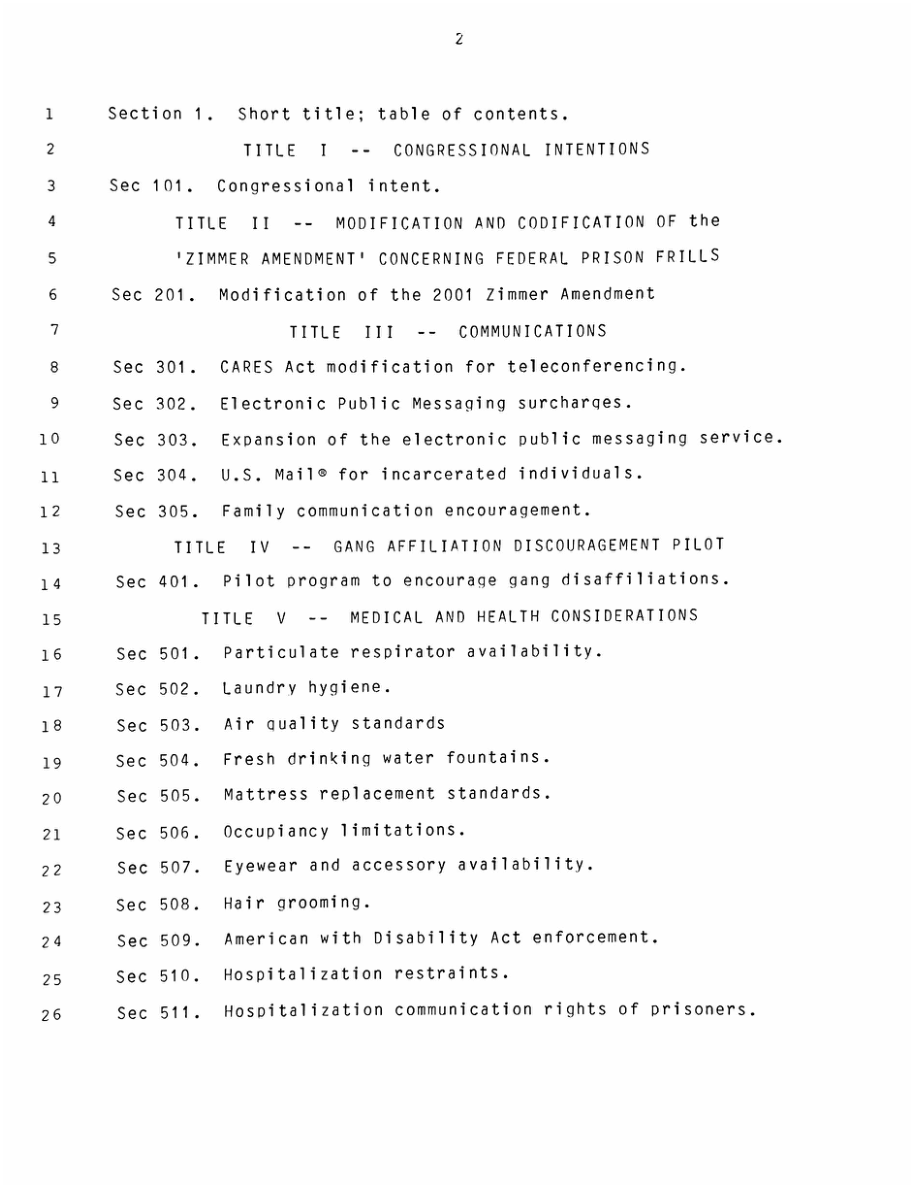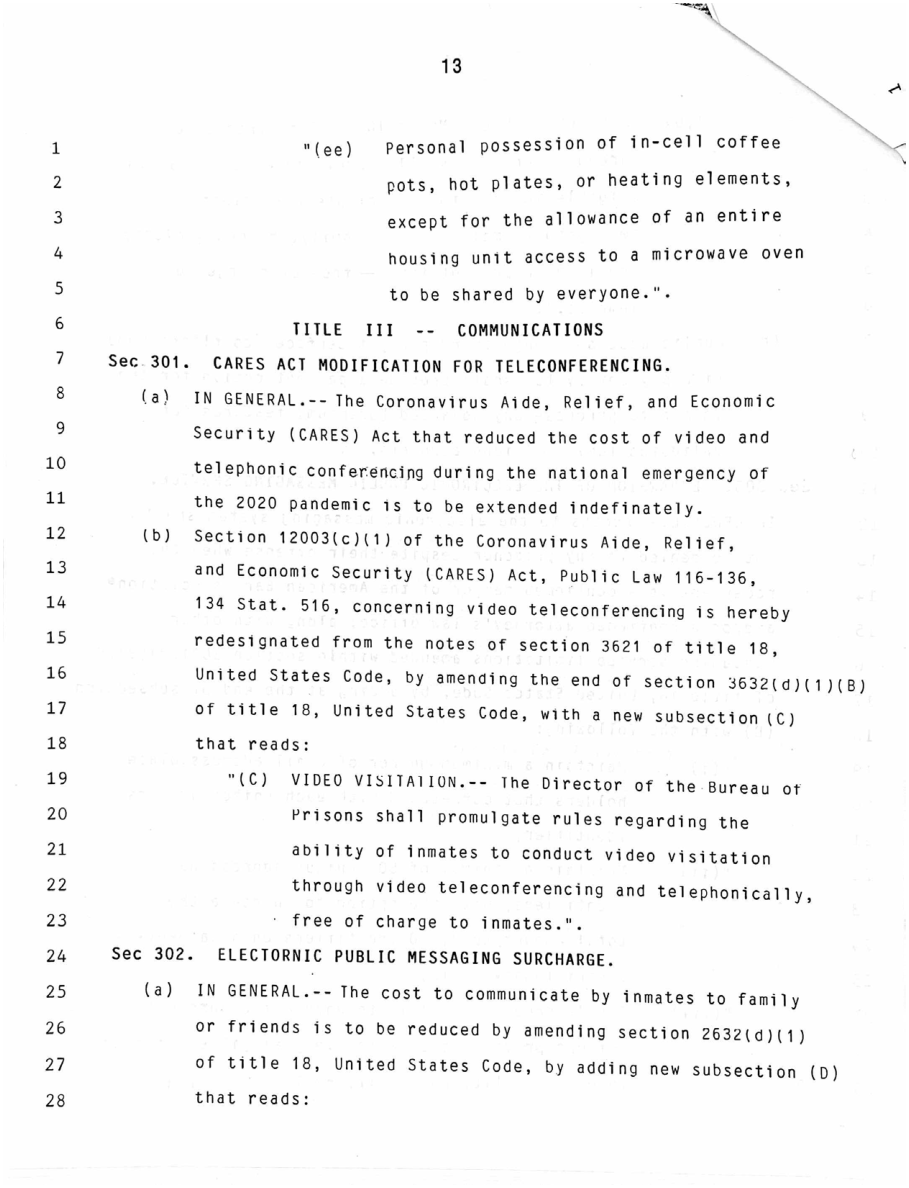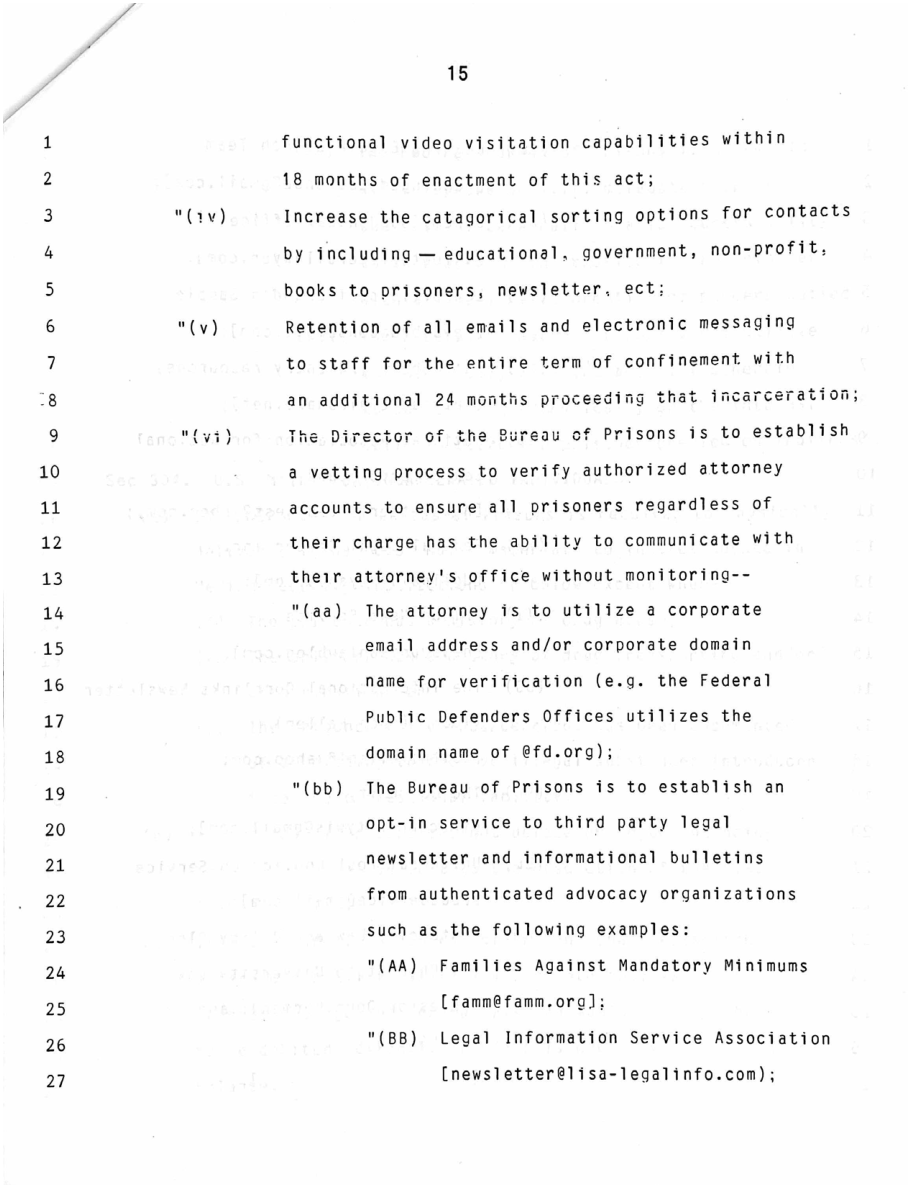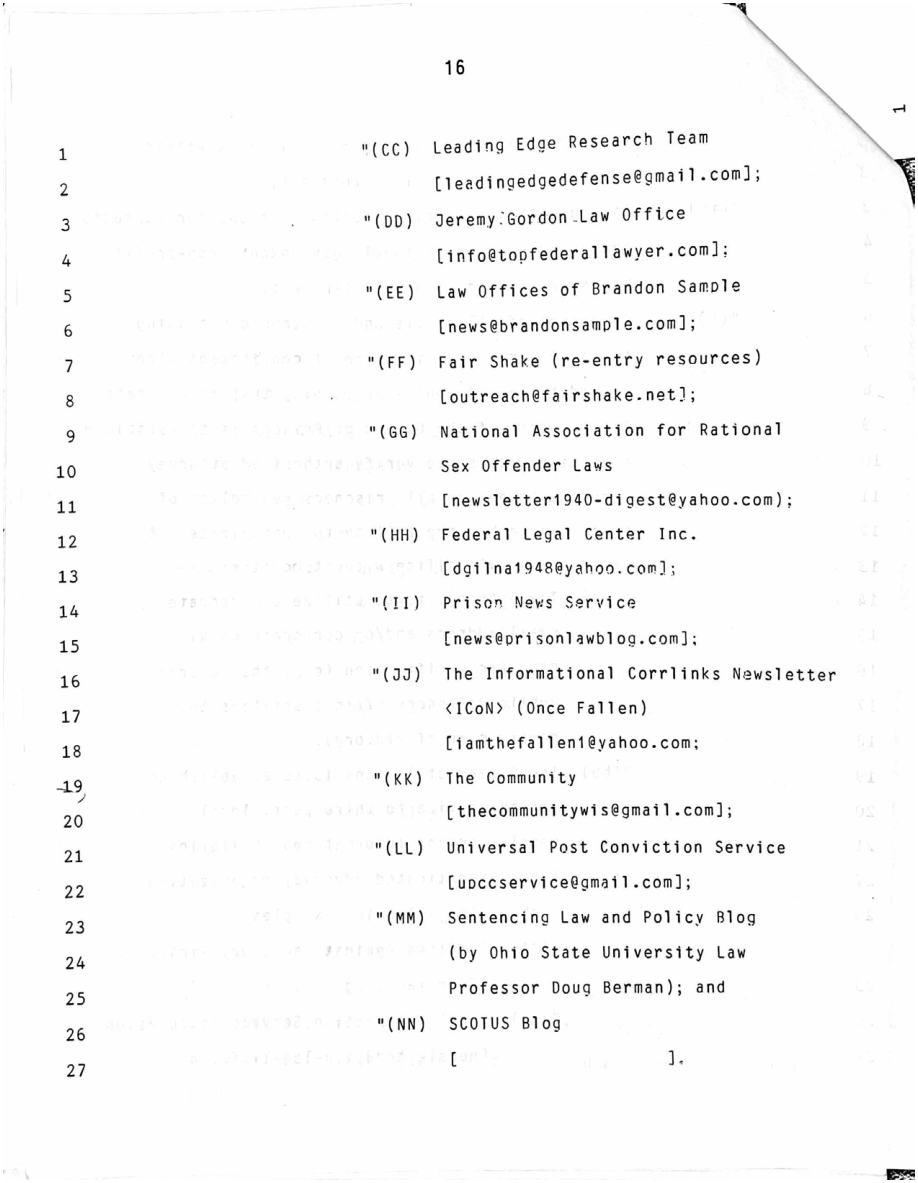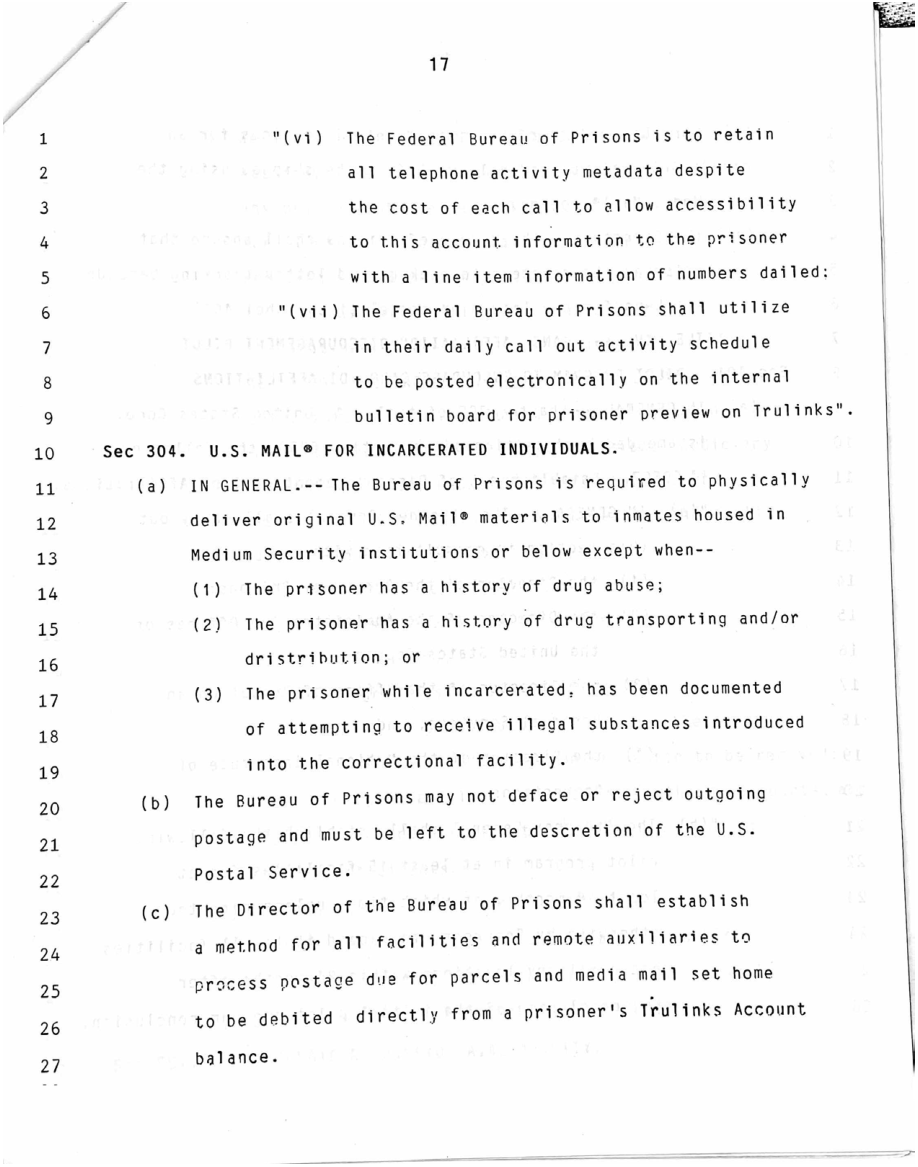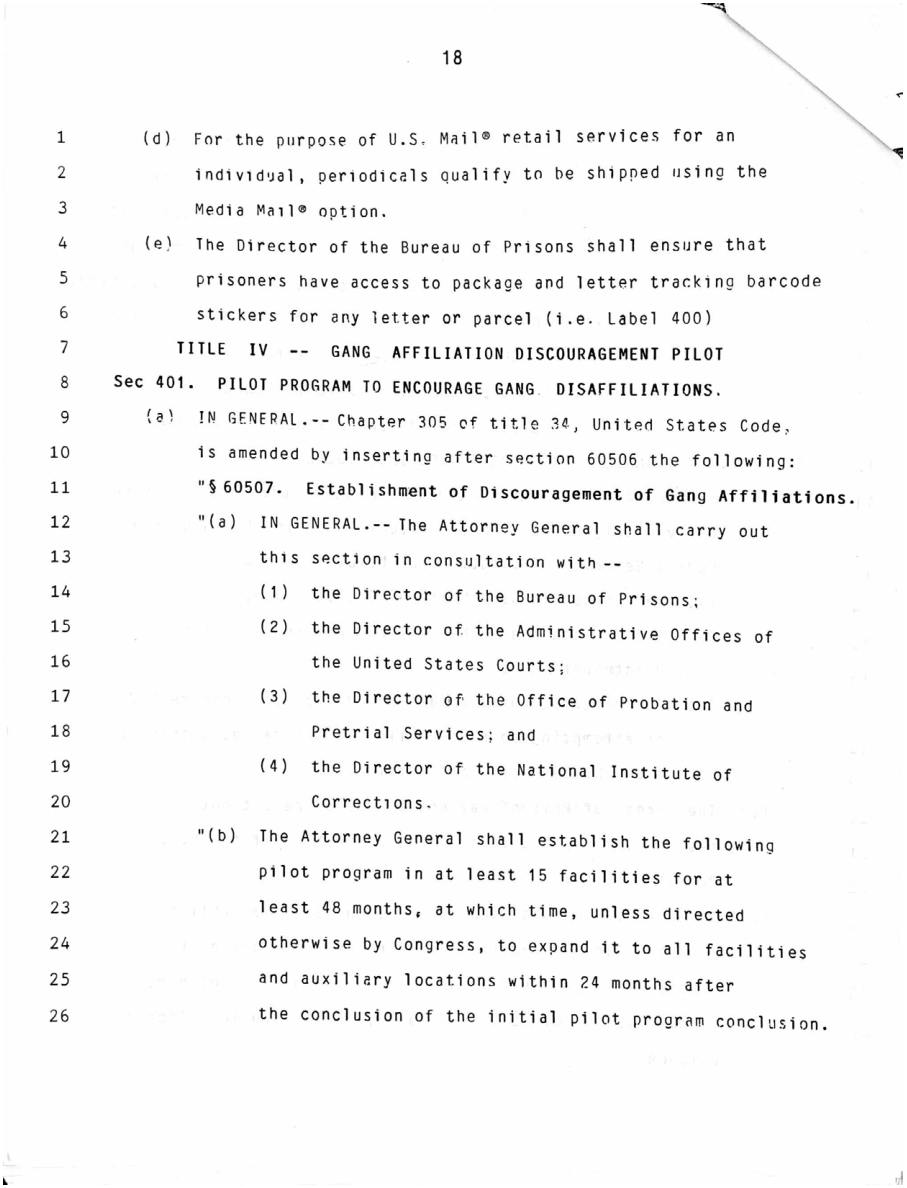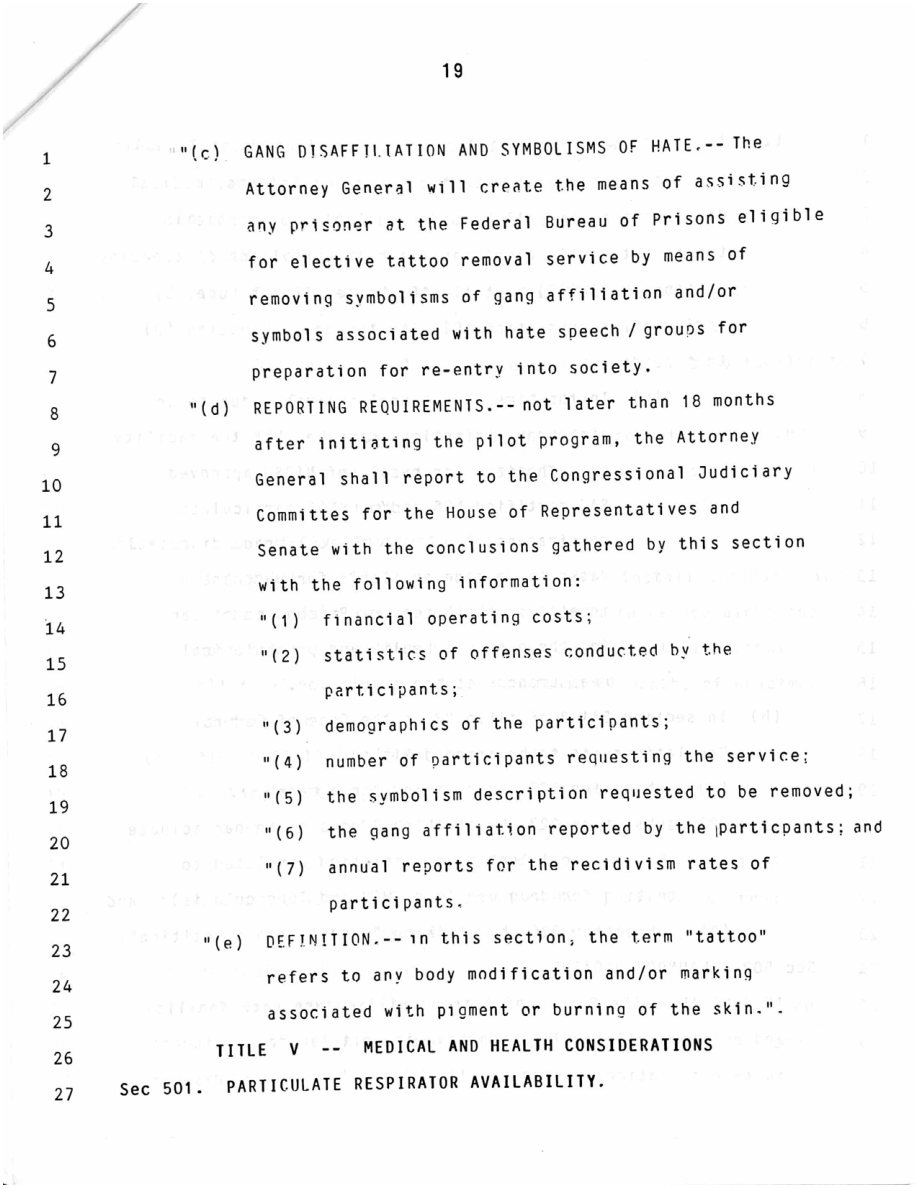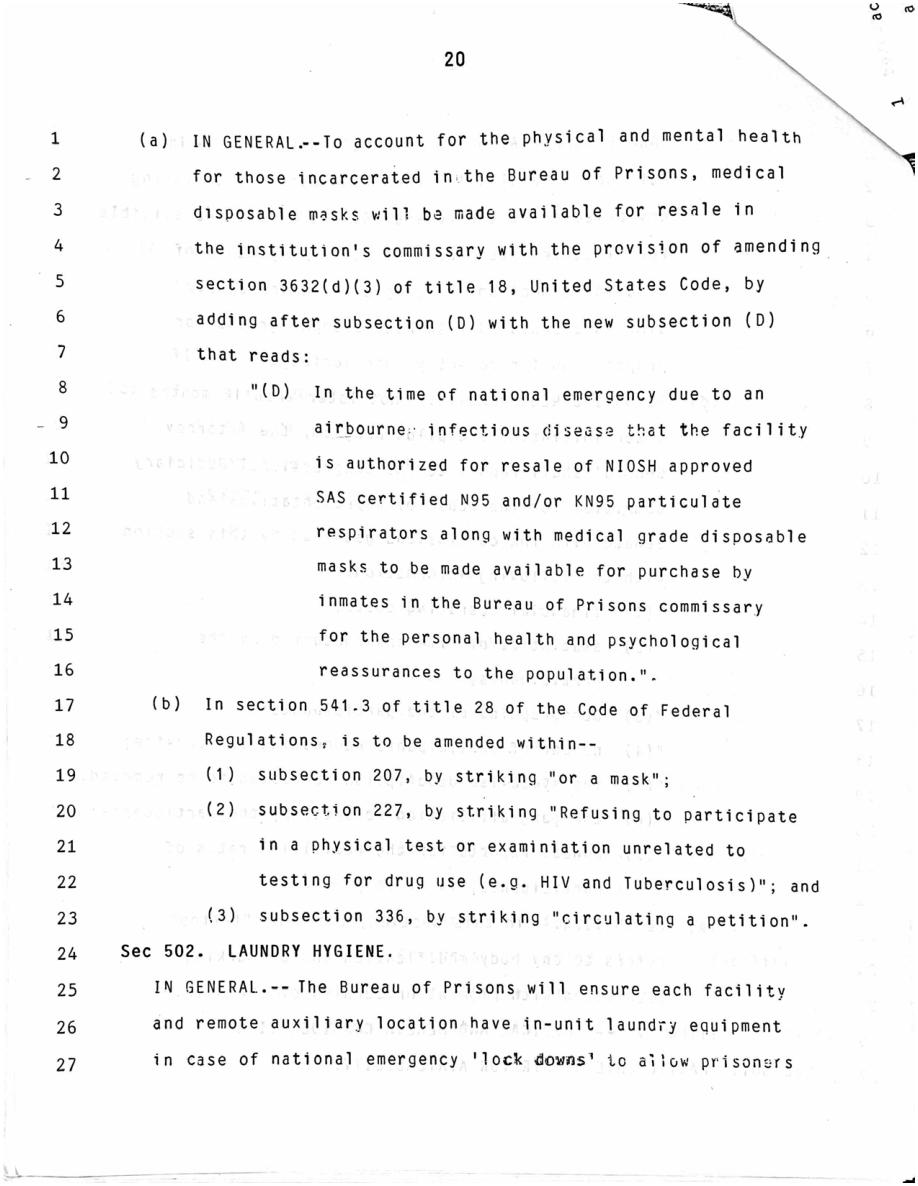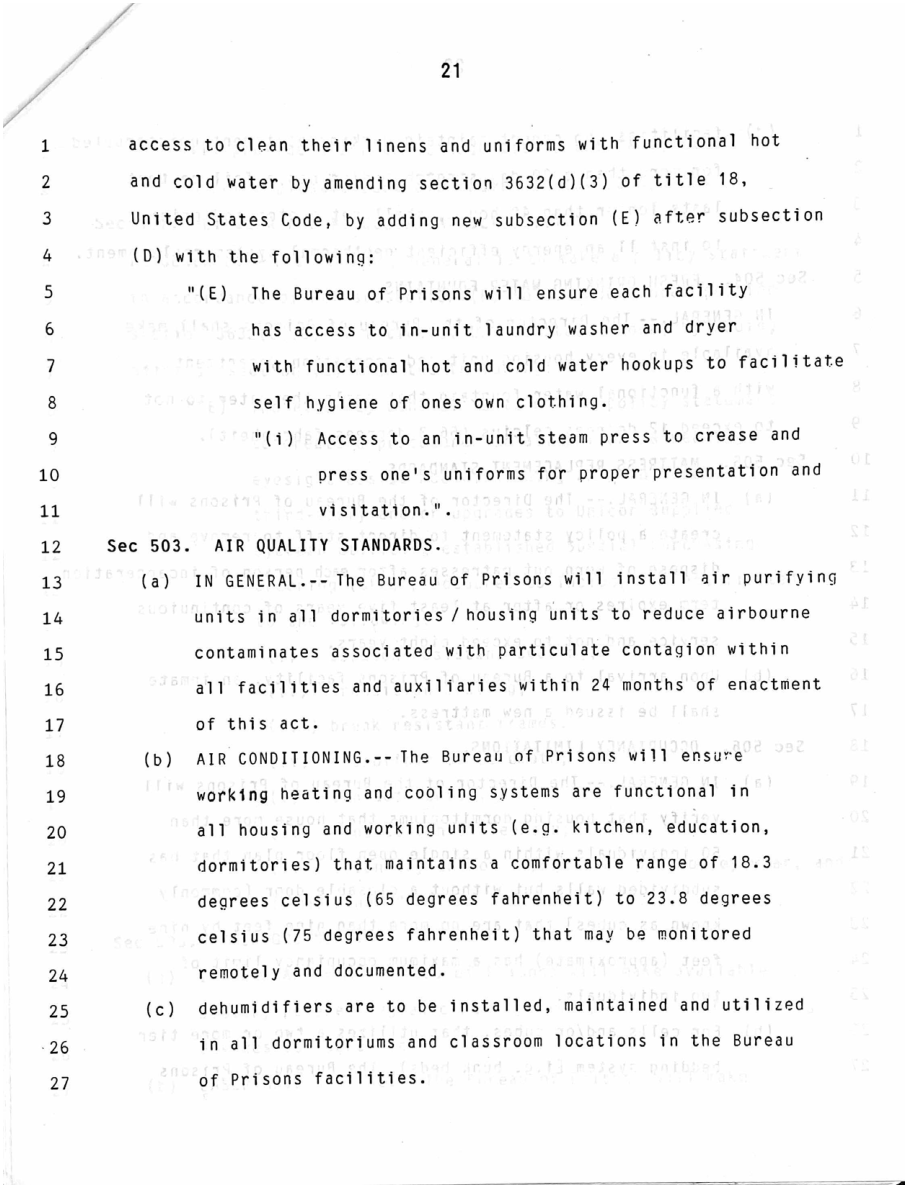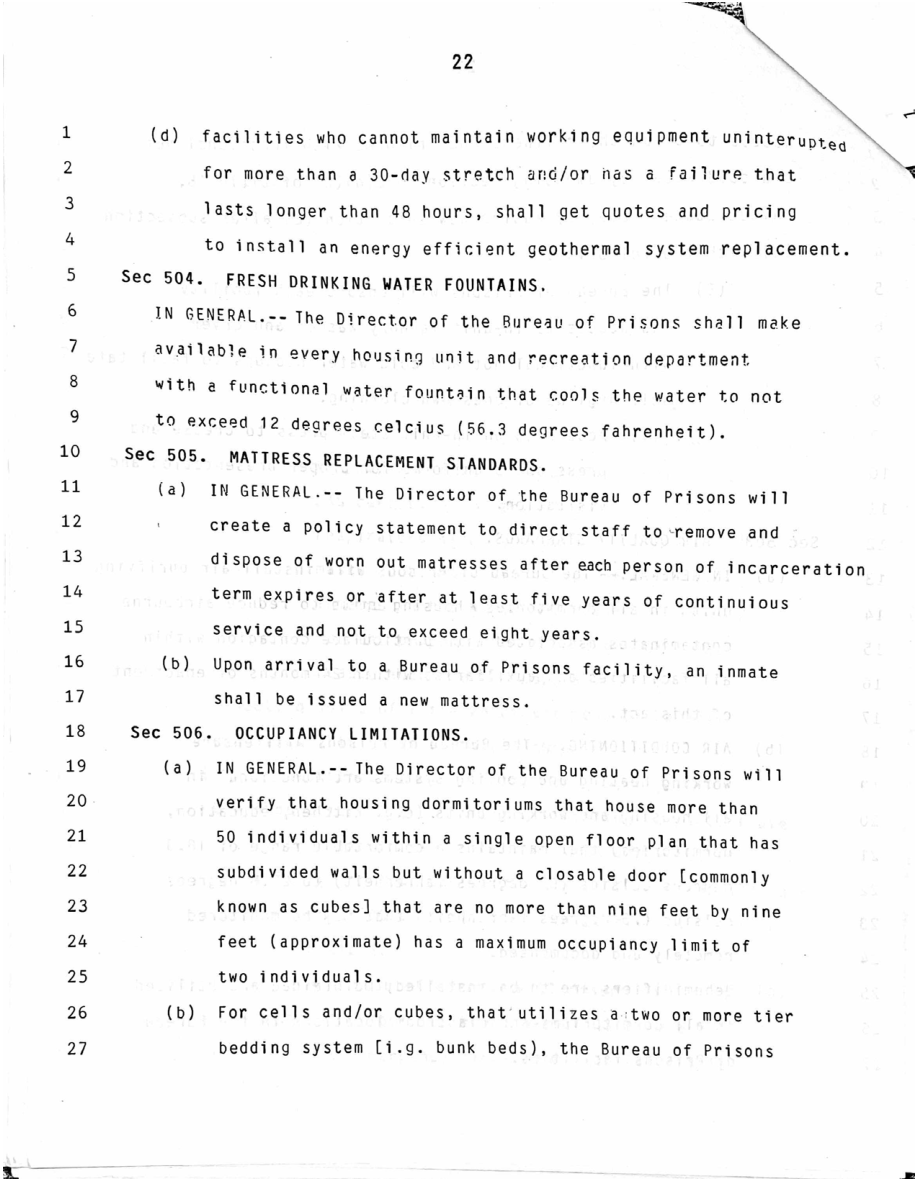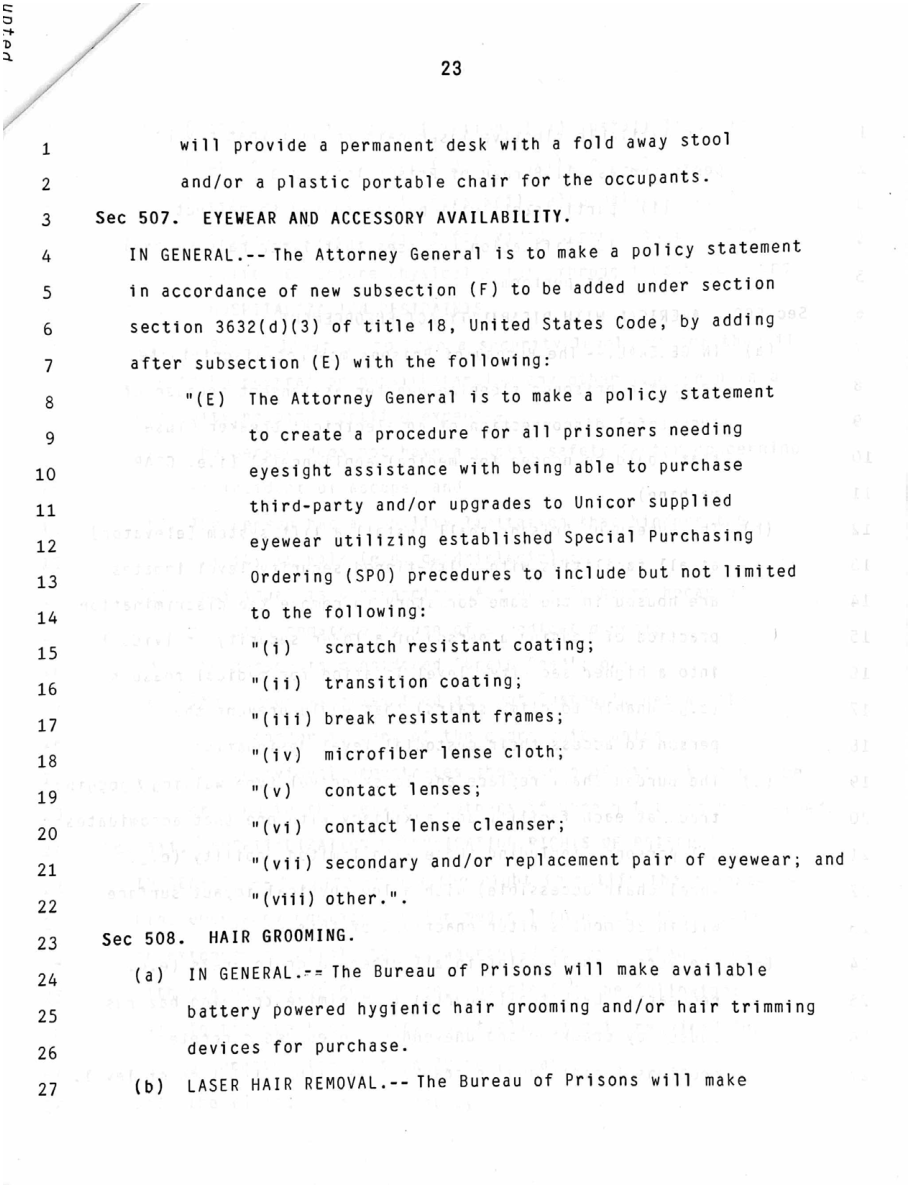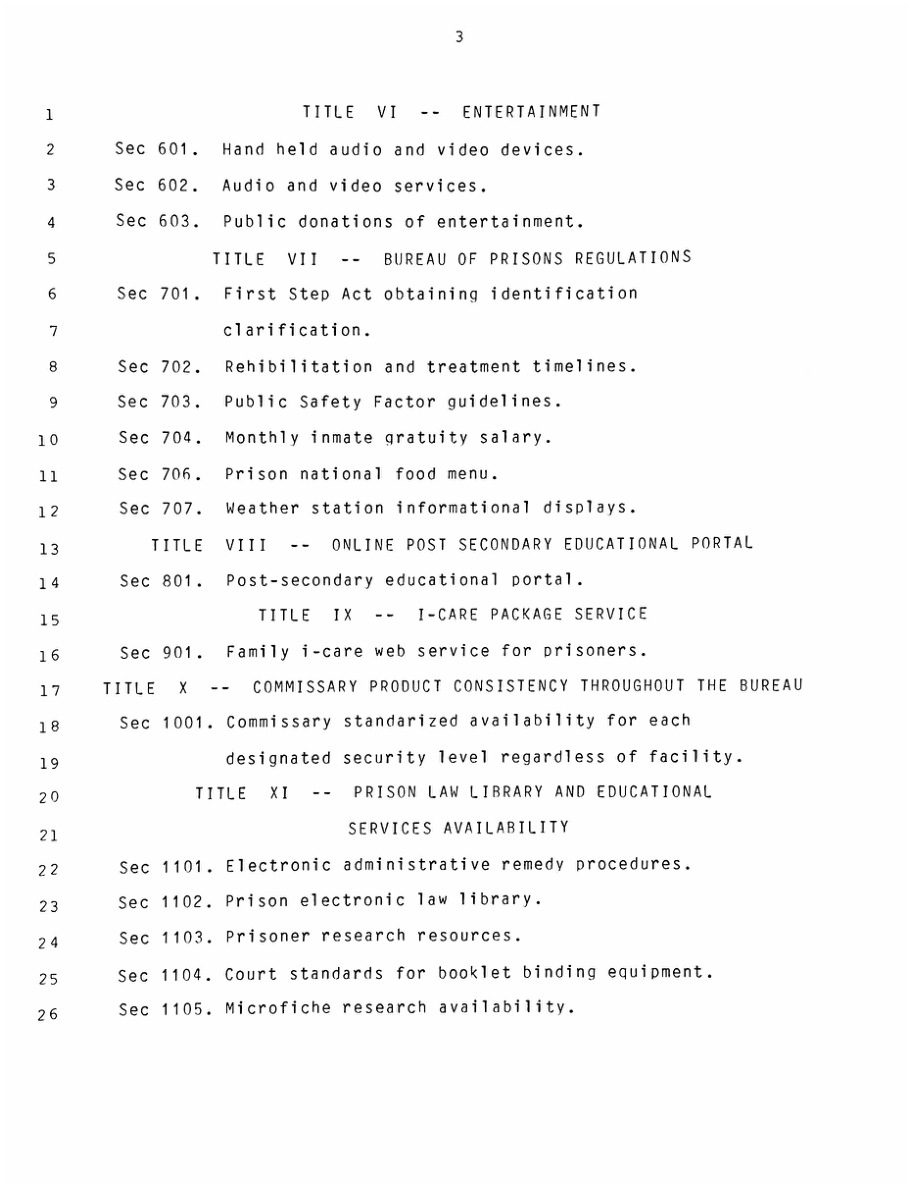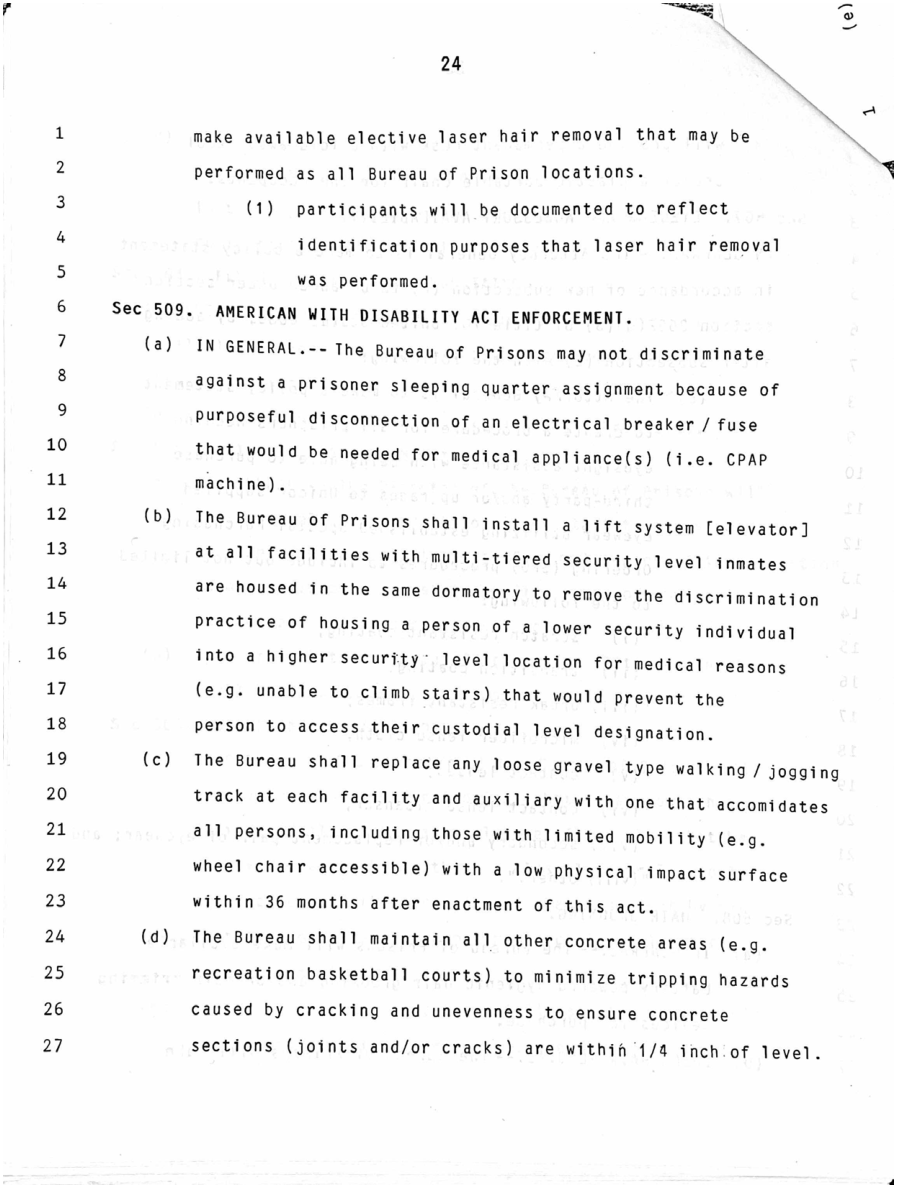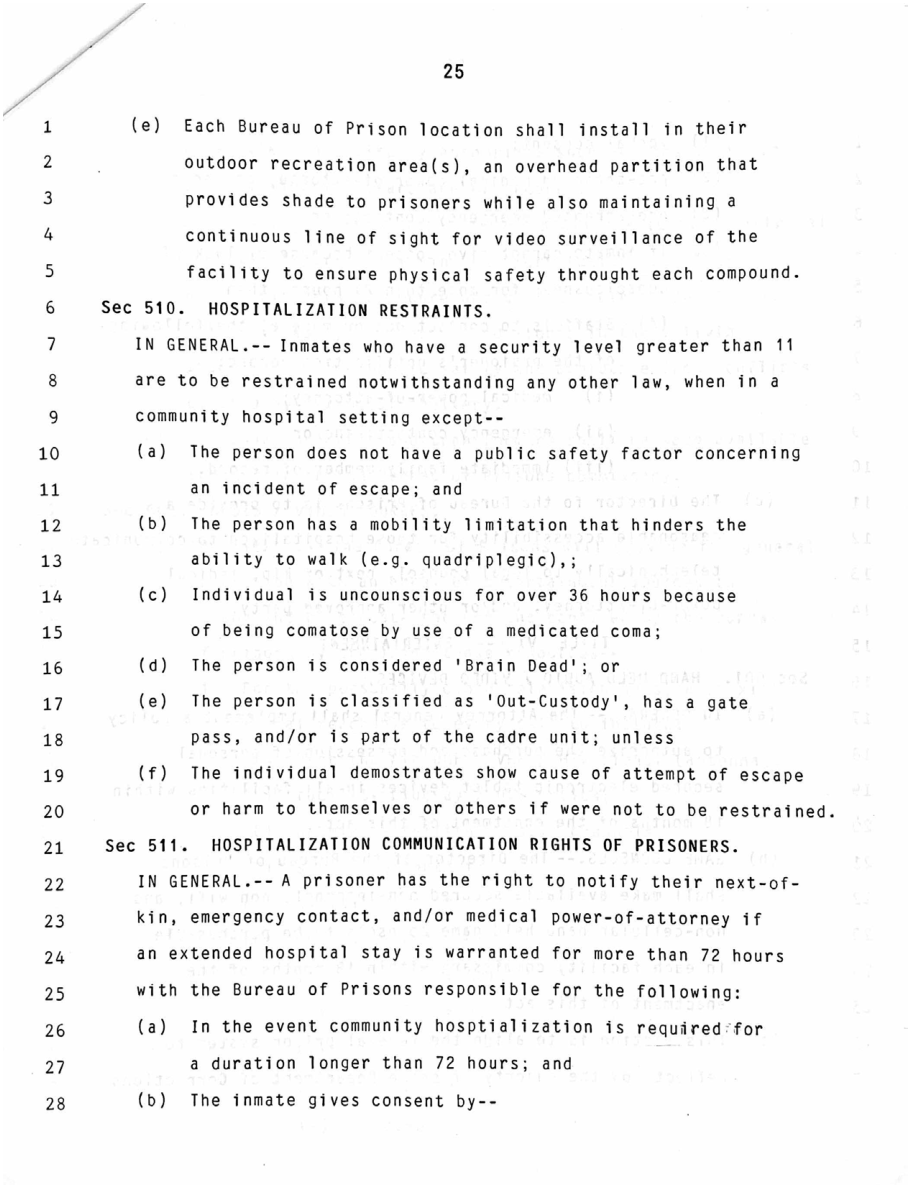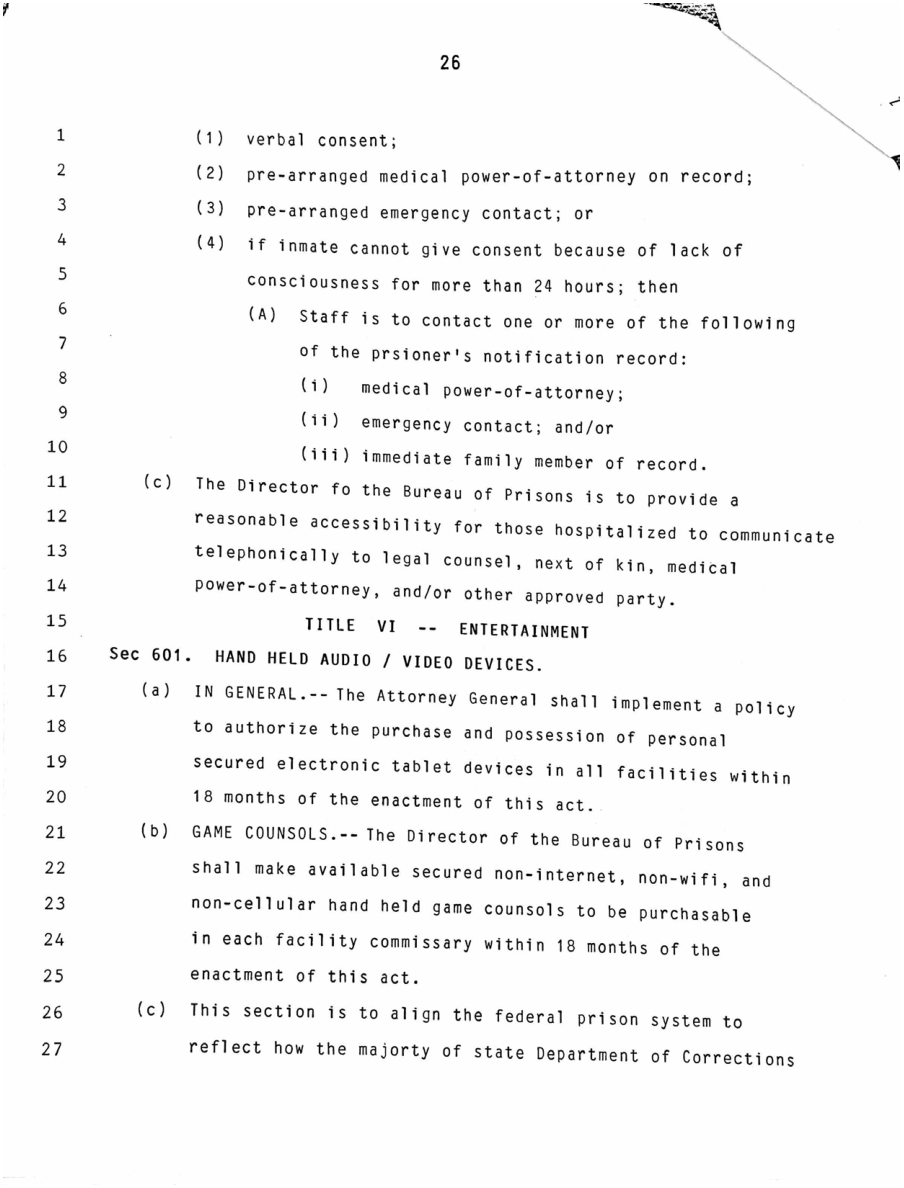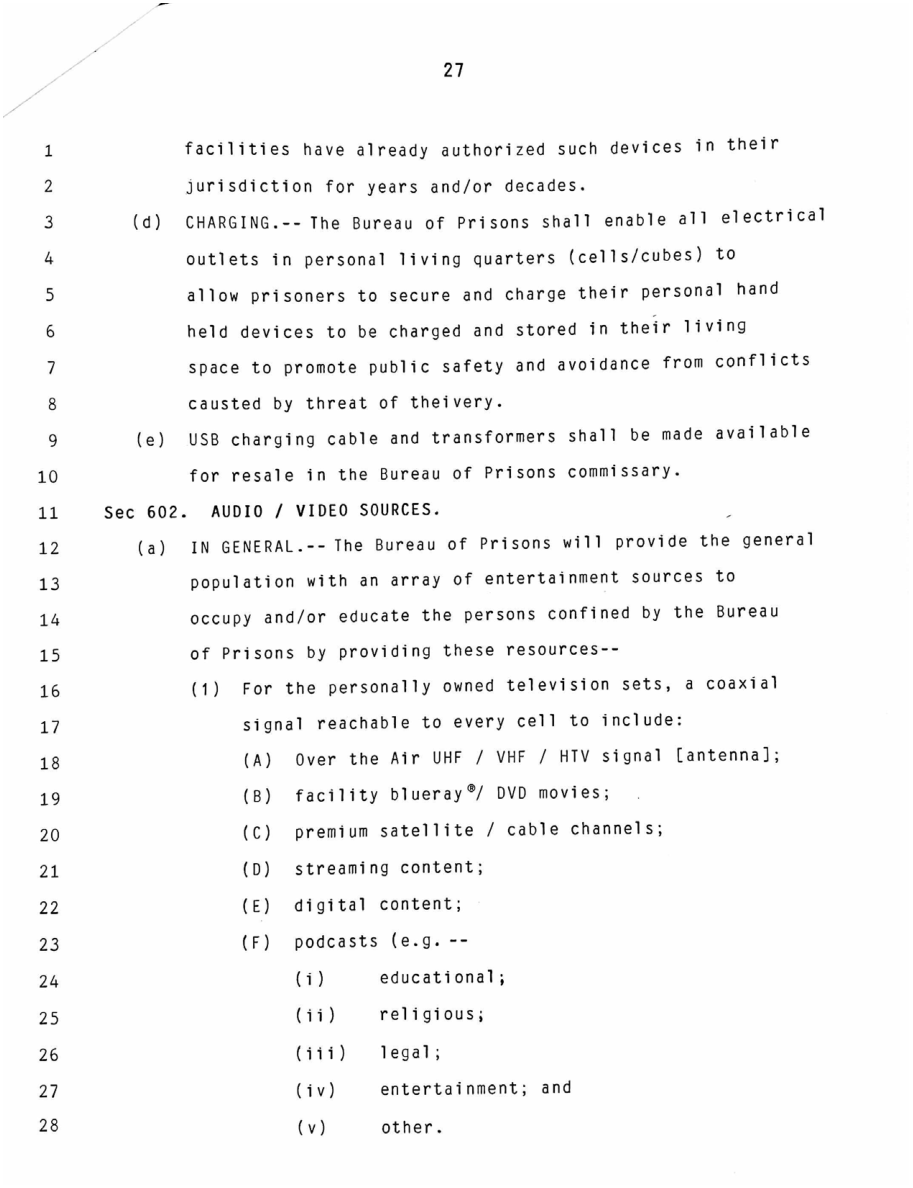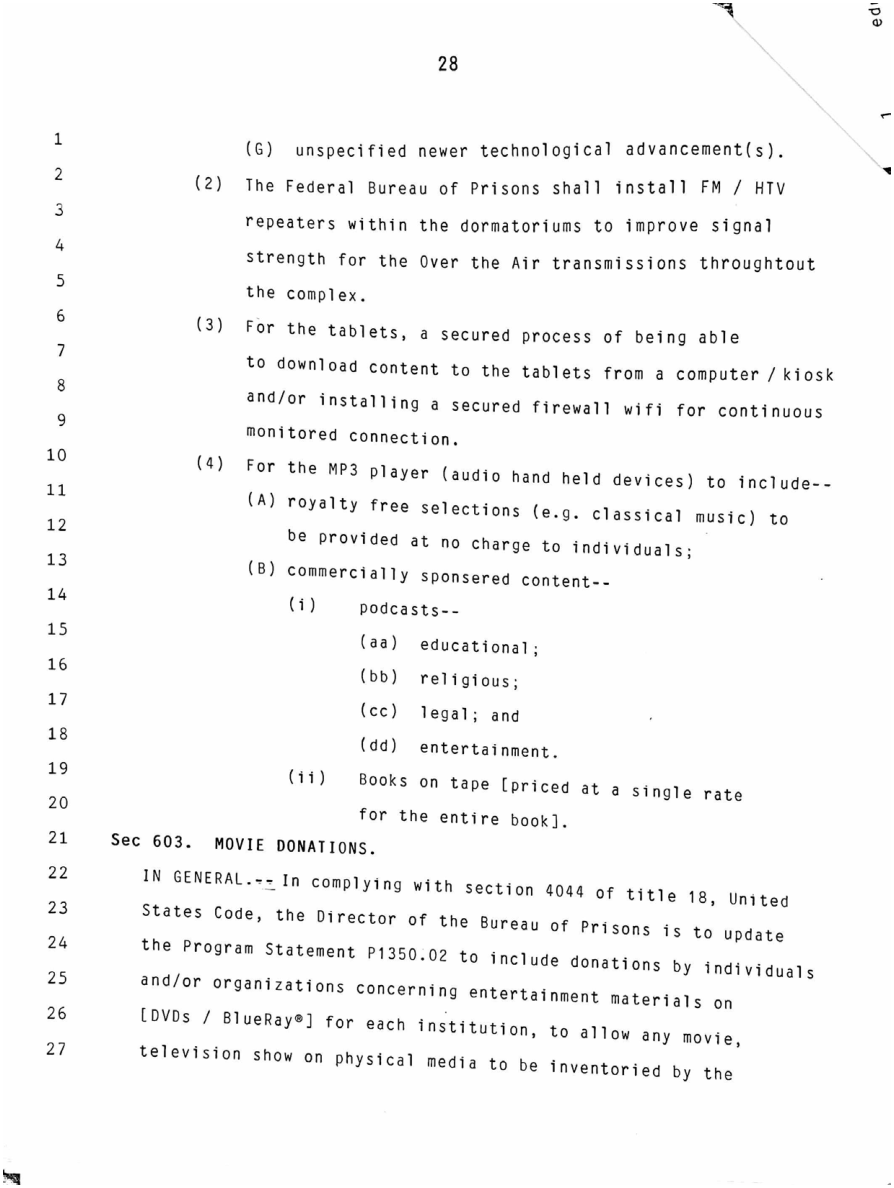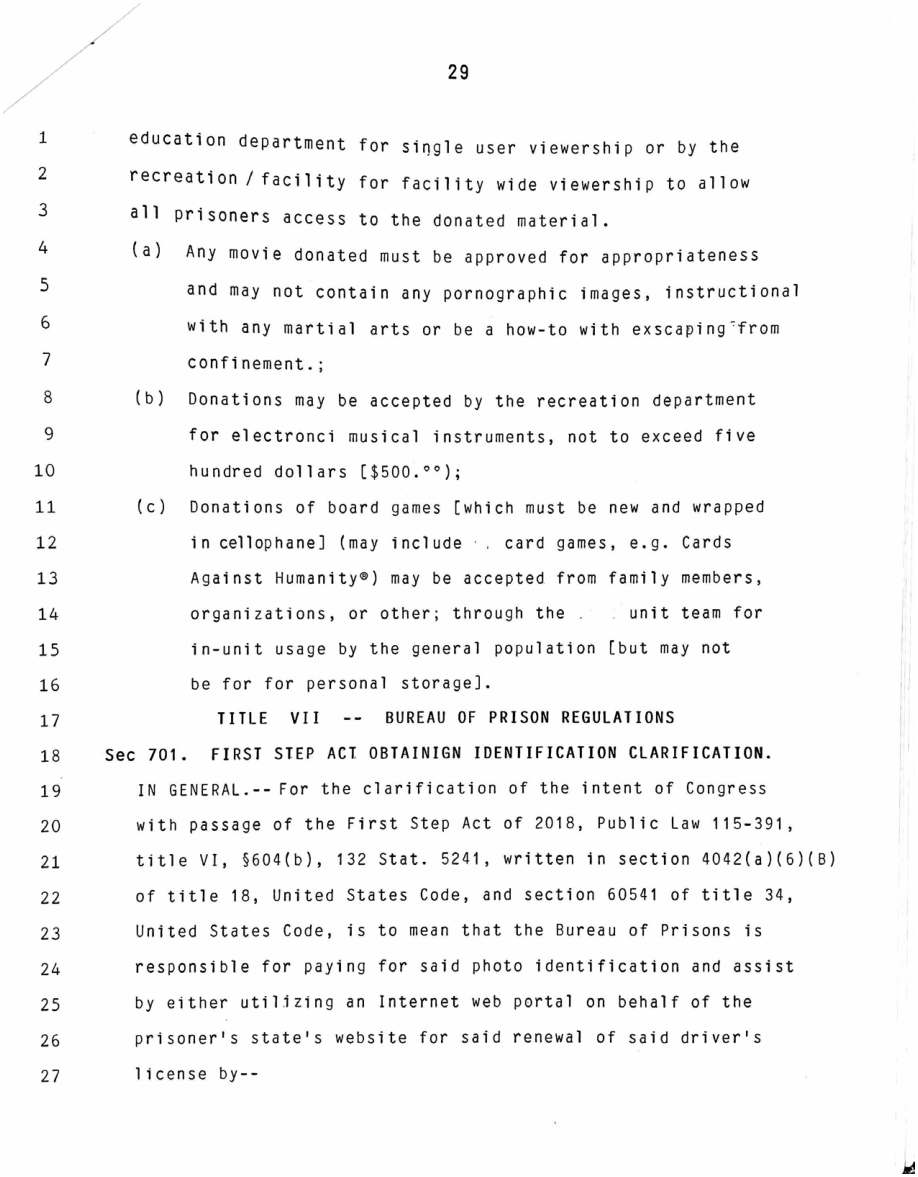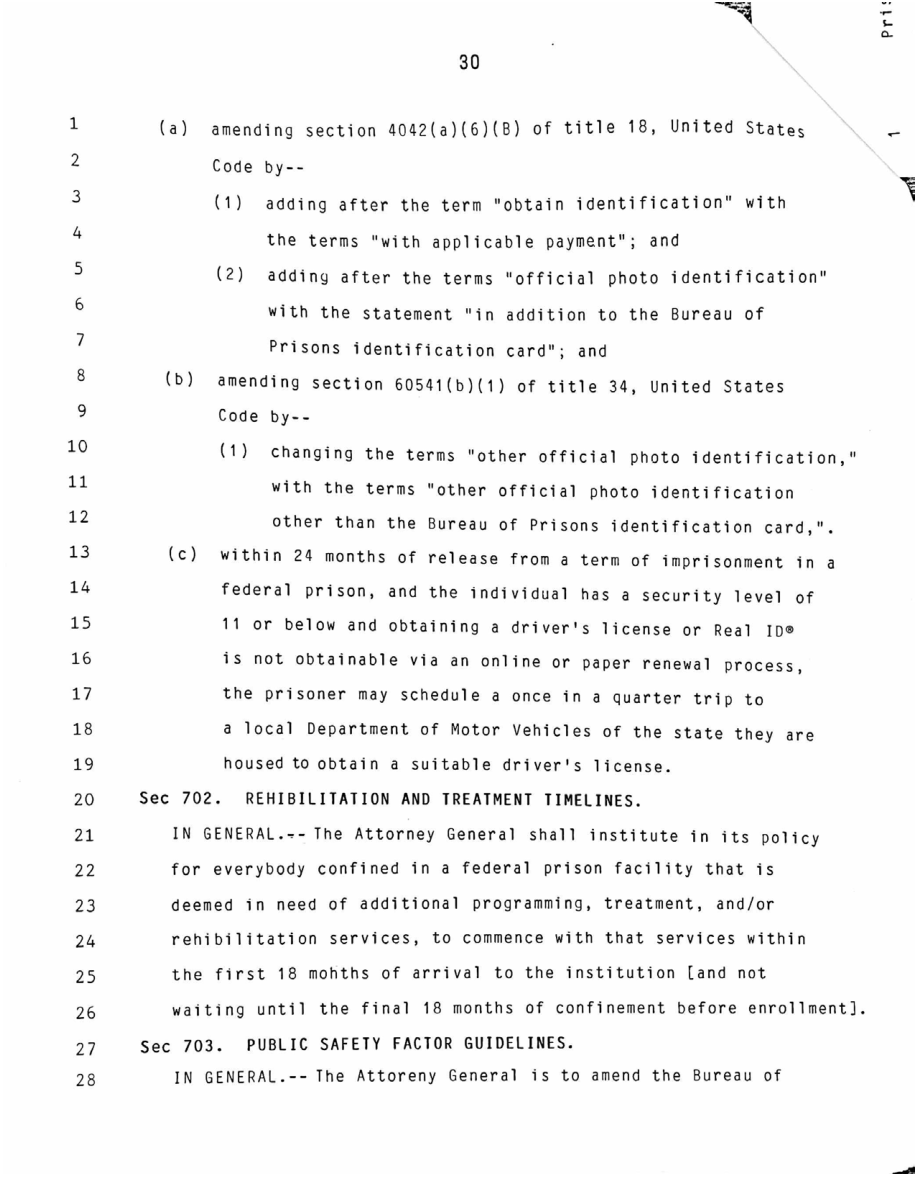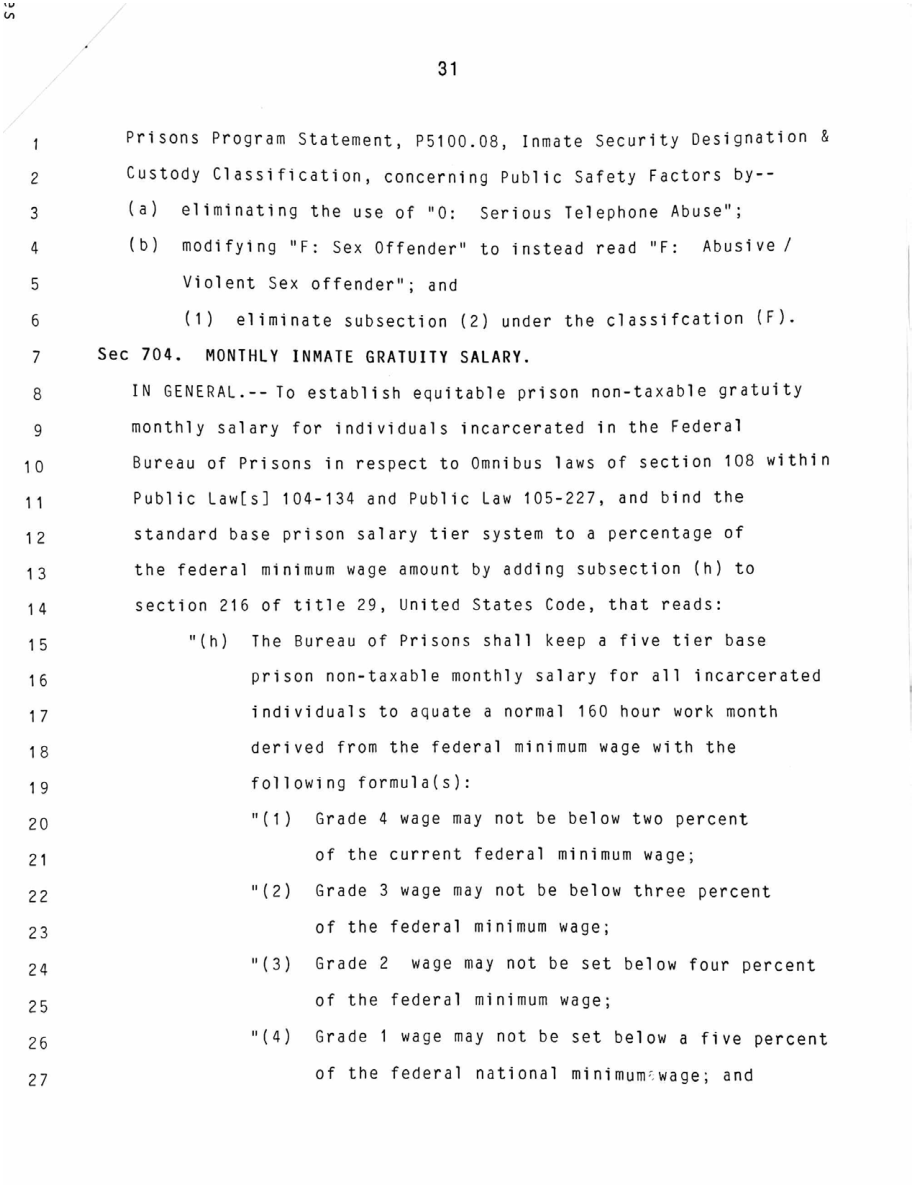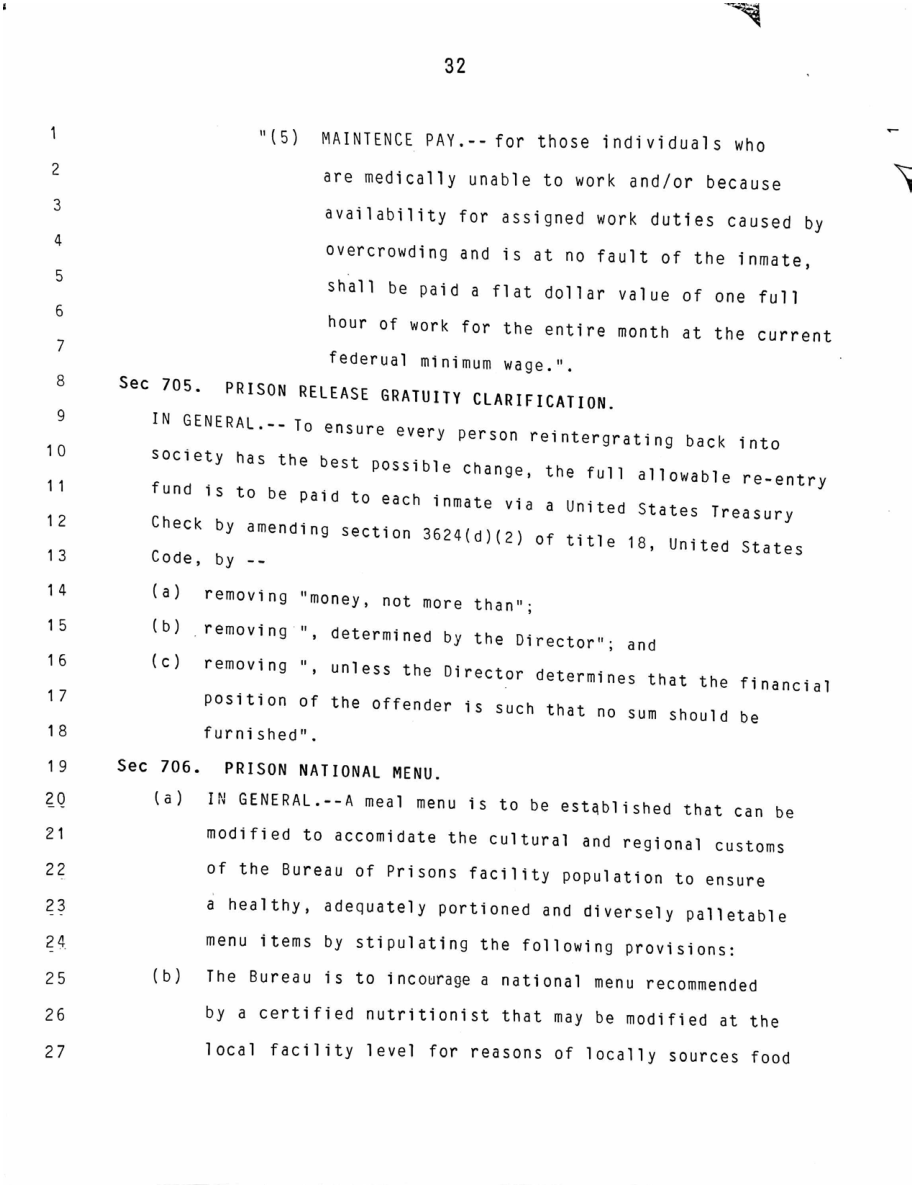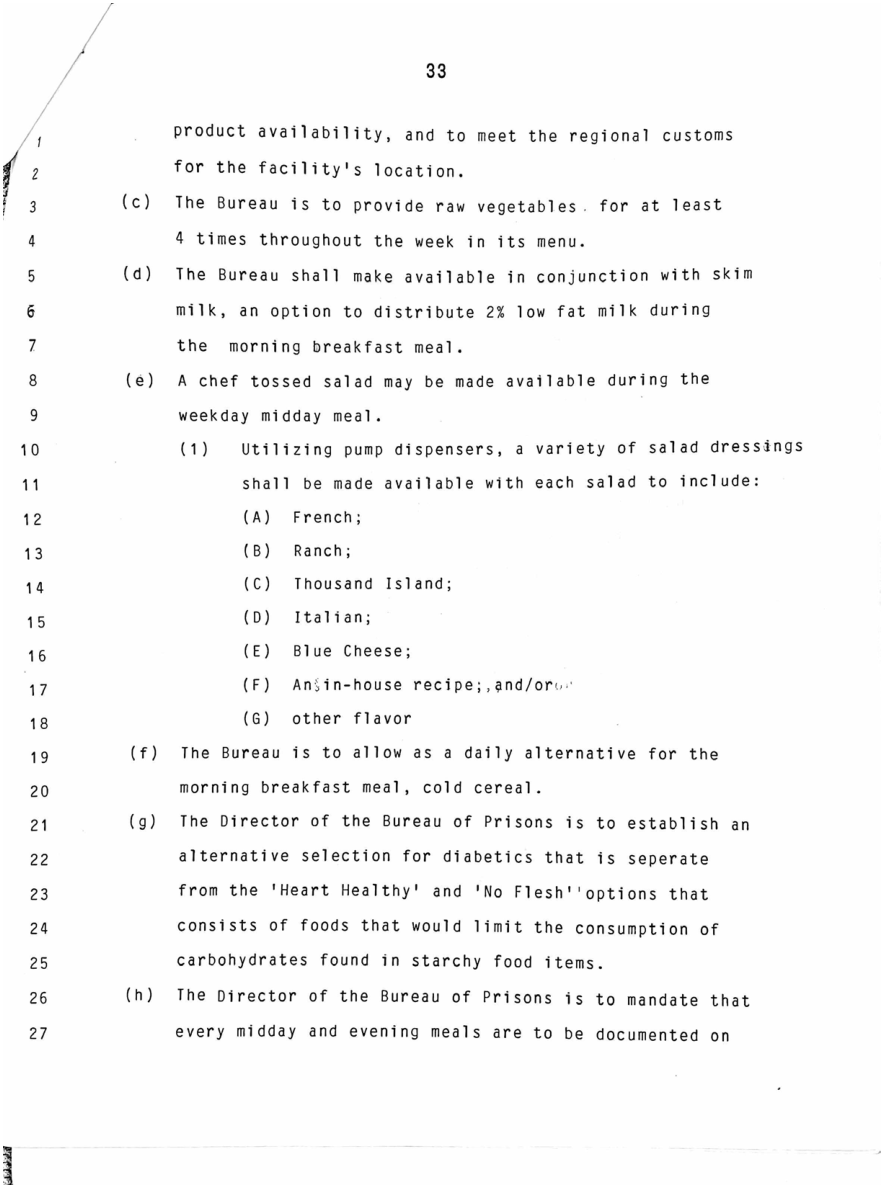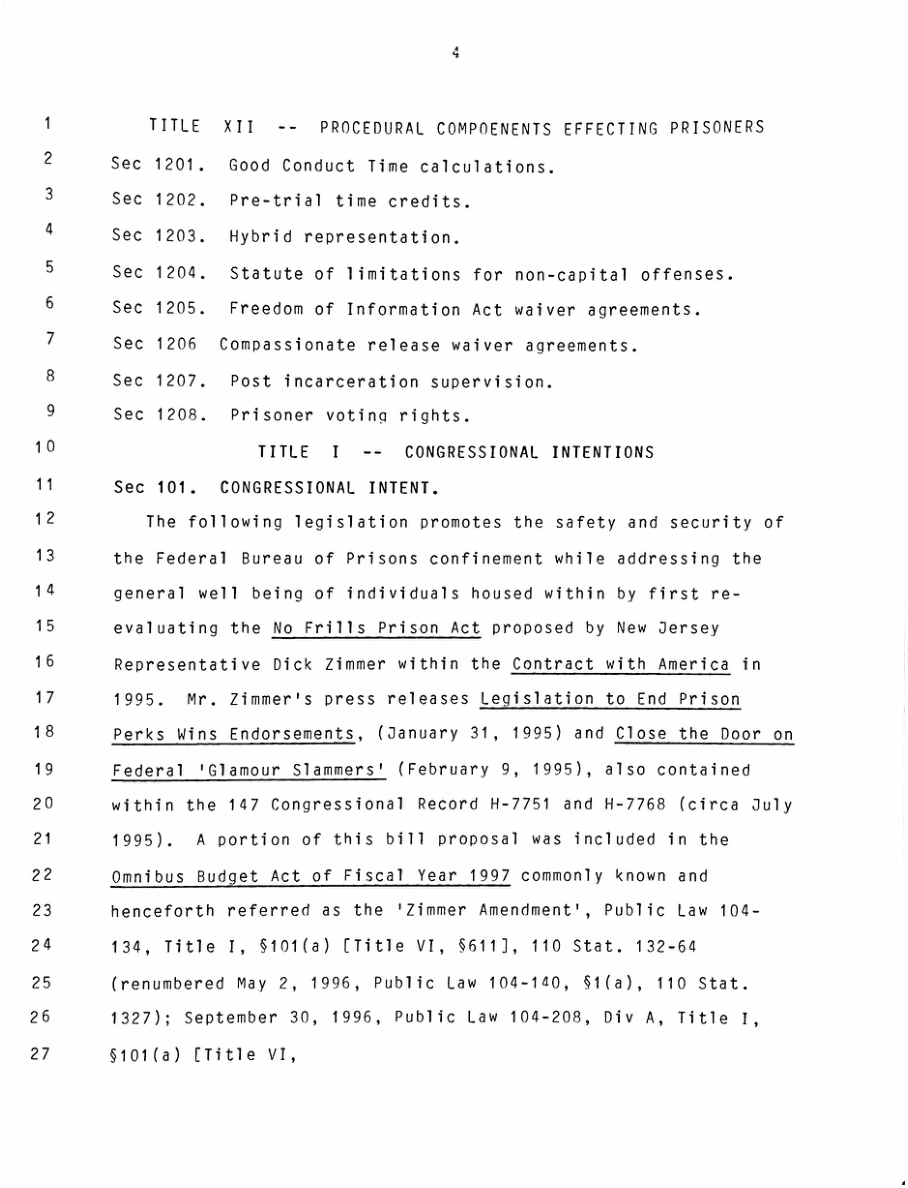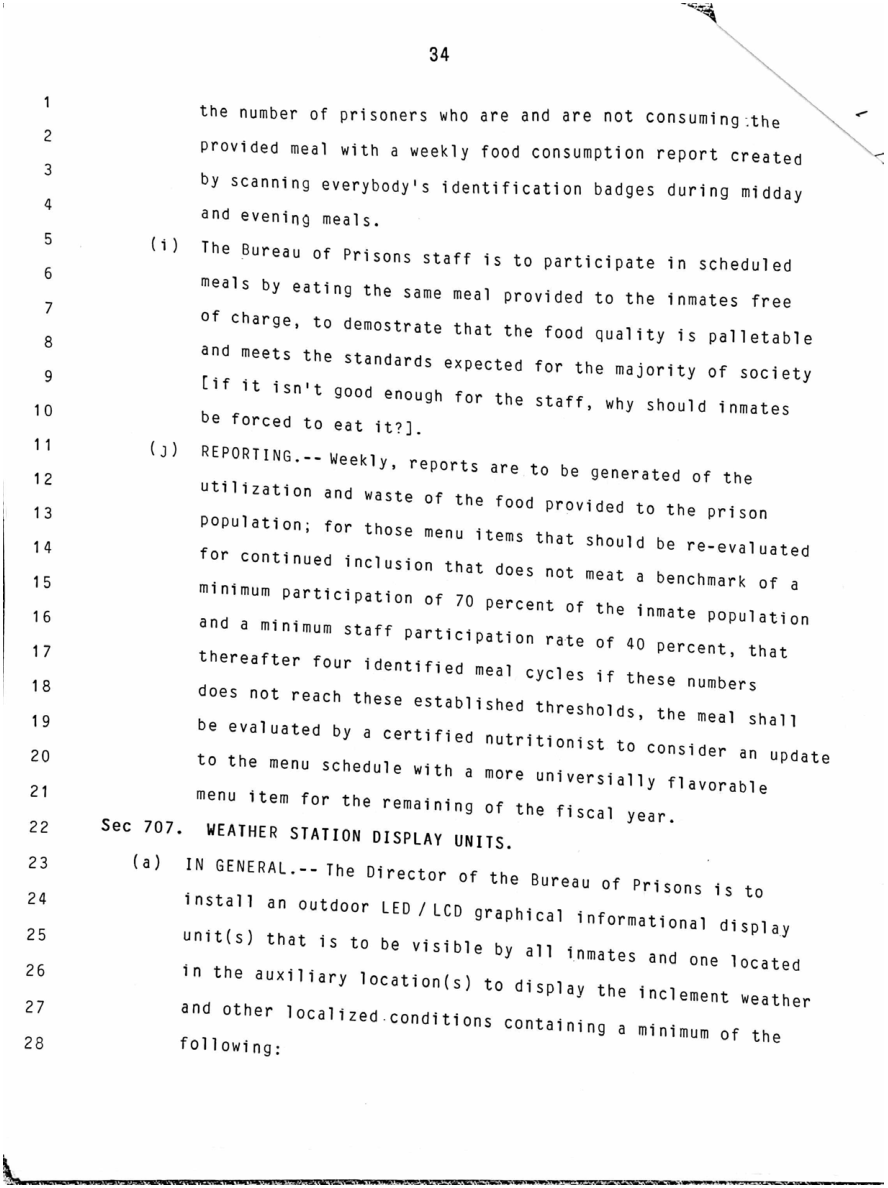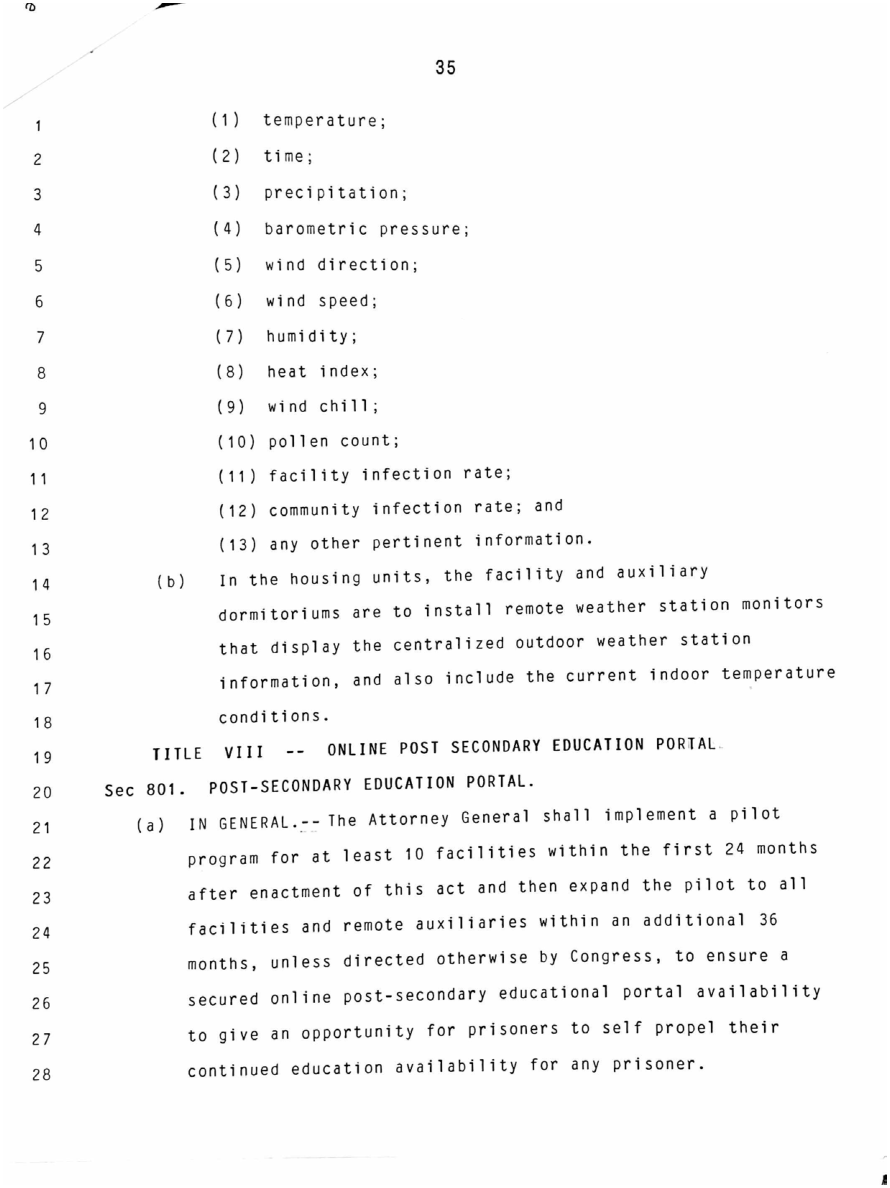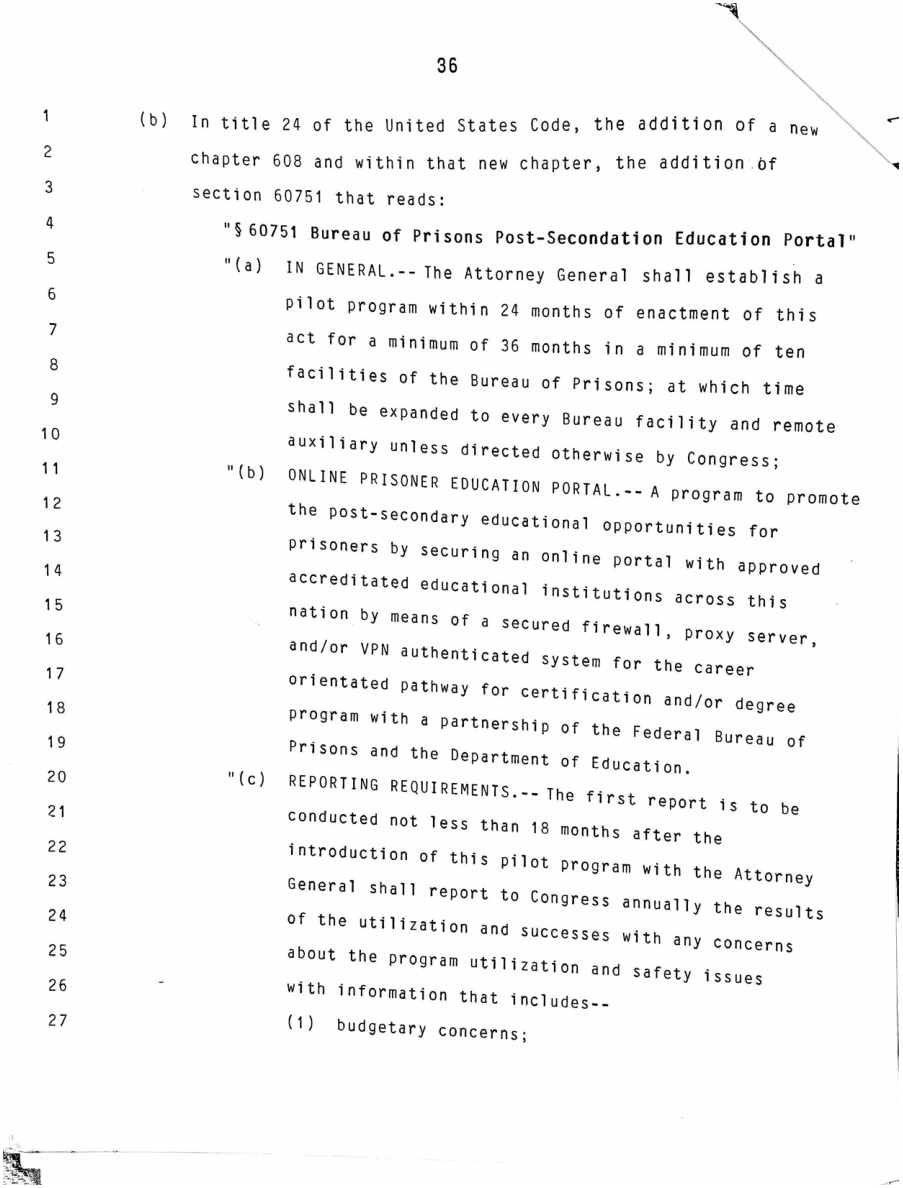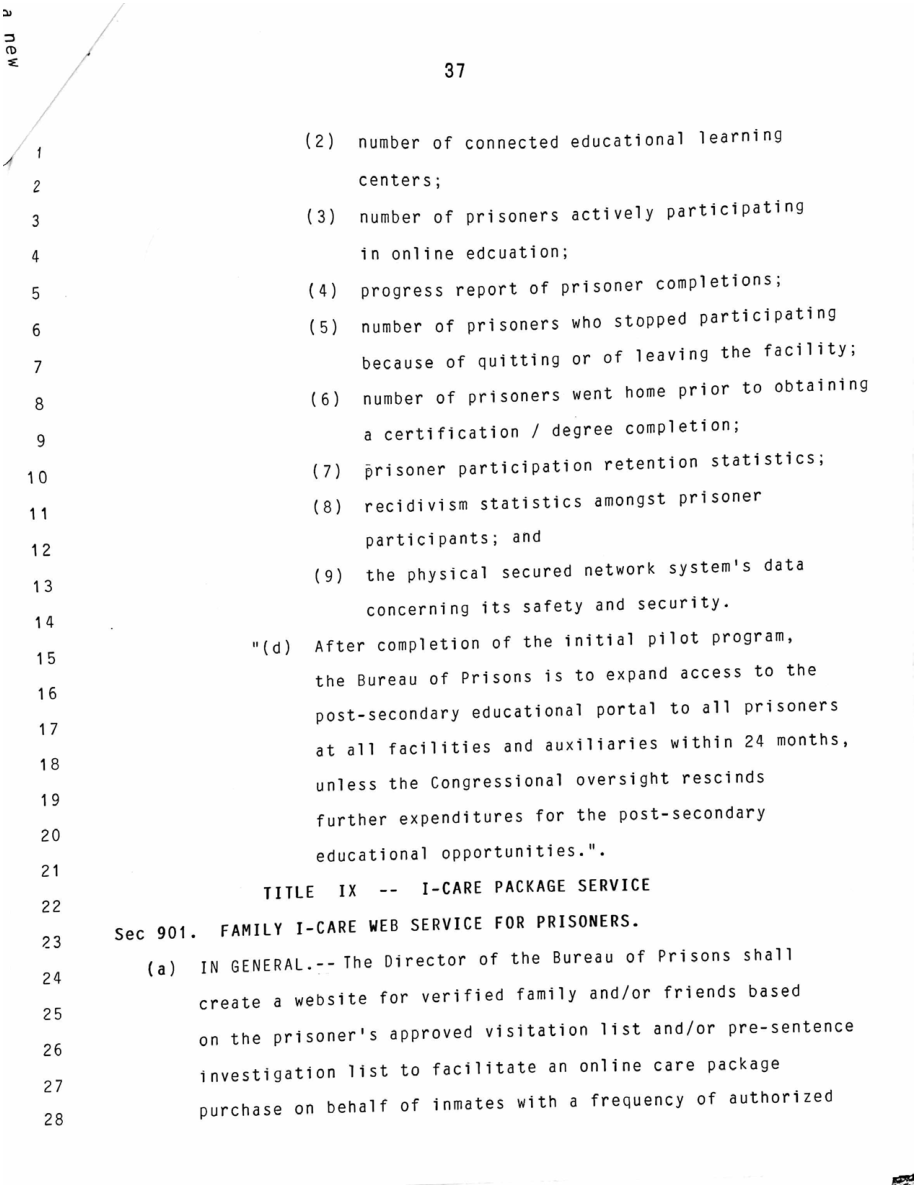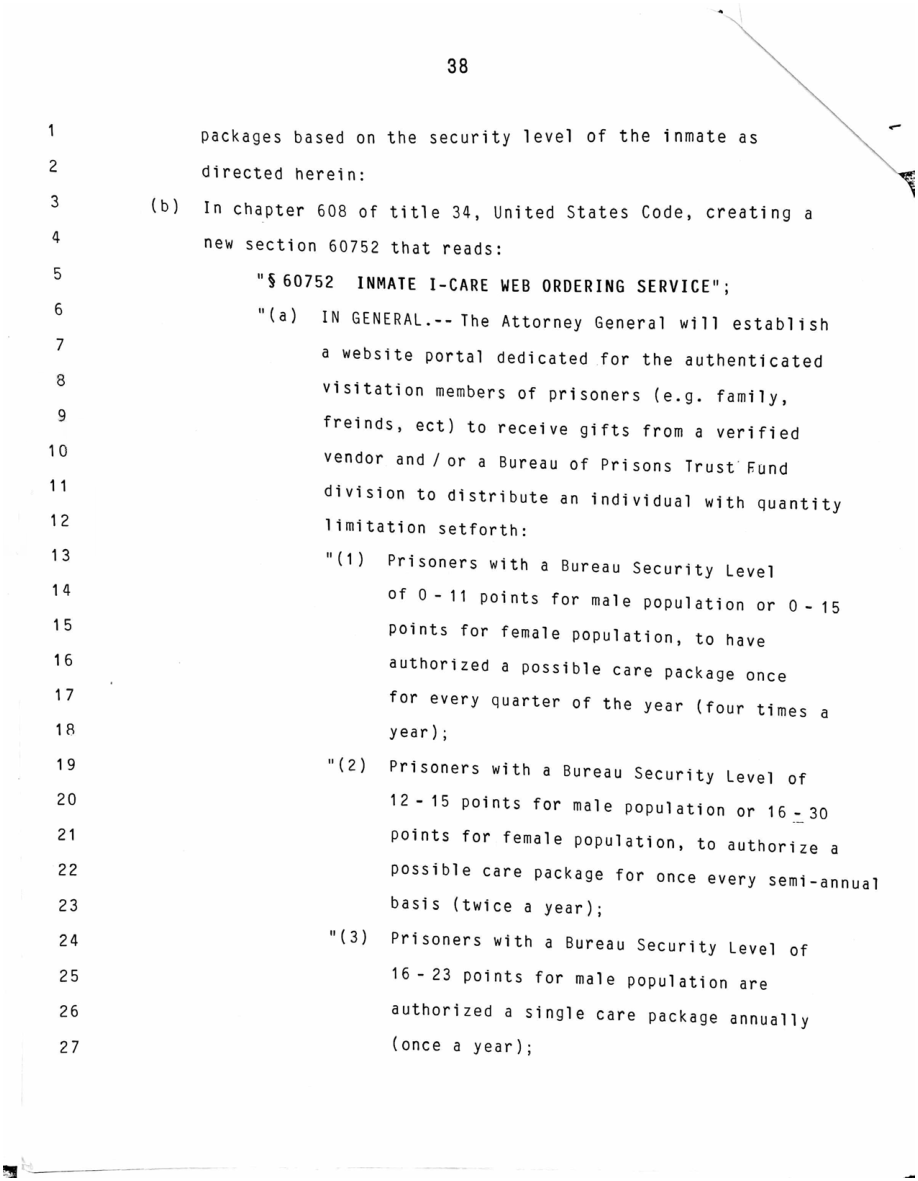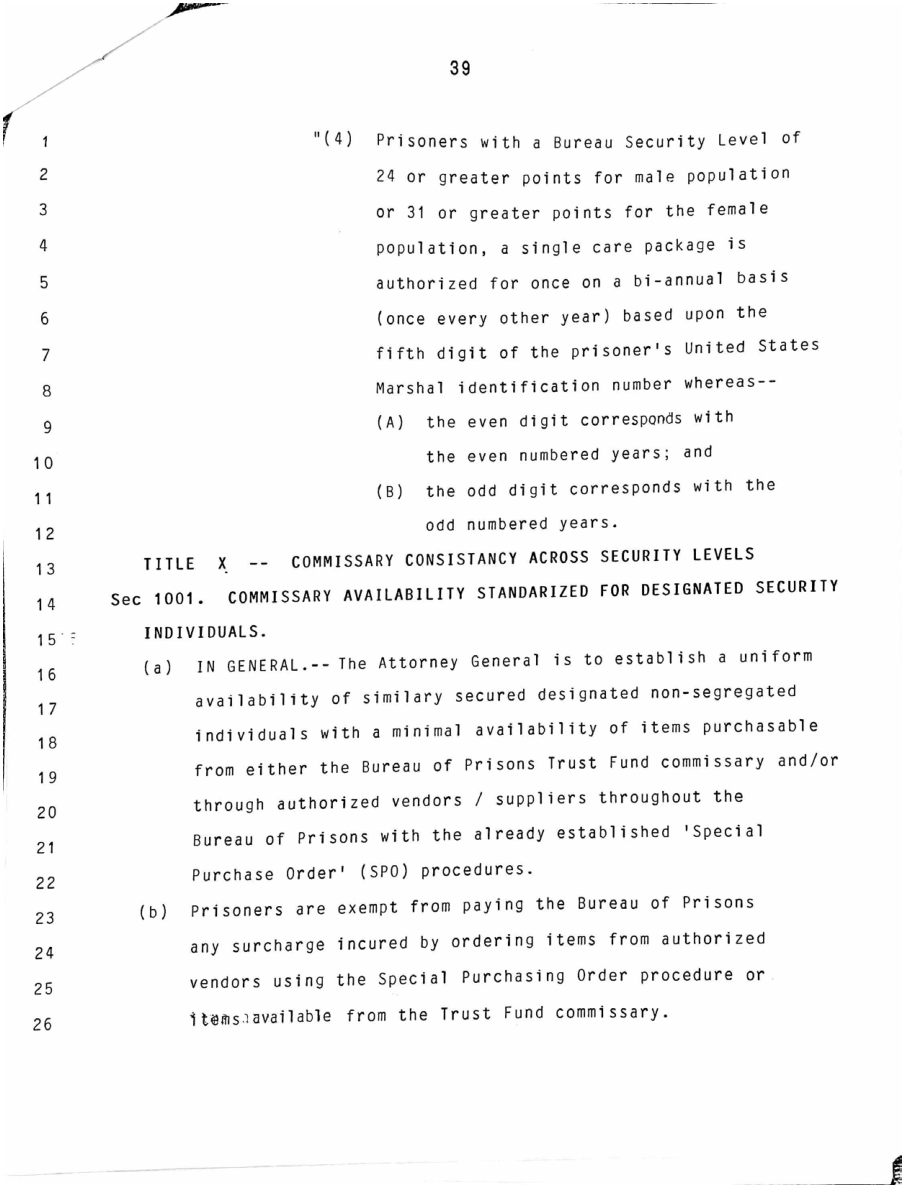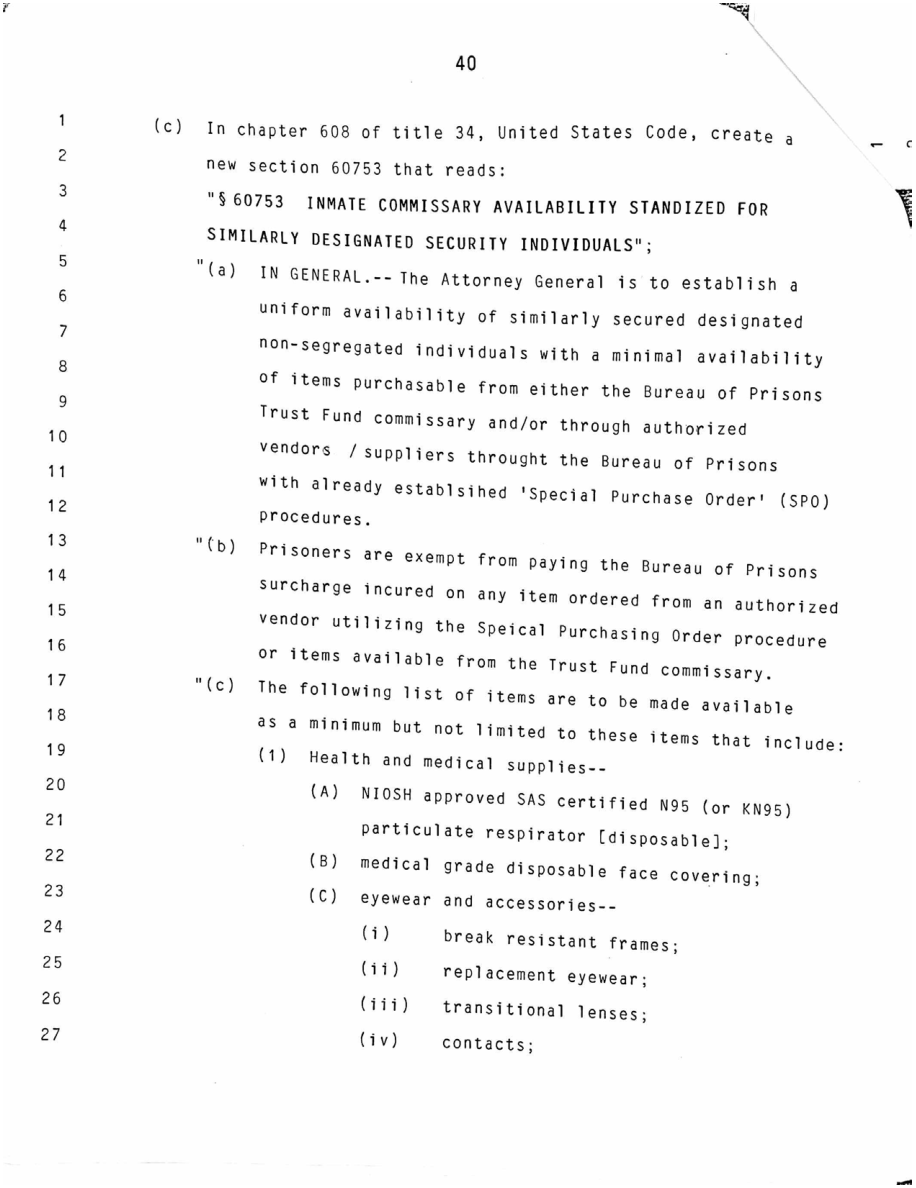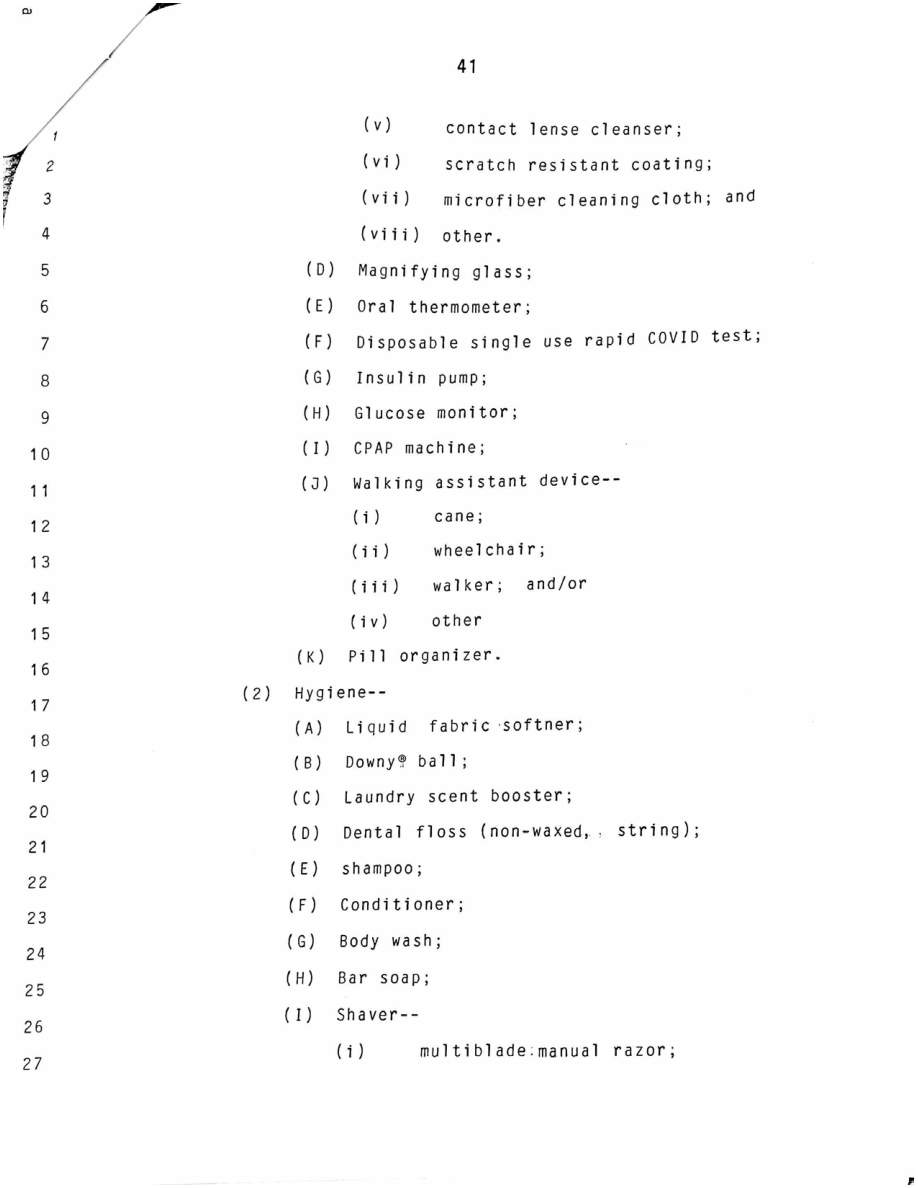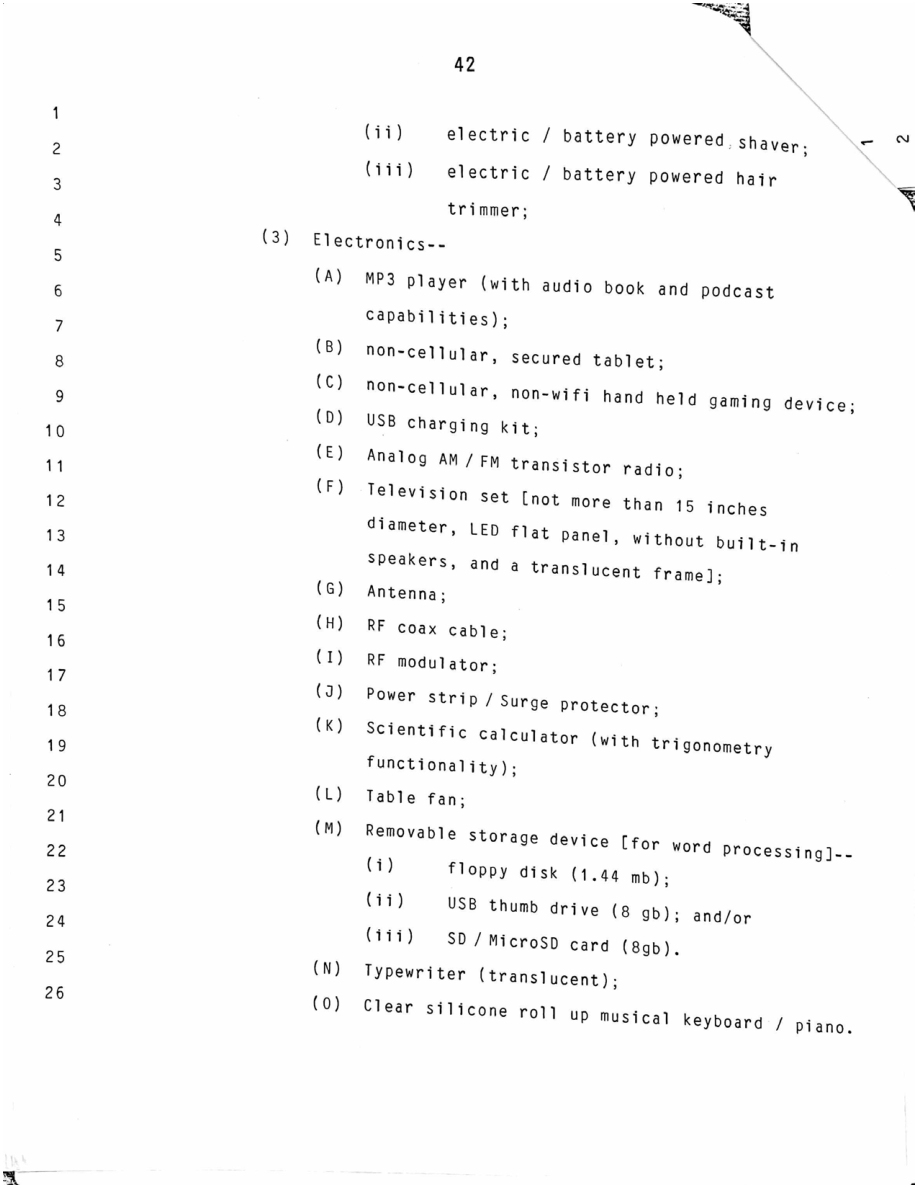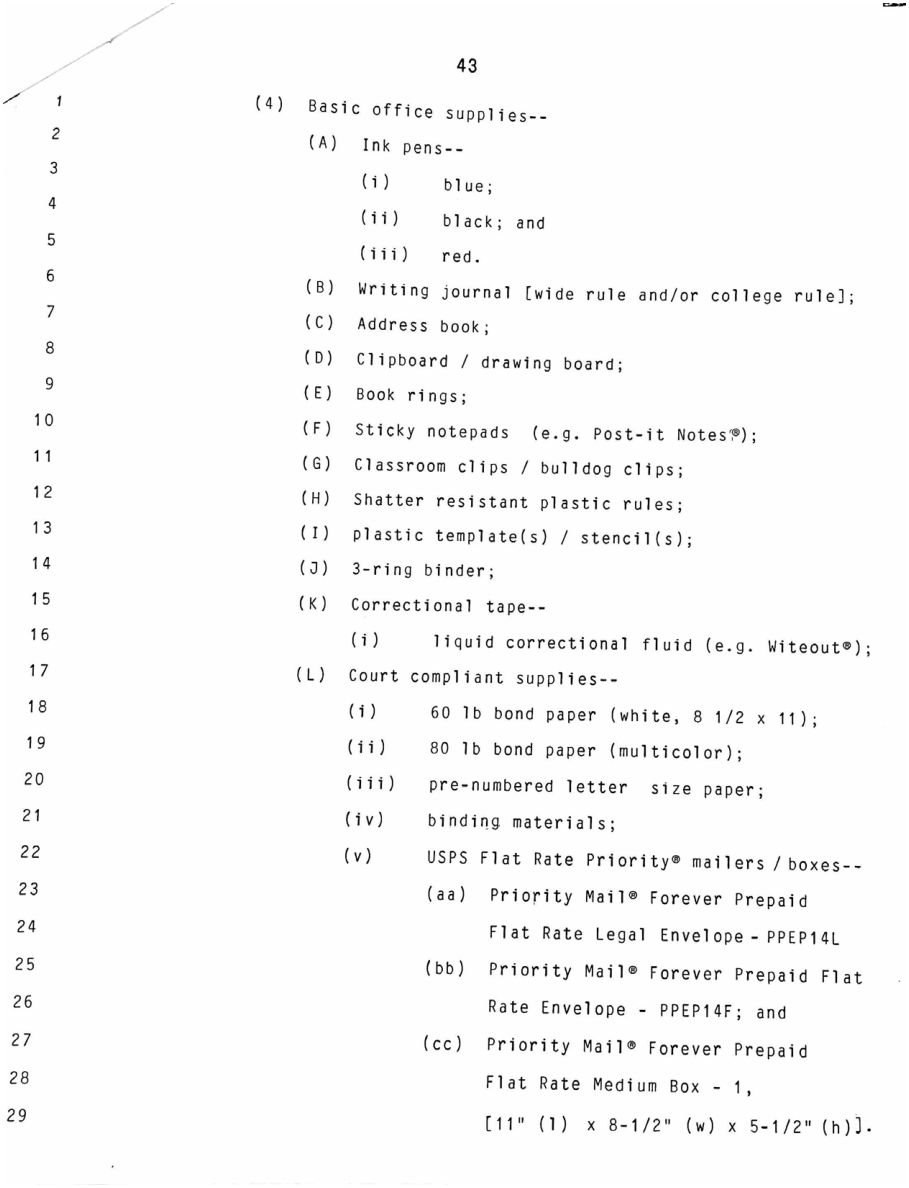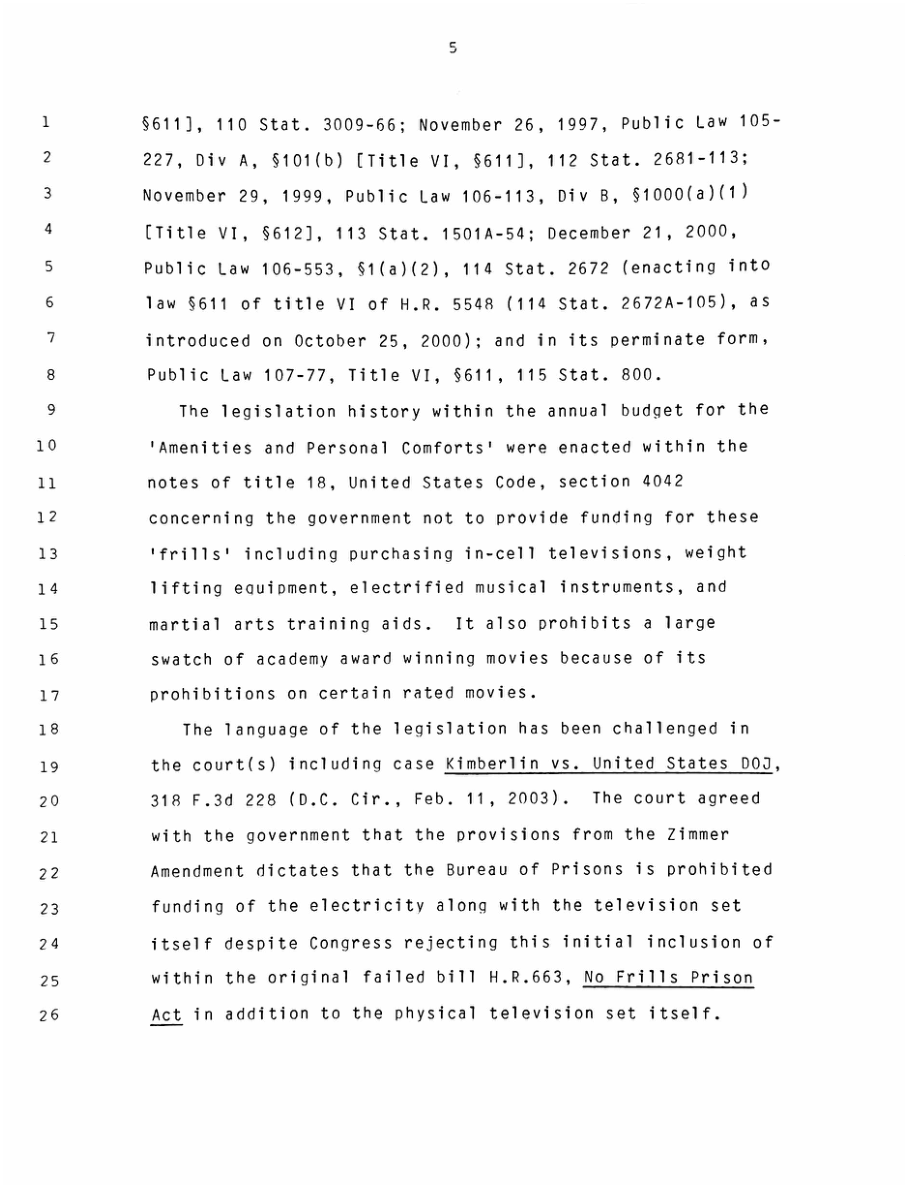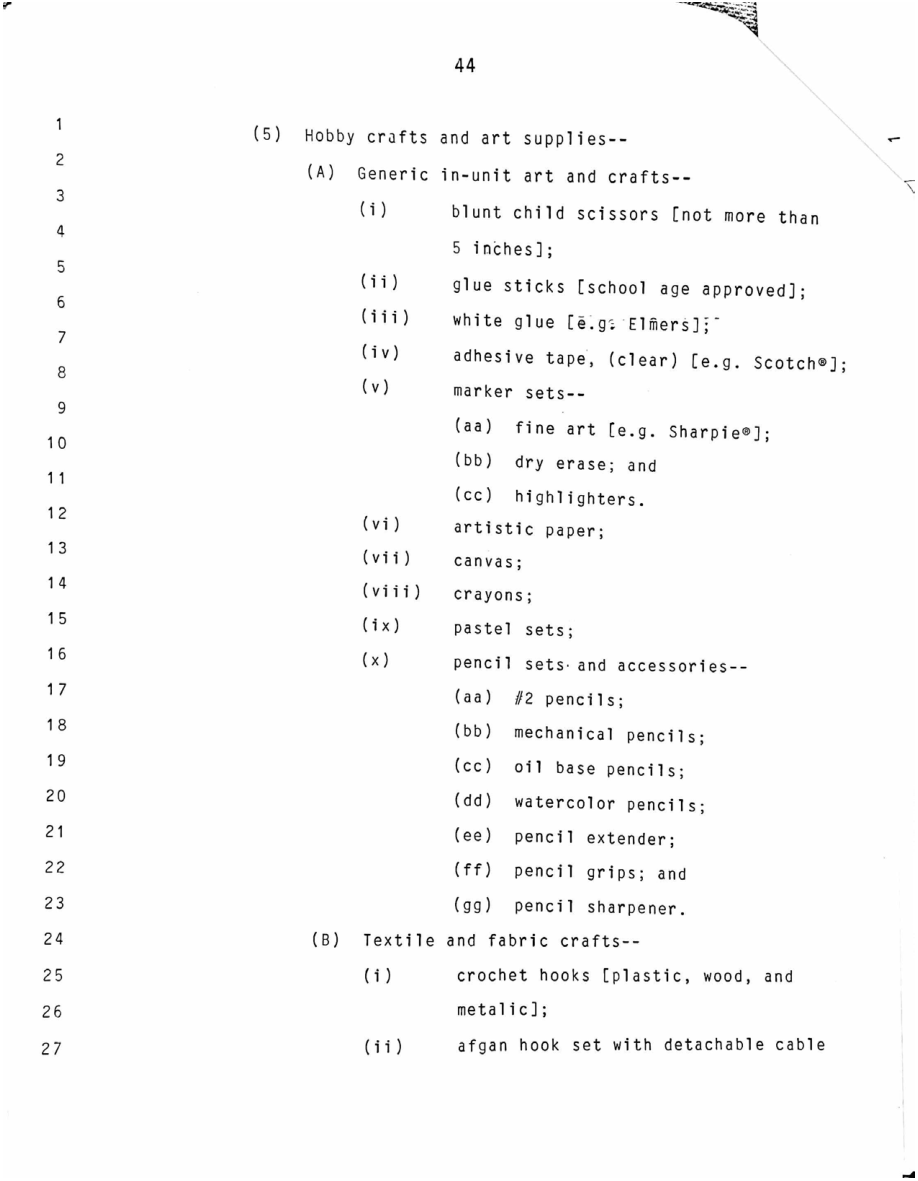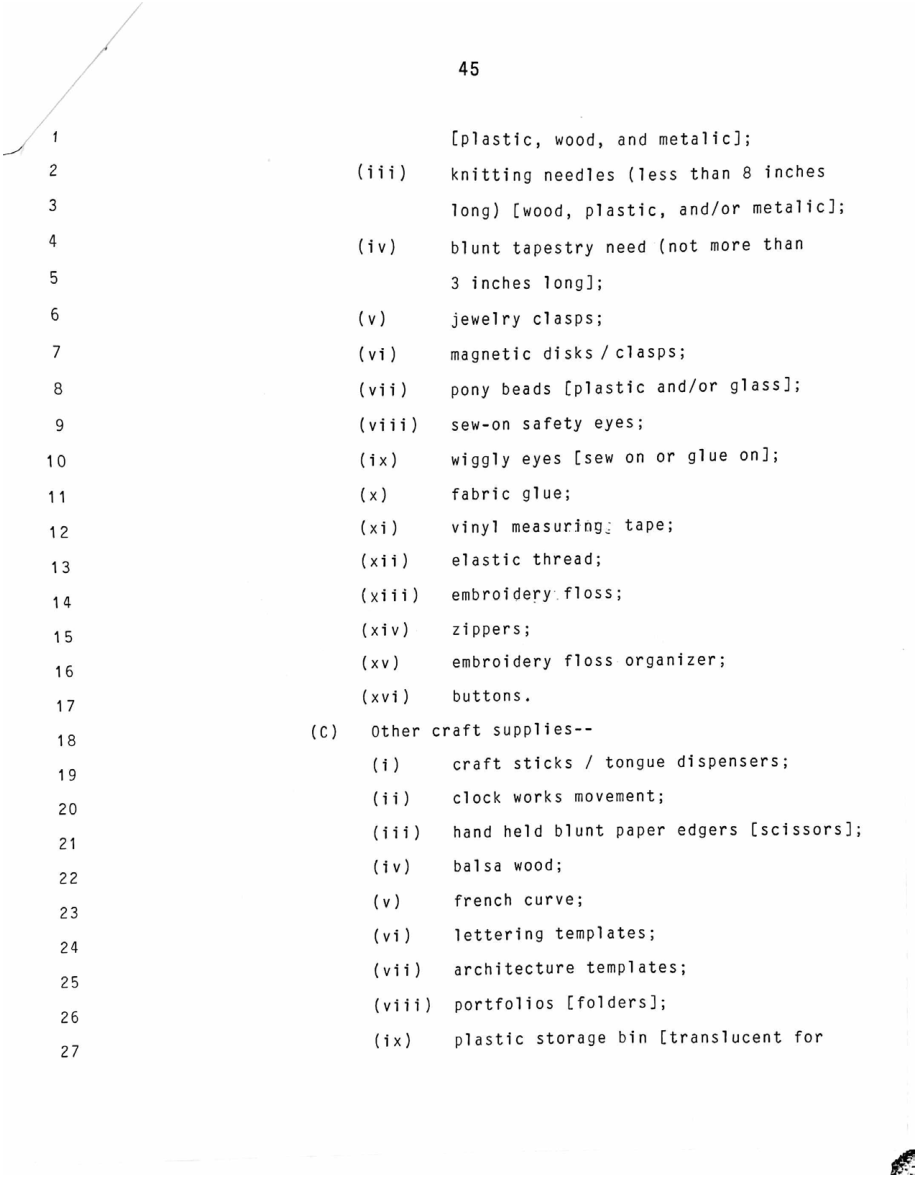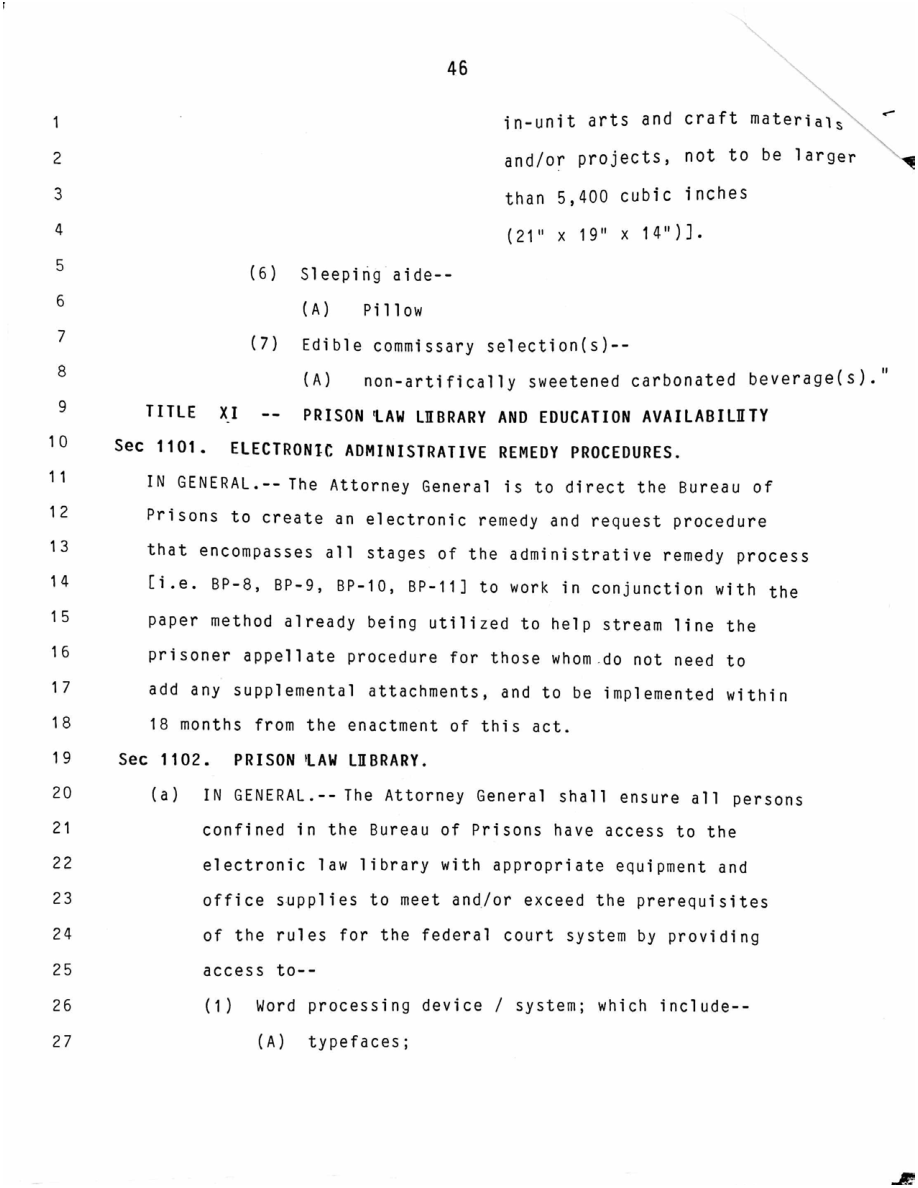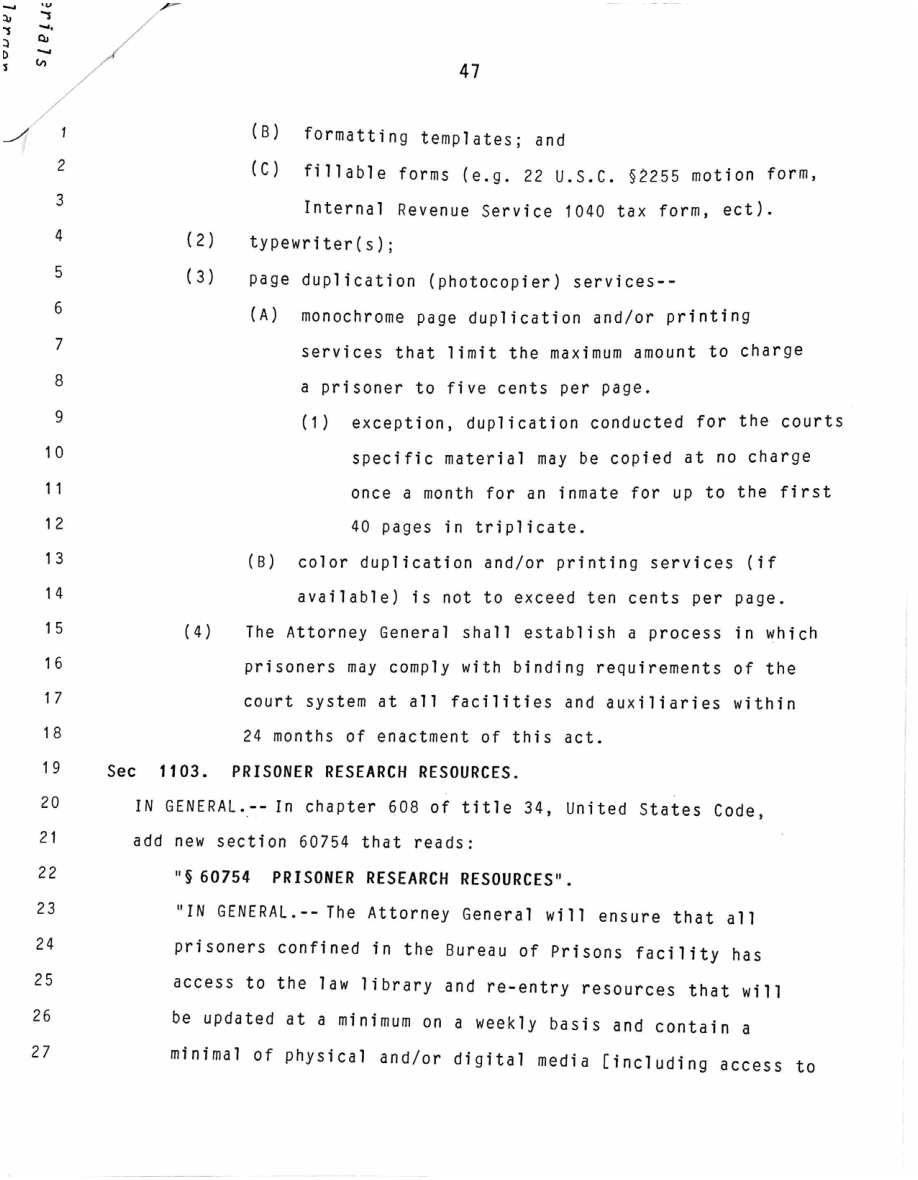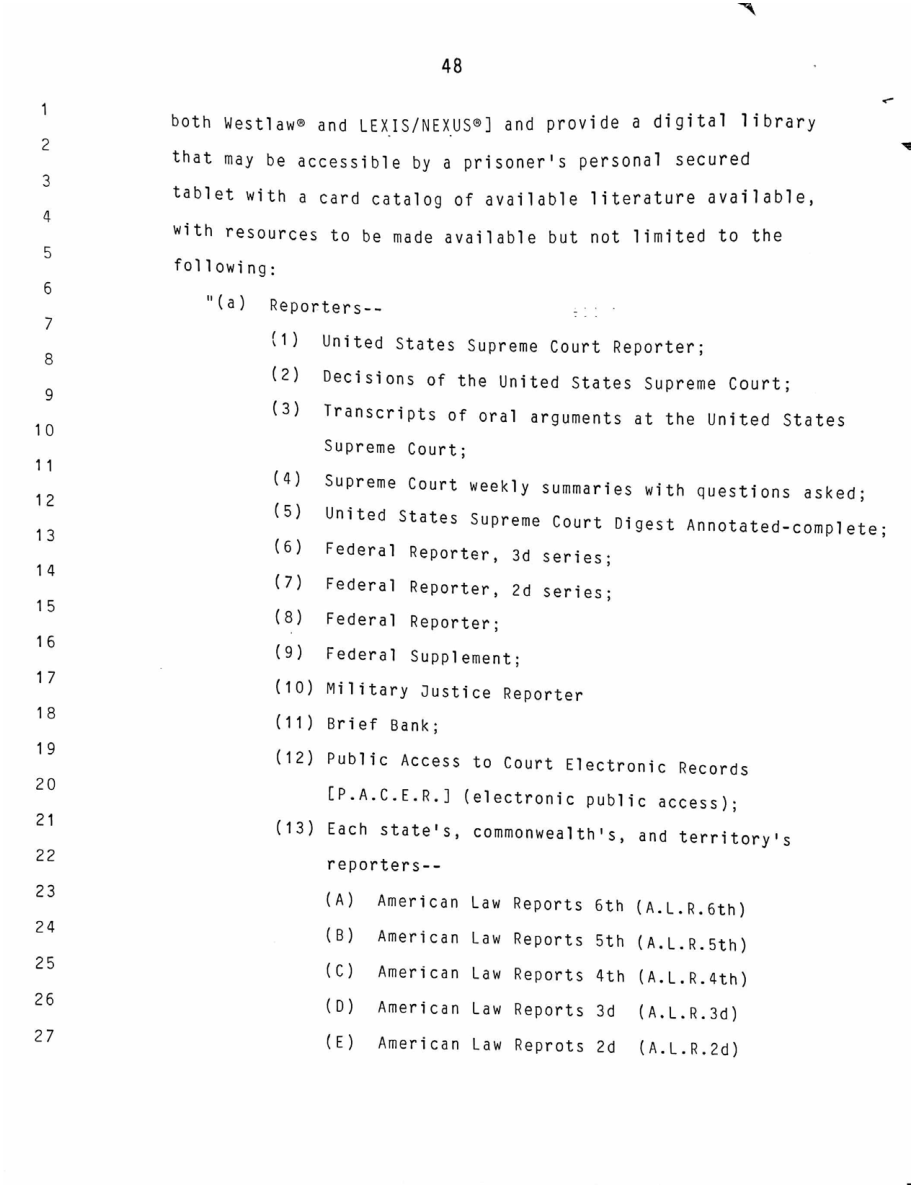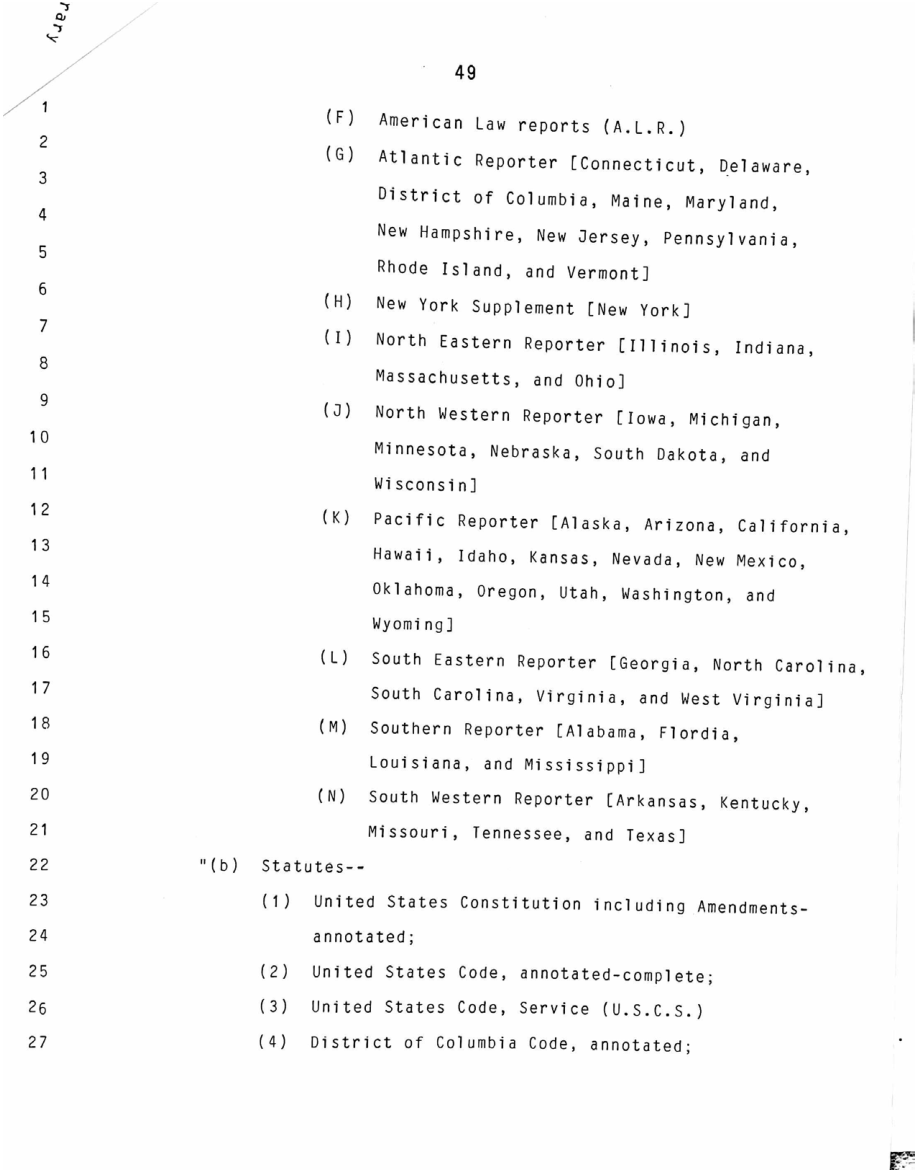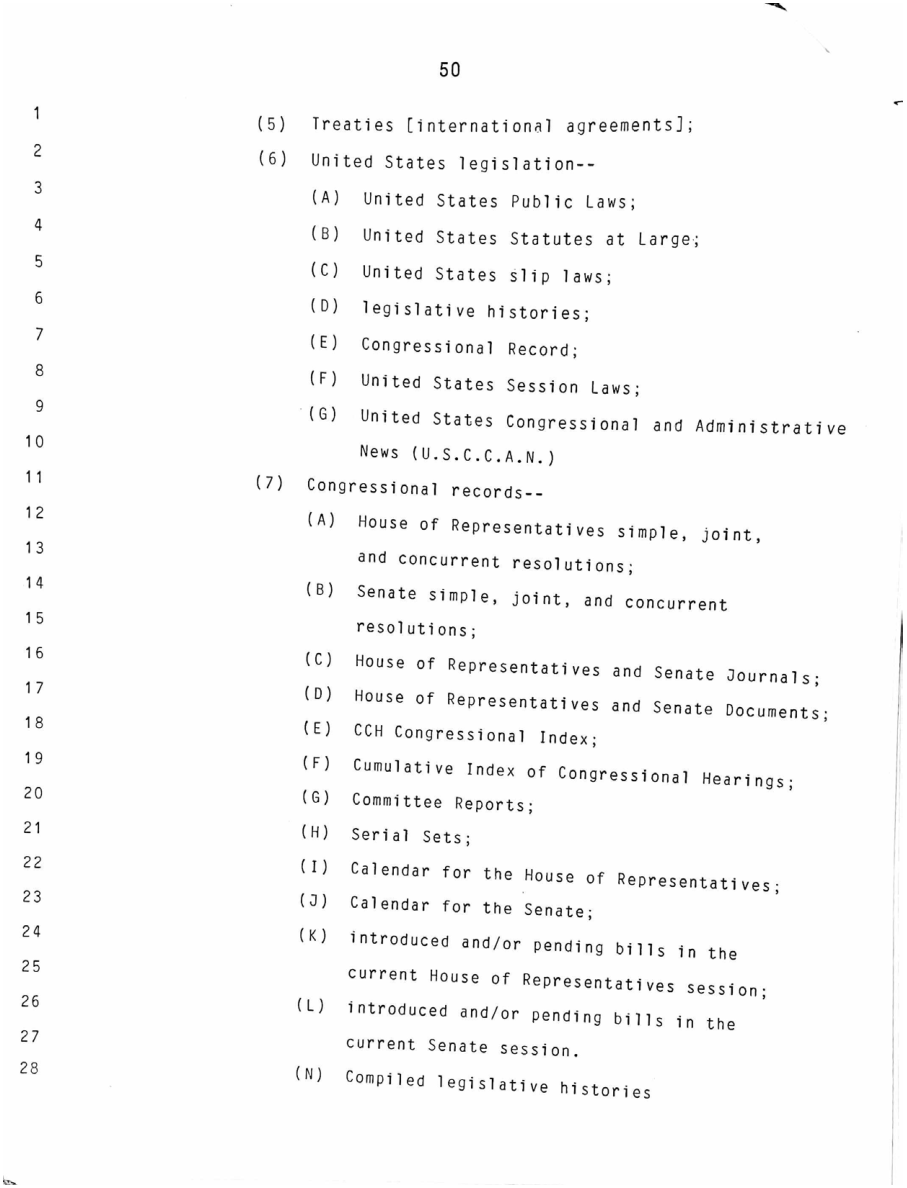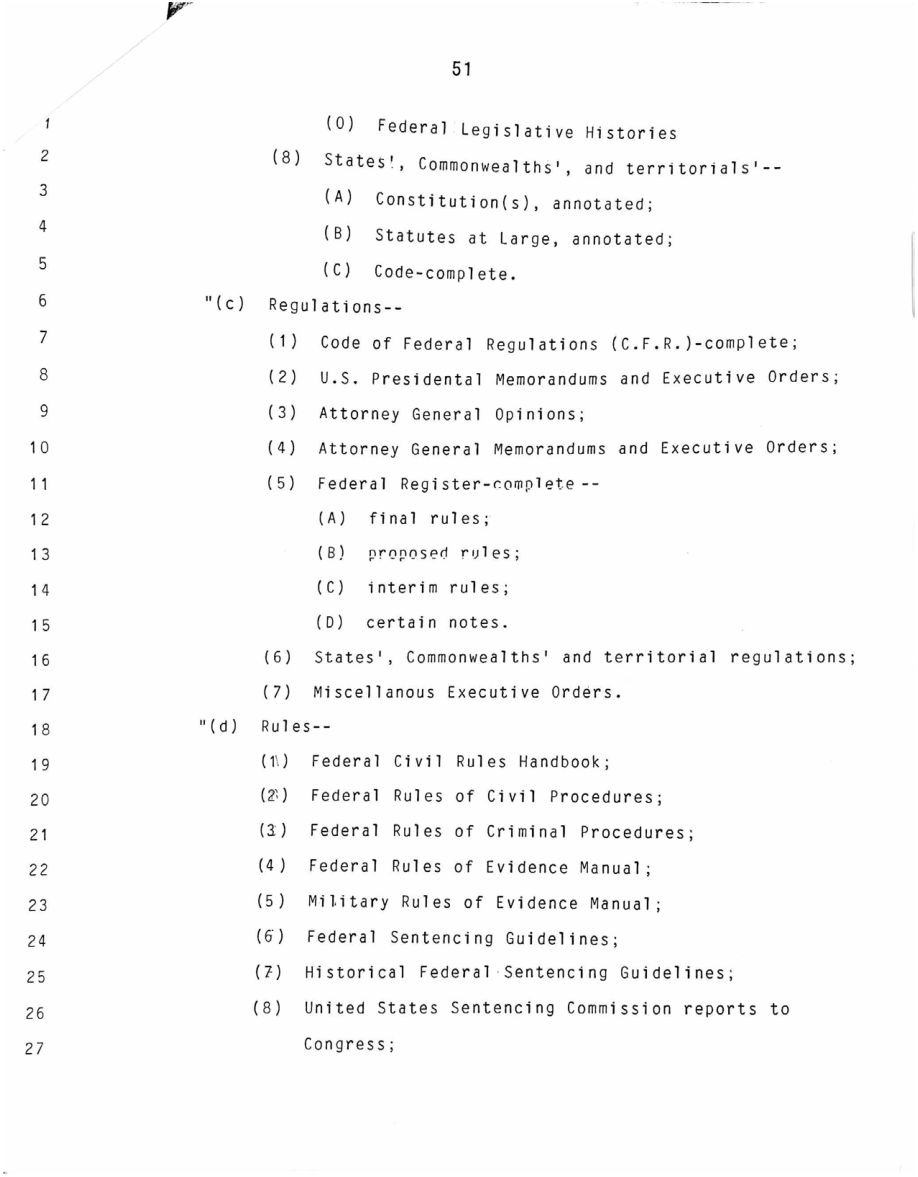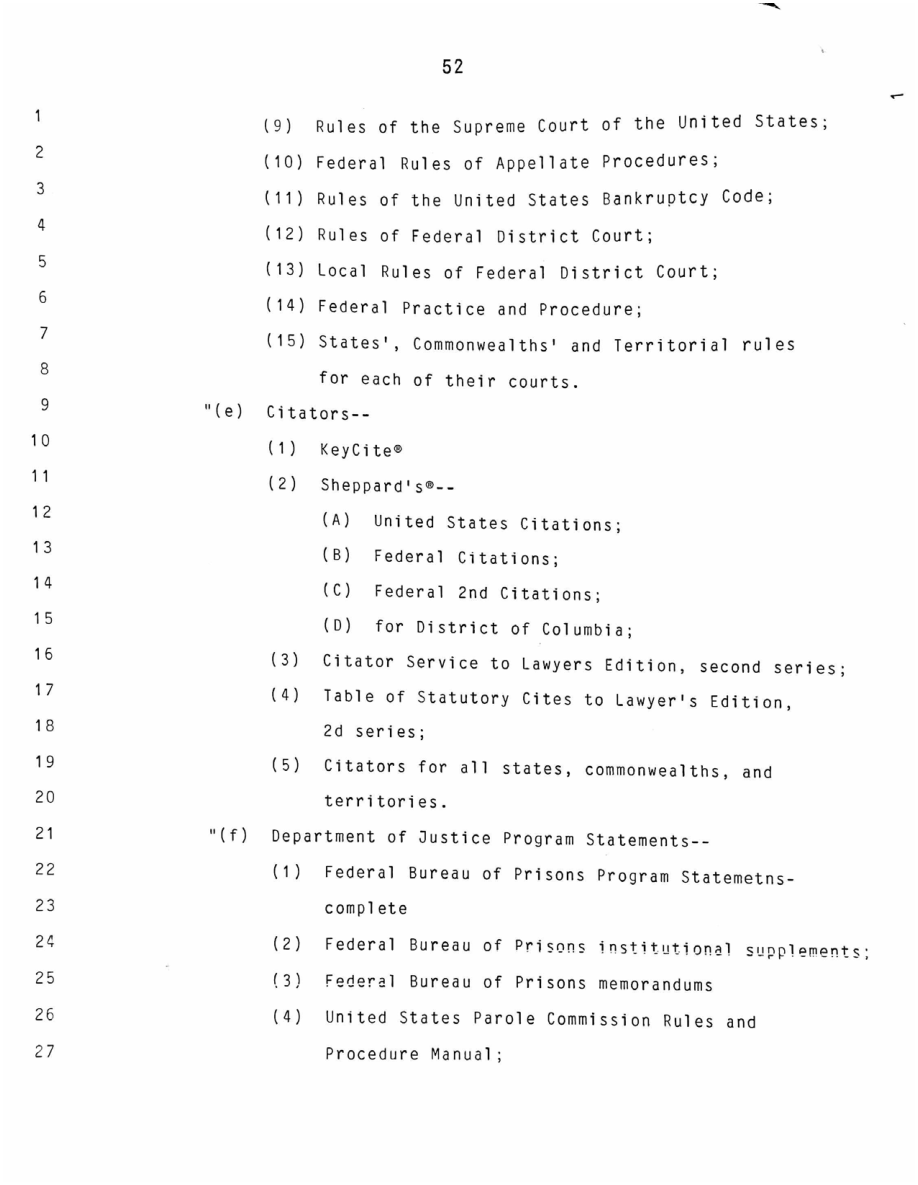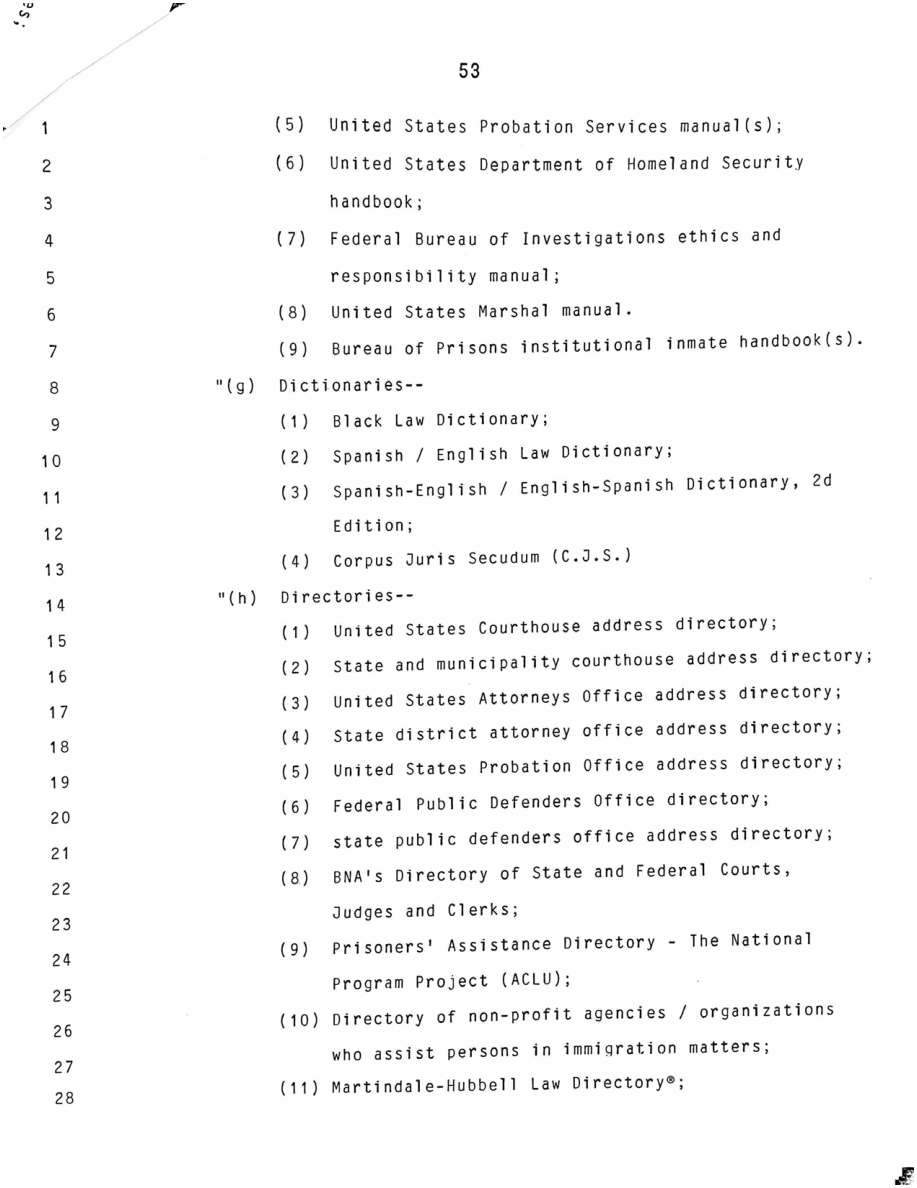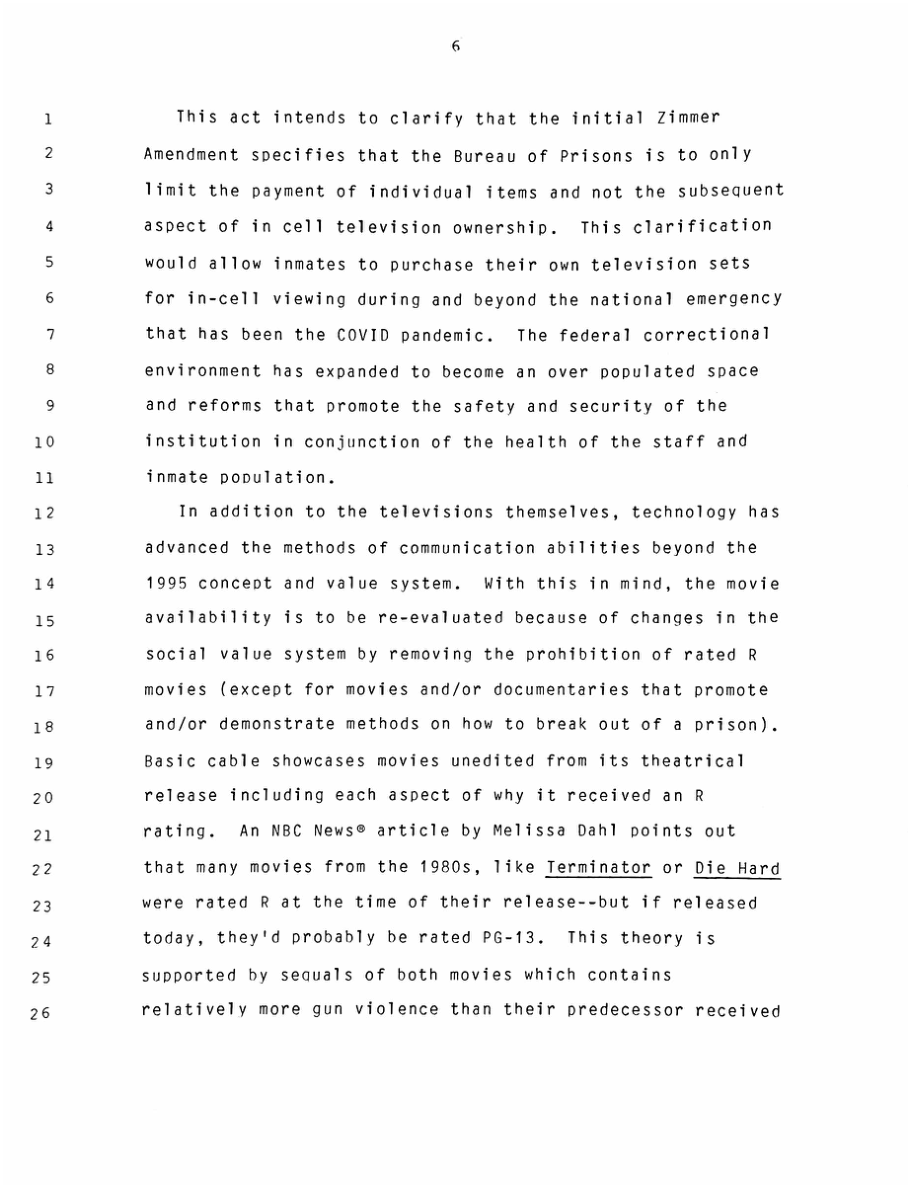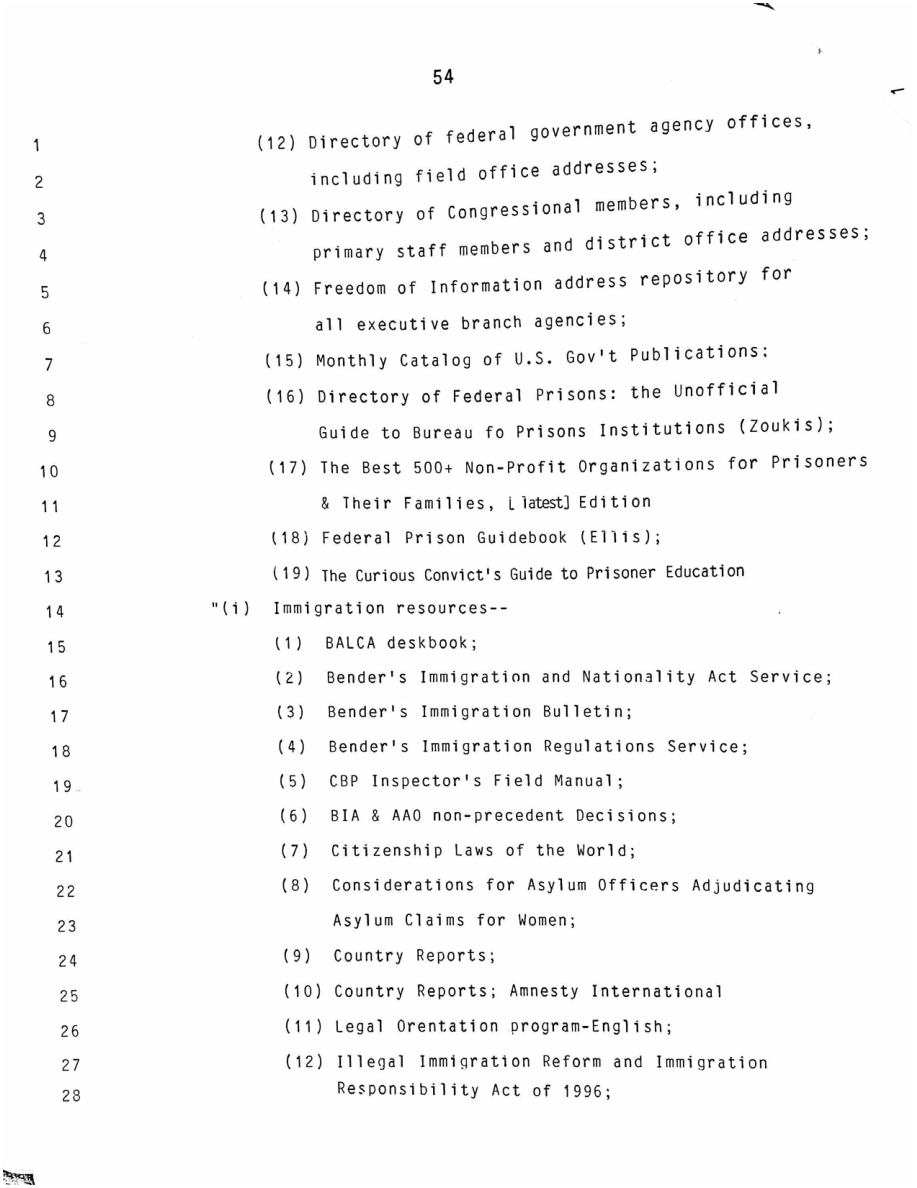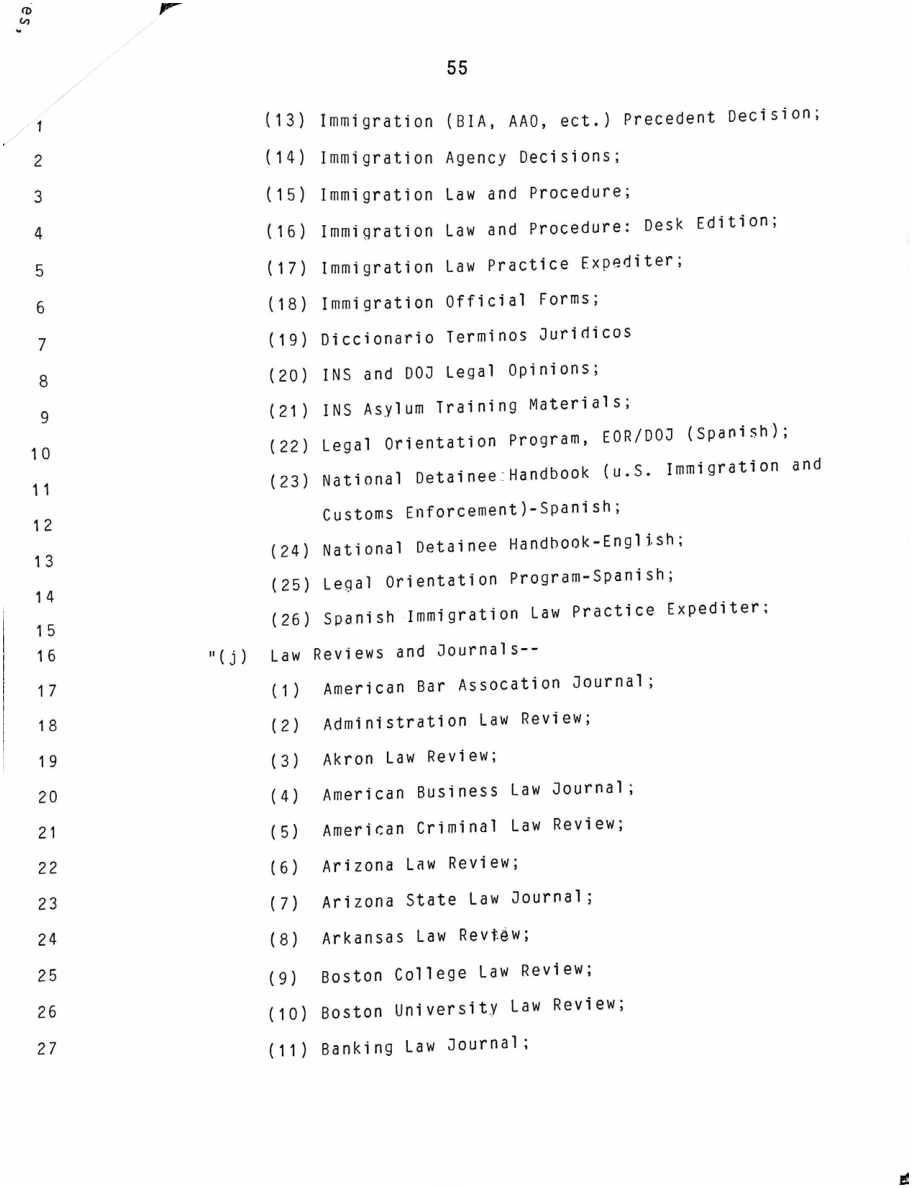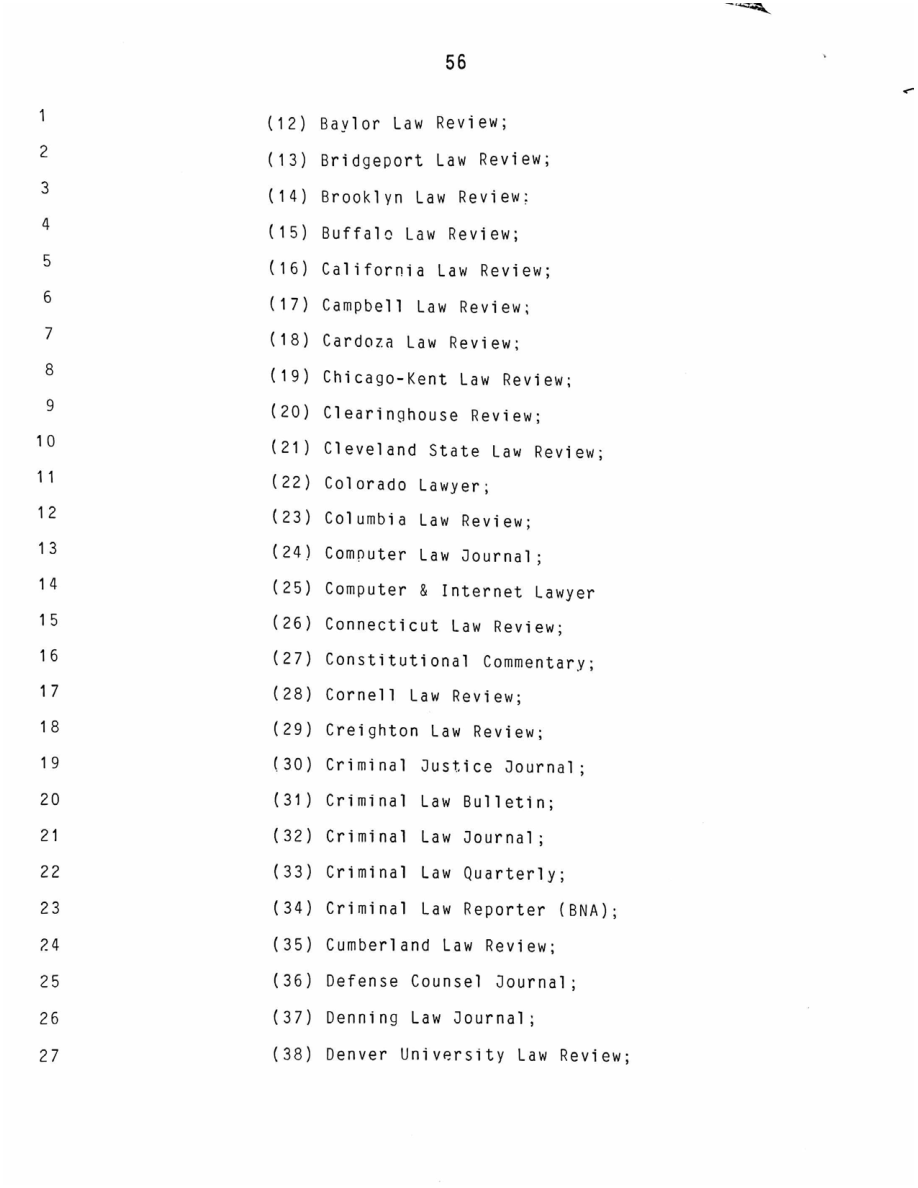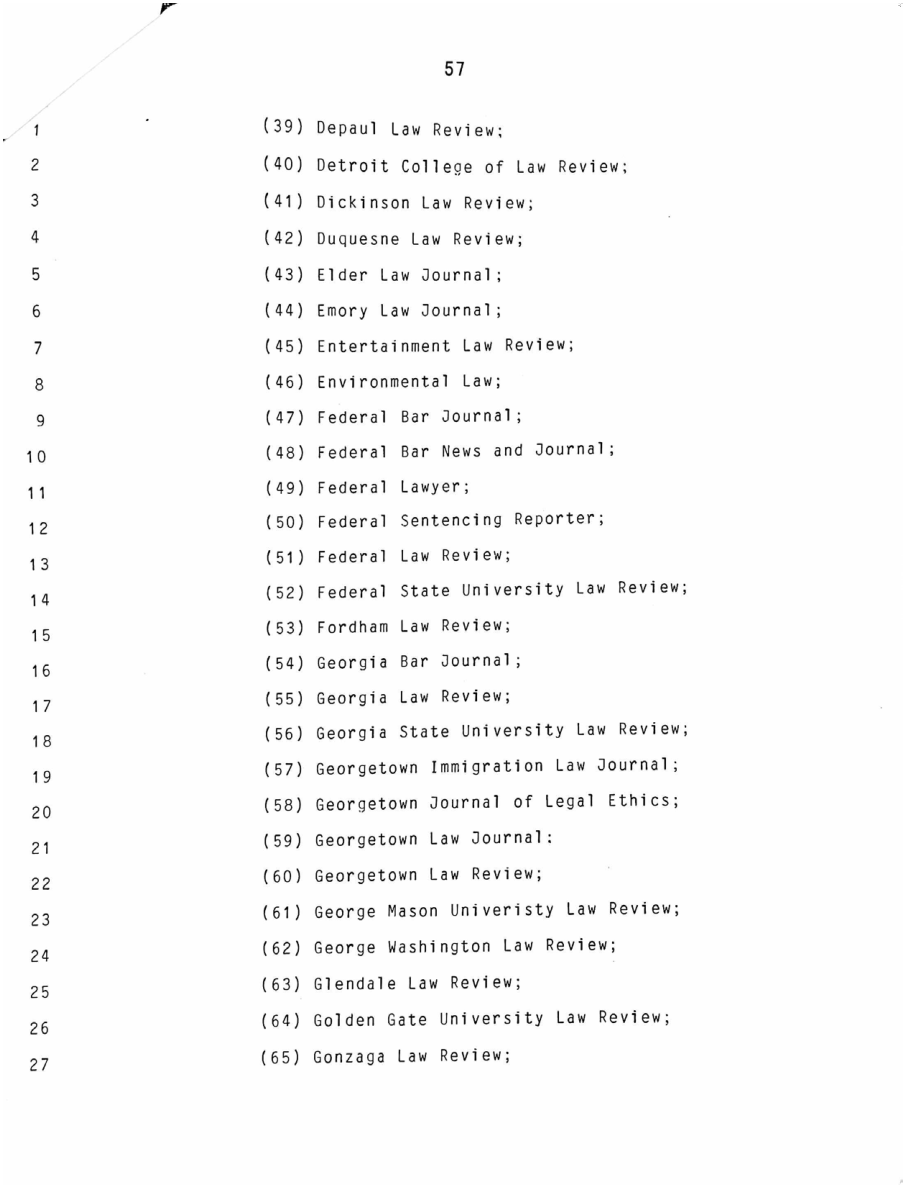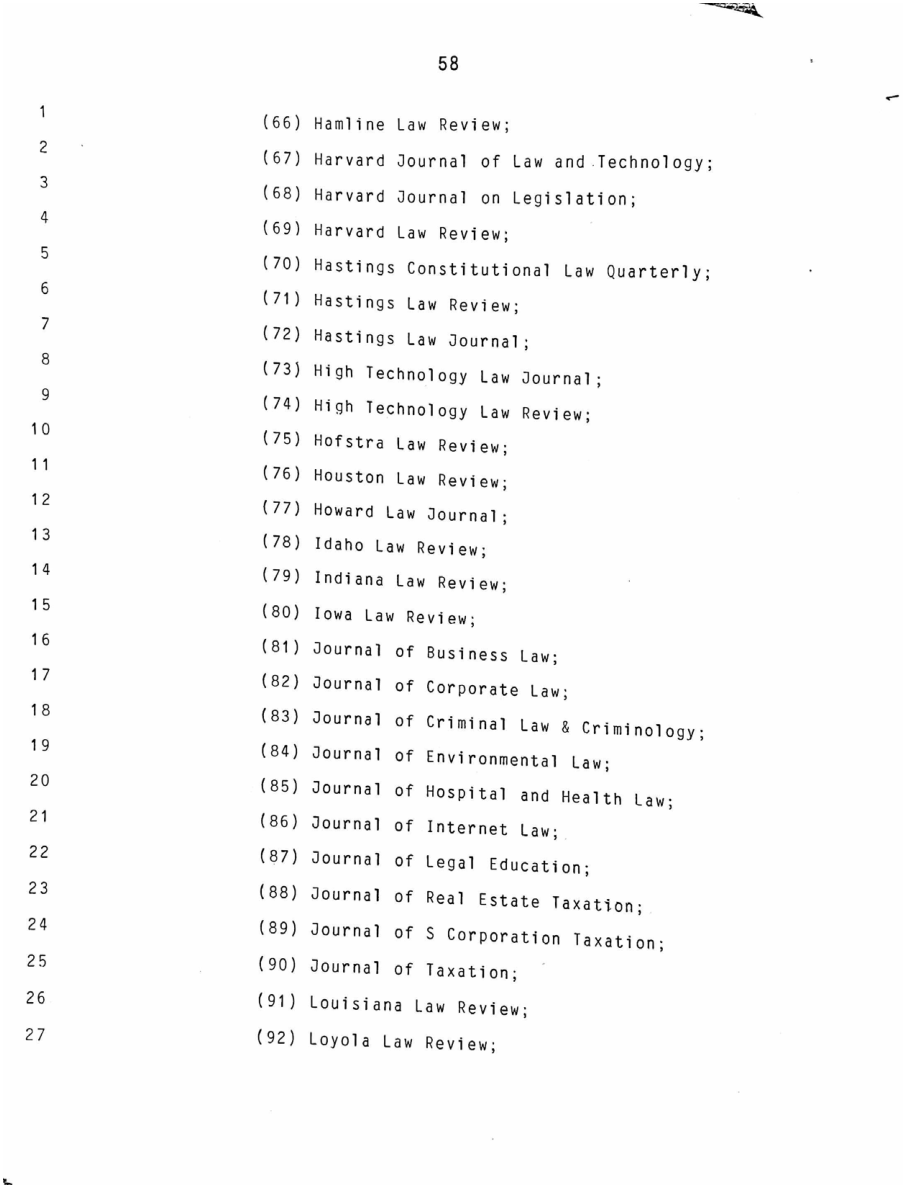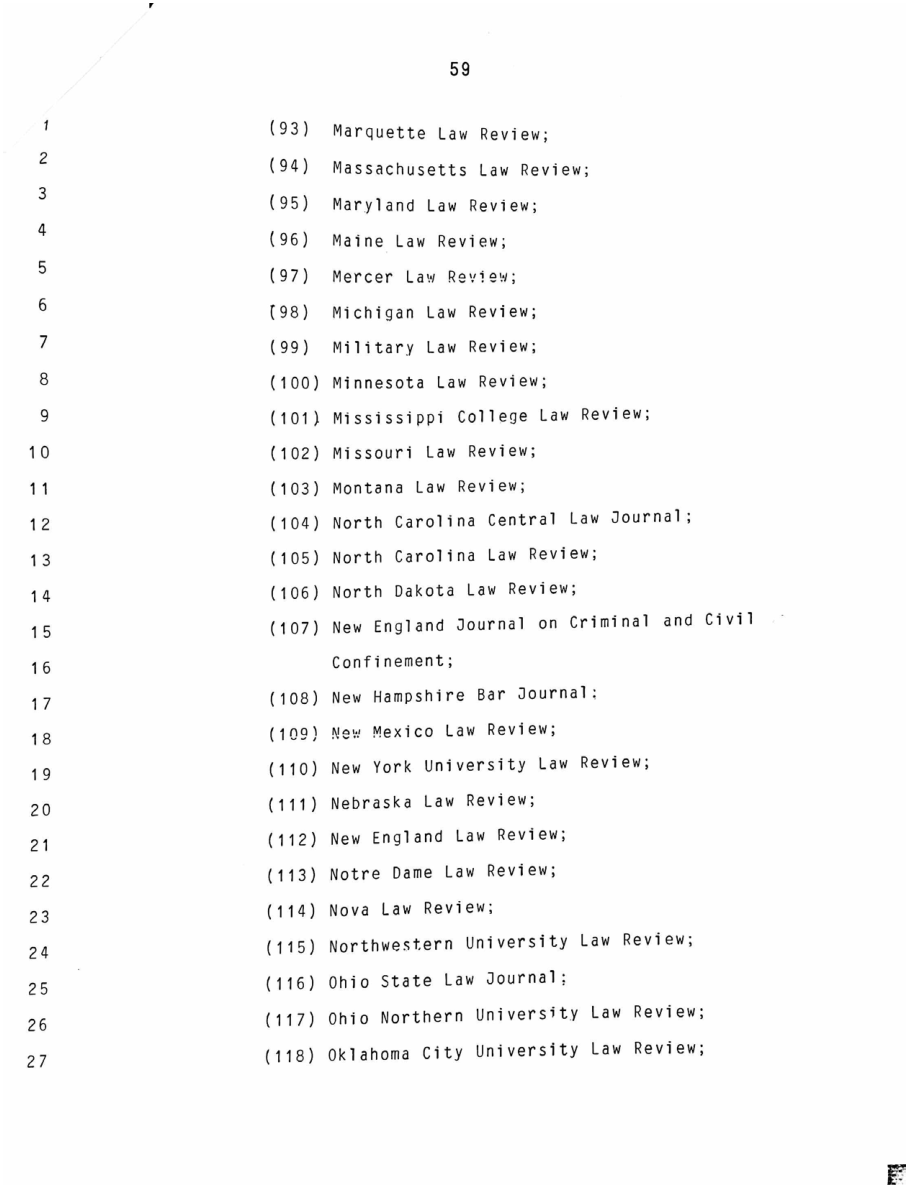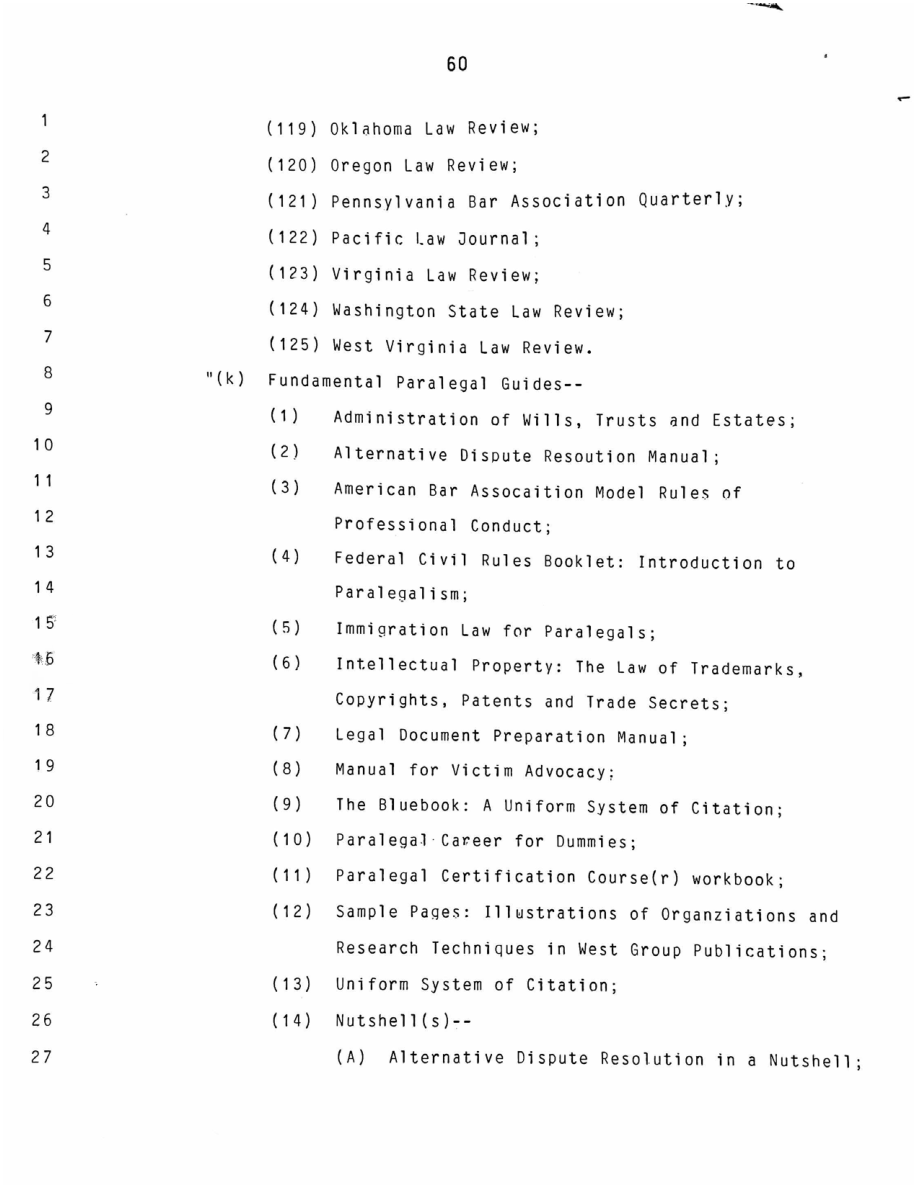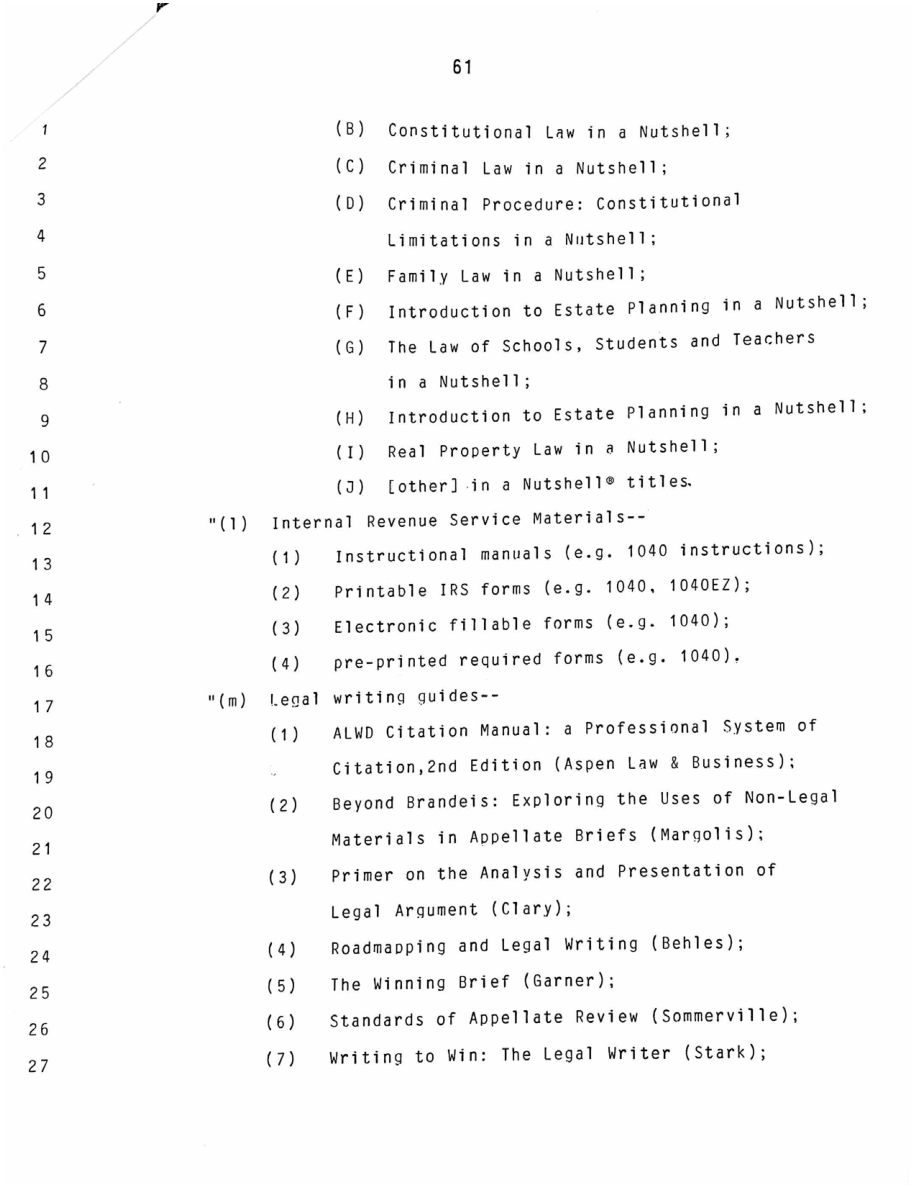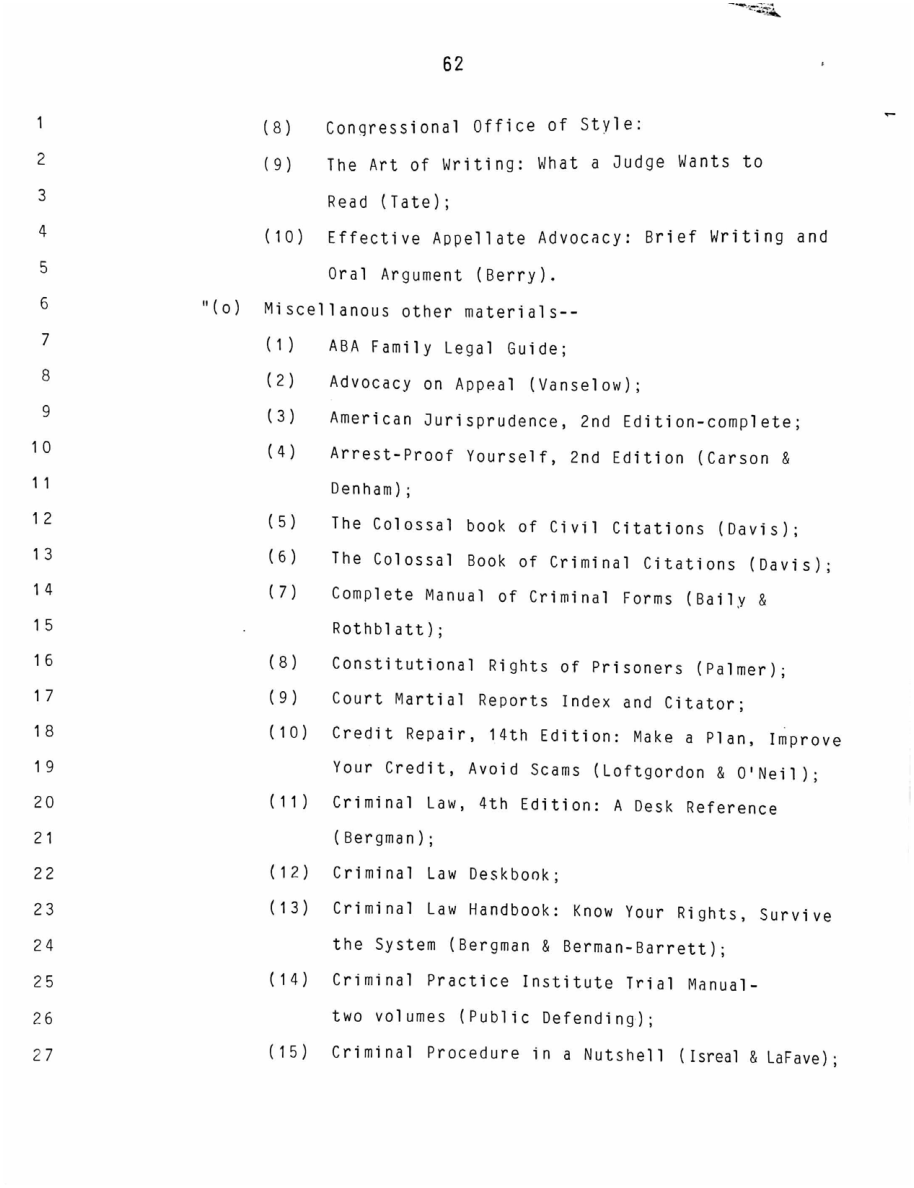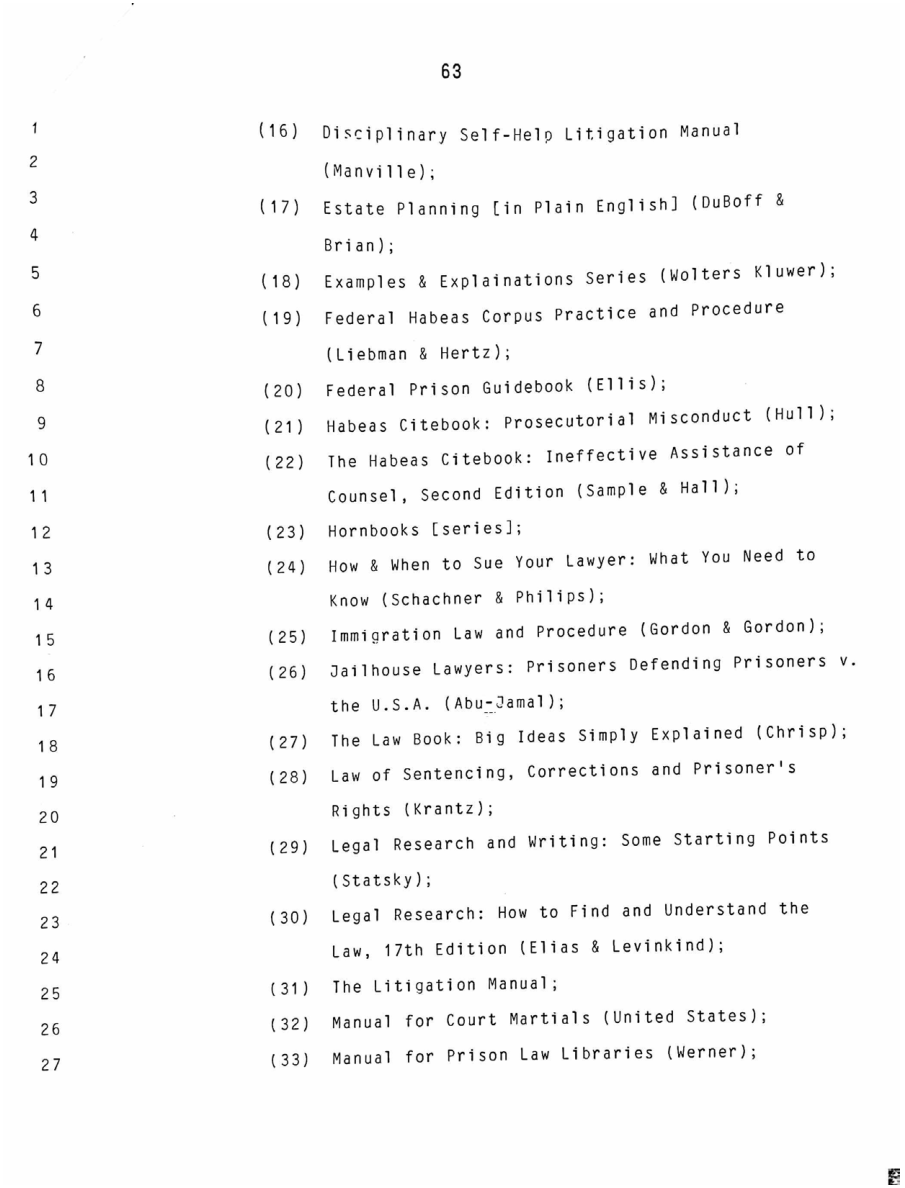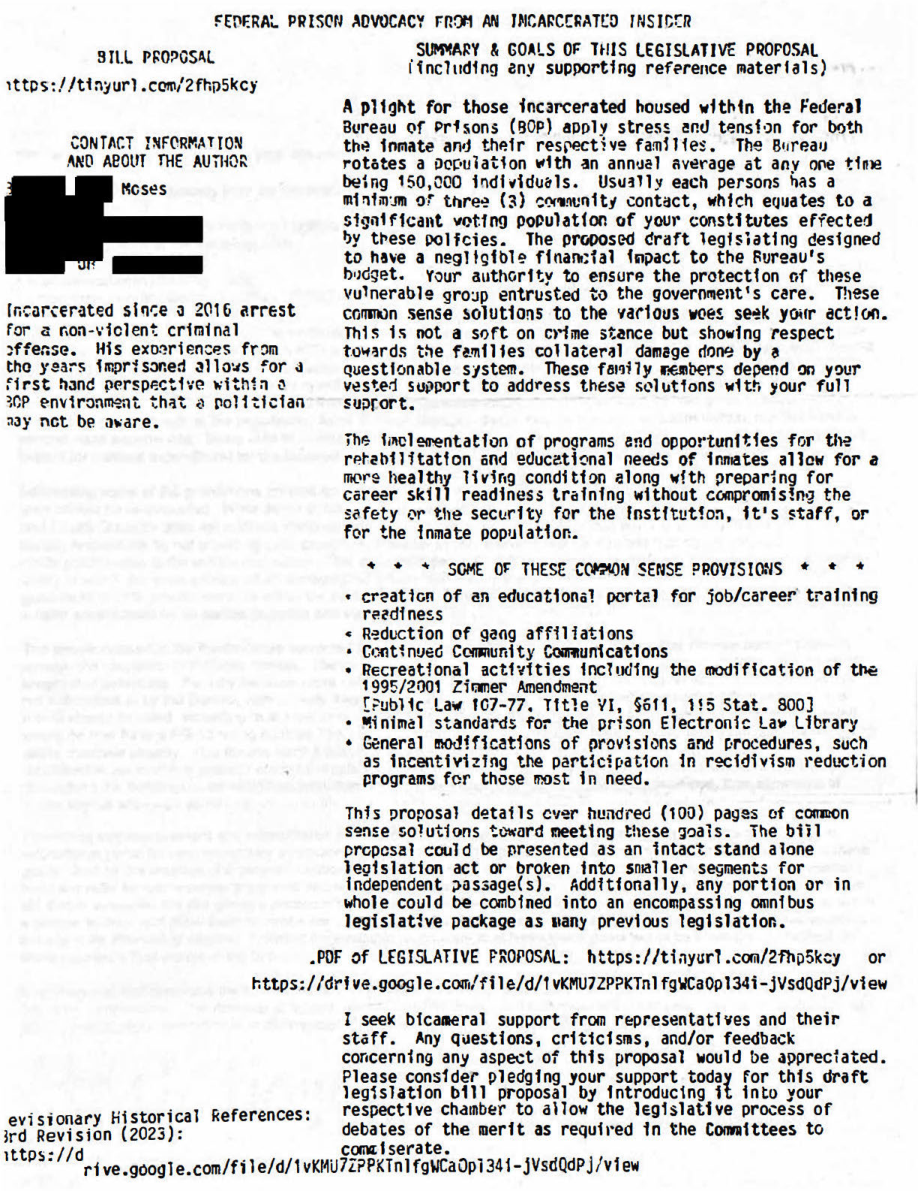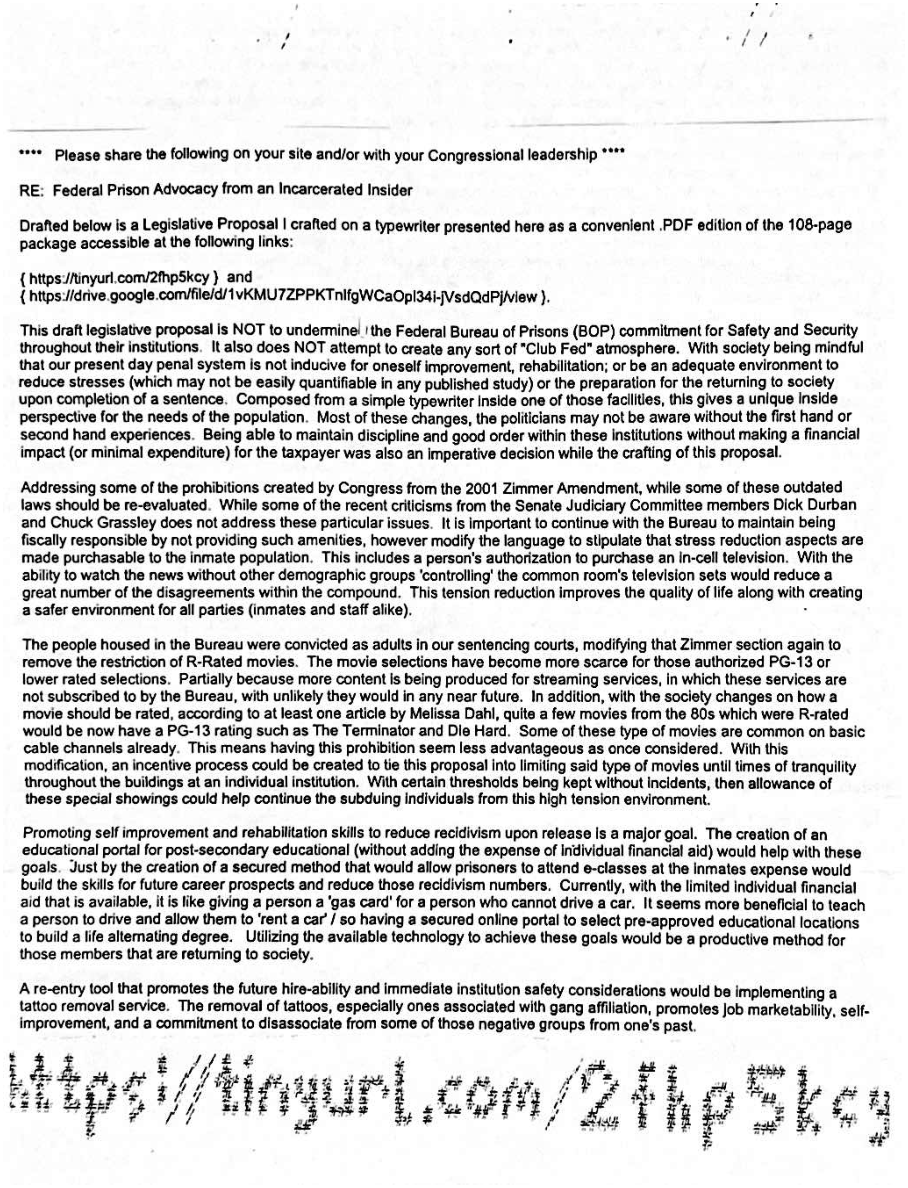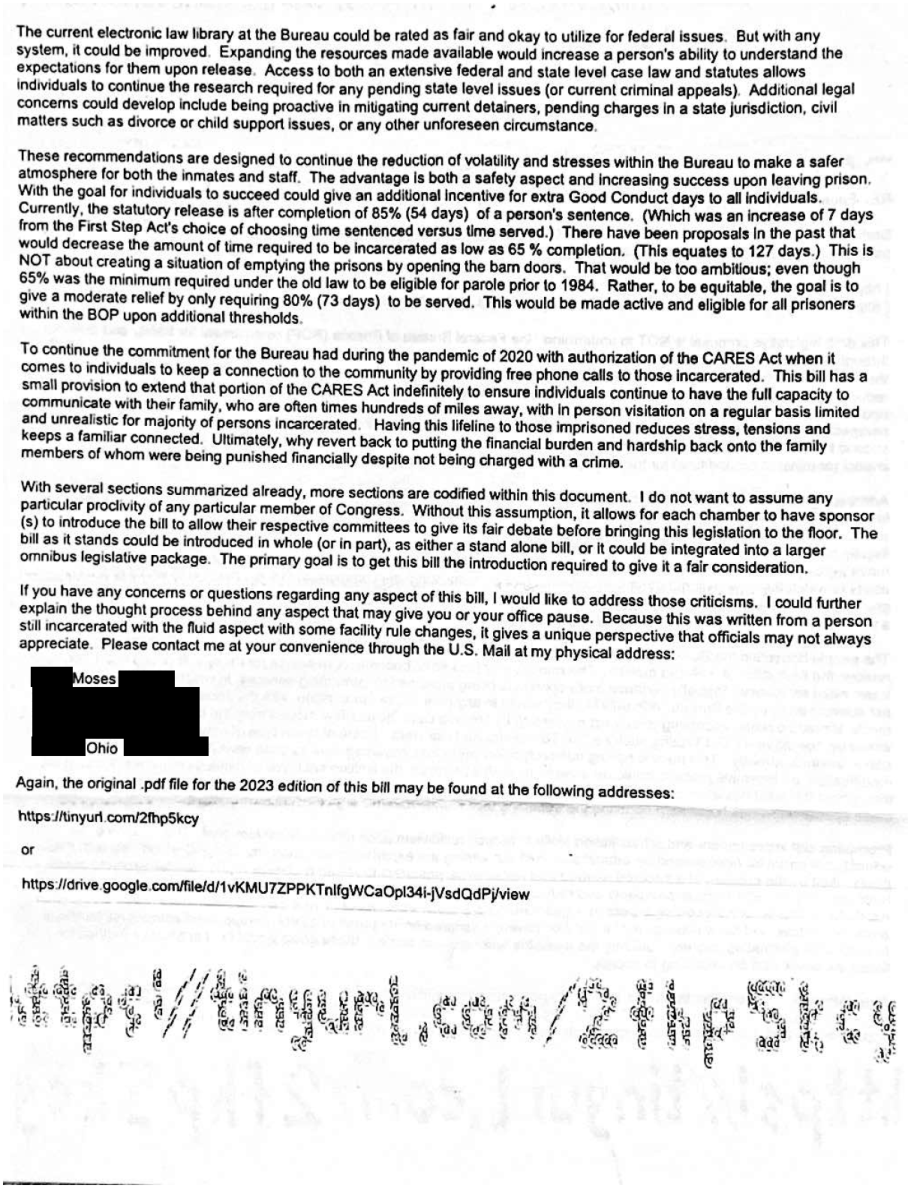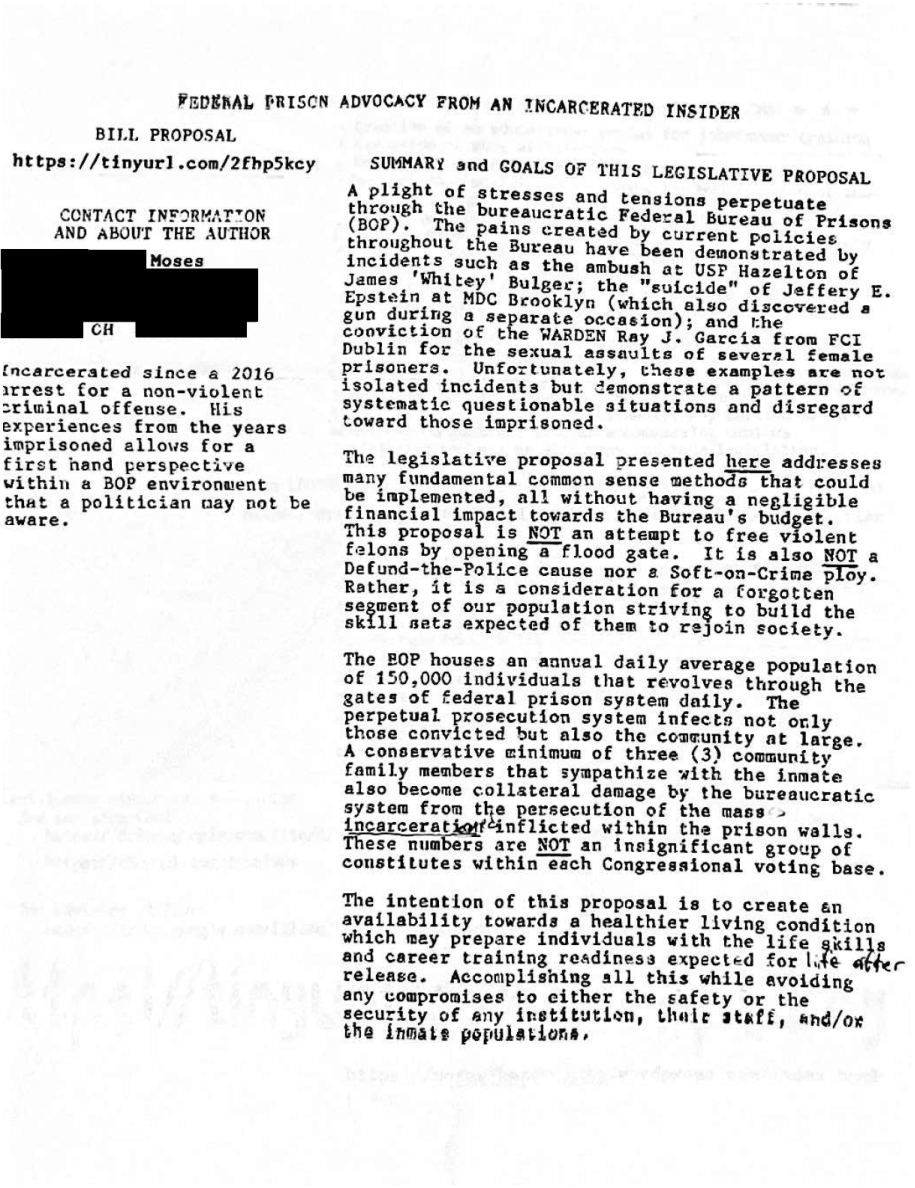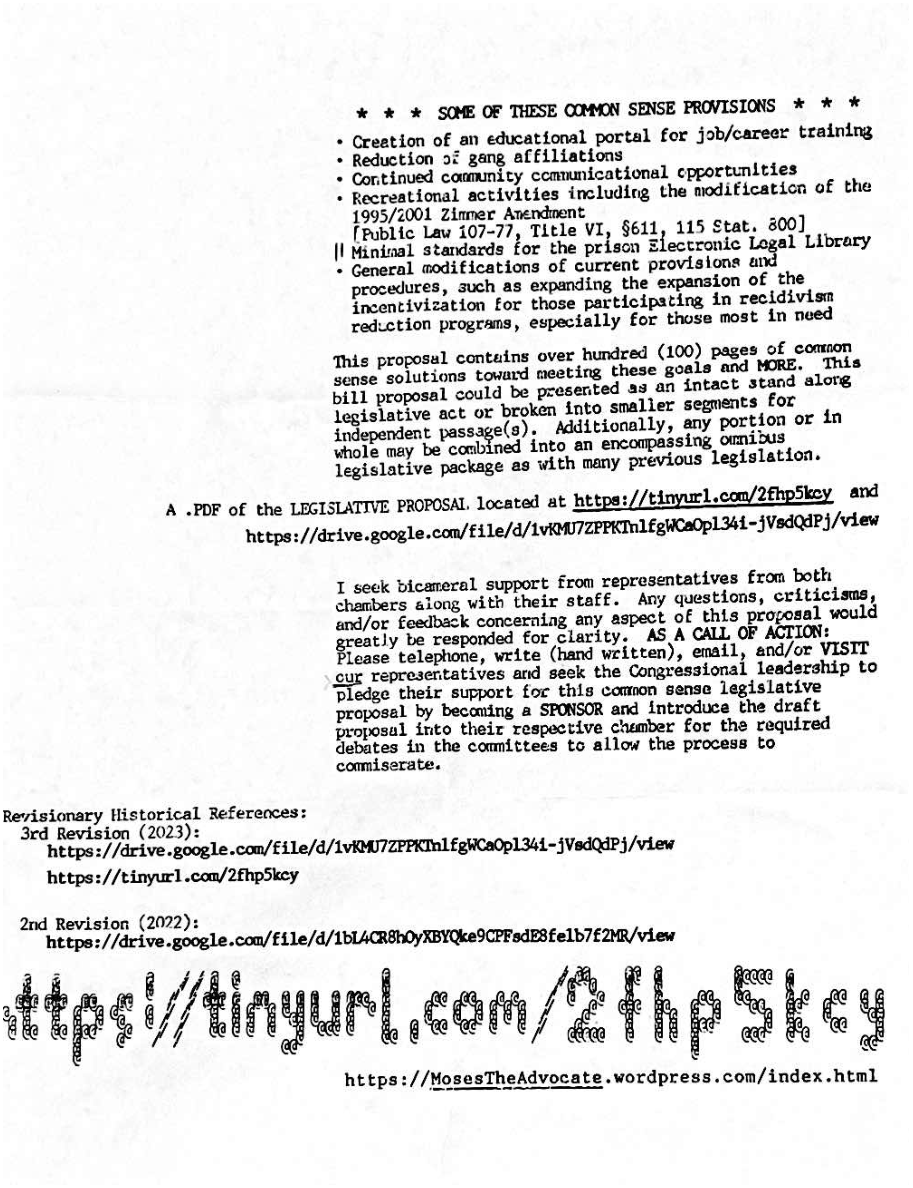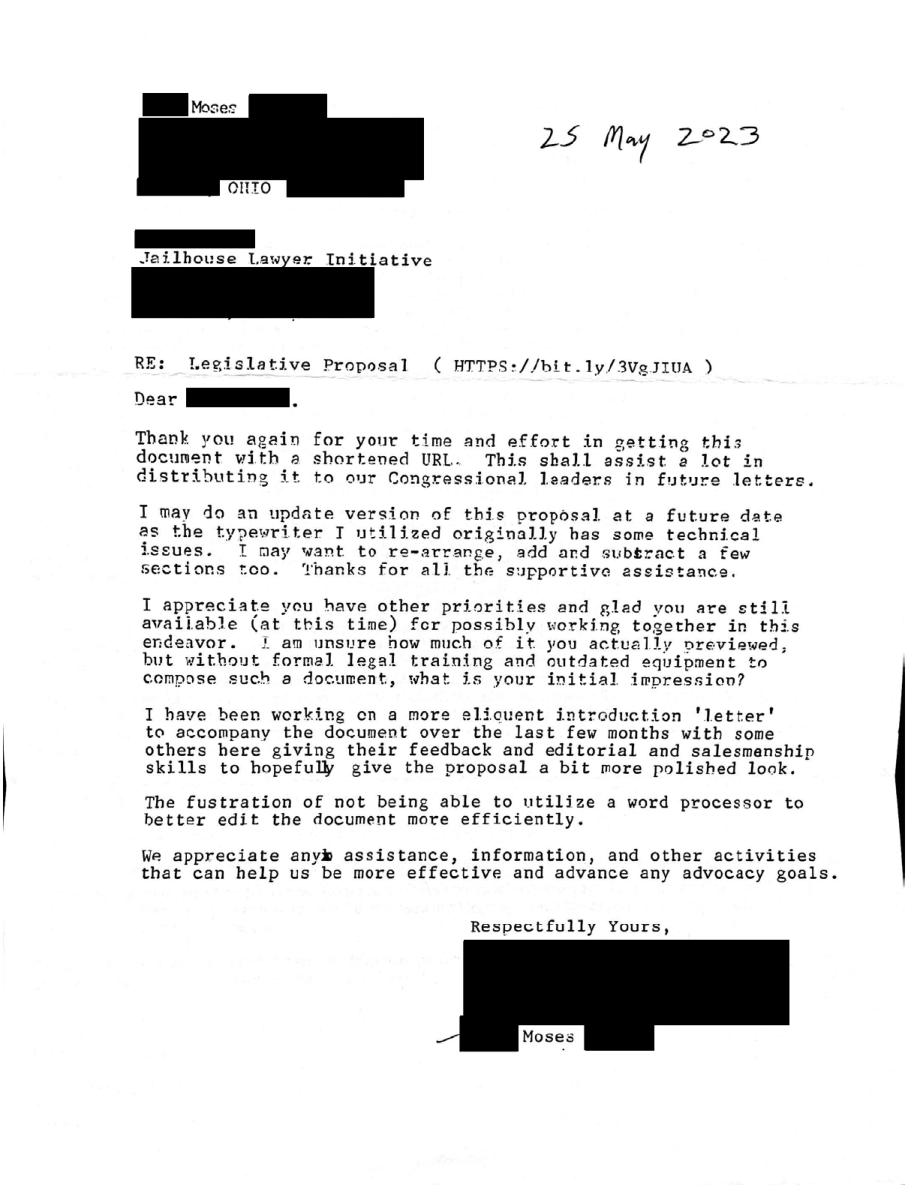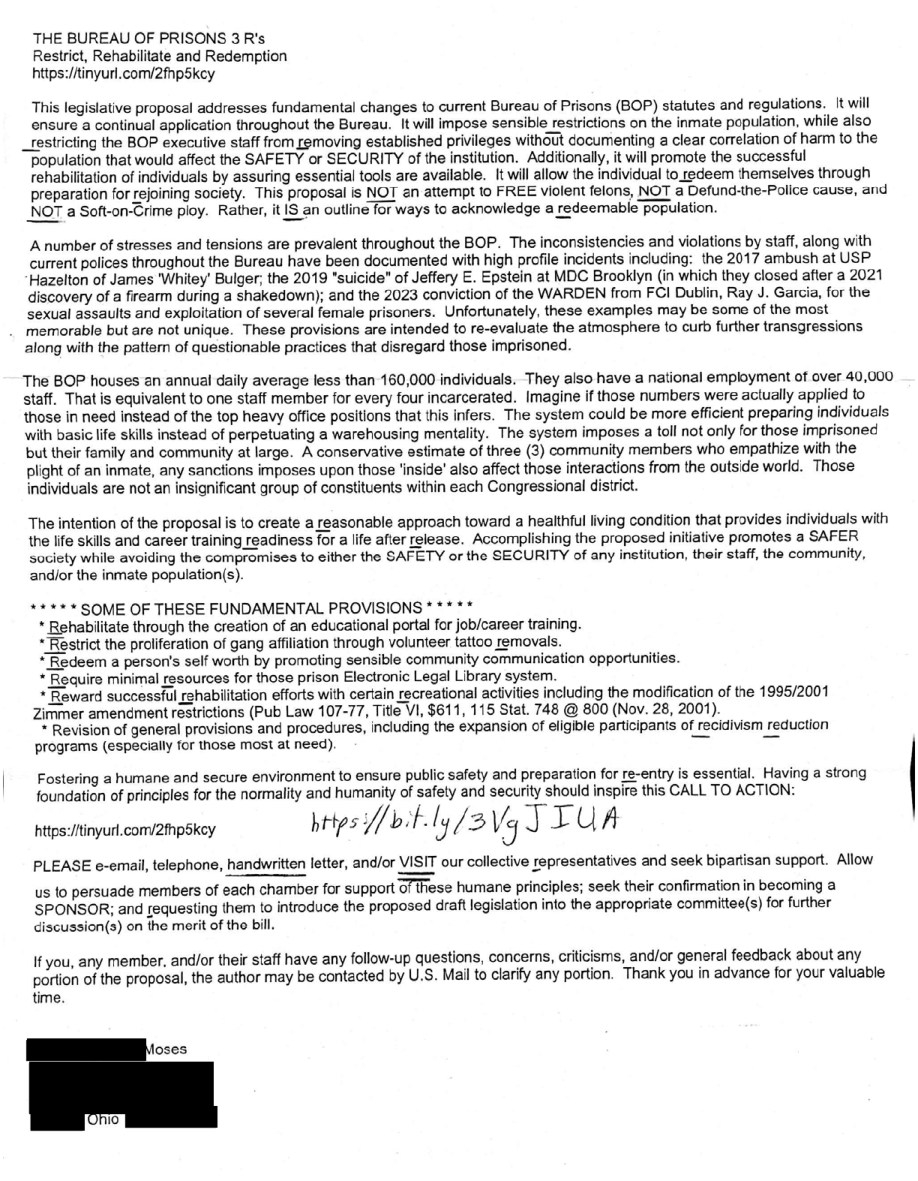J Moses
I wish the world could read this letter so that they could know this:J Moses
transcription
March 3, 2019
Dear Polk
I seen your article in the Guild and would like to send my
thoughts your dirrection. I am a jailhouse lawyer but I have
not advertise my wares around the unit beyond typing up the
briefs because I am concerned that my ability (and grammar) may
not help but rather fail for the individuals here.
I have submitted my own legal work to the Appelate court
of the Fourth Circuit without any luck and recently submitted my own
brief to the Supreme Court. I am awaiting a response (assunming that satistically that it shall be ignored).
You mentioned in the article about being able to receive training
and/or certification. I am interested in how to receive
inexpecive training to help myself and others here in
and better my own knowledge of the law.
I did not know there was a way to be 'licensed' as a jailhouse
lawyer. I would like to find otu more information on that
aspect too. If you might be able to send any new information
on organizations that could assist in that would be very much
appreciated.
Thank you so much
Respectfully
J Moses
PS. Recommend Any additional resources. The majority of convicted at this
location are either drug offenses or child pornography charges
J Moses
transcription
26 Dec 2021
Moses
RE: Advocacy
Attn Mr. Walton
Thank you for including my name in the Jailhouse Lawyer Initative. I look forward to future editions.
My question concerns advice for advocacy including lobbying
Congress in accepting a legislative initiative that I wrote. I
am trying to submit a draft of a bill I wrote about the
restrictions Congress imposed on the Bureau of Prisons ( BOP)
back in 1995 - 2001 denying public funds for certain frills
(Zimmer Amendment). With COVID being prevalent, I am only
seeking my own funds to be able to purchase items like in-cell
television sets similar on how State Dept of Corrections have
allowed for decades.
Would you recommend on how one mav solicit a Representative or
Senator to sponsor such a proposal to allow the start of the
legislative process of committees and other beauratic hurdles.
Thank you in advance for any assistance and/or recommendations.
If you may refer me to any organizations that may be willing to
assist in such a project, I would greatly appreciate as my typed
proposal has reached approximately 70 pages with the cover
page with the page formatting to be similar to how a
Congressional office would organize a bill.
Respectfully Yours
Moses
J Moses
transcription
J Moses
RE: Paralegal and Advocacy / Referral Request Recommendations for digitalization services to scan documents into Pdf format
AttN:
Thank you for your dedication with the Jailhouse Lawyer Initiative Newsletter along with all your other studies and future diligent work.
As your mini-bio stipulates, I am trying to become an Advocate
and seek any advice. I DO NOT want any Litigation assistance.
I would ask for recommendations on how a person without
access to a computer, the Internet or Friends/Family to create
a digital edition of a physical typed proposal.
I crafted a draft of a federal mandate and made
several copies to my congressional leadership and staff.
After 30 copies without even acknowledgement by 90% of them and the one only responded with a canned response that did not address any provision that was recommended.
Since then, I re-typed my proposal to refine and added a few protections against the Federal Bureau of Prisons restrictions against inmates like myself. My goals is to provide humane daily life without diminishing any SAFETY of SECURITY concerns of the BOP.
If you may give any referrals/ recommendations of any organization who might be able to scan these 108 pages into an Optical Character Recognition (OCR) scanner to create a text- searchable Pdf file and Hosted on a reputable Host so I can reference a reliable URL when writing these congressional members again. Making random copies at $12 for the packe and $3 for postage is un sustainable while on a prison salary. I prefer any organization willing to donate their time at Pro Bono and/or any discounts to get this project done.
Thank you again for any information available.
Respectfully Yours
J Moses
J Moses
transcription
1 September 2022 OH Robert and Helen Bernstein Institute for Human Rights NYU school of Law Jailhouse Lawyer's Initiative
RE: https://drive.google.com/file/a/1bL 4CR8hOuXBYQ Ite 9CP FsdE8felb7f2MR/view?usp= sharing.
Attn I received your most favorable response dated August 18" 2022 concerning the enclosed federal legislative proposal I drafted concerning Rehabilitation, Recreation and Recitivism from the federal Bureau of Prisons.
Since my initial inquiry, an EX of an EX may have assisted with my initial digitalization but unsure how refined the file looks. At that point, I still was not as impressed with the title I named it but I feel the enclosed reflects better to be flashy and descript enough to 2 draw interest but not too generous to prisoners that would draw a negative impression. It still feels like a challenge in drawing support but being able to wrap it within an accessible weblink to a direct Pdf file as you inferred along with any other future proposals and words of encouragement.
My hope that at least one Congressional member to sponsor what is written either in whole or in part to give that first step for committee review and possible chamber's floor for a vote. Maybe this bill could be incorporated within so many omnibus "spending" bills that could give it a better opportunity for consideration. I also tried to keep this proposal fairly neutral both financially and politically by having minimal cost requirements and asking for aspects supporting humanity without over indulging with pipe dreams Le.g. Extra Good time from that 85% to only 80% and not that mythical unicorn of 65%]
I thank you in advance for whatever you may do to Re-scan this document, making any simple corrections [e.g spelling] and placement on that free Word Press site, along with any other words of encouragement you feel appropriate. I supplied my last copy, single sided, of my latest edition along with a copy of a first edition I called the Amenities Act plus in a booklet format. If appropriate, if you want 3 to illustrate the evolution of this process.
This entire process has been an eye opening experience that taught me more about the ugly truth that is never explained in any K-12 classroom or and news media report with any true perspective how the system creates an illusion of safety nets the evaporates in a puff of smoke during a foggy morning when the parachute is needed the most.
Respectfully Yours
J. Moses
1 Sept 2022
P.S. As you may note, the enclosed edition has a different name than the Google drive. I updated the first two pages to specify next years Congress session and the name of the bill.
And the proposal has been split between both envelopes to reduce postage costs. I tried to seperate them for ease to re-intergrate for scanning purposes 118th Congress 1st Session
"The Restoration of the Federal Bureau of Prisons Rehabilitation, Recidivism Reduction, Recreation and Restitution Act of 2023" or referred as "The BOP 6 Rs Act"1
118th CONGRESS 1St SESSION
For the establishment of minimal standards within the Federal Bureau of Prisons consistent for the well being of inmates ensuring a safe, secure and equitable environment to reduce recidivism, rehabilitation and restoring recreation opportunities.
AN ACT
For the establishment of minimal standards within the Federal Bureau of Prisons consistent for the well being of inmates ensuring a safe, secure and equitable environment to reduce recidivism, rehabilitation and restoring recreation opportunities.
Be it enacted by the Senate and House of Representatives of the United States of America in Congress assembled. SECTION 1. SHORT TITLE: TABLE OF CONTENTS.
(a) SHORT TITLE. -- This Act may be cited as the "The Restoration of the Federal Bureau of Prisons Rehabilitation, Recidivism 6 Reduction, Recreation and Restitution Act of 2023" or 7 referred as "The BOP 6 Rs Act". TABLE OF CONTENTS .-- The table of contents for this act is as follows: 2
Section 1. Short title; table of contents.
TITLE I -- CONGRESSIONAL INTENTIONS Sec 101. Congressional intent.
TITLE II -- MODIFICATION AND CODIFICATION OF the 'ZIMMER AMENDMENT' CONCERNING FEDERAL PRISON FRILLS Sec 201. Modification of the 2001 Zimmer Amendment TITLE III -- COMMUNICATIONS Sec 301. CARES Act modification for teleconferencing. Sec 302. Electronic Public Messaging surcharges. Sec 303. Expansion of the electronic public messaging service. Sec 304. U.S. Mail® for incarcerated individuals. Sec 305. Family communication encouragement.
TITLE IV -- GANG AFFILIATION DISCOURAGEMENT PILOT Sec 401. Pilot program to encourage gang disaffiliations.
TITLE V -- MEDICAL AND HEALTH CONSIDERATIONS Sec 501. Particulate respirator availability. Sec 502. Laundry hygiene. Sec 503. Air quality standards Sec 504. Fresh drinking water fountains. Sec 505. Mattress replacement standards. Sec 506. Occupiancy limitations. Sec 507. Eyewear and accessory availability. Sec 508. Hair grooming. Sec 509. American with Disability Act enforcement. Sec 510. Hospitalization restraints. Sec 511. Hospitalization communication rights of prisoners. 3
TITLE VI -- ENTERTAINMENT Sec 601. Hand held audio and video devices. Sec 602. Audio and video services. Sec 603. Public donations of entertainment. TITLE VII -- BUREAU OF PRISONS REGULATIONS Sec 701. First Step Act obtaining identification 7 clarification. Sec 702. Rehibilitation and treatment timelines. Sec 703. Public Safety Factor guidelines. Sec 704. Monthly inmate gratuity salary. Sec 706. Prison national food menu. Sec 707. Weather station informational displays. TITLE VIII -- ONLINE POST SECONDARY EDUCATIONAL PORTAL Sec 801. Post-secondary educational portal. TITLE IX -- I-CARE PACKAGE SERVICE Sec 901. Family i-care web service for prisoners. TITLE X -- COMMISSARY PRODUCT CONSISTENCY THROUGHOUT THE BUREAU Sec 1001. Commissary standarized availability for each designated security level regardless of facility. TITLE XI -- PRISON LAW LIBRARY AND EDUCATIONAL SERVICES AVAILABILITY Sec 1101. Electronic administrative remedy procedures. Sec 1102. Prison electronic law library. Sec 1103. Prisoner research resources. Sec 1104. Court standards for booklet binding equipment. Sec 1105. Microfiche research availability. TITLE XII -- PROCEDURAL COMPOENENTS EFFECTING PRISONERS
Sec 1201. Good Conduct Time calculations. Sec 1202. Pre-trial time credits. Sec 1203. Hybrid representation. Sec 1204. Statute of limitations for non-capital offenses. Sec 1205. Freedom of Information Act waiver agreements. Sec 1206 Compassionate release waiver agreements. Sec 1207. Post incarceration supervision. Sec 1208. Prisoner voting rights.
TITLE I -- CONGRESSIONAL INTENTIONS
Sec 101. CONGRESSIONAL INTENT. The following legislation promotes the safety and security of the Federal Bureau of Prisons confinement while addressing the general well being of individuals housed within by first re- 15 evaluating the No Frills Prison Act proposed by New Jersey Representative Dick Zimmer within the Contract with America in 1995. Mr. Zimmer's press releases Legislation to End Prison Perks Wins Endorsements, (January 31, 1995) and Close the Door on Federal 'Glamour Slammers' (February 9, 1995), also contained within the 147 Congressional Record H-7751 and H-7768 (circa July 1995). A portion of this bill proposal was included in the Omnibus Budget Act of Fiscal Year 1997 commonly known and henceforth referred as the 'Zimmer Amendment', Public Law 104- 134, Title 1, $101(a) [Title VI, $611], 110 Stat. 132-64 (renumbered May 2, 1996, Public Law 104-140, $1(a), 110 Stat. 1327); September 30, 1996, Public Law 104-208, Div A, Title I, §101 (a) [Title VI, 5
§611], 110 Stat. 3009-66; November 26, 1997, Public Law 105-227, Div A, §101(b) [Title VI, §611], 112 Stat. 2681-113; 3 November 29, 1999, Public Law 106.113, Div B, $1000(a) (1) [Title VI, §612], 113 Stat. 1501A-54; December 21, 2000, Public Law 106-553, §1(a) (2), 114 Stat. 2672 (enacting into law §611 of title VI of H.R. 5548 (114 Stat. 2672A-105), as introduced on October 25, 2000): and in its perminate form, Public Law 107-77, Title VI, §611, 115 Stat. 800.
The legislation history within the annual budget for the 'Amenities and Personal Comforts' were enacted within the notes of title 18, United States Code, section 4042 concerning the government not to provide funding for these 'frills' including purchasing in-cell televisions, weight lifting equipment, electrified musical instruments, and martial arts training aids. It also prohibits a large swatch of academy award winning movies because of its prohibitions on certain rated movies.
The language of the legislation has been challenged in the court(s) including case Kimberlin vs. United States DOJ, 318 F.3d 228 (D.C. Cir., Feb. 11, 2003). The court agreed with the government that the provisions from the Zimmer Amendment dictates that the Bureau of Prisons is prohibited funding of the electricity along with the television set itself despite Congress rejecting this initial inclusion of within the original failed bill H.R.663, No Frills Prison Act in addition to the physical television set itself. 6
This act intends to clarify that the initial Zimmer Amendment specifies that the Bureau of Prisons is to only limit the payment of individual items and not the subsequent
aspect of in cell television ownership. This clarification would allow inmates to purchase their own television sets for in-cell viewing during and beyond the national emergency that has been the COVID pandemic. The federal correctional environment has expanded to become an over populated space and reforms that promote the safety and security of the institution in conjunction of the health of the staff and inmate population.
In addition to the televisions themselves, technology has advanced the methods of communication abilities beyond the 1995 concept and value system. With this in mind, the movie availability is to be re-evaluated because of changes in the social value system by removing the prohibition of rated R movies (except for movies and/or documentaries that promote and/or demonstrate methods on how to break out of a prison). Basic cable showcases movies unedited from its theatrical release including each aspect of why it received an R rating. An NBC News" article by Melissa Dahl points out that many movies from the 1980s, like Terminator or Die Hard were rated R at the time of their release -- but if released today, they'd probably be rated PG-13. This theory is supported by sequals of both movies which contains relatively more gun violence than their predecessor received
7 a PG-13 rating. The population incarcerated by the Bureau of Prisons are convicted as adults and the selection of movies should reflect as such (while still maintaining the restrictions on pornographic in nature depictions).
Technological advancement considerations that align with several state Department of Correctional systems have implemented the availability of secured hand held digital tablets for their inmate populations. This implementation demonstrate the viability of allowing prisoners access to such devices. Implimentation of a deadline for the Bureau of Prisons to start offering for sale and supporting infrastructure for the physical usage of such tablets. The proposal within Title II of this act would codify and modify the Zimmer Amendment to reflect these mandates upon the Bureau of Prisons.
Continuing with continuing communication connection concerns with family and friends by expanding the CARES Act phone calls that were free to inmates during the times of the national emergency because of COVID to continue indefinately after the national emergency expires. In Title
III. additional communication pprovisions which include the Trust Fund public messaging (e-mail) system operatational procedures and to mandate availability access with physical mail sent through the United States Postal Service®, especially pictures from home. The encouragement of maintaining contact with family by providing complimentary material (envelopes, writing pads, and pencil/pen) to the population on a complimentary schedule. Also, expand the availability of phone services to extend to individual time zones to ensure family may be reached after their prior
and/or after their employment obligations.
With the safety and security being the top priority for this legislation, Title IV is designed to reduce the gang affiliations within the Bureau of Prisons by offering and encouraging elective tattoo removal services. These services in the long term will help maintain a safer environment for the people and assist in preparing for re- entry needs beyond incarceration.
Health concerns for those incarcerated without compromising the good order of each institution with Title
V. These provisions particularly address the standards that lacked during the COVID pandemic and benefit the health and well being of the population in the event of any future outbreaks. Additional entertainment considerations are included in Title VI designed to pacify the population to ensure cooperation and safety between the staff and inmate populations.
Title VII addresses re-entry concerns including clarification for the First Step Act when obtaining photo identification. Help to reduce the waste and pallet fatigue because of the manotaney of eaching the same meal too 9
frequently, a greater rotation of food items. The menu should be palletable to a larger array of the population by ensuring the civilian Bureau of Prisons incarcerated population should eat comparable to those housed in the military prison system. These menu items (without considering it a 5-star gourmet delicacy) but be appropriate for general consumption for the regional utilization and with staff participation of consumption of the meal at no charge to demonstrate that food quality does not fall below acceptable standards. [If employees are unwilling to each the same food items provided to the inmates, it demonstrates a quality issue].
Drawing success from state facility programs across the nations correctional systems by preparing inmates for the needs of todays [and tomorrows] employers. The re-entry preparation needed is even greater now. Within Title VII, the Bureau of Prisons with a partnership with the Department of Education shall provide a dedicated secured online portal for inmates to access approved post.secondary educational facilities. The largest hurdle for inmates [besides financial] is access to these educational resources online. The creation of a dedicated secured portal will provide an avenue not before had for certification and/or degree program(s). An secured online access by means of a dedicated secured computer terminal and/or the secured tablets as mentioned earlier. 10
Along with state facility examples designed to keep family connections, Title IX creates another online electronic commerce website for family member(s). The commercial site is designed to allow visitation approved individuals the ability to purchase gifts [care packages] for their 'loved' ones incarcerated based on a frequency considerations because of an inmate's security level. This type of program demonstrated in several states and local ran facilities show the viability of such a program with a minimal impact for prison staff and shows compassion for the imprisoned population.
Title x creates a consistent access to art and other supplies based upon an individual's security level designation for personal purchases from a Trust Fund® commissary and or Special Purchase Order (SPO) from approved vendors. Items include recreational activies, health & fitness, and other. Title XI expands access to law library resources. Federal prisoners may need access to state and civil resources for situations beyond the federal criminal prosecution. The Bureau of Prisons shall provide at least these bare minimums but not limited to these items with either a physical 'book' or electronic resources that is accessible on the established electronic law library with 2 full search functionality through all databases and via the hand held secured tablet [as indicated earlier]. Requiring 11
the electronic resources to be updated at a minimum on a weekly basis to ensure more current access availability of state and federal case law. Expansion of the digital library to include additional resources that may be 'checked out' onto the personal secured tablets. The provision to obtain access to word processors and/or personal typewriters to ensure legible legal items (i.e. letters and briefs) are professionally presentable and accepted by the courts and 9 other venues.
Finally, Title XII addresses several procedural issues within the criminal justice system. This include an increase to the allowable Good Conduct Time credit calculations from approximately 85 percent (up to 54 days ) to approximately 80 percent (up to 73 days) for the total amount of time required to be served. Adjusting an individual's confinement accredited during pre-trial restrictions caused by Global Positioning System (GPS) monitoring at home to be counted towards the current sentence by the Bureau of Prisons. Allowing a defendant pro se arguments to the court in conjunction with assigned counsel by a revision of the 'hybrid representation! statute. Restrictions placed upon a person created by a plea agreement waiver from obtaining exculpatory evidence shall furthermore be unenforceable despite of a Freedom of Information Act waiver included in such criminal plea agreement. Such restrictions violate a person's Due Process
12
rights and violate Brady v. Maryland, 373 U.S. 83, 83 S. Ct. 2 1194 (May 13, 1963).
This same Title section also addresses some post incarceration supervision aspects along with providing a guarantee the right to vote for all citizens despite current and/or previous felony conviction. Technological advancements demands society to move in a quicker pace. This ability to process evidence quicker than ever before demonstrates law enforcement has the tools required to accurately process eviced quickly. Because of this, re.evaluation of the 1948 change within the non-capital Statute of Limitations that extended three years to five years before a suspect must be charged with the crime. This change shall be reverted back to its pre-1948 time frame of three years as delay in prosecution is at no fault of the citizen and if an indictment is not brought in this reasonable amount of time only helps the government in their case.
While all of these additional provisions in addition to
re-evaluating the original Zimmer Amendment are addressed in this legislation. The text should be taken as liberally as possible in favor of the individual. The rights of all people, including those who have a felony conviction, while maintaining the safety and security throughout the Bureau of Prisons infrustructure is the top priority.
TITLE II -- MODIFICATION AND CODIFICATION OF THE 13
'ZIMMER AMENDMENT' CONCERNING FEDERAL PRISONER FRILLS Sec 201. MODIFICATION OF THE 2001 ZIMMER AMENDMENT. IN GENERAL .-- The note titled "Amenities or Personal Conforts" located in section 4042 of title 18, United States 5 Code, is hereby codified, modified, and redesignated by amending section 3632(d)
(3)
of title 18, United States Code, by redesignating subsections (C) and (D) as subsections ( ) 8 and ( ) respectfully, and inserting the following replacement text of the 'Zimmer Amendment' after subsection
(B)
that reads: "(C) ENTERTAINMENT AND ACTIVIES --"(i) None of the funds made available in this act shall be used to provide the following amenities or personal comforts in the Federal Prison System --
"(aa) In-cell television sets except for prisoners segregated from the general population (e.g. administrative special housing or medical units) or for inventory purposes for resale within the prison commissary to promote public safety through social distancing protocols:
"(bb) The viewing of X-rated or pornographic in nature depliction in entertainment through whatever medium 14
presented, with movies that are unrated, rated-R, or produced prior to the 1968 Motion Picture Association of America (MPAA) rating System to be under the discretion of appropriateness (e.g. no how-to break breakouts) by the Director of the Bureau of Prisons on an individual basis;
"(cc) Any instructional (live or through broadcasts) and/or training equipment for boxing, wrestling, judo, karate, or other martial arts;
"(dd) Providing secured hand held secured tablets to inmates other than for purposes of inventory for resale in the commissary for personal usage, persons segregated quarantine from the general population, or within the education department for further instruction;
"(ee) Personal possession of in-cell coffee pots, hot plates, or heating elements, except for the allowance for an entire housing unit access to a microwave oven that is to be shared
15
by all.".
TITLE III -- COMMUNICATIONS
Sec 301. CARES ACT MODIFICATION FOR TELECONFERENCING.
(a)
IN GENERAL .-- The Coronavirus Aide, Relief, and Economic Security (CARES) Act that reduced the cost of video and telephonic conferencing during the national emergency starting in the 2020
pandemic is to be extended indefinitely regardless of a national emergency or not.
(b)
Section 12003(c) (1) of the Coronavirus Aide, Relief and Economic Security (CARES) Act, Public Law 116-136, 134 Stat. 516, concerning video teleconferencing is hereby redesignated from the notes of section 3621 of title 18, United States Code, by amending the end of section 3632(d)(1)(B) of title 18, United States Code, with a new subsection
(C)
that reads : "(C) VIDEO VISITATION. -- The Director of the Bureau of Prisons shall promulgate rules regarding the ability of inmates to conduct video visitation through video teleconferencing and telephonically, free of charge to inmates.".
(c)
The Bureau of Prisons shall ensure that ordinarily the telephone system is available to inmates throughout the day starting at 06:00 EST until 23:30 PST to ensure family members may be contacted from the continental time zones to negate family obligations (i.e. family work hours), except during times of daily standing 16
count [16:00-16:30 daily, 21:30-22:00 daily, 10:00- 10:30 weekends and holidays] to encourage continuing family communication practices.
Sec 302. ELECTRONIC PUBLIC MESSAGING SURCHARGE.
(a)
IN GENERAL. -- The cost to communicate by inmates to family or friends is to be reduced by amending section 2632(d) (1) of title 18, United States Code, by adding new subsection (D) that reads : "(D) ELECTRONIC PUBLIC MESSAGING. -- The Director of the Bureau of Prisons shall promulgate rules regarding eligible inmates to participate with electronic messaging (e-mail) with -- family, friends, clergy, and legal representation -- free of charge to inmates.".
(b)
Public access through third party interface(s) [www.corrlinks.com] tier payment system shall provide a payment option for the inmate's ability to purchase any advanced [premium/premier] features for validated family and friend accounts.
(c)
The Bureau of Prisons shall ensure that ordinarily that eligible inmates have access to the public messaging (e-mail) system daily from the hours of 06:00 EST until 23:30 PST, except during the 30-minute window of standing count each day [16:00-16:30 daily, 21:30- 22:00 daily, and 10:00.
10:30 weekends and holidays].
Sec 303. EXPANSION OF THE ELECTRONIC PUBLIC MESSAGING SERVICE. 17
IN GENERAL. -- Access to the electronic messaging system shall not be denied to any prisoner despite their offense when recipient is a confirmed member of the American Bar Association® and/or a confirmed attorney's law office associate; along with other messaging service limitations amended within section 3621(d) (3) (B) of title 18, United 7 States Code, by adding at the end of subsection (B) with the 8 following:
"(1) Maintain a minimum number of email address place holders that correspond with each unique address identifier:
" (ii) Maintain a minimum of 500 unique address name identifiers, with the option to increase the total amount to 2,000 identifiers on a case- by-case descrisionary basis:
"( iii) The Attorney General is to ensure the Bureau of Prisons provides access to every eligible prisoner in each facility and auxiliary location with functional and accessible video visitation capabilities within 18 months of enactment of this act;
" ( iv) Increase the categorical sorting options for contacts by including catagories -- educational, government, non-profit, books to prisoners, newsletter, ect:
" (v) Retention of all e-mails and electronic 18
messaging to staff for the 24 months beyond the completion of a person's entire term of confinement;
"(vi) The Director of the Bureau of Prisons is to establish a vetting procedure to verify authorized attorney accounts to ensure all prisoners regardless of conviction(s) has the ability to communicate with legal representation without monitoring --
"(aa) The attorney is to utilize a corporate e-mail address and/or corporate domain name for verification (e.g. the Federal Public Defenders Offices utilizes the domain name of @fd.org);
"(bb ) The Bureau of Prisons is to establish an opt-in service to third party informational bulletins relaying legal/case law information, re-entry assistance, or advocacy organizations that have been authenticated [with the following examples] provided electronically on the inmate Bulletin Notifications:
"(AA) Family Against Mandatory Minimums [[email protected]];
"(BB) Legal Information Service
19
Association [[email protected]];
"(CC) Leading Edge Research Team [[email protected]];
"(DD) Jeremy Gordon Law Office [[email protected]];
"(EE) Law Offices of Brandon Sample [[email protected]];
"(FF) Fair Shake (re-entry resources) [[email protected]];
"(GG) National Association for Rational Sex Offender Laws [newsletter1940- [email protected]]:
"(HH ) Federal Legal Center Inc. [[email protected]];
"( 11) Prison News Service [[email protected]]; "(JJ) The Informational Corrlinks Newsletter (Once Fallen) [[email protected]]; "(KK) The Community (Wisc) [[email protected]]; "(LL) Universal Post Conviction Services
20
"(MM) [[email protected]]: Sentencing Law and Policy Blog (Sv Ohio State University Law Professor Doug Berman) [ 1:
"(NM) Registrant Right to Travel [[email protected]];
"(00) Women Against Registry [[email protected]]; " (PP ) Samaritan Projects LLC [[email protected]]: "(00) Caution Click Campaign
[[email protected]]: " ( RR) Prison Professors [ [email protected]]; "(SS) Legal Action Center [[email protected]];
· (TT) Sex Law and Policy Center
[[email protected]]; "(UU) Prisoner Resource Service [[email protected]]; "(VV) Justice for Policy Institute [info?justicepolicy.org]; "(ww) Dishonorable Courts
[[email protected]];
"( xx) Landstar 21 [[email protected]]; "(YY) Craig Coscaf Elli
[[email protected]]; and "(ZZ) Supreme Court of the United States (SCOTUS) Blog J.".
"(vii) The Federal Bureau of Prisons is required to retain all telephonic metadata activity available to the inmate disregardless of the billable time to the 'nmate and metadata associated with duration and attempts of communication;
"(viii) The Federal Bureau of Prisons facilities are to utilize their daily 'call out' activity schedule electronically on the TRULINC Bulletin system in addition to a physical printout posted for the prisoners.".
Sec 304. U.S. MAIL® FOR INCARCERATED INDIVIDUALS.
(a)
IN GENERAL .-- The Bureau of Prisons is ordinarily required to deliver the physical original U.S. Mail. articles sent to prisoners housed in Medium Security institutions or below except for when the prisoner has a documented history of --
(1)
transportation, distribution, or abuse of drugs: or
(2)
introduction or the attempt of introduction of 22
contraband into a correctional institution.
(b)
The Attorney General will establish policies for inmates to challenge inaccuracies or to grant an exemption from prior documented infractions associated with the loss of physical mail privileges.
(c)
The Bureau of Prisons staff may not deface or reject outgoing postage upon its own descretion, as the responsibility of discretion if postage is valid, 'gently worn', or improper is left for determination by the United States Postal Service;
(d)
For the purpose of U.S. Mail@ retailer services for those confined in a correctional environment, periodicals regardless of the quantity of advertisements contained within, qualifies for the U.S. 15 Postal Service Media Mail@ rate;
(e)
The Attorney General shall establish a method for all Federal Bureau of Prisons facilities and remote auxiliaries to process outbound package service fees at prisoners expense to be debited directly from the inmate's TRUFACTS Account balance [to reduce the usage of 'yard stamps' ] for parcel or media mail services;
(e)
The Attorney General shall amend title 28, Code of Federal Regulations, section 540.22 by --
(1)
in subsection (a), by replacing "or insured mail," with "insured mail, media mail, and/or Priority Mail@,"; 25 26 23
(2)
in subsection (b) by replacing "insure" with "insure and track":
(3)
in subsection (d), by replacing "Expressed mail," with "Expressed Mail (except Priority Mail@";
(4)
by adding a new subsection (e) that reads: "(e) An inmate, at no cost to the government, --
"(1) have access to prepaid forever Priority Mail@ box packing materials to send home personal correspondence (e.g. a package containing the inmate's hobbycraft) by purchase from the facility's commissary and/or through their unit team;
"(2) may have access to all tracking barcode labels [e.g. USPS label 400] for application to any applicable mailers.".
Sec 305. FAMILY COMMUNICATION ENCOURAGEMENT.
IN GENERAL. -- For the promotion of family connections, communication supplies (paper and envelopes) are to made available to the prison popluation by .-
(a)
writing tablets of 50 sheets or more made available to all inmates at a minimum of once bi.monthly.
(b)
a minimum of two boxes of 500 pre-printed return 24 address envelopes be made available to each inmate living quaters. TITLE IV -- GANG AFFILIATION DISCOURAGEMENT PILOT
Sec 401. PILOT PROGRAM TO ENCOURAGE GANG DISAFFILIATIONS.
(a)
IN GENERAL .-- Chapter 305 of title 34, United States Code, is hereby amended by inserting after section 60506 the following: "§ 60507. Establishment of Discouragement of Gang Affiliations. "(a) IN GENERAL. -- The Attorney General shall carry out this section in consultation with --"(1) The Director of the Federal Bureau of Prisons: "(2) The Director of the Administrative Offices of the United States Courts ; "(3) The Director of the Office of Probation and Pretrial Services; and
"(4) The Director of the National Institute of Correction. "(b) The Attorney General shall establish a pilot program in a minimum of two (2) facilities in each of its six (6) regions (12 locations) for a minimum of 48 months;
"(c) Within 24 months of the conclusion of the initial pilot program, unless directed 25 otherwise by Congress, the Attorney General is to direct a permanent policy statement to offer
tattoo removal services from all locations within 72 months of enactment of this act: "(d) GANG DISAFFILIATION AND REMOVAL OF SYMBOLISMS OF HATE. -- The Attorney General shall create a policy for the Federal Bureau of Prisons to assist volunteer prisoners for elective tattoo removal services by means of laser cosmetic surgery on the premises of the prison that would
document and remove symbolisms of gang affiliation and/or symbols associated with hate speech / hate groups, on the pretext of preparation of inmates for re-entry into the community; " ( e) REPORTING REQUIREMENTS. -- not later than 18 months after initiating the pilot program.
the Attorney General shall report annually to the Congressional Joint Committees for the Judiciary with the following conclusions:
"(1) financial operation costs:
"(2) number of volunteer inmates from each facility seeking laser tattoo removal treatment;
26
"(3) demographics of inmate participants: "(4) number of inmate participants rejected for treatment: "(5) statistics for length of time request for treatment until treatment was given: "(5) the type and number of hate speech symbols removed; "(6) the gang affiliation disassociated; "(8) statistical catagories of the offenses participants were convicted; and "(8) recidivism rates of participants. "(f) DEFINITION .-- in this section, the term "tattoo" refers to any body modification and/or marking associated with pigment and/or burning of the skin.".
TITLE V -- MEDICAL AND HEALTH CONSIDERATIONS Sec 501. PARTICULATE RESPIRATOR AVAILABILITY.
(a) IN GENERAL. -- To account for the physical and mental health for those incarcerated in the Federal Bureau of Prisons, economy disposable medical masks and/or NIOSH appoved SAS certified N95 / KN95 particulate respirators shall be made available for resale in the facility's commissary, with the provision of amending section 3632(d) (3) of title 18, United States Code, by adding after subsection (D) with the new subsection (D)
27
that reads :
"(D) In the time of a national emergency due to an airborne infectious disease, then the Federal Bureau of Prisons is authorized to resale in each commissary and/or Special Purchase Orders from authorized vendors NIOSH approved SAS certified plain white economy disposable N95 and/or KN95 particulate respirators along with medical grade disposable makes to ensure the medical and psychological health of the population.".
(b)
In section 541 of title 28 of the Code of Federal Regulations, is to be amended within --
(1)
subsection 207, by striking "or a mask";
(2)
subsection 227, by striking "refusing to participate in a physical test or examination unrelated to testing for drug use (e.g. HIV and Tuberculosis)"; and
(3)
subsection 336, by striking "circulating a petition".
Sec 502. LAUNDRY HYGIENE. IN GENERAL. -- The Federal Bureau of Prisons will ensure each facility and remote auxiliary location have in-unit laundry equipment in case of national emergency 'lock downs' to allow prisoners access to clean their own linens and uniforms with functional hot and cold water by amending
28
section 3632(d) (3) of title 18, United States Code, by adding new subsection (E) after subsection
(D) with the following:
"(E) The Federal Bureau of Prisons will ensure 5 accessible in-unit laundry washer and dryer with 6 functional hot and cold water hookups to facilitate self hygiene of one's own clothing; "(i) For when public in person visitation, inmates are to have access to an in-unit steam press to crease and press one's uniform for proper presentation.".
Sec 503. AIR QUALITY STANDARDS.
(a)
IN GENERAL. -- The Bureau of Prisons will install air purifying units in dormitories / housing units to reduce airbourne contaminates associated with particulate contagion within all facilities and auxiliaries within 24 months of enactment of this act.
(b)
AIR CONDITIONING. -- The Bureau of Prisons will ensure working heating and cooling systems are functional in all housing and working locations (e.g. kitchen, education, dormitories) that maintain a comfortable range of 18.3 degrees Celsius (65 degrees fahrenheit) to 23.8 degrees Celsius (75 degrees fahrenheit) that may be monitored and documented remotely.
(c)
dehumidifiers are to be installed, utilized and maintained in all dormitoriums and classroom locations 29
in the Bureau of Prisons facilities.
(d)
fans are to be installed in all dormitoriums to allow air circulation at all facilities.
(e)
facilities that cannot maintain working equipment uninterrupted for more than a 30-day stretch and/or has a failure that lasts longer than 72 hours, shall obtain quotes for pricing of installation of an energy efficient geothermal system replacement, if not already installed.
Sec 504. FRESH DRINKING WATER FOUNTAINS. IN GENERAL. -- The Director of the Federal Bureau of Prisons shall make available in every housing unit and recreation department with a functional water fountain that cools the water to not to exceed 12 degrees Celcius (56.3 degrees Fahrenheit).
Sec 505. MATTRESS REPLACEMENT STANDARDS.
(a)
IN GENERAL. -- The Director of the Federal Bureau of Prisons will create a policy statement to direct staff to remove and dispose of worn out mattresses after each person's stay of incarceration term expires or after a minimum of five to eight years of continuous utilization of said mattress.
(b)
Upon arrival to a Federal Bureau of Prisons facility, an inmate shall be issued a new mattress.
Sec 506. OCCUPANCY LIMITATIONS.
(a)
IN GENERAL. -- The Director of the Federal Bureau of 30
Prisons shall verify that housing dormitoriums that house more than fifty (50) individuals within a single open floor plan that has subdivision sections without a closable door [commonly known as cubes], are to be no more than nine feet by nine feet (approximate) with an occupancy limitation of two individuals in each cube.
(b)
Cells and/or cubes, that utilize a two or more tier bedding system (i.g. bunk beds), the Federal Bureau of Prisons shall provide a permanent desk with a fold away stool and/or a plastic portable
chair for the occupant(s).
Sec 507. EYEWEAR AND ACCESSORY AVAILABILITY. IN GENERAL. -- The Attorney General is to make a policy statement in accordance of new subsection (F) that is added under section 3632(d) (3) of title 18, United States Code, by adding after subsection (E) with the following:
"(F) The Attorney General is to create a policy statement concerning eyewear awareness by providing a guidance for inmate ability to purchase third-party eyewear and/or UNICOR upgrades to BOP supplied eyewear by utilizing established Special Purchasing Ordering (SPO) precedures that include but not limited to the following:
"(1) scratch resistant lens coating : 31
"(ii) transition lens coating: "( iii) break resistant frames: "(iv) micro fiber lens cleaning cloth ; "(v) secondary and/or replacement eyewear; "(vi) contact lenses; "(vii) contact lens cleanser solution; and "(viii) other.".
Sec 508. HAIR GROOMING.
(a)
IN GENERAL. -- The Federal Bureau of Prisons shall make available battery powered hygienic hair grooming and/or hair trimming devices for resale to inmates.
(b)
LASER HAIR REMOVAL. -- The Federal Bureau of Prisons shall make available elective laser hair removal services that may be performed on premises of all Bureau of Prisons locations.
(c)
REPORTING. -- Participants of laser hair removal services shall include for utilization purposes annually the participant --:
(1)
ethnicticity;
(2)
age; and
(3)
services rendered.
Sec 509. AMERICAN WITH DISABILITY ACT ENFORCEMENT.
(a)
IN GENERAL. -- The Federal Bureau of Prisons may not discriminate against a prisoner assignment of sleeping quarter location based upon the purposeful disconnection of electrical power (fuse/breaker) that 2 32
would otherwise be needed for medical appliance(s)
(e.g. CPAP machine) .
(b)
The Federal Bureau of Prisons shall install a lift system [elevator] at all multi-tiered housing units with mixed security designations that prevents a lower custodial security level designation person from being housed a higher security location based upon medical restrictions (e.g. unable to climb stairs).
(c)
The Federal Bureau of Prisons locations that continue to have a loose gravel type walking /
jogging tracks shall replace said track with one that conforms to a hardened, durable surface but with low physical impact properties that accomidates wheel chair accessibility within 36 months after enactment of this act.
(d)
The Federal Bureau of Prisons shall maintain all other concrete areas (e.g. walkways / outdoor recreation basketball courts) to minimize tripping hazards created by cracking and/or unevenness by preventing lips of concrete sections to exceed 1/2 inch of transition.
(e)
Each Federal Bureau of Prisons location shall ensure in their outdoor recreation area(s) that a section may contain an overhead partition that provides shade to prisoners while maintaining a continuous line of sight for visual and video surveillance of the facility to ensure physical safety at each compound.
117th CONGRESS 2nd SESSION
Allowing More Essential Novelties In The Inmate Expanded Services Act of 2022
or
AMENITIES Act of 2022 1
11.7th CONGRESS 2nd SESSION To provide guidance to the Federal Bureau of Prisons concerning the minimal amenities available to the inmates.
A BILL
For the establishment of minimal amenities and general personal comforts provided by the Federal Bureau of Prisons by amending the 2001 Zimmer Amendment set forth within the notes of section 4042 of title 18, United States Code; and requiring additional provisions for those confined to ensure a safe and secure confinement.
Be it enacted by the Senate and House of Representatives of the United States of America in Congress assembled. SECTION 1. SHORT TITLE; TABLE OF CONTENTS.
(a)
SHORT TITLE. -- This bill may be cited as the "Allowing 5 More Essential Novelties In The Expanded Services Act of 2022" or the "AMENITIES Act of 2022".
(b)
TABLE OF CONTENTS. -- The table of contents for this act is as follows:
Section 1. Short title; table of contents. 2
TITLE I -- CONGRESSIONAL FINDINGS Sec 101. Cngressional intent. TITLE II -- MODIFICATION AND CODIFICATION OF THE 'ZIMMER AMENDMENT' CONCERNING FEDERAL PRISONER FRILLS
Sec 201. Modification of the 2001 Zimmer Amendment TITLE III -- COMMUNICATIONS 7 Sec 301. CARES Act modification for teleconferencing. 8 Sec 302. Electronic Public Messaging surcharge. 9 Sec 303. Expansion of the electronic public messaging service.
Sec 304. U.S. Mail® for incarcerated individuals. 12 TITLE IV -- GANG AFFILIATION DISCOURAGEMENT PILOT Sec 401. Pilot program to encourage gang disaffiliations.
TITLE V -- MEDICAL AND HEALTH CONSIDERATIONS
Sec 501. Particulate respirator availability. Sec 502. Laundry hygiene. Sec 503. Air quality standards. Sec 504. Fresh drinking water fountains. Sec 505. Mattress replacement standards. Sec 506. Occupiancy limitations. Sec 507. Eyewear and accessory availability. Sec 508. Hair grooming. Sec 509. American with Disability Act enforcement. Sec 510. Hospitalization restraints. Sec 511. Hospitalization communication rights of prisoners.
TITLE VI -- ENTERTAINMENT Sec 601. Hand held audio / video devices. 3
Sec 602. Audio / video sources. Sec 603. Movie donations.
TITLE VII -- BUREAU OF PRISON REGULATIONS Sec 701. First Step Act obtaining identification clarification. Sec 702. Rehibilitation and treatment timelines. Sec 703. Public Safety Factor guidelines. Sec 704. Monthly inmate gratuity salary. Sec 705. Prison release gratuity clarification. Sec 706. Prison national menu. Sec 707. Weather station display units.
TITLE VIII -- ONLINE POST SECONDARY EDUCATION PORTAL Sec 801. Post-secondary education portal.
TITLE IX -- I-CARE PACKAGE SERVICE Sec 901. Family i-care web service for prisoners.
TITLE X -- COMMISSARY CONSISTANCY ACROSS SECURITY LEVELS Sec 1001. Commissary availability standarized for designated security individuals.
TITLE XI -- PRISON LAW LIBRARY AND EDUCATION AVAILABILITY Sec 1101. Electronic administrative remedy procedures. Sec 1102. Prison law library. Sec 1103. Prisoner research resources. Sec 1104. Binding equipment for court standards. Sec 1105. Microfiche research availability. TITLE XII -- PROCEDURAL COMPONENTS EFFECTING PRISONERS Sec 1201. Good conduct time calculations. Sec 1202. Pre-trial time credits. Sec 1203. Hybrid representation. 4
Sec 1204. Statute of limitations for non-capital offenses. Sec 1205. Freedom of Information Act waiver agreements. Sec 1206. Post incarceration supervision.
Sec 1207. Prisoner voting rights.
TITLE 1 -- CONGRESSIONAL FINDINGS Sec 101. CONGRESSIONAL INTENT.
The following legislation is to promote the safety and security of the Bureau of Prisoners prisoner community, maintain staff security and protect the public in general by re-evaluating the No Frills Prison Act that New Jersey Representative Dick Zimmer proposed within the Contract with America in 1995. His press releases Legislation to End Prison Perks Wins Endorsements, January 31, 1995 and Close the Door on Federal 'Glamour Slammers', February 9, 1995 with the edition circa July 1995, 147 Congressional Record H-7751 and 147 Congressional Record H.7768. The act is commonly known as the "Zimmer Amendment" and henceforth referred as such. Its legislative history starts with the Omnibus Budget Act of Fiscal Year 1997, Public Law 104-134, Title I, § 101(a) [Title VI, § 611], 110 Stat. 1321-64 (renumbered May 2, 1996, Public Law 104-140, § 1 (a), 110 Stat. 1327); September 30, 1996, Public Law 104-208, Div A, Title 1, § 101 (a) [Title VI, § 611], 110 Stat. 3009-66; November 26, 1997, Public Law 105-119, Title VI, § 611, 111 Stat. 2517; October 21, 1998, Public Law 105-277, Div A, § 101(b) [Title VI, § 611], 112 Stat. 2681-113; November 29, 1999, Public Law 106-113, Div B, § 1000(a) (1) [Title VI, § 612], 113 Stat. 1501A-54; December 21, 2000, Public Law 106-553, §1(a) (2), 114 Stat. 2672 (enacting into law § 611 of title VI of H.R. 5548 5
(114 Stat. 2672A-105), as introduced on October 25, 2000); 2 and in its perminate form, Public Law 107-77, Title VI. 5 611. 115 Stat. 800.
This act's long history within the annual budget until the 5 final enactment that is included in the notes of title 18, 6 United States Code, section 4042 titled "Amenities or Personal 7 Comforts" concerning the government not providing funds for purchasing in-cell televisions, content for those televisions based on a rating system, weight lifting / martial arts training aids, and electrified musical instruments.
The language of the act had been challenged in court(s) including case Kimberlin vs. United States DOJ, 318 F. 3d 228 (D.C. Cir., Feb. 11, 2003). The court agreed with the government that the provisions the Bureau of Prisons are not to provide in addition to the physical 'frills' but the electricity that may need to run such equipment.
This AMENITIES Act intends to clarify that the initial Zimmer Amendment specifies that the Bureau of Prisons is not to pay only the individual items. This clarification would allow inmates to purchase their own television sets for in-cell viewing during and beyond the national emergency that is the pandemic. The federal correctional environment has expanded to become an over populated space and simple reforms that promote the health and safety for both staff and inmates.
In addition to the televisions themselves, technology has advanced the types of communication abilities beyond the 1995 concept and value system.
The movie availability is to be re-evaluated because of changes in the social value system by removing the prohibition of rated R movies (except for movies and/or documenteries that promote and/or demostrate on how to break out of a prison). Basic cable airs movies that have received an R rating without the offending language being cut. NBCNews® article by Melissa Dahl points out that many movies from the 1980s like Terminator or Die Hard were rated R at the time of their release -- but if they were released today, they'd probably be rated PG-13 as demostrated by the sequal having had more gun violence than its predecessor received a PG-13 rating. The population incarcerated in the Bureau of Prisons are adults and the movie selection should reflect as such while still maintaining the prohibition of pornographic in nature restrictions.
Technological advancement considerations that align with several state Department of Correctional systems shall implement availability of secured . tablets for the inmate population. This implimentation includes a deadline to start the sale and supporting infrustructure for the physical usage of these tablets. These initial codification and modification of the Zimmer Amendment within Title Il of this act.
Continuing with communication concerns with family and friends by extending the CARES Act phone calls that were free to inmates during times of national emergencies because of COVID-19 to continue indefinately after the pandemic ceases. Also in this Title I11, adding additional communication provisions that include the Trust Fund public messaging (e-mail) system operating 7
procedures and to guarantee access to physical mail sent through the United States Postal Service®, espeically pictures from home. With the safety and security being the top priority for this act, Title IV is designed to reduce the gang affiliation population by offering and encouraging elective tattoo removal services. Protection within the prison walls and preparing for the re-entry into society protects everybody.
Health concerns for those incarcerated without compromising
10. the good order of each institution with Title V. The provisions particularly address standards
that lacked during the pandemic and benefit the health and well being of the population in preparation of any future outbreaks.
Additional entertainment considerations included in Title VI is designed to pacify the population to ensure cooperation and safety between the inmate and staff populations. Title VII addresses re-entry concerns including clarification for the Frist Step Act when obtaining photo identifications. Helping to reduce waste in the prisons, food items on the menu should be palletable for a larger array of the prison population (without calling it gormet 5-star delicacy). Menu items should be appropriate for general consumption for the region with the creation of a matrix of utilization of meal items including providing staff with free access to the daily meals to demostrate that food quality is not below acceptable standards. [If the employees are unwilling to eat the same food items provided to the inmates, then it demostrates a quality issue of what is provided. ] 8 Drawing success from state facility programs across this nations correctional systems by preparing inmates for the needs of todays [and tomorrows] employers. The re-entry preperations is needed even greater now. Within Title VII, the Bureau of
Prisons with a partnership with the Department of Education shall provide a dedicated secure online portal for inmates that allows the option to access an approved post-secondary
education facility [online]. The largest hurdle for an inmate [besides financial] is the lack of an online secured portal. This portal will provide an availability not before had for certifications and/or degree program(s), with an online access via dedicated secured computer terminals and/or the secured tablets mentioned previously.
Along with state facility examples utilizing resources 15 designed to keep family connections, Title IX intends for the creation of another online electronic commerce website for the 17 family member(s). The commercial site is dedicated in being able to purchase gifts [care packages] for their "loved" ones incarcerated based on a frequency considered from the inmates' security level. This type of program has been demostrated its ability within several states and a similar federal system should be considered with minimal impact of prison staff for the compassion of its imprisoned population.
Title X creates a consistant access to art and other supplies based upon an indiviudal's security level designation for the personal purchase from a Trust Fund@ commissary and/or Special Purcahse Order (SPO) from approved vendors. Items include recreational activities, health and fitness, and other. 9
Title XI expands access to the law libraries. Federal prisoners may need access to state resources and civil situations not currently provided. The Bureau of Prisons shall provide at least these bare minimums but not limited to these items in either a phsycial "book" or electornicly that is accessable via the tablet [mentioned earlier]. Expanding the minimum resource framework that requires a minimum of a weekly update to ensure access to the most current availability of state and federal caselaw. The expansion of the digital library to include additional resources that may be "checked out" onto their own personal secured tablets. Also providing access to word processors and/or personal typewriters to ensure legal paperwork is presentable as professionally as possible.
Finally, Title XII addresses procedural issues within the criminal justice system. This would increase the allowable Good Conduct Time credit calcualtions from approximately 85 percent (up to 54 days) to approxiamtely 80 percent (up to 73 days) for the total amount of time that needs to be served. A person's time confined during pre-trial custody including GPS monitoring at home will be counted by the Bureau of Prisons towards the current sentence. A defendant may address the court on their own behalf with their own submitted briefs in conjunction with their counsel without fear of the court ignoring it with a revision of hybrid representation. The restrictions placed on a person not authorized to receive the discovery because of a plea aagreement waiver shall furthermore be unenforceable despite of Freedom of Information Act waivers included in 10
many criminal plea agreements that restricts a person from investigating any exculpatory evidence which violates a person's Due Process rights and violate Brady vs. Maryland, 373 U.S. 83. 4 83 S. Ct. 1194 (May 13, 1963).
This same Title also addresses some post incarceration supervision aspects along with being guaranteed the right to vote for all citizens despite current or previous felony
conviction. Technology advancements demands society to move in a quicker pace which allows law enforcement the tools to process evidence at quicker and more accurate ability than ever before. Because of this, a re-evaluation of the 1948 change within the non-captial Statute of Limitations that was three years but has been five years will be reverted back to its pre-1948 timeframe. Delays in prosecution is no fault of the citizen and if an indictment is not brought in a reasonable amount of time only helps the government in cases.
With all of these additional provisions and re-evaluating the original Zimmer Amendment. These should be taken as liberally as possible in favor of the indivual. The rights of all people, including those who have a felony conviction,, while maintaining safety and security throughout the Bureau of Prisons infrastructure is our top priority.
TITLE -- MODIFICATION AND CODIFICATION OF THE 'ZIMMER AMENDMENT' CONCERNING FEDERAL PRISONER FRILLS
Sec 201. MODIFICATION OF THE 2001 ZIMMER AMENDMENT.
IN GENERAL. -- The note titled "Amendities or Personal Comforts" found in section 4042 of title 18, United States Code, is 11 hereby condified, modified, and redesignated by amending section 3632(d) (3) of title 18, United States Code, by redesignating subsections (C) and (D) as subsections ( ) and ( ) respectfully, and inserting the following replacement text of the 'Zimmer Amendment' provisions after subsection
(B) that reads :
"(C) ENTERTAINMENT AND ACTIVIES --"(1) None of the funds made available in this act shall be used to provide the following amenities or personal comforts in the Federal Prison System --
"(aa) In-cell television sets except for prisoners segregated from the general population (e.g. administrative special housing or medical units) or for inventory purposes for resale within the prison commissary to promote public safety through social distancing protocols;
"(bb). The viewing of x-rated or pornographic in nature entertainment through whatever medium presented, with movies that are unrated, rated-R, or produced prior to the 1968 Motion Picture Association of America rating system to be under the discretion of appropriateness (e.g. no prison break how-tos) by the Director of the Bureau of Prisons on an individual basis;
"(cc) Any instructional (live or through broadcasts) and/or training equipment for boxing, wrestling, judo, karate, or other martial arts;
"(dd) Providing electronic secured tablets to inmates other than for purposes of inventory for resale in the commissary for personal usage, persons in segregated quarantine from the general population, or use within the educational department for further instruction;
14
"(D) ELECTRONIC PUBLIC MESSAGING. -- The Director of the Bureau of Prisons shall promulgate rules regarding eligible inmates to participate with electronic messaging (e-mail) with - family, friends, clergy, and legal representation
-free of charge to inmates.".
b) Public access through third party interface [corrlinks.com] 8 tier payment system shall provide a payment option for the 9 inmate to purchase any advanced [premium] features for validated family / friend accounts.
Sec 303. EXPANSION OF THE ELECTRONIC PUBLIC MESSAGING SERVICE. IN GENERAL. -- Access to the electronic messaging system shall not be denied to any prisoner despite their offense when therecepient is a confirmed member of the American Bar Association® and/or a confirmed attorney's law office; along with other messaging service limitations amended within section 3621(d) (3) (B) of title 18, United States Code, by adding at the end of subsection (B) with the following:
"(I) Maintain a minimum number of email address place 20 holders that correspond with each unique address identifier; " (II) Maintain a minimum of 500 unique address name identifiers, with the option to increase the total amount to 2,000 identifiers on a case-by-case descretionary basis; "(iii) The Attorney General is to ensure the Bureau of Prisons provides access to every eligible prisoner in each facility and auxiliary location with identifiers, with 13
"(ee) Personal possession of in-cell coffee pots, hot plates, or heating elements, except for the allowance of an entire housing unit access to a microwave oven to be shared by everyone. ".
TITLE III -- COMMUNICATIONS Sec 301. CARES ACT MODIFICATION FOR TELECONFERENCING.
(a)
IN GENERAL .-- The Coronavirus Aide, Relief, and Economic 9 Security (CARES) Act that reduced the cost of video and telephonic conferencing during the national emergency of the 2020 pandemic is to be extended indefinately.
(b)
Section 12003(c)(1) of the Coronavirus Aide, Relief, and Economic Security (CARES) Act, Public Law 116-136, 134 Stat. 516, concerning video teleconferencing is hereby redesignated from the notes of section 3621 of title 18, United States Code, by amending the end of section 3632 (d ) ( 1 ) (B) of title 18, United States Code, with a new subsection (C) that reads :
"(C) VIDEO VISITATION. -- The Director of the Bureau of 20 Prisons shall promulgate rules regarding the 21 ability of inmates to conduct video visitation 22 through video teleconferencing and telephonically, free of charge to inmates.".
Sec 302. ELECTORNIC PUBLIC MESSAGING SURCHARGE.
(a) IN GENERAL. -- The cost to communicate by inmates to family or friends is to be reduced by amending section 2632 (d) (1) of title 18, United States Code, by adding new subsection (D) that reads: 15
functional video visitation capabilities within 18 months of enactment of this act; "( 1v) Increase the catagorical sorting options for contacts by including - educational, government, non-profit. books to prisoners, newsletter, ect;
"(v) Retention of all emails and electronic messaging to staff for the entire term of confinement with an additional 24
months proceeding that incarceration; The Director of the Bureau of Prisons is to establish "( vi ) a vetting process to verify authorized attorney accounts to ensure all prisoners regardless of their charge has the ability to communicate with their attorney's office without monitoring --
"(aa) The attorney is to utilize a corporate email address and/or corporate domain name for verification (e.g. the Federal
Public Defenders Offices utilizes the domain name of @fd.org); " (bb ) The Bureau of Prisons is to establish an opt-in service to third party legal newsletter and informational bulletins from authenticated advocacy organizations such as the following examples:
"(AA) Families Against Mandatory Minimums [[email protected]]; "(BB) Legal Information Service Association [[email protected]); 16
"(CC) Leading Edge Research Team
[[email protected]]; " (D) Jeremy. Gordon Law Office [[email protected]];
"( EE ) Law Offices of Brandon Sample [[email protected]]; " ( FF ) Fair Shake (re-entry resources ) [[email protected]]; "( GG) National Association for Rational Sex Offender Laws [[email protected]);
" ( HH ) Federal Legal Center Inc. [[email protected]]; "( II) Prison News Service [[email protected]]:
"(JJ) The Informational Corrlinks Newsletter (ICON> (Once Fallen) [[email protected]: "( KK) The Community [[email protected]];
"(LL) Universal Post Conviction Service [[email protected]];
"(MM) Sentencing Law and Policy Blog (by Ohio State University Law Professor Doug Berman); and
" (NN) SCOTUS Blog [ ] 17
"(v1) The Federal Bureau of Prisons is to retain all telephone activity metadata despite the cost of each call to allow accessibility to this account information to the prisoner with a line item information of numbers dailed:
"(vii) The Federal Bureau of Prisons shall utilize in their daily call out activity schedule to be posted electronically on the internal bulletin board for prisoner preview on Trulinks".
Sec 304. U.S. MAIL® FOR INCARCERATED INDIVIDUALS.
(a)
IN GENERAL. -- The Bureau of Prisons is required to physically deliver original U.S. Mail® materials to inmates housed in Medium Security institutions or below except when --
(1)
The prisoner has a history of drug abuse;
(2)
The prisoner has a history of drug transporting and/or dristribution; or
(3)
The prisoner while incarcerated, has been documented of attempting to receive illegal substances introduced into the correctional facility.
(b)
The Bureau of Prisons may not deface or reject outgoing postage and must be left to the descretion of the U.S. Postal Service.
(c)
The Director of the Bureau of Prisons shall establish a method for all facilities and remote auxiliaries to process postage due for parcels and media mail set home to be debited directly from a prisoner's Trulinks Account balance. 18
(d)
For the purpose of U.S. Mail® retail services for an individual, periodicals qualify to be shipped using the Media Mail@ option.
(e)
The Director of the Bureau of Prisons shall ensure that prisoners have access to package and letter tracking barcode stickers for any letter or parcel (i.e. Label 400) TITLE IV -- GANG AFFILIATION DISCOURAGEMENT PILOT
Sec 401. PILOT PROGRAM TO ENCOURAGE GANG. DISAFFILIATIONS.
(a)
IN GENERAL . -- Chapter 305 of title 34, United States Code, is amended by inserting after section 60506 the following:"§ 60507. Establishment of Discouragement of Gang Affiliations. "(a) IN GENERAL. -- The Attorney General shall carry out this section in consultation with --
(1)
the Director of the Bureau of Prisons;
(2)
the Director of the Administrative Offices of the United States Courts;
(3)
the Director of the Office of Probation and Pretrial Services; and
(4)
the Director of the National Institute of Corrections.
"(b) The Attorney General shall establish the following pilot program in at least 15 facilities for at least 48 months, at which time, unless directed otherwise by Congress, to expand it to all facilities and auxiliary locations within 24 months after the conclusion of the initial pilot program conclusion.
19
"(c) GANG DISAFFILIATION AND SYMBOLISMS OF HATE. -- The Attorney General will create the means of assisting any prisoner at the Federal Bureau of Prisons eligible for elective tattoo removal service by means of removing symbolisms of gang affiliation and/or symbols associated with hate speech / groups for preparation for re-entry into society.
"(d) REPORTING REQUIREMENTS. -- not later than 18 months after initiating the pilot program, the Attorney General shall report to the Congressional Judiciary Committes for the House of Representatives and Senate with the conclusions gathered by this section with the following information:
"(1) financial operating costs; "(2) statistics of offenses conducted by the participants; "(3) demographics of the participants; "(4) number of participants requesting the service; "(5) the symbolism description requested to be removed; "(6) the gang affiliation reported by the particpants; and "(7) annual reports for the recidivism rates of participants.
"(e) DEFINITION .-- in this section, the term "tattoo" refers to any body modification and/or marking associated with pigment or burning of the skin.".
TITLE V -- MEDICAL AND HEALTH CONSIDERATIONS Sec 501. PARTICULATE RESPIRATOR AVAILABILITY. 20
(a)
IN GENERAL .-- To account for the physical and mental health for those incarcerated in the Bureau of Prisons, medical disposable masks will be made available for resale in the institution's commissary with the provision of amending section 3632(d) (3) of title 18, United States Code, by adding after subsection (D) with the new subsection
(D)
that reads:
"(D) In the time of national emergency due to an airbourne infectious disease that the facility is authorized for resale of NIOSH approved SAS certified N95 and/or KN95 particulate respirators along with medical grade disposable masks to be made available for purchase by inmates in the Bureau of Prisons commissary for the personal health and psychological reassurances to the population.".
(b)
In section 541.3 of title 28 of the Code of Federal Regulations, is to be amended within --
(1)
subsection 207, by striking "or a mask";
(2)
subsection 227, by striking "Refusing to participate 21 in a physical test or examination unrelated to testing for drug use (e.g. HIV and Tuberculosis)"; and
(3)
subsection 336, by striking "circulating a petition".
Sec 502. LAUNDRY HYGIENE. IN GENERAL. -- The Bureau of Prisons will ensure each facility and remote auxiliary location have in-unit laundry equipment in case of national emergency 'lock downs' to allow prisoners 21
access to clean their linens and uniforms with functional hot and cold water by amending section 3632(d) (3) of title 18, United States Code, by adding new subsection (E) after subsection
(D) with the following:
"(E) The Bureau of Prisons will ensure each facility has access to in-unit laundry washer and dryer with functional hot and cold water hookups to facilitate self hygiene of ones own clothing. "(1) Access to an in-unit steam press to crease and press one's uniforms for proper presentation and visitation.".
Sec 503. AIR QUALITY STANDARDS.
(a)
IN GENERAL .-- The Bureau of Prisons will install air purifying units in all dormitories / housing units to reduce airbourne contaminates associated with particulate contagion within all facilities and auxiliaries within 24 months of enactment of this act.
(b)
AIR CONDITIONING. -- The Bureau of Prisons will ensure working heating and cooling systems are functional in all housing and working units (e.g. kitchen, education, dormitories) that maintains a comfortable range of 18.3 22 degrees celsius (65 degrees fahrenheit) to 23.8 degrees celsius (75 degrees fahrenheit) that may be monitored remotely and documented. (c) dehumidifiers are to be installed, maintained and utilized in all dormitoriums and classroom locations in the Bureau of Prisons facilities.
(d)
facilities who cannot maintain working equipment uninterupted for more than a 30-day stretch and/or nas a failure that lasts longer than 48 hours, shall get quotes and pricing to install an energy efficient geothermal system replacement.
22
Sec 504. FRESH DRINKING WATER FOUNTAINS. IN GENERAL. -- The Director of the Bureau of Prisons shall make available in every housing unit and recreation department with a functional water fountain that cools the water to not to exceed 12 degrees celcius (56.3 degrees Fahrenheit).
Sec 505. MATTRESS REPLACEMENT STANDARDS.
a)
IN GENERAL .-- The Director of the Bureau of Prisons will create a policy statement to direct staff to remove and dispose of worn out matresses after each person of incarceration term expires or after at least five years of continuious service and not to exceed eight years.
(b)
Upon arrival to a Bureau of Prisons facility, an inmate shall be issued a new mattress.
Sec 506. OCCUPIANCY LIMITATIONS.
(a)
IN GENERAL. -- The Director of the Bureau of Prisons will verify that housing dormitoriums that house more than 50 individuals within a single open floor plan that has subdivided walls but without a closable door [commonly known as cubes] that are no more than nine feet by nine feet (approximate) has a maximum occupiancy limit of two individuals.
(b)
For cells and/or cubes, that utilizes a two or more tier bedding system [i.g. bunk beds), the Bureau of Prisons 23
will provide a permanent desk with a fold away stool and/or a plastic portable chair for the occupants.
Sec 507. EYEWEAR AND ACCESSORY AVAILABILITY. IN GENERAL. -- The Attorney General is to make a policy statement in accordance of new subsection (F) to be added under section section 3632(d)(3) of title 18, United States Code, by adding after subsection (E) with the following:
"(E) The Attorney General is to make a policy statement to create a procedure for all prisoners needing eyesight assistance with being able to purchase third-party and/or upgrades to Unicor supplied eyewear utilizing established Special Purchasing Ordering (SPO) precedures to include but not limited to the following: " (I) scratch resistant coating; "(III) transition coating; "(iii) break resistant frames; "(iv) microfiber lense cloth; "(v) contact lenses;
"(vi) contact lense cleanser; "(vii) secondary and/or replacement pair of eyewear; and "(viii) other.".
Sec 508. HAIR GROOMING.
(a)
IN GENERAL .-= The Bureau of Prisons will make available battery powered hygienic hair grooming and/or hair trimming devices for purchase.
(b)
LASER HAIR REMOVAL. -- The Bureau of Prisons will make 24
make available elective laser hair removal that may be performed as all Bureau of Prison locations.
(1)
participants will be documented to reflect identification purposes that laser hair removal was performed.
Sec 509. AMERICAN WITH DISABILITY ACT ENFORCEMENT.
(a)
IN GENERAL. -- The Bureau of Prisons may not discriminate against a prisoner sleeping quarter assignment because of purposeful disconnection of an electrical breaker / fuse that would be needed for medical appliance(s) (i.e. CPAP machine).
(b)
The Bureau of Prisons shall install a lift system [elevator] at all facilities with multi-tiered security level inmates are housed in the same dormatory to remove the discrimination practice of housing a person of a lower security individual into a higher security level location for medical reasons (e.g. unable to climb stairs) that would prevent the person to access their custodial level designation.
(c)
The Bureau shall replace any loose gravel type walking / jogging track at each facility and auxiliary with one that accomidates all persons, including those with limited mobility (e.g. wheel chair accessible) with a low physical impact surface within 36 months after enactment of this act.
(d)
The Bureau shall maintain all other concrete areas (e.g. recreation basketball courts) to minimize tripping hazards caused by cracking and unevenness to ensure concrete sections (joints and/or cracks) are within 1/4 inch of level. 25
(e)
Each Bureau of Prison location shall install in their outdoor recreation area(s), an overhead partition that provides shade to prisoners while also maintaining a continuous line of sight for video surveillance of the facility to ensure physical safety throught each compound.
Sec 510. HOSPITALIZATION RESTRAINTS. IN GENERAL. -- Inmates who have a security level greater than 11 are to be restrained notwithstanding any other law, when in a community hospital setting except --
(a)
The person does not have a public safety factor concerning an incident of escape; and
(b)
The person has a mobility limitation that hinders the ability to walk (e.g. quadriplegic), ;
(c)
Individual is uncounscious for over 36 hours because of being comatose by use of a medicated coma;
(d)
The person is considered 'Brain Dead'; or
(e)
The person is classified as 'Out-Custody', has a gate pass, and/or is part of the cadre unit; unless
(f)
The individual demostrates show cause of attempt of escape or harm to themselves or others if were not to be restrained.
Sec 511. HOSPITALIZATION COMMUNICATION RIGHTS OF PRISONERS. IN GENERAL. -- A prisoner has the right to notify their next-of-kin, emergency contact, and/or medical power-of-attorney if an extended hospital stay is warranted for more than 72 hours with the Bureau of Prisons responsible for the following:
(a)
In the event community hosptialization is required for a duration longer than 72 hours; and
(b)
The inmate gives consent by --
(1)
verbal consent;
(2)
pre-arranged medical power-of-attorney on record;
(3)
pre-arranged emergency contact; or
(4)
if inmate cannot give consent because of lack of consciousness for more than 24 hours; then
(A)
Staff is to contact one or more of the following of the prsioner's notification record:
(i)
medical power-of-attorney;
(ii)
emergency contact; and/or
26
(iii) immediate family member of record.
(c)
The Director fo the Bureau of Prisons is to provide a reasonable accessibility for those hospitalized to communicate telephonically to legal counsel, next of kin, medical power-of-attorney, and/or other approved party.
TITLE VI -- ENTERTAINMENT Sec 601. HAND HELD AUDIO / VIDEO DEVICES.
(a)
IN GENERAL .-- The Attorney General shall implement a policy to authorize the purchase and possession of personal secured electronic tablet devices in all facilities within 18 months of the enactment of this act.
(b)
GAME COUNSOLS. -- The Director of the Bureau of Prisons shall make available secured non-internet, non-wifi, and non-cellular hand held game counsols to be purchasable in each facility commissary within 18 months of the enactment of this act.
(c)
This section is to align the federal prison system to reflect how the majorty of state Department of Corrections
27
facilities have already authorized such devices in their jurisdiction for years and/or decades.
(d)
CHARGING. -- The Bureau of Prisons shall enable all electrical outlets in personal living quarters (cells/cubes) to allow prisoners to secure and charge their personal hand held devices to be charged and stored in their living space to promote public safety and avoidance from conflicts 8 causted by threat of thievery.
e)
USB charging cable and transformers shall be made available for resale in the Bureau of Prisons commissary.
Sec 602. AUDIO / VIDEO SOURCES.
(a)
IN GENERAL. -- The Bureau of Prisons will provide the general population with an array of entertainment sources to occupy and/or educate the persons confined by the Bureau of Prisons by providing these resources --
(1)
For the personally owned television sets, a coaxial signal reachable to every cell to include:
(A)
Over the Air UHF / VHF / HTV signal [antenna];
(B)
facility blueray®/ DVD movies;
(C)
premium satellite / cable channels;
(
D) streaming content;
(
E) digital content;
(F)
podcasts (e.g. --
(i)
educational;
(ii)
religious;
(iii) legal ;
(iv)
entertainment; and
(v)
other. 28
(G)
unspecified newer technological advancement(s).
(2)
The Federal Bureau of Prisons shall install FM / HTV repeaters within the dormatoriums to improve signal strength for the Over the Air transmissions throughtout the complex.
(3)
For the tablets, a secured process of being able to download content to the tablets from a computer / kiosk and/or installing a secured firewall wifi for continuous monitored connection.
(4)
For the MP3 player (audio hand held devices) to include -- (A) royalty free selections (e.g. classical music) to be provided at no charge to individuals ;
(B)
commercially sponsered content --
(1)
podcasts --(aa) educational; (bb) religious;
(cc)
legal; and (dd) entertainment.
(11)
Books on tape [priced at a single rate for the entire book].
Sec 603. MOVIE DONATIONS. IN GENERAL .-- In complying with section 4044 of title 18, United States Code, the Director of the Bureau of Prisons is to update the Program Statement P1350.02 to include donations by individuals and/or organizations concerningentertainment materials on [DVDs / BlueRay®] for each institution, to allow any movie, television show on physical media to be inventoried by the 29
education department for single user viewership or by the recreation / facility for facility wide viewership to allow all prisoners access to the donated material.
(a)
Any movie donated must be approved for appropriateness and may not contain any pornographic images, instructional with any martial arts or be a how-to with exscaping from confinement. ;
(b)
Donations may be accepted by the recreation department for electronci musical instruments, not to exceed five hundred dollars [$500.**);
(c)
Donations of board games [which must be new and wrapped in cellophane] (may include . card games, e.g. CardsAgainst Humanity®) may be accepted from family members, organizations, or other; through the unit team for in-unit usage by the general population [but may not be for for personal storage].
TITLE VII -- BUREAU OF PRISON REGULATIONS Sec 701. FIRST STEP ACT OBTAINIGN IDENTIFICATION CLARIFICATION. IN GENERAL. -- For the clarification of the intent of Congress with passage of the First Step Act of 2018, Public Law 115-391, title VI, §604(b), 132 Stat. 5241, written in section 4042(a) (6)(B) of title 18, United States Code, and section 60541 of title 34, United States Code, is to mean that the Bureau of Prisons is responsible for paying for said photo identification and assist by either utilizing an Internet web portal on behalf of the prisoner's state's website for said renewal of said driver's license by --
(a)
amending section 4042(a) (6) (8) of title 18, United States Code by --.
(1)
adding after the term "obtain identification" with the terms "with applicable payment"; and
(2)
adding after the terms "official photo identification" with the statement "in addition to the Bureau of Prisons identification card"; and
(b)
amending section 60541(b)(1) of title 34, United States Code by --
(1)
changing the terms "other official photo identification," with the terms "other official photo identification other than the Bureau of Prisons identification card,".
(c)
within 24 months of release from a term of imprisonment in a federal prison, and the individual has a security level of 11 or below and obtaining a driver's license or Real ID® is not obtainable via an online or paper renewal process, the prisoner may schedule a once in a quarter trip to a local Department of Motor Vehicles of the state they are housed to obtain a suitable driver's license.
Sec 702. REHIBILITATION AND TREATMENT TIMELINES. IN GENERAL .-- The Attorney General shall institute in its policy for everybody confined in a federal prison facility that is deemed in need of additional programming, treatment, and/or rehibilitation services, to commence with that services within the first 18 months of arrival to the institution [and not waiting until the final 18 months of confinement before enrollment].
Sec 703. PUBLIC SAFETY FACTOR GUIDELINES. IN GENERAL .-- The Attoreny General is to amend the Bureau of 31 Prisons Program Statement, P5100.08, Inmate Security Designation & Custody Classification, concerning Public Safety Factors by --
(a)
eliminating the use of "0: Serious Telephone Abuse";
(b)
modifying "F: Sex Offender" to instead read "F: Abusive / Violent Sex offender"; and
(1)
eliminate subsection (2) under the classifcation (F).
Sec 704. MONTHLY INMATE GRATUITY SALARY. IN GENERAL. -- To establish equitable prison non-taxable gratuity monthly salary for individuals incarcerated in the Federal Bureau of Prisons in respect to Omnibus laws of section 108 within Public Law[s] 104-134 and Public Law 105-227, and bind the standard base prison salary tier system to a percentage of the federal minimum wage amount by adding subsection (h) to section 216 of title 29, United States Code, that reads: "(h) The Bureau of Prisons shall keep a five tier base prison non-taxable monthly salary for all incarcerated individuals to aquate a normal 160 hour work month derived from the federal minimum wage with the following formula(s): "(1) Grade 4 wage may not be below two percent of the current federal minimum wage; "(2) Grade 3 wage may not be below three percent of the federal minimum wage; "(3) Grade 2 wage may not be set below four percent of the federal minimum wage; "(4) Grade 1 wage may not be set below a five percent of the federal national minimum wage; and 32
"(5) MAINTENCE PAY. - - for those individuals who are medically unable to work and/or because availability for assigned work duties caused by overcrowding and is at no fault of the inmate, shall be paid a flat dollar value of one full hour of work for the entire month at the current federual minimum wage.".
Sec 705. PRISON RELEASE GRATUITY CLARIFICATION.
IN GENERAL. -- To ensure every person reintergrating back into society has the best possible change, the full allowable re-entry fund is to be paid to each inmate via a United States Treasury Check by amending section 3624(d) (2) of title 18, United States 13 Code, by --
(a)
removing "money, not more than";
(b)
removing ", determined by the Director"; and
(c)
removing ", unless the Director determines that the financial position of the offender is such that no sum should be furnished".
Sec 706. PRISON NATIONAL MENU.
(a)
IN GENERAL .-- A meal menu is to be established that can be modified to accomidate the cultural and regional customs of the Bureau of Prisons facility population to ensure a healthy, adequately portioned and diversely palletable menu items by stipulating the following provisions:
(b)
The Bureau is to incourage a national menu recommended by a certified nutritionist that may be modified at the local facility level for reasons of locally sources food
33
product availability, and to meet the regional customs for the facility's location.
(c)
The Bureau is to provide raw vegetables. for at least 4 times throughout the week in its menu.
(d)
The Bureau shall make available in conjunction with skim milk, an option to distribute 2% low fat milk during the morning breakfast meal.
(e)
A chef tossed salad may be made available during the weekday midday meal.
(1)
Utilizing pump dispensers, a variety of salad dressings shall be made available with each salad to include:
(A)
French;
(B)
Ranch;
(C)
Thousand Island;
(
D) Italian;
(
E) Blue Cheese;
(F)
Ansin-house recipe; , and/or.
(G)
other flavor
(f)
The Bureau is to allow as a daily alternative for the morning breakfast meal, cold cereal.
(g)
The Director of the Bureau of Prisons is to establish an alternative selection for diabetics that is seperate from the 'Heart Healthy' and 'No Flesh'' options that consists of foods that would limit the consumption of carbohydrates found in starchy food items.
(h)
The Director of the Bureau of Prisons is to mandate that every midday and evening meals are to be documented on
34
the number of prisoners who are and are not consuming :the provided meal with a weekly food consumption report created by scanning everybody's identification badges during midday and evening meals.
(1)
The Bureau of Prisons staff is to participate in scheduled meals by eating the same meal provided to the inmates free of charge, to demostrate that the food quality is palletable and meets the standards expected for the majority of society [if it isn't good enough for the staff, why should inmates be forced to eat it?].
(3)
REPORTING. -- Weekly, reports are to be generated of the utilization and waste of the food provided to the prison population; for those menu items that should be re-evaluated for continued inclusion that does not meat a benchmark of a minimum participation of 70 percent of the inmate population and a minimum staff participation rate of 40 percent, that thereafter four identified meal cycles if these numbers
does not reach these established thresholds, the meal shall
be evaluated by a certified nutritionist to consider an update to the menu schedule with a more universially flavorable menu item for the remaining of the fiscal year.
Sec 707. WEATHER STATION DISPLAY UNITS.
(a)
IN GENERAL. -- The Director of the Bureau of Prisons is to install an outdoor LED / LCD graphical informational display unit(s) that is to be visible by all inmates and one located in the auxiliary location(s) to display the inclement weather and other localized conditions containing a minimum of the following:
(1)
temperature;
(2)
time;
(3)
precipitation;
(4)
barometric pressure;
(5)
wind direction;
(6)
wind speed;
(7)
humidity;
(8)
heat index;
(9)
wind chill;
(10)
pollen count;
(11)
facility infection rate;
(12)
community infection rate; and (13) any other pertinent information.
(b)
In the housing units, the facility and auxiliary dormitoriums are to install remote weather station monitors that display the centralized outdoor weather station information, and also include the current indoor temperature conditions.
TITLE VIII -- ONLINE POST SECONDARY EDUCATION PORTAL Sec 801. POST-SECONDARY EDUCATION PORTAL.
(a)
IN GENERAL. -- The Attorney General shall implement a pilot program for at least 10 facilities within the first 24 months after enactment of this act and then expand the pilot to all facilities and remote auxiliaries within an additional 36 months, unless directed otherwise by Congress, to ensure a secured online post-secondary educational portal availability to give an opportunity for prisoners to self propel their continued education availability for any prisoner.
36
(b)
In title 24 of the United States Code, the addition of a new chapter 608 and within that new chapter, the addition of section 60751 that reads:
35
"§ 60751 Bureau of Prisons Post-Secondation Education Portal" "(a) IN GENERAL. -- The Attorney General shall establish a pilot program within 24 months of enactment of this act for a minimum of 36 months in a minimum of ten facilities of the Bureau of Prisons; at which time shall be expanded to every Bureau facility and remote auxiliary unless directed otherwise by Congress;
"(b) ONLINE PRISONER EDUCATION PORTAL. -- A program to promote the post-secondary educational opportunities for prisoners by securing an online portal with approved accreditated educational institutions across this nation by means of a secured firewall, proxy server, and/or VPN authenticated system for the career orientated pathway for certification and/or degree program with a partnership of the Federal Bureau of Prisons and the Department of Education.
"(c) REPORTING REQUIREMENTS. -- The first report is to be conducted not less than 18 months after the introduction of this pilot program with the Attorney General shall report to Congress annually the results of the utilization and successes with any concerns about the program utilization and safety issues with information that includes --
(1)
budgetary concerns; 37
(2)
number of connected educational learning centers;
(3)
number of prisoners actively participating in online edcuation;
(4)
progress report of prisoner completions;
(5)
number of prisoners who stopped participating because of quitting or of leaving the facility;
(6)
number of prisoners went home prior to obtaining a certification / degree completion;
(7)
prisoner participation retention statistics;
(8)
recidivism statistics amongst prisoner participants; and
(9)
the physical secured network system's data concerning its safety and security.
"(d) After completion of the initial pilot program, the Bureau of Prisons is to expand access to the post-secondary educational portal to all prisoners at all facilities and auxiliaries within 24 months, unless the Congressional oversight rescinds further expenditures for the post-secondary educational opportunities.".
TITLE IX -- I-CARE PACKAGE SERVICE Sec 901. FAMILY I-CARE WEB SERVICE FOR PRISONERS.
(a) IN GENERAL. -- The Director of the Bureau of Prisons shall create a website for verified family and/or friends based on the prisoner's approved visitation list and/or pre-sentence investigation list to facilitate an online care package purchase on behalf of inmates with a frequency of authorized
38
packages based on the security level of the inmate as directed herein:
(b) In chapter 608 of title 34, United States Code, creating a
new section 60752 that reads: "§ 60752 INMATE I-CARE WEB ORDERING SERVICE"; "(a) IN GENERAL. -- The Attorney General will establish a website portal dedicated for the authenticated visitation members of prisoners (e.g. family, freinds, ect) to receive gifts from a verified vendor and / or a Bureau of Prisons Trust Fund division to distribute an individual with quantity limitation setforth:
"(1) Prisoners with a Bureau Security Level of 0 - 11 points for male population or 0 - 15 points for female population, to have authorized a possible care package once for every quarter of the year (four times a year ) ; "(2) Prisoners with a Bureau Security Level of 12 - 15 points for male population or 16 - 30 points for female population, to authorize a possible care package for once every semi-annual basis (twice a year ) ; "(3) Prisoners with a Bureau Security Level of 16 - 23 points for male population are authorized a single care package annually (once a year );
39
"(4) Prisoners with a Bureau Security Level of 24 or greater points for male population or 31 or greater points for the female population, a single care package is authorized for once on a bi-annual basis (once every other year) based upon the fifth digit of the prisoner's United States Marshal identification number whereas --
(A)
the even digit corresponds with the even numbered years; and
(B)
the odd digit corresponds with the odd numbered years.
TITLE X -- COMMISSARY CONSISTANCY ACROSS SECURITY LEVELS Sec 1001. COMMISSARY AVAILABILITY STANDARIZED FOR DESIGNATED SECURITY INDIVIDUALS.
(a)
IN GENERAL .-- The Attorney General is to establish a uniform availability of similary secured designated non.segregated individuals with a minimal availability of items purchasable from either the Bureau of Prisons Trust Fund commissary and/or through authorized vendors / suppliers throughout the Bureau of Prisons with the already established 'Special Purchase Order' (SPO) procedures.
(b)
Prisoners are exempt from paying the Bureau of Prisons any surcharge incured by ordering items from authorized vendors using the Special Purchasing Order procedure or items available from the Trust Fund comussary. 40
(c)
In chapter 608 of title 34, United States Code, create a new section 60753 that reads:"§ 60753 INMATE COMMISSARY AVAILABILITY STANDIZED FOR SIMILARLY DESIGNATED SECURITY INDIVIDUALS";
"(a) IN GENERAL. -- The Attorney General is to establish a uniform availability of similarly secured designated non.segregated individuals with a minimal availability of items purchasable from either the Bureau of Prisons Trust Fund commissary and/or through authorized vendors / suppliers throught the Bureau of Prisons with already establsihed 'Special Purchase Order' (SPO) procedures. "(b) Prisoners are exempt from paying the Bureau of Prisons surcharge incured on any item ordered from an authorized vendor utilizing the Speical Purchasing Order procedure or items available from the Trust Fund commissary. "(c) The following list of items are to be made available as a minimum but not limited to these items that include:
(1)
Health and medical supplies --
(A)
NIOSH approved SAS certified N95 (or KN95) particulate respirator [disposable];
(B)
medical grade disposable face covering;
(C)
eyewear and accessories --
(i)
break resistant frames;
(ii)
replacement eyewear ;
(iii) transitional lenses;
(iv)
contacts; 41
(v)
contact lense cleanser ;
(vi)
scratch resistant coating;
(vii) microfiber cleaning cloth; and
(viii) other.
(D) Magnifying glass;
( E ) Oral thermometer;
(F)
Disposable single use rapid COVID test;
(G)
Insulin pump;
(H)
Glucose monitor;
(I)
CPAP machine;
(J)
Walking assistant device --
(i)
cane;
(ii)
wheelchair;
(iii) walker; and/or
( iv) other
(K)
Pill organizer.
(2)
Hygiene --
(A)
Liquid fabric softner;
(B)
Downy® ball;
(C)
Laundry scent booster ;
(D)
Dental floss (non-waxed, , string);
(E)
shampoo;
(F)
Conditioner;
(G)
Body wash;
(H)
Bar soap;
(I)
Shaver --
(i)
multiblade:manual razor;
(ii)
electric / battery powered. shaver;
42
(iii) electric / battery powered hair trimmer;
(3)
Electronics --
(A)
MP3 player (with audio book and podcast capabilities);
(B)
non-cellular, secured tablet;
(C)
non-cellular, non-wifi hand held gaming device;
(D)
USB charging kit;
(E)
Analog AM / FM transistor radio;
( F ) Television set [not more than 15 inches diameter, LED flat panel, without built-in speakers, and a translucent frame];
(G)
Antenna ;
(H)
RF coax cable;
(I)
RF modulator;
(J)
Power strip / Surge protector ;
( K) Scientific calculator (with trigonometry functionality ) ;
(L) Table fan;
( M) Removable storage device [for word processing] --
(i)
floppy disk (1.44 mb);
(ii)
USB thumb drive (8 gb) ; and/or
(iii) SD / MicroSD card (8gb).
(N)
Typewriter (translucent);
(0)
Clear silicone roll up musical keyboard / piano. 43
(4)
Basic office supplies --
(A)
Ink pens --
(i)
blue;
(ii)
black; and
(iii) red.
(B)
Writing journal [wide rule and/or college rule];
(C)
Address book;
(D)
Clipboard / drawing board;
( E) Book rings;
(F)
Sticky notepads (e.g. Post-it Notes®);
(G)
Classroom clips / bulldog clips;
(H)
Shatter resistant plastic rules;
(I)
plastic template(s) / stencil(s); (J) 3-ring binder;
(K)
Correctional tape --
(i)
liquid correctional fluid (e.g. Witeout®);
(L)
Court compliant supplies --
(i)
60 1b bond paper (white, 8 1/2 x 11);
(ii)
80 1b bond paper (multicolor);
(iii) pre-numbered letter size paper;
(iv)
binding materials;
(v)
USPS Flat Rate Priority@ mailers / boxes --(aa) Priority Mail® Forever Prepaid Flat Rate Legal Envelope - PPEP14L
(bb ) Priority Mail@ Forever Prepaid Flat Rate Envelope - PPEP14F; and
(cc)
Priority Mail® Forever Prepaid Flat Rate Medium Box - 1, [11" (1) x 8-1/2" (w) x 5-1/2" (h) ].
(5)
Hobby crafts and art supplies --
(A)
Generic in-unit art and crafts --
(i)
blunt child scissors [not more than 5 inches ];
(ii)
glue sticks [school age approved];
(iii) white glue [e.g: Elmers];"
(iv)
adhesive tape, (clear) [e.g. Scotch®];
(v)
marker sets --(aa) fine art [e.g. Sharpie®]; (bb) dry erase; and
(cc)
highlighters.
(vi ) artistic paper;
(vii) canvas;
(viii) crayons;
(ix)
pastel sets;
(x)
pencil sets and accessories --(aa) #2 pencils; (bb) mechanical pencils;
(cc)
oil base pencils; (dd) watercolor pencils;
(e)
pencil extender; (ff) pencil grips; and (gg) pencil sharpener.
(B)
Textile and fabric crafts --
(i)
crochet hooks [plastic, wood, and metalic];
(ii)
afgan hook set with detachable cable
[plastic, wood, and metalic];
(iii) knitting needles (less than 8 inches long) [wood, plastic, and/or metalic];
(iv)
blunt tapestry need (not more than 3 inches long];
(v)
jewelry clasps;
(vi)
magnetic disks / clasps;
(vii) pony beads [plastic and/or glass];
(viii) sew-on safety eyes;
(ix) wiggly eyes [sew on or glue on];
( x) fabric glue; (x1) vinyl measuring; tape;
(xii) elastic thread;
(xiii) embroidery floss;
(xiv) zippers;
(xv) embroidery floss organizer;
(xvi) buttons.
[C] Other craft supplies --
(i)
craft sticks / tongue dispensers;
(ii)
clock works movement;
(iii) hand held blunt paper edgers [scissors];
(iv)
balsa wood;
(v)
french curve;
(vi)
lettering templates;
(vii) architecture templates;
(viii) portfolios [folders];
(ix)
plastic storage bin [translucent for 46
in unit arts and craft materials and/or projects, not to be larger than 5,400 cubic inches (21" x 19" x 14" ) ].
(6)
Sleeping aide --
(A)
Pillow
(7)
Edible commissary selection(s) --
(A)
non-artifically sweetened carbonated beverage(s) ."
TITLE XI -- PRISON LAW LIBRARY AND EDUCATION AVAILABILITY Sec 1101. ELECTRONIC ADMINISTRATIVE REMEDY PROCEDURES. IN GENERAL. -- The Attorney General is to direct the Bureau of 12 Prisons to create an electronic remedy and request procedure 13 that encompasses all stages of the administrative remedy process 14 [i.e. BP-8, BP-9, BP-10, BP-11] to work in conjunction with the 15 paper method already being utilized to help stream line the 16 prisoner appellate procedure for those whom do not need to add any supplemental attachments, and to be implemented within 18 months from the enactment of this act.
Sec 1102. PRISON LAW LIBRARY.
(a)
IN GENERAL. -- The Attorney General shall ensure all persons confined in the Bureau of Prisons have access to the electronic law library with appropriate equipment and office supplies to meet and/or exceed the prerequisites of the rules for the federal court system by providing access to --
(i)
Word processing device / system; which include --
(A)
typefaces; 47
(B)
formatting templates; and
(C)
fillable forms (e.g. 22 U.S.C. §2255 motion form, Internal Revenue Service 1040 tax form, ect).
(2)
typewriter(s);
(3)
page duplication (photocopier) services --
(A)
monochrome page duplication and/or printing services that limit the maximum amount to charge a prisoner to five cents per page.
(1)
exception, duplication conducted for the courts specific material may be copied at no charge once a month for an inmate for up to the first 40 pages in triplicate.
(B)
color duplication and/or printing services (if available) is not to exceed ten cents per page.
(4)
The Attorney General shall establish a process in which prisoners may comply with binding requirements of the court system at all facilities and auxiliaries within 24 months of enactment of this act.
Sec 1103. PRISONER RESEARCH RESOURCES. IN GENERAL. -- In chapter 608 of title 34, United States Code, add new section 60754 that reads: "§ 60754 PRISONER RESEARCH RESOURCES". "IN GENERAL. -- The Attorney General will ensure that all prisoners confined in the Bureau of Prisons facility has access to the law library and re-entry resources that will be updated at a minimum on a weekly basis and contain a minimal of physical and/or digital media [including access to 48
both Westlaw® and LEXIS/NEXUS®] and provide a digital library that may be accessible by a prisoner's personal secured tablet with a card catalog of available literature available, with resources to be made available but not limited to
the following:
"(a) Reporters --
(1)
United States Supreme Court Reporter ;
(2)
Decisions of the United States Supreme Court;
(3)
Transcripts of oral arguments at the United States Supreme Court;
(4)
Supreme Court weekly summaries with questions asked;
(5)
United States Supreme Court Digest Annotated-complete;
(6)
Federal Reporter, 3d series;
(7)
Federal Reporter, 2d series;
(8)
Federal Reporter;
(9)
Federal Supplement;
(10)
Military Justice Reporter
(11)
Brief Bank;
(12)
Public Access to Court Electronic Records [P.A.C.E.R.] (electronic public access);
(13)
Each state's, commonwealth's, and territory's reporters --
(A)
American Law Reports 6th (A.L.R.6th)
(B)
American Law Reports 5th (A.L.R.5th)
(C)
American Law Reports 4th (A.L. R. 4th)
(D)
American Law Reports 3d (A.L.R.3d)
(E)
American Law Reprots 2d (A.L.R.2d) 49
(F)
American Law reports (A.L.R. )
(G)
Atlantic Reporter [Connecticut, Delaware, District of Columbia, Maine, Maryland, New Hampshire, New Jersey, Pennsylvania, Rhode Island, and Vermont]
(H)
New York Supplement [New York]
(1)
North Eastern Reporter [Illinois, Indiana, Massachusetts, and Ohio]
(3)
North Western Reporter [Iowa, Michigan, Minnesota, Nebraska, South Dakota, and Wisconsin]
(K)
Pacific Reporter [Alaska, Arizona, California, Hawaii, Idaho, Kansas, Nevada, New Mexico, Oklahoma, Oregon, Utah, Washington, and Wyoming]
(L)
South Eastern Reporter [Georgia, North Carolina, South Carolina, Virginia, and West Virginia]
(M)
Southern Reporter [Alabama, Flordia, Louisiana, and Mississippi]
(N)
South Western Reporter [Arkansas, Kentucky, Missouri, Tennessee, and Texas]
"(b) Statutes --
(1)
United States Constitution including Amendments- annotated;
(2)
United States Code, annotated-complete;
(3)
United States Code, Service (U.S.C.S.)
(4)
District of Columbia Code, annotated; 50
(5)
Treaties [international agreements];
(6)
United States legislation --
(A)
United States Public Laws;
(B)
United States Statutes at Large;
(C)
United States slip laws;
(D)
legislative histories;
(E)
Congressional Record;
(F)
United States Session Laws;
(G)
United States Congressional and Administrative News (U.S.C.C.A.N. )
(7)
Congressional records -.
(A)
House of Representatives simple, joint, and concurrent resolutions;
(8)
Senate simple, joint, and concurrent resolutions;
(c)
House of Representatives and Senate Journals;
(D)
House of Representatives and Senate Documents;
(
E) CCH Congressional Index;
(
F ) Cumulative Index of Congressional Hearings;
(G)
Committee Reports;
(H)
Serial Sets;
(I)
Calendar for the House of Representatives;
(J)
Calendar for the Senate;
( K ) introduced and/or pending bills in the current House of Representatives session;
(L)
introduced and/or pending bills in the current Senate session.
(N)
Compiled legislative histories 51
(0)
Federal Legislative Histories
(8)
States!, Commonwealths', and territorials' --
(A)
Constitution(s), annotated;
(B)
Statutes at Large, annotated;
(C)
Code-complete. "(c) Regulations --
(1)
Code of Federal Regulations (C.F.R. )-complete;
(2)
U.S. Presidental Memorandums and Executive Orders;
(3)
Attorney General Opinions;
(4)
Attorney General Memorandums and Executive Orders;
(5)
Federal Register-complete --
(A)
final rules;
(B)
proposed rules;
(C)
interim rules;
(D)
certain notes.
(6)
States', Commonwealths' and territorial regulations;
(7)
Miscellanous Executive Orders. "(d) Rules --
(1)
Federal Civil Rules Handbook;
(2)
Federal Rules of Civil Procedures;
(3)
Federal Rules of Criminal Procedures;
(4)
Federal Rules of Evidence Manual;
(5 ) Military Rules of Evidence Manual ;
(6)
Federal Sentencing Guidelines;
(7)
Historical Federal Sentencing Guidelines;
(8)
United States Sentencing Commission reports to Congress; 52
(9)
Rules of the Supreme Court of the United States;
(10)
Federal Rules of Appellate Procedures;
(11)
Rules of the United States Bankruptcy Code;
(12)
Rules of Federal District Court;
(13)
Local Rules of Federal District Court;
(14)
Federal Practice and Procedure;
(15)
States', Commonwealths' and Territorial rules for each of their courts.
"(e) Citators --
(1)
KeyCite®
(2)
Sheppard's® --
(A)
United States Citations;
(B)
Federal Citations;
(C)
Federal 2nd Citations;
(D)
for District of Columbia;
(3)
Citator Service to Lawyers Edition, second series;
(4)
Table of Statutory Cites to Lawyer's Edition, 2d series;
(5)
Citators for all states, commonwealths, and territories. "(f) Department of Justice Program Statements --
(1)
Federal Bureau of Prisons Program Statemetns- complete
(2)
Federal Bureau of Prisons institutional supplements;
(3)
Federal Bureau of Prisons memorandums
(4)
United States Parole Commission Rules and Procedure Manual ;
(5)
United States Probation Services manual(s);
(6)
United States Department of Homeland Security handbook ;
(7)
Federal Bureau of Investigations ethics and responsibility manual;
(8)
United States Marshal manual.
(9)
Bureau of Prisons institutional inmate handbook(s). "(g) Dictionaries --
(1)
Black Law Dictionary;
(2)
Spanish / English Law Dictionary;
(3)
Spanish-English / English-Spanish Dictionary, 2d Edition:
(4)
Corpus Juris Secudum (C.J.S.) "(h) Directories --
(1)
United States Courthouse address directory;
(2)
State and municipality courthouse address directory;
(3)
United States Attorneys Office address directory;
(4)
State district attorney office address directory;
(5)
United States Probation Office address directory;
(6)
Federal Public Defenders Office directory;
(7)
state public defenders office address directory;
(8)
BNA's Directory of State and Federal Courts, Judges and Clerks;
(9)
Prisoners' Assistance Directory - The National Program Project (ACLU);
(10)
Directory of non-profit agencies / organizations who assist persons in immigration matters;
(11)
Martindale-Hubbell Law Directoryº; 54
(12)
Directory of federal government agency offices, including field office addresses;
(13)
Directory of Congressional members, including primary staff members and district office addresses;
(14)
Freedom of Information address repository for all executive branch agencies;
(15)
Monthly Catalog of U.S. Gov't Publications:
(16)
Directory of Federal Prisons: the Unofficial Guide to Bureau fo Prisons Institutions (Zoukis);
(17)
The Best 500+ Non-Profit Organizations for Prisoners & Their Families, [ latest] Edition
(18)
Federal Prison Guidebook (Ellis);
(19)
The Curious Convict's Guide to Prisoner Education "(1) Immigration resources --
(1)
BALCA deskbook;
(2)
Bender's Immigration and Nationality Act Service;
(3)
Bender's Immigration Bulletin;
(4)
Bender's Immigration Regulations Service;
(5)
CBP Inspector's Field Manual;
(6)
BIA & AAO non-precedent Decisions;
(7)
Citizenship Laws of the World;
(8)
Considerations for Asylum Officers Adjudicating Asylum Claims for Women;
(9)
Country Reports;
(10)
Country Reports; Amnesty International
(11)
Legal Orentation program-English;
(12)
Illegal Immigration Reform and Immigration Responsibility Act of 1996; 55
(13)
Immigration (BIA, AAO, ect.) Precedent Decision;
(14)
Immigration Agency Decisions;
(15)
Immigration Law and Procedure;
(16)
Immigration Law and Procedure: Desk Edition;
(17)
Immigration Law Practice Expediter;
(18)
Immigration Official Forms; (19) Diccionario Terminos Juridicos
(20)
INS and DOJ Legal Opinions;
(21)
INS Asylum Training Materials; (22) Legal Orientation Program, EOR/DOJ (Spanish);
(23)
National Detainee: Handbook (u.S. Immigration and Customs Enforcement)-Spanish;
(24)
National Detainee Handbook-English:
(25)
Legal Orientation Program-Spanish;
(26)
Spanish Immigration Law Practice Expediter:
"(j) Law Reviews and Journals -.
(1)
American Bar Assocation Journal ;
(2)
Administration Law Review;
(3)
Akron Law Review;
(4)
American Business Law Journal ;
(5)
American Criminal Law Review;
(6)
Arizona Law Review;
(7)
Arizona State Law Journal;
(8)
Arkansas Law Review;
(9)
Boston College Law Review;
(10)
Boston University Law Review; (11) Banking Law Journal: 56
(12)
Baylor Law Review;
(13)
Bridgeport Law Review;
(14)
Brooklyn Law Review:
(15)
Buffalo Law Review;
(16)
California Law Review;
(17)
Campbell Law Review;
(18)
Cardoza Law Review;
(19)
Chicago-Kent Law Review:
(20)
Clearinghouse Review;
(21)
Cleveland State Law Review;
(22)
Colorado Lawyer;
(23)
Columbia Law Review;
(24)
Computer Law Journal;
(25)
Computer & Internet Lawyer
(26)
Connecticut Law Review;
(27)
Constitutional Commentary;
(28)
Cornell Law Review;
(29)
Creighton Law Review:
(30)
Criminal Justice Journal ;
(31)
Criminal Law Bulletin;
(32)
Criminal Law Journal;
(33)
Criminal Law Quarterly;
(34)
Criminal Law Reporter (BNA);
(35)
Cumberland Law Review;
(36)
Defense Counsel Journal;
(37)
Denning Law Journal ;
(38)
Denver University Law Review; 57
(39)
Depaul Law Review:
(40)
Detroit College of Law Review;
(41)
Dickinson Law Review;
(42)
Duquesne Law Review;
(43)
Elder Law Journal;
(44)
Emory Law Journal ;
(45)
Entertainment Law Review;
(46)
Environmental Law;
(47)
Federal Bar Journal;
(48)
Federal Bar News and Journal;
(49)
Federal Lawyer;
(50)
Federal Sentencing Reporter;
(51)
Federal Law Review;
(52)
Federal State University Law Review;
(53)
Fordham Law Review;
(54)
Georgia Bar Journal;
(55)
Georgia Law Review;
(56)
Georgia State University Law Review;
(57)
Georgetown Immigration Law Journal;
(58)
Georgetown Journal of Legal Ethics;
(59)
Georgetown Law Journal:
(60)
Georgetown Law Review;
(61)
George Mason Univeristy Law Review;
(62)
George Washington Law Review;
(63)
Glendale Law Review;
(64)
Golden Gate University Law Review;
(65)
Gonzaga Law Review; 58
(66)
Hamline Law Review;
(67)
Harvard Journal of Law and Technology;
(68)
Harvard Journal on Legislation;
(69)
Harvard Law Review;
(70)
Hastings Constitutional Law Quarterly;
(71)
Hastings Law Review;
(72)
Hastings Law Journal ;
(73)
High Technology Law Journal ;
(74)
High Technology Law Review;
(75)
Hofstra Law Review;
(76)
Houston Law Review;
(77)
Howard Law Journal;
(78)
Idaho Law Review;
(79)
Indiana Law Review;
(80)
Iowa Law Review;
(81)
Journal of Business Law;
(82)
Journal of Corporate Law;
(83)
Journal of Criminal Law & Criminology;
(84)
Journal of Environmental Law;
(85)
Journal of Hospital and Health Law;
(86)
Journal of Internet Law;
(87)
Journal of Legal Education;
(88)
Journal of Real Estate Taxation;
(89)
Journal of S Corporation Taxation;
(90)
Journal of Taxation;
(91)
Louisiana Law Review;
(92)
Loyola Law Review; 59
(93)
Marquette Law Review;
(94)
Massachusetts Law Review;
(95)
Maryland Law Review;
(96)
Maine Law Review;
(97)
Mercer Law Review;
(98)
Michigan Law Review;
(99)
Military Law Review;
53
(100) Minnesota Law Review;
(101) Mississippi College Law Review;
(102) Missouri Law Review;
(103) Montana Law Review;
(104) North Carolina Central Law Journal;
(105) North Carolina Law Review;
(106) North Dakota Law Review;
(107) New England Journal on Criminal and Civil
Confinement:
(108) New Hampshire Bar Journal:
(109) New Mexico Law Review;
(110) New York University Law Review;
(111) Nebraska Law Review;
(112) New England Law Review;
(113) Notre Dame Law Review;
(114) Nova Law Review;
(115) Northwestern University Law Review;
(116) Ohio State Law Journal;
(117) Ohio Northern University Law Review;
(118) Oklahoma City University Law Review; 60
(119) Oklahoma Law Review;
(120) Oregon Law Review;
(121) Pennsylvania Bar Association Quarterly;
(122) Pacific Law Journal;
(123) Virginia Law Review;
(124) Washington State Law Review;
(125) West Virginia Law Review.
"(k) Fundamental Paralegal Guides --
(1)
Administration of Wills, Trusts and Estates;
(2)
Alternative Dispute Resoution Manual;
(3)
American Bar Assocaition Model Rules of Professional Conduct;
(4)
Federal Civil Rules Booklet: Introduction to Paralegalism;
(5)
Immigration Law for Paralegals;
(6)
Intellectual Property: The Law of Trademarks, Copyrights, Patents and Trade Secrets;
(7)
Legal Document Preparation Manual;
(8)
Manual for Victim Advocacy:
(9)
The Bluebook: A Uniform System of Citation;
(10)
Paralegal Career for Dummies;
(11)
Paralegal Certification Course(r) workbook;
(12)
Sample Pages: Illustrations of Organziations and Research Techniques in West Group Publications;
(13)
Uniform System of Citation;
(14)
Nutshell(s) --
(A)
Alternative Dispute Resolution in a Nutshell ; 61
(B)
Constitutional Law in a Nutshell;
(C)
Criminal Law in a Nutshell ;
(D)
Criminal Procedure: Constitutional Limitations in a Nutshell;
(E)
Family Law in a Nutshell;
(F ) Introduction to Estate Planning in a Nutshell;
(G)
The Law of Schools, Students and Teachers in a Nutshell;
(H)
Introduction to Estate Planning in a Nutshell;
(I)
Real Property Law in a Nutshell;
(J)
[other] in a Nutshell® titles. "(1) Internal Revenue Service Materials --
(1)
Instructional manuals (e.g. 1040 instructions);
(2)
Printable IRS forms (e.g. 1040, 1040EZ);
(3)
Electronic fillable forms (e.g. 1040);
(4)
pre-printed required forms (e.g. 1040). "(m) Legal writing guides --
(1)
ALWD Citation Manual: a Professional System of Citation,2nd Edition (Aspen Law & Business);
(2)
Beyond Brandeis: Exploring the Uses of Non-Legal Materials in Appellate Briefs (Margolis):
(3)
Primer on the Analysis and Presentation of Legal Argument (Clary);
(4)
Roadmapping and Legal Writing (Behles) ;
(5)
The Winning Brief (Garner) ;
(6)
Standards of Appellate Review (Sommerville);
(7)
Writing to Win: The Legal Writer (Stark) ;
(8)
Congressional Office of Style:
(9)
The Art of Writing: What a Judge Wants to Read (Tate) ;
(10)
Effective Appellate Advocacy: Brief Writing and Oral Argument (Berry). "(o) Miscellanous other materials --
(1)
ABA Family Legal Guide;
(2)
Advocacy on Appeal (Vanselow) ;
(3)
American Jurisprudence, 2nd Edition-complete;
(4)
Arrest-Proof Yourself, 2nd Edition (Carson & Denham);
(5)
The Colossal book of Civil Citations (Davis);
(6)
The Colossal Book of Criminal Citations (Davis);
(7)
Complete Manual of Criminal Forms (Baily & Rothblatt);
(8)
Constitutional Rights of Prisoners (Palmer);
(9)
Court Martial Reports Index and Citator;
(10)
Credit Repair, 14th Edition: Make a Plan, Improve Your Credit, Avoid Scams (Loftgordon & O'Neil);
(11)
Criminal Law, 4th Edition: A Desk Reference (Bergman);
(12)
Criminal Law Deskbook;
(13)
Criminal Law Handbook: Know Your Rights, Survive the System (Bergman & Berman-Barrett);
(14)
Criminal Practice Institute Trial Manual- two volumes (Public Defending) ;
(15)
Criminal Procedure in a Nutshell (Isreal & LaFave) ; 63
(16)
Disciplinary Self-Help Litigation Manual (Manville);
(17)
Estate Planning [in Plain English] (DuBoff & Brian);
(18)
Examples & Explainations Series (Wolters Kluwer);
(19)
Federal Habeas Corpus Practice and Procedure (Liebman & Hertz);
(20)
Federal Prison Guidebook (Ellis);
(21)
Habeas Citebook: Prosecutorial Misconduct (Hull) ;
(22)
The Habeas Citebook: Ineffective Assistance of Counsel, Second Edition (Sample & Hall) ;
(23)
Hornbooks [series];
(24)
How & When to Sue Your Lawyer: What You Need to Know (Schachner & Philips);
(25)
Immigration Law and Procedure (Gordon & Gordon);
(26)
Jailhouse Lawyers: Prisoners Defending Prisoners v. the U.S.A. ( Abu-Jamal ) ;
(27)
The Law Book: Big Ideas Simply Explained (Chrisp) ;
(28)
Law of Sentencing, Corrections and Prisoner's Rights (Krantz);
(29)
Legal Research and Writing: Some Starting Points (Statsky);
( 30) Legal Research: How to Find and Understand the Law, 17th Edition (Elias & Levinkind) ;
(31)
The Litigation Manual;
(32)
Manual for Court Martials (United States);
(33)
Manual for Prison Law Libraries (Werner); 64
(34)
Military Criminal Justice: Practice and Procedure (Schlueter);
(35)
Just Research (Oates & Enquist);
(36)
Military Justice Digest;
(37)
Modern Criminal Procedure (Israel & Kamisar);
(38)
Moores Federal Practice-Criminal;
( 39) Moones : Federal Practice-Civil;
(40)
Obtaining a Criminal Pardon: Clear Your Name Legally (Guly);
(41)
Prison Education Guide (Zoukis);
(42)
Prisoners' Self-Help Litigation Manual, 4th Edition (Boston & Manville);
(43)
QWIK Legal Cites, 2nd Edition;
(44)
Represent Yourself in Court, 10th edition
( Bergman & Berman);
(45)
Studying Law: and Introduction to Legal Research, 3rd Edition;
(46)
Win Your Case (Spence);
(47)
Winning Habeas Corpus & Post Conviction Relief, 8th Edition;
(48)
You and the Law (ABA Family Law) ;
(49)
The Public Defender Service: for the District of Columbia;
(50)
Understanding Criminal Procedure: Volume 1 & 2
(51)
The Criminal Practice Institute Practice Manual ;
(52)
Studying Law: an Introduction to Legal Research;
(53)
Modern Federal Jury Instructions-criminal; 65
(54)
Legal Research Guide: Patterns and Practice;
(55)
Legal Writing & Other Lawyering Skills;
(56)
DOJ Legal Opinions.
TITLE X11 -- PROCEDURAL COMPONENTS EFFECTING PRISONERS Sec 1201. GOOD CONDUCT TIME CALCULATIONS.
(a)
IN GENERAL. -- The Attorney General is to increase the amount of Good Conduct Time credits for all inmates from the approximate 85 percent time to serve of a sentence (54 days) to a possible Good Time Credits to serve just 80 percent of the time sentenced (73 days).
(b)
In section 3624(b) (1) of title 18, United States Code, is hereby amended by striking "of up to 54 days" and inserting "of up to 73 days";
(c)
The Attorney General is to also increase the eligibility of certain offenders for additional time credits created in the First Step Act of 2018, Public Law 115-391, Title 1, section 101, 132 Stat 5200. by amending in section 3632(d) (4) (D) of title 18. United States Code, by --
(1)
inserting at the beginning of subsection (vli) the phrase "For second or subsequent offense of"; and
(2)
inserting at the beginning of subsection (viii) the phrase "For second or subsequent offense of".
(d)
The Bureau of Prisons is to implement this subsection immediately and to be applied retroactively to the effective date of the First Step act of 2018.
(e)
DEFINITION -- The term "day" in the First Tep Act means any amount of time within a 24 hour period. (midnight to midnight).
66
Sec 1202. PRE-TRIAL TIME CREDITS.
(a)
IN GENERAL. -- The Bureau of Prisons is to credit those who 3 were confined under house arrest or any other pre.prial 4 institutional setting such as a halfway house, to clarify 5 the Congressional intent of section 3585(b), that contradicts 6 the United States Supreme Court case Reno vs. Koray, 515 U.S. 55 7 (1995), to provide releifr for all persons previously confined 8 associated with the current offense by amending section 9 3585 of title 18, United States Code, by --
(1)
at the end of subsection (b)(1), removing the term "or";
(2)
at the end of subsection (b) (2), replacing the term "imposed;" with the terms "imposed; or"; and
(3)
adding a new subsection (b) (3) that reads: "(3) The Bureau of Prisons is to include the time of confinement while on house arrest or any other pre-sentencing detention center awaiting trial and/or sentencing where the movements of the defendant is egregious that subjects the person to Global Positioning System (GPS), Radio Frequency (RF) or other detention monitoring situation."
(4)
This subsection is not to be applied retroactively, however is to be implemented immediately for inmates awating to be assigned to a Bureau of Prisons applicable location.
Sec 1203. HYBRID REPRESENTATION. IN GENERAL. -- To ensure a defendant can express their own defense 67 at any time with their own motions to be accepted by the court along with any assigned attorney, section 1624 of title 28, United States Code, is hereby amended by striking the word "or" and inserting "and/or".
Sec 1204. STATUTE OF LIMITATIONS FOR NON-CAPITAL OFFENSES. IN GENERAL. -- The digital age allows law enforcement to process crime scenes faster with any delays benefiting the prosecution and the governemnt; and for this reason, the September 1, 1954 Act. ch 1214, 68 Stat. 1145, is hereby amended by reverting back the change within section 3282(a) of title 18, United States Code, by substituting the term "three""for five".
Sec 1205. FREEDOM OF INFORMATION ACT WAIVER AGREEMENTS. IN GENERAL .-- The Department of Justice and any other federal agency may not enforce any Freedom of Information Act waiver despite provisions included in a defendant's plea agreement when such material could be utilized to receive exculpatory evidence, which the denial would be a violation of caselaw Brady vs. Maryland, 373 U.S. 83 (1963) which would be a denial of justice to defendants.
Sec 1206. POST INCARCERATION SUPERVISION.
(a)
IN GENERAL. -- To abide by the United States Constitution, the following provisions are to be modified and/or added concerning the Supervised Release conditions of convicted individuals, in section 3563 of title 18, United States Code, is hereby amended by --
(1)
in subsection (b) (19), after the term "incarceration;" 27 by adding "but electronics may not be discriminated 68
against by the manufacturer or operating system installed, that is to be monitored; and monitoring is not authorized for computer systems dedicated for legal research or at places of employment;";
(2)
in subsection (b) (23), replacing the statement "or without a warrant, by any law enforcement or probation officer with reasonable suspicion" with the phrase "by any probation officer with a reasonable probable cause"; and
(3)
in subsection (b), by adding new subsection after subsection (23) that reads: "(24) an individual has the right not to self+ 1 incriminate onself to a third-party individual working on bahalf and/or in tandum with governmental oversight (e.g. therapist) or with any mechanical device (e.g. polygraph testing device). ".
Sec 1207. PRISONER VOTING RIGHTS.
(a)
IN GENERAL. -- No individual shall be denied the right to vote because of their status of being a convicted felon including those who are currently incarcerated by amending --
(1)
section 10101 of title 52, United States Code, by --
(A)
striking in subsection (a) the term "previous";
(B)
striking in subsection (a) (1) the term "previous"; and
(C)
adding new subsection (a) (3) (C) to read: "(C) For the purpose of this subsection --4 69
(2)
section 20507(g) fo title 52, United States Code, by striking subsection (2);
(3)
section 243, chapter 13 of title 18, United States Code, by striking the term "previous"; and
(4)
section 1344 of title 28, United States Code, by striking the term "previous";
the term 'servitude' includes the status of any misdemeanor and/or felony conviction in addition to their status of imprisonment.".
This bill proposed ano drafted by: Please address questions and comments:
J. Moses Ohio
J Moses
transcription
FEDERAL PRISON ADVOCACY FROM AN INCARCERATED INSIDER
BILL PROPOSAL https://tinyurl.com/2fhp5kcy
CONTACT INFORMATION AND ABOUT THE AUTHOR
J Moses
Incarcerated since a 2016 arrest for a non-violent criminal offense. His experiences from the years imprisoned allows for a first hand perspective within a 3CP environment that a politician may not be aware.
SUMMARY & GOALS OF THIS LEGISLATIVE PROPOSAL
(including any supporting reference materials)
A plight for those incarcerated housed within the Federal Bureau of Prisons (BOP) apply stress and tension for both the inmate and their respective families. The Bureau rotates a population with an annual average at any one time being 150,000 individuals. Usually each persons has a minimum of three (3) community contact, which equates to a significant voting population of your constitutes effected by these policies. The proposed draft legislating designed to have a negligible financial impact to the Bureau's budget. Your authority to ensure the protection of these vulnerable group entrusted to the government's care. These common sense solutions to the various woes seek your action. This is not a soft on crime stance but showing respect towards the families collateral damage done by a questionable system. These family members depend on your vested support to address these solutions with your full support.
The implementation of programs and opportunities for the rehabilitation and educational needs of inmates allow for a more healthy living condition along with preparing for career skill readiness training without compromising the safety or the security for the Institution, it's staff, or for the inmate population.
SOME OF THESE COMMON SENSE PROVISIONS
· creation of an educational portal for job/career training readiness
· Reduction of gang affiliations
· Continued Community Communications
. Recreational activities including the modification of the 1995/2001 Zimmer Amendment
[Public Law 107-77. Title VI, §611, 115 Stat. 800]
. Minimal standards for the prison Electronic Law Library
. General modifications of provisions and procedures, such as incentivizing the participation in recidivism reduction programs for those most in need.
This proposal details over hundred (100) pages of common sense solutions toward meeting these goals. The bill proposal could be presented as an intact stand alone legislation act or broken into smaller segments for independent passage(s). Additionally, any portion or in whole could be combined into an encompassing omnibus legislative package as many previous legislation.
.PDF of LEGISLATIVE PROPOSAL: https://tinyurl.com/2fhp5kcy or https://drive.google.com/file/d/1vKMU7ZPPKTnlfgWCaOp134i-jVsdQdPj/view
I seek bicameral support from representatives and their staff. Any questions, criticisms, and/or feedback concerning any aspect of this proposal wouldbeappreciated. Please consider pledging your support today for this raft legislation bill proposal by introducing it into your respective chambrt allow the legislative process debates of the merit as required in the Committees to commiserate
Revisionary Historical References: 3rd Revision (2023): https://drive.google.com/fil/d/1vKMUZZPPKTnlfgWCaOp1341-jVsdQdPj/view
****Please share the following on your site and/or with your Congressional leadership ****
RE: Federal Prison Advocacy from an Incarcerated Insider
Drafted below is a Legislative Proposal I crafted on a typewriter presented here as a convenient .PDF edition of the 108-page package accessible at the following links:
( https:/tinyurl.com/2fhp5kcy ) and
{ https://drive.google.com/file/d/1vKMU7ZPPKTnifgWCaOpl34i-jVsdQdPj/view ).
This draft legislative proposal is NOT to undermine the Federal Bureau of Prisons (BOP) commitment for Safety and Security throughout their institutions. It also does NOT attempt to create any sort of "Club Fed" atmosphere. With society being mindful that our present day penal system is not inducive for oneself improvement, rehabilitation; or be an adequate environment to reduce stresses (which may not be easily quantifiable in any published study) or the preparation for the returning to society upon completion of a sentence. Composed from a simple typewriter inside one of those facilities, this gives a unique inside perspective for the needs of the population. Most of these changes, the politicians may not be aware without the first hand or second hand experiences. Being able to maintain discipline and good order within these institutions without making a financial impact (or minimal expenditure) for the taxpayer was also an imperative decision while the crafting of this proposal.
Addressing some of the prohibitions created by Congress from the 2001 Zimmer Amendment, while some of these outdated laws should be re-evaluated. While some of the recent criticisms from the Senate Judiciary Committee members Dick Durban and Chuck Grassley does not address these particular issues. It is important to continue with the Bureau to maintain being fiscally responsible by not providing such amenities, however modify the language to stipulate that stress reduction aspects are made purchasable to the inmate population. This includes a person's authorization to purchase an in-cell television. With the ability to watch the news without other demographic groups 'controlling' the common room's television sets would reduce a great number of the disagreements within the compound. This tension reduction improves the quality of life along with creating a safer environment for all parties (inmates and staff alike).
The people housed in the Bureau were convicted as adults in our sentencing courts, modifying that Zimmer section again to remove the restriction of R-Rated movies. The movie selections have become more scarce for those authorized PG-13 or lower rated selections. Partially because more content is being produced for streaming services, in which these services are not subscribed to by the Bureau, with unlikely they would in any near future. In addition, with the society changes on how a movie should be rated, according to at least one article by Melissa Dahl, quite a few movies from the 80s which were R-rated would be now have a PG-13 rating such as The Terminator and Die Hard. Some of these type of movies are common on basic cable channels already. This means having this prohibition seem less advantageous as once considered. With this modification, an incentive process could be created to tie this proposal into limiting said type of movies until times of tranquility throughout the buildings at an individual institution. With certain thresholds being kept without incidents, then allowance of these special showings could help continue the subduing individuals from this high tension environment.
Promoting self improvement and rehabilitation skills to reduce recidivism upon release is a major goal. The creation of an educational portal for post-secondary educational (without adding the expense of individual financial aid) would help with these goals. Just by the creation of a secured method that would allow prisoners to attend e-classes at the inmates expense would build the skills for future career prospects and reduce those recidivism numbers. Currently, with the limited individual financial aid that is available, it is like giving a person a 'gas card' for a person who cannot drive a car. It seems more beneficial to teach a person to drive and allow them to 'rent a car' / so having a secured online portal to select pre-approved educational locations to build a life alternating degree. Utilizing the available technology to achieve these goals would be a productive method for those members that are retuming to society.
A re-entry tool that promotes the future hire-ability and immediate institution safety considerations would be implementing a tattoo removal service. The removal of tattoos, especially ones associated with gang affiliation, promotes job marketability, self- improvement, and a commitment to disassociate from some of those negative groups from one's past.
https://tinyurl.com/2fhpSkcy
The current electronic law library at the Bureau could be rated as fair and okay to utilize for federal issues. But with any system, it could be improved. Expanding the resources made available would increase a person's ability to understand the expectations for them upon release. Access to both an extensive federal and state level case law and statutes allows individuals to continue the research required for any pending state level issues (or current criminal appeals). Additional legal concerns could develop include being proactive in mitigating current detainers, pending charges in a state jurisdiction, civil matters such as divorce or child support issues, or any other unforeseen circumstance.
These recommendations are designed to continue the reduction of volatility and stresses within the Bureau to make a safer atmosphere for both the inmates and staff. The advantage is both a safety aspect and increasing success upon leaving prison. With the goal for individuals to succeed could give an additional incentive for extra Good Conduct days to all individuals. Currently, the statutory release is after completion of 85% (54 days) of a person's sentence. (Which was an increase of 7 days from the First Step Act's choice of choosing time sentenced versus time served.) There have been proposals in the past that would decrease the amount of time required to be incarcerated as low as 65 % completion. (This equates to 127 days.) This is NOT about creating a situation of emptying the prisons by opening the barn doors. That would be too ambitious; even though 65% was the minimum required under the old law to be eligible for parole prior to 1984. Rather, to be equitable, the goal is to give a moderate relief by only requiring 80% (73 days) to be served. This would be made active and eligible for all prisoners within the BOP upon additional thresholds.
To continue the commitment for the Bureau had during the pandemic of 2020 with authorization of the CARES Act when it comes to individuals to keep a connection to the community by providing free phone calls to those incarcerated. This bill has a small provision to extend that portion of the CARES Act indefinitely to ensure individuals continue to have the full capacity to communicate with their family, who are often times hundreds of miles away, with In person visitation on a regular basis limited and unrealistic for majority of persons incarcerated. Having this lifeline to those imprisoned reduces stress, tensions and keeps a familiar connected. Ultimately, why revert back to putting the financial burden and hardship back onto the family members of whom were being punished financially despite not being charged with a crime.
With several sections summarized already, more sections are codified within this document. I do not want to assume any particular proclivity of any particular member of Congress. Without this assumption, it allows for each chamber to have sponsor (s) to introduce the bill to allow their respective committees to give its fair debate before bringing this legislation to the floor. The bill as it stands could be introduced in whole (or in part), as either a stand alone bill, or it could be integrated into a larger omnibus legislative package. The primary goal is to get this bill the introduction required to give it a fair consideration.
If you have any concerns or questions regarding any aspect of this bill, I would like to address those criticisms. I could further explain the thought process behind any aspect that may give you or your office pause. Because this was written from a person still incarcerated with the fluid aspect with some facility rule changes, it gives a unique perspective that officials may not always appreciate. Please contact me at your convenience through the U.S. Mail at my physical address:
J Moses
Again, the original .pdf file for the 2023 edition of this bill may be found at the following addresses:
https://tinyurl.com/2fhp5kcy
or
https://drive.google.com/file/d/1vKMU7ZPPKTnlfgWCaOpl34i-jVsdQdPj/view
FEDERAL PRISON ADVOCACY FROM AN INCARCERATED INSIDER
BILL PROPOSAL https://tinyurl.com/2fhp5kcy
CONTACT INFORMATION AND ABOUT THE AUTHOR
J Moses
Incarcerated since & 2016 arrest for a non-violent criminal offense. His experiences from the years imprisoned allows for a first hand perspective within a BOP environment that a politician may not be aware.
SUMMARY and GOALS OF THIS LEGISLATIVE PROPOSAL
A plight of stresses and tensions perpetuate through the bureaucratic Federal Bureau of Prisons (BOP). The pains created by current policies throughout the Bureau have been demonstrated by incidents such as the ambush at USP Hazelton of James 'Whitey' Bulger; the "suicide" of Jeffery E. Epstein at MDC Brooklyn (which also discovered a gun during a separate occasion); and the conviction of the WARDEN Ray J. Garcia from FCI Dublin for the sexual assaults of several female prisoners. Unfortunately, these examples are not isolated incidents but demonstrate a pattern of systematic questionable situations and disregard toward those imprisoned.
The legislative proposal presented here addresses many fundamental common sense methods that could be implemented, all without having a negligible financial impact towards the Bureau's budget. This proposal is NOT an attempt to free violent felons by opening a flood gate. It is also NOT a Defund-the-Police cause nor a Soft-on-Crime ploy. Rather, it is a consideration for a forgotten segment of our population striving to build the skill sets expected of them to rejoin society.
The BOP houses an annual daily average population of 150,000 individuals that revolves through the gates of federal prison system daily. The perpetual prosecution system infects not only those convicted but also the community at large. A conservative minimum of three (3) community family members that sympathize with the inmate also become collateral damage by the bureaucratic system from the persecution of the mass incarceration inflicted within the prison walls. These numbers are NOT an insignificant group of constitutes within each Congressional voting base.
The intention of this proposal is to create an availability towards a healthier living condition which may prepare individuals with the life skills and career training readiness expected for life after release. Accomplishing all this while avoiding any compromises to either the safety or the security of any institution, their staff, and/or the inmate populations.
* * SOME OF THESE COMMON SENSE PROVISIONS * * *
· Creation of an educational portal for job/career training . Reduction of gang affiliations
· Continued community communicational opportunities
. Recreational activities including the modification of the 1995/2001 Zimmer Amendment
[Public Law 107-77, Title VI, §611, 115 Stat. 800]
Minimal standards for the prison Electronic Legal Library
· General modifications of current provisions and procedures, such as expanding the expansion of the incentivization for those participating in recidivism reduction programs, especially for those most in need
This proposal contains over hundred (100) pages of common sense solutions toward meeting these goals and MORE. This bill proposal could be presented as an intact stand along legislative act or broken into smaller segments for independent passage(s). Additionally, any portion or in whole may be combined into an encompassing omnibus legislative package as with many previous legislation.
A .PDF of the LEGISLATIVE PROPOSAL. located at https://tinyurl.com/2fhp5kcy and https://drive.google.com/file/d/1vKMU7ZPPKTnlfgWCaOp1341-jVsdQdPj/view
I seek bicameral support from representatives from both chambers along with their staff. Any questions, criticisms, and/or feedback concerning any aspect of this proposal would greatly be responded for clarity. AS A CALL OF ACTION: Please telephone, write (hand written), email, and/or VISIT cur representatives and seek the Congressional leadership to pledge their support for this common sense legislative proposal by becoming a SPONSOR and introduce the draft proposal into their respective chamber for the required debates in the committees to allow the process to commiserate.
Revisionary Historical References: 3rd Revision (2023): https://drive.google.com/file/d/1vKMU7ZPPKTnlfgWCaOp1341-jVsdQdPj/view https://tinyurl.com/2fhp5kcy
2nd Revision (2022): https://drive.google.com/file/d/1bL4CR8hOyXBYQke9CPFsdE8felb7£2MR/view
https://tinyurl.com/2thp 5kcy
https://MosesTheAdvocate.wordpress.com/index.html
J Moses
transcription
J Moses
RE: Legislative Proposal ( HTTPS://bit.ly/3VgJIUA )
Dear .
Thank you again for your time and effort in getting this
document with a shortened URL. This shall assist a lot in
distributing it to our Congressional leaders in future letters.
I may do an update version of this proposal at a future date
as the typewriter I utilized originally has some technical
issues. I may want to re-arrange, add and subtract a few
sections too. Thanks for all the supportive assistance.
I appreciate you have other priorities and glad you are still
available (at this time) for possibly working together in this
endeavor. I am unsure how much of it you actually previewed,
but without formal legal training and outdated equipment to
compose such a document, what is your initial impression?
I have been working on a more eliquent introduction 'letter'
to accompany the document over the last few months with some
others here giving their feedback and editorial and salesmenship
skills to hopefully give the proposal a bit more polished look.
The fustration of not being able to utilize a word processor to
better edit the document more efficiently.
We appreciate any assistance, information, and other activities
that can help us be more effective and advance any advocacy goals.
Respectfully Yours,
J Moses
THE BUREAU OF PRISONS 3 R's
Restrict, Rehabilitate and Redemption
https://tinyurl.com/2fhp5kcy
This legislative proposal addresses fundamental changes to current Bureau of Prisons (BOP) statutes and regulations. It will ensure a continual application throughout the Bureau. It will impose sensible restrictions on the inmate population, while also restricting the BOP executive staff from removing established privileges without documenting a clear correlation of harm to the population that would affect the SAFETY or SECURITY of the institution. Additionally, it will promote the successful rehabilitation of individuals by assuring essential tools are available. It will allow the individual to redeem themselves through preparation for rejoining society. This proposal is NOT an attempt to FREE violent felons, NOT a Defund-the-Police cause, and NOT a Soft-on-Crime ploy. Rather, it IS an outline for ways to acknowledge a redeemable population.
A number of stresses and tensions are prevalent throughout the BOP. The inconsistencies and violations by staff, along with current polices throughout the Bureau have been documented with high profile incidents including: the 2017 ambush at USP Hazelton of James 'Whitey' Bulger, the 2019 "suicide" of Jeffery E. Epstein at MDC Brooklyn (in which they closed after a 2021 discovery of a firearm during a shakedown); and the 2023 conviction of the WARDEN from FCI Dublin, Ray J. Garcia, for the sexual assaults and exploitation of several female prisoners. Unfortunately, these examples may be some of the most memorable but are not unique. These provisions are intended to re-evaluate the atmosphere to curb further transgressions along with the pattern of questionable practices that disregard those imprisoned.
The BOP houses an annual daily average less than 160,000 individuals. They also have a national employment of over 40,000 staff. That is equivalent to one staff member for every four incarcerated. Imagine if those numbers were actually applied to those in need instead of the top heavy office positions that this infers. The system could be more efficient preparing individuals with basic life skills instead of perpetuating a warehousing mentality. The system imposes a toll not only for those imprisoned but their family and community at large. A conservative estimate of three (3) community members who empathize with the plight of an inmate, any sanctions imposes upon those 'inside' also affect those interactions from the outside world. Those individuals are not an insignificant group of constituents within each Congressional district.
The intention of the proposal is to create a reasonable approach toward a healthful living condition that provides individuals with the life skills and career training readiness for a life after release. Accomplishing the proposed initiative promotes a SAFER society while avoiding the compromises to either the SAFETY or the SECURITY of any institution, their staff, the community, and/or the inmate population(s).
* * SOME OF THESE FUNDAMENTAL PROVISIONS * * * *
* Rehabilitate through the creation of an educational portal for job/career training.
*Restrict the proliferation of gang affiliation through volunteer tattoo removals.
*Redeem a person's self worth by promoting sensible community communication opportunities.
* Require minimal resources for those prison Electronic Legal Library system.
* Reward successful rehabilitation efforts with certain recreational activities including the modification of the 1995/2001 Zimmer amendment restrictions (Pub Law 107-77, Title VI, $611, 115 Stat. 748 @ 800 (Nov. 28, 2001). * Revision of general provisions and procedures, including the expansion of eligible participants of recidivism reduction programs (especially for those most at need).
Fostering a humane and secure environment to ensure public safety and preparation for re-entry is essential. Having a strong foundation of principles for the normality and humanity of safety and security should inspire this CALL TO ACTION:
https://tinyurl.com/2fhp5kcy https://bit.ly/3Vg JIUA
PLEASE e-email, telephone, handwritten letter, and/or VISIT our collective representatives and seek bipartisan support. Allow us to persuade members of each chamber for support of these humane principles; seek their confirmation in becoming a SPONSOR; and requesting them to introduce the proposed draft legislation into the appropriate committee(s) for further discussion(s) on the merit of the bill.
If you, any member, and/or their staff have any follow-up questions, concerns, criticisms, and/or general feedback about any portion of the proposal, the author may be contacted by U.S. Mail to clarify any portion. Thank you in advance for your valuable time.
J Moses

